|
Newsletter
Seminar Material
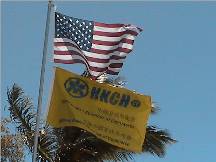



Biz:
China
Hong
Kong Hawaii


What people
said about us

China
Earthquake Relief
Tax &
Government
Hawaii Voter Registration
 Biz-Video
Biz-Video
 Hawaii's
China Connection Hawaii's
China Connection

 CDP#1780962
CDP#1780962

 Doing Business in
Hong Kong & China
Doing Business in
Hong Kong & China
| |
Hong Kong, China & Hawaii Biz*




Do you know our dues
paying members attend events sponsored by our collaboration partners worldwide
at their membership rates - go to our event page to find out more!
After
attended a China/Hong Kong Business/Trade Seminar in Hawaii...still unsure what
to do next, contact us, our Officers, Directors and Founding Members are
actively engaged in China/Hong Kong/Asia trade - we can help!
Are you ready to export your product or
service? You will find out in 3 minutes with resources to help you -
enter
to give it a try

 China Central TV - live
Webcast
China Central TV - live
Webcast
 Skype - FREE
Voice Over IP Skype - FREE
Voice Over IP
 View Hawaii's China Connection
Video Trailer
View Hawaii's China Connection
Video Trailer

 Direct link
PDF file
Direct link
PDF file

 Year of the Pig - February 18, 2007
Year of the Pig - February 18, 2007
July 31, 2007
 Hong Kong:
China's biggest e-commerce company Alibaba has submitted its first initial
public offering (IPO) application to the listing committee of the Hong Kong
Stock Exchange and may become the largest high-tech share on the Hong Kong
bourse. Alibaba's Chairman Jack Ma confirmed the news in the company's annual
meeting over the weekend. Tao Ran, a company spokesman, said there was no
timetable for the market listing and also declined to disclose any details of
the IPO. But analysts say the IPO might raise 7.8 billion Hong Kong dollars and
take the company's total market value to more than four billion U.S. dollars. If
the market listing succeeds, the total equity value of the Alibaba Group, the
umbrella company of Alibaba.com, Taobao.com, Alipay.com, Yahoo! China and
Alisoft.com, would exceed 10 billion U.S. dollars, overtaking its rivals Tencent,
Baidu and Netease, they said. The listing is expected to create a number of
millionaires as its employees hold a large proportion of the company's shares,
analysts say. The top three largest shareholders of the company are Yahoo! Inc
who controls a 40-percent stake; Jack Ma and his management, a 28.2-percent
stake; and Softbank, 16 percent. Calling the listing "the biggest challenge"
Alibaba.com has faced since its establishment nine years ago, Ma said going
public was like refueling a truck so it can reach its destination. "Our final
goal is not to float the company but to create a great enterprise," he said. The
company will use the fund to expand its global business and optimize its online
trading services, the Shanghai Securities News reported on Monday, citing
well-informed sources. The company headquartered in Hangzhou, east China's
Zhejiang Province, has evolved into the world's leading business to business
marketplace in nine years and owns more than three million members from 200
countries and regions. Hong Kong:
China's biggest e-commerce company Alibaba has submitted its first initial
public offering (IPO) application to the listing committee of the Hong Kong
Stock Exchange and may become the largest high-tech share on the Hong Kong
bourse. Alibaba's Chairman Jack Ma confirmed the news in the company's annual
meeting over the weekend. Tao Ran, a company spokesman, said there was no
timetable for the market listing and also declined to disclose any details of
the IPO. But analysts say the IPO might raise 7.8 billion Hong Kong dollars and
take the company's total market value to more than four billion U.S. dollars. If
the market listing succeeds, the total equity value of the Alibaba Group, the
umbrella company of Alibaba.com, Taobao.com, Alipay.com, Yahoo! China and
Alisoft.com, would exceed 10 billion U.S. dollars, overtaking its rivals Tencent,
Baidu and Netease, they said. The listing is expected to create a number of
millionaires as its employees hold a large proportion of the company's shares,
analysts say. The top three largest shareholders of the company are Yahoo! Inc
who controls a 40-percent stake; Jack Ma and his management, a 28.2-percent
stake; and Softbank, 16 percent. Calling the listing "the biggest challenge"
Alibaba.com has faced since its establishment nine years ago, Ma said going
public was like refueling a truck so it can reach its destination. "Our final
goal is not to float the company but to create a great enterprise," he said. The
company will use the fund to expand its global business and optimize its online
trading services, the Shanghai Securities News reported on Monday, citing
well-informed sources. The company headquartered in Hangzhou, east China's
Zhejiang Province, has evolved into the world's leading business to business
marketplace in nine years and owns more than three million members from 200
countries and regions.
Secretary for Development Carrie
Lam Cheng Yuet-ngor has sounded the final death knell for Queen's Pier,
insisting the demolition of the 53-year-old Central landmark is irreversible.
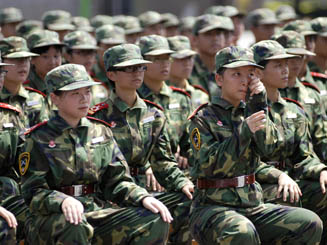 The uniforms
may have been hot and the boots heavy, but the first intake of girls to complete
a two-week military training course with the PLA had nothing but praise for the
experience. "Quite a lot of the students suffered heatstroke during training.
Some fainted when we marched, practised martial arts and went hiking. But none
of us gave up and we insisted on completing the course," said Law Shuk-yu, one
of the 50 girls who took part in the summer camp. The girls were among about 200
secondary school students who graduated yesterday from the gruelling third
annual Military Summer Camp for Hong Kong Youth with the PLA's local garrison.
Although this year's camp was the first to include girls, the students were
undaunted by the experience, and all managed to adjust to the tough training and
strict discipline in a day or two. It was the heat that posed the biggest
challenge during their 15-day stay at the People's Liberation Army barracks in
San Wai, Fanling. Demonstrating the skills they had learned over the two weeks
and sitting through yesterday's hours-long graduation ceremony under the fierce
sun was the last challenge before leaving the camp. "The long-sleeved uniform
and heavy leather boots are really killing us. It's made us wonder how the
officers stand it. They are very tough!" said Shuk-yu, a Form Three student at
Kiangsu-Chekiang College. "Though it's tough, I will sign up for the camp again
if I have the chance. I learned a lot from the training. I used to be a loner,
but now realise the importance of team spirit." The Form Three and Form Four
students who took part in the camp were nominated by their principals and
screened by the Education and Manpower Bureau. Apart from the tough military
drills, discipline, use of weapons and defence theory, the students also had to
attend lessons on Chinese history, China's development and on how the PLA
operates. The course, which was originally proposed by Betty Tung Chiu
Hung-ping, wife of former chief executive Tung Chee-hwa, also included first
aid. The uniforms
may have been hot and the boots heavy, but the first intake of girls to complete
a two-week military training course with the PLA had nothing but praise for the
experience. "Quite a lot of the students suffered heatstroke during training.
Some fainted when we marched, practised martial arts and went hiking. But none
of us gave up and we insisted on completing the course," said Law Shuk-yu, one
of the 50 girls who took part in the summer camp. The girls were among about 200
secondary school students who graduated yesterday from the gruelling third
annual Military Summer Camp for Hong Kong Youth with the PLA's local garrison.
Although this year's camp was the first to include girls, the students were
undaunted by the experience, and all managed to adjust to the tough training and
strict discipline in a day or two. It was the heat that posed the biggest
challenge during their 15-day stay at the People's Liberation Army barracks in
San Wai, Fanling. Demonstrating the skills they had learned over the two weeks
and sitting through yesterday's hours-long graduation ceremony under the fierce
sun was the last challenge before leaving the camp. "The long-sleeved uniform
and heavy leather boots are really killing us. It's made us wonder how the
officers stand it. They are very tough!" said Shuk-yu, a Form Three student at
Kiangsu-Chekiang College. "Though it's tough, I will sign up for the camp again
if I have the chance. I learned a lot from the training. I used to be a loner,
but now realise the importance of team spirit." The Form Three and Form Four
students who took part in the camp were nominated by their principals and
screened by the Education and Manpower Bureau. Apart from the tough military
drills, discipline, use of weapons and defence theory, the students also had to
attend lessons on Chinese history, China's development and on how the PLA
operates. The course, which was originally proposed by Betty Tung Chiu
Hung-ping, wife of former chief executive Tung Chee-hwa, also included first
aid.
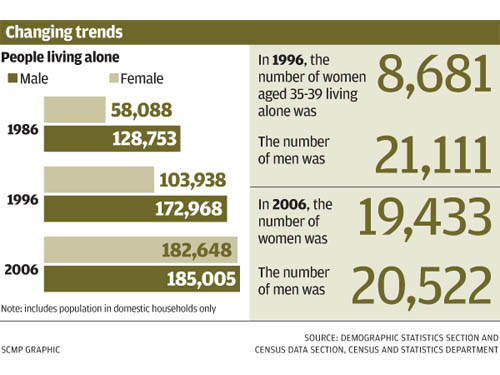 The number of unmarried Hong Kong women living on their
own has jumped 43.8 per cent in five years because of the trend among local men
to marry mainlanders, according to a University of Hong Kong statistician. The
results of the 2006 census, released yesterday, showed that 182,648 women were
living alone, compared with 127,001 in 2001 and 103,938 in 1996. The number of
lone men has increased just 14.1 per cent, to 185,005, since 2001. University of
Hong Kong statistician Paul Yip Siu-fai said the increasingly large number of
Hong Kong men marrying mainlanders had fuelled the imbalance between single men
and women. "The imbalance is likely to grow further in the near future," he
said. Last year, about 28,000 Hong Kong men married mainland women, an increase
of more than 80 per cent on 2001. But only about 6,500 Hong Kong women married
across the border last year. Another reason for the increasing number of lone
women is that they are becoming more independent and better educated, according
to Dr Yip. "Many women can support themselves financially and feel less need to
get married," he said. Another factor is the changing gender ratio. A decade
ago, the sexes were equal in number; now there are only 961 men for every 1,000
women. The number of single mothers has risen 27.8 per cent to 57,613 since
2001, while the number of single fathers has grown 9.8 per cent to 14,713. "The
growing divorce rate will cause serious social ills, such as behavioural
problems among the children of single parents," Dr Yip said. There were 65,626
births in the city last year, up 36 per cent from 2001. Part of the increase was
due to mainlanders giving birth in the city. One in every four babies born in
the city last year had mainland parents. The Senior Citizen Home Safety
Association, which provides personal emergency services to elderly people who
live alone, said the government should improve medical services in the face of
the increasing number of people living alone. "Regardless of the gender, the
number of people living alone has increased in the past years. It is vital for
the government to provide better medical service for them as the population of
Hong Kong is ageing," the association's executive director, Ma Kam-wah, said. Mr
Ma said a change of mentality had boosted the number of elderly women living
alone: "Most elderly people, especially mothers, prefer living alone rather than
staying with their married children as they believe the family relationship will
be better if they don't live under the same roof."
The number of unmarried Hong Kong women living on their
own has jumped 43.8 per cent in five years because of the trend among local men
to marry mainlanders, according to a University of Hong Kong statistician. The
results of the 2006 census, released yesterday, showed that 182,648 women were
living alone, compared with 127,001 in 2001 and 103,938 in 1996. The number of
lone men has increased just 14.1 per cent, to 185,005, since 2001. University of
Hong Kong statistician Paul Yip Siu-fai said the increasingly large number of
Hong Kong men marrying mainlanders had fuelled the imbalance between single men
and women. "The imbalance is likely to grow further in the near future," he
said. Last year, about 28,000 Hong Kong men married mainland women, an increase
of more than 80 per cent on 2001. But only about 6,500 Hong Kong women married
across the border last year. Another reason for the increasing number of lone
women is that they are becoming more independent and better educated, according
to Dr Yip. "Many women can support themselves financially and feel less need to
get married," he said. Another factor is the changing gender ratio. A decade
ago, the sexes were equal in number; now there are only 961 men for every 1,000
women. The number of single mothers has risen 27.8 per cent to 57,613 since
2001, while the number of single fathers has grown 9.8 per cent to 14,713. "The
growing divorce rate will cause serious social ills, such as behavioural
problems among the children of single parents," Dr Yip said. There were 65,626
births in the city last year, up 36 per cent from 2001. Part of the increase was
due to mainlanders giving birth in the city. One in every four babies born in
the city last year had mainland parents. The Senior Citizen Home Safety
Association, which provides personal emergency services to elderly people who
live alone, said the government should improve medical services in the face of
the increasing number of people living alone. "Regardless of the gender, the
number of people living alone has increased in the past years. It is vital for
the government to provide better medical service for them as the population of
Hong Kong is ageing," the association's executive director, Ma Kam-wah, said. Mr
Ma said a change of mentality had boosted the number of elderly women living
alone: "Most elderly people, especially mothers, prefer living alone rather than
staying with their married children as they believe the family relationship will
be better if they don't live under the same roof."
 It's not quite
Venice or Cannes, but Twins member Charlene Choi Cheuk-yin made a bit of a mark
on the international film festival scene last week. The Canto-idol was voted
best actress at this year's 11th annual Puchon International Fantastic Film
Festival in South Korea for her performance in Oxide Pang Chun's new spooker,
Diary. Choi plays a psychotic woman searching for her boyfriend. "When I was
told about the news, I was shocked and I called a lot of people to check if it
was for real," Choi said. The Puchon festival focuses on genre works of a love,
fantasy and adventure nature, far more audience oriented than other more
high-minded artistic showcases. Choi said her success was a result of lessons
with her Simply Actors co-star Jim Chim Sui-man. "I really want to say thank you
to my teacher, 'Jim Sir'. He helped me improve on my acting a lot." Now, if we
can just find her a voice coach for singing. It's not quite
Venice or Cannes, but Twins member Charlene Choi Cheuk-yin made a bit of a mark
on the international film festival scene last week. The Canto-idol was voted
best actress at this year's 11th annual Puchon International Fantastic Film
Festival in South Korea for her performance in Oxide Pang Chun's new spooker,
Diary. Choi plays a psychotic woman searching for her boyfriend. "When I was
told about the news, I was shocked and I called a lot of people to check if it
was for real," Choi said. The Puchon festival focuses on genre works of a love,
fantasy and adventure nature, far more audience oriented than other more
high-minded artistic showcases. Choi said her success was a result of lessons
with her Simply Actors co-star Jim Chim Sui-man. "I really want to say thank you
to my teacher, 'Jim Sir'. He helped me improve on my acting a lot." Now, if we
can just find her a voice coach for singing.
 China:
U.S. Treasury Secretary Henry Paulson arrived in Xining, capital of northwest
China's Qinghai Province Sunday evening, kicking off his "environmental tour" in
the country. Paulson's tour in Qinghai, home to China's largest salt water lake
Qinghai Lake, includes visiting local environmental protection programs. He will
also visit some rural households in the remote province on the Qinghai-Tibet
Plateau, dubbed the "roof of the world". As special representative of the U.S.
President, Paulson will visit China from July 29 to Aug. 1 to exchange views on
the process of the U.S.-China Strategic Economic Dialogue, China's Foreign
Ministry spokesman Liu Jianchao announced on Thursday. Collaborating on energy
and environmental challenges is one of the key focuses of the U.S.-China
Strategic Economic Dialogue (SED) launched by U.S. President George W. Bush and
Chinese President Hu Jintao last year, which was established to provide a
focused and effective framework for addressing issues of mutual concern. Before
flying to Xining, Paulson had made a brief stopover in Beijing on Sunday
afternoon. He will return to Beijing on Tuesday. President Hu Jintao will meet
with him and Vice Premier Wu Yi will hold talks with him as Hu's special
representative. This is Paulson's second visit to China this year, following his
short tour in March.
China:
U.S. Treasury Secretary Henry Paulson arrived in Xining, capital of northwest
China's Qinghai Province Sunday evening, kicking off his "environmental tour" in
the country. Paulson's tour in Qinghai, home to China's largest salt water lake
Qinghai Lake, includes visiting local environmental protection programs. He will
also visit some rural households in the remote province on the Qinghai-Tibet
Plateau, dubbed the "roof of the world". As special representative of the U.S.
President, Paulson will visit China from July 29 to Aug. 1 to exchange views on
the process of the U.S.-China Strategic Economic Dialogue, China's Foreign
Ministry spokesman Liu Jianchao announced on Thursday. Collaborating on energy
and environmental challenges is one of the key focuses of the U.S.-China
Strategic Economic Dialogue (SED) launched by U.S. President George W. Bush and
Chinese President Hu Jintao last year, which was established to provide a
focused and effective framework for addressing issues of mutual concern. Before
flying to Xining, Paulson had made a brief stopover in Beijing on Sunday
afternoon. He will return to Beijing on Tuesday. President Hu Jintao will meet
with him and Vice Premier Wu Yi will hold talks with him as Hu's special
representative. This is Paulson's second visit to China this year, following his
short tour in March.
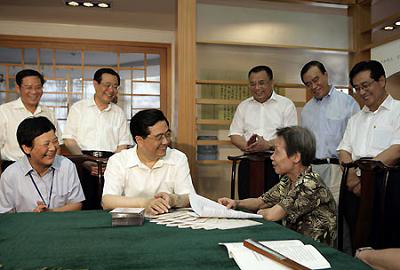 Photo taken on July
28, 2007 shows Chinese President Hu Jintao (front, center) chats with an elder
woman in a residential community of Hangzhou, capital of east China’s Zhejiang
Province, during his inspection tour in the province. Hu Jintao has urged
officials to keep cleanhanded and devote themselves to the construction of a
harmonious and all-around better-off society. Hu, also general secretary of the
Central Committee of the Communist Party of China (CPC), made the remarks during
an inspection tour in east China’s Zhejiang Province from Saturday to Sunday. Photo taken on July
28, 2007 shows Chinese President Hu Jintao (front, center) chats with an elder
woman in a residential community of Hangzhou, capital of east China’s Zhejiang
Province, during his inspection tour in the province. Hu Jintao has urged
officials to keep cleanhanded and devote themselves to the construction of a
harmonious and all-around better-off society. Hu, also general secretary of the
Central Committee of the Communist Party of China (CPC), made the remarks during
an inspection tour in east China’s Zhejiang Province from Saturday to Sunday.
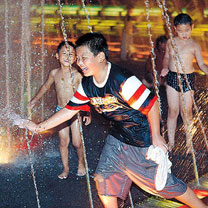 Children enjoy
the cool from water fountains in Shanghai's People's Square Sunday night. The
temperature reached 39.6 celsius on Sunday, July 29, 2007, a record high for the
city in the past 63 years. Children enjoy
the cool from water fountains in Shanghai's People's Square Sunday night. The
temperature reached 39.6 celsius on Sunday, July 29, 2007, a record high for the
city in the past 63 years.
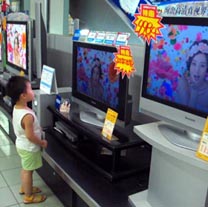 A boy is attracted by
large screen flat-panel TV sets in a supermarket in Beijing. China's LCD TV
output reached 6.34 million sets in the 1st half, up 65.4% on the previous year. A boy is attracted by
large screen flat-panel TV sets in a supermarket in Beijing. China's LCD TV
output reached 6.34 million sets in the 1st half, up 65.4% on the previous year.
China, fighting to curb excess liquidity, will raise
the reserve requirement ratio by 0.5 percentage points to 12 percent for
commercial banks from August 15, the central bank announced Monday.
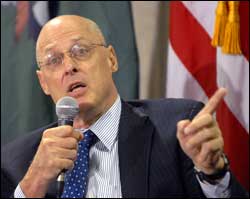 For months, US
lawmakers have been warning Treasury Secretary Henry Paulson their patience was
wearing thin as his dialogue with Beijing failed to produce breakthroughs on
currency revaluation and other disputes. This week, as Paulson meets with
mainland leaders, he faces new pressure in Congress, where proposed measures
might punish Beijing for manipulating its currency. "The problem is there is
very little [Paulson] can do in the immediate future that will make Congress
happy," said Andy Rothman, a China strategist for investment bank CLSA. Paulson
will discuss with President Hu Jintao and Vice Premier Wu Yi, the lead mainland
negotiator in the Sino- US "strategic economic dialogue," progress in the talks
that was launched last year to resolve China's swelling trade surplus and other
issues. But Paulson's real target audience is as much Congress as Beijing.
"Paulson is going to be hoping to come back from the current trip with private
whisperings and confidences that he can share with members of Congress so as to
discourage drastic action," said Sherman Katz, a former trade lawyer and
researcher at the Carnegie Endowment for International Peace in Washington.
Paulson has appealed for patience, saying the dialogue launched in December
needs time to produce results on key fronts such as yuan controls, product
piracy, barriers to foreign entry into its financial industries and trade.
Beijing has begun easing currency controls and reining in its trade surplus.
Yet, the United States and other countries that have seen trade deficits with
the mainland soar are demanding swifter action. Last week, over Paulson's
objections, a Senate panel approved a bill mandating the US Treasury identify
and punish "currency manipulators." Another proposal would tighten the legal
definition of currency manipulation to target China. Beijing says the yuan will
eventually be freely traded. But it says abrupt changes would hurt its
underdeveloped banking industry and cause financial turmoil. China revalued the
yuan by 2.1 percent against the US dollar in July 2005 and allowed it to
appreciate by 7.2 percent since then. Last week the yuan traded at 7.6 to the
greenback. Analysts expect the yuan to rise by an average of 5 percent annually
over the next few years - yet critics demand more. On Sunday, Paulson visited
Qinghai Lake in the far west to highlight environmental challenges amid the
country's breakneck growth. Paulson's stature as a former Goldman Sachs head and
personal lobbying of Congress have bought him time, analysts say. But China's
supercharged economic performance has fueled arguments that it can afford to
move faster. China grew by 11.9 percent last quarter - the fastest quarterly
rise since 1995 - and its trade surplus jumped by 85 percent last month to
US$26.9 billion (HK$209.82 billion). Beijing's international standing has been
hurt by a string of product safety complaints about exports ranging from toxic
toothpaste to faulty tires, says Katz. He added: "It contributes to a sense that
... [Beijing] may be a government that has a lot to learn about acting as a
responsible citizen in the global economy." For months, US
lawmakers have been warning Treasury Secretary Henry Paulson their patience was
wearing thin as his dialogue with Beijing failed to produce breakthroughs on
currency revaluation and other disputes. This week, as Paulson meets with
mainland leaders, he faces new pressure in Congress, where proposed measures
might punish Beijing for manipulating its currency. "The problem is there is
very little [Paulson] can do in the immediate future that will make Congress
happy," said Andy Rothman, a China strategist for investment bank CLSA. Paulson
will discuss with President Hu Jintao and Vice Premier Wu Yi, the lead mainland
negotiator in the Sino- US "strategic economic dialogue," progress in the talks
that was launched last year to resolve China's swelling trade surplus and other
issues. But Paulson's real target audience is as much Congress as Beijing.
"Paulson is going to be hoping to come back from the current trip with private
whisperings and confidences that he can share with members of Congress so as to
discourage drastic action," said Sherman Katz, a former trade lawyer and
researcher at the Carnegie Endowment for International Peace in Washington.
Paulson has appealed for patience, saying the dialogue launched in December
needs time to produce results on key fronts such as yuan controls, product
piracy, barriers to foreign entry into its financial industries and trade.
Beijing has begun easing currency controls and reining in its trade surplus.
Yet, the United States and other countries that have seen trade deficits with
the mainland soar are demanding swifter action. Last week, over Paulson's
objections, a Senate panel approved a bill mandating the US Treasury identify
and punish "currency manipulators." Another proposal would tighten the legal
definition of currency manipulation to target China. Beijing says the yuan will
eventually be freely traded. But it says abrupt changes would hurt its
underdeveloped banking industry and cause financial turmoil. China revalued the
yuan by 2.1 percent against the US dollar in July 2005 and allowed it to
appreciate by 7.2 percent since then. Last week the yuan traded at 7.6 to the
greenback. Analysts expect the yuan to rise by an average of 5 percent annually
over the next few years - yet critics demand more. On Sunday, Paulson visited
Qinghai Lake in the far west to highlight environmental challenges amid the
country's breakneck growth. Paulson's stature as a former Goldman Sachs head and
personal lobbying of Congress have bought him time, analysts say. But China's
supercharged economic performance has fueled arguments that it can afford to
move faster. China grew by 11.9 percent last quarter - the fastest quarterly
rise since 1995 - and its trade surplus jumped by 85 percent last month to
US$26.9 billion (HK$209.82 billion). Beijing's international standing has been
hurt by a string of product safety complaints about exports ranging from toxic
toothpaste to faulty tires, says Katz. He added: "It contributes to a sense that
... [Beijing] may be a government that has a lot to learn about acting as a
responsible citizen in the global economy."
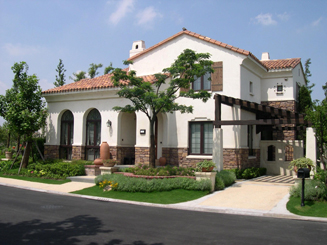 Shanghai villas
see strong demand, Limited supply and steady inflow of expatriate staff underpin
high-end rental market. A steady inflow of expatriates and limited fresh supply
due to land policies will underpin continued strong demand for Shanghai's
upmarket villas, analysts say. The latest data from property consultants shows
Shanghai's villa residential market has taken in stride various control measures
introduced since 2005 to cool the mainland's overheated property market. The
average monthly rent fetched by villas reached US$21.50 per square metre in the
first half of the year, up 6.5 per cent from the same period last year,
according to statistics from Colliers International. The overall vacancy rate
was 10.6 per cent, compared with 15.9 per cent last year. In the villa district
of Changning, the vacancy rate was unchanged, while in Minhang, vacancies fell
12 percentage points to 6.7 per cent. And although 13.6 per cent of Pudong
district's luxury villas remained vacant, the vacancy rate was down 6.9
percentage points from the same period last year, the figures showed. The
gradual opening of the mainland financial sector and growing domestic consumer
demand had lured foreign banks and retail giants to expand aggressively in the
mainland, analysts said. Official data showed that by the end of April, Shanghai
was home to 57,000 registered expatriates - 11.8 per cent up from the previous
year. Larry Hu, head of residential consultancy at Knight Frank Shanghai, said
he was optimistic about the outlook for the villa market. "A quarter of the
expatriates living in Shanghai rent luxury homes with monthly rents ranging from
US$3,000 to US$10,000," said Mr Hu, who added that expatriates accounted for
more than 90 per cent of the total luxury residential leasing market in
Shanghai. Meanwhile, in a move to cap the supply of upmarket villas, the
Ministry of Land and Resources and the National Development and Reform
Commission jointly reiterated this month a policy to end new land approvals for
villa developments. Lina Wong, managing director for East China at Colliers
International, said the measures would boost the villa market. "The rising
number of expatriates and the future limited new supply will help the outlook
for the villa leasing market," she said. Shanghai villas
see strong demand, Limited supply and steady inflow of expatriate staff underpin
high-end rental market. A steady inflow of expatriates and limited fresh supply
due to land policies will underpin continued strong demand for Shanghai's
upmarket villas, analysts say. The latest data from property consultants shows
Shanghai's villa residential market has taken in stride various control measures
introduced since 2005 to cool the mainland's overheated property market. The
average monthly rent fetched by villas reached US$21.50 per square metre in the
first half of the year, up 6.5 per cent from the same period last year,
according to statistics from Colliers International. The overall vacancy rate
was 10.6 per cent, compared with 15.9 per cent last year. In the villa district
of Changning, the vacancy rate was unchanged, while in Minhang, vacancies fell
12 percentage points to 6.7 per cent. And although 13.6 per cent of Pudong
district's luxury villas remained vacant, the vacancy rate was down 6.9
percentage points from the same period last year, the figures showed. The
gradual opening of the mainland financial sector and growing domestic consumer
demand had lured foreign banks and retail giants to expand aggressively in the
mainland, analysts said. Official data showed that by the end of April, Shanghai
was home to 57,000 registered expatriates - 11.8 per cent up from the previous
year. Larry Hu, head of residential consultancy at Knight Frank Shanghai, said
he was optimistic about the outlook for the villa market. "A quarter of the
expatriates living in Shanghai rent luxury homes with monthly rents ranging from
US$3,000 to US$10,000," said Mr Hu, who added that expatriates accounted for
more than 90 per cent of the total luxury residential leasing market in
Shanghai. Meanwhile, in a move to cap the supply of upmarket villas, the
Ministry of Land and Resources and the National Development and Reform
Commission jointly reiterated this month a policy to end new land approvals for
villa developments. Lina Wong, managing director for East China at Colliers
International, said the measures would boost the villa market. "The rising
number of expatriates and the future limited new supply will help the outlook
for the villa leasing market," she said.
July 28 - 30, 2007
 Hong Kong:
Two leading rating agencies upgraded Hong Kong and the mainland's credit outlook
yesterday, based on strong external assets and healthy government finances.
Moody's Investors Service upgraded the mainland's long-term local foreign
currency bonds rating one level up to A1 - the fifth-highest investment grade -
from A2. This is the highest debt rating the mainland has earned from Moody's.
The agency also assessed local currency debt for the first time, assigning the
same level with a stable outlook. Moody's raised the ratings on Hong Kong's
foreign-currency and local- currency obligations, while Standard & Poor's raised
the outlook on its ratings in the mainland and Hong Kong. "China's very strong
external payment position provides insulation from external shocks and allows
the authorities time to expand and deepen structural reform," said Tom Byrne,
Moody's senior vice president. He said external debts of the mainland government
and state-owned banks are a "small fraction" of foreign exchange reserves, which
exceed US$1.3 trillion (HK$10.14 trillion), while the export sector has been
formidable despite continuing appreciation of the yuan. Standard & Poor's
Ratings Services, which has assigned an "A" sovereign rating in the mainland,
affirmed its rating and raised the outlook to positive from stable. A positive
outlook indicates a possible upgrade in one to three years. "The positive
outlook on the sovereign ratings on China reflects our expectation that
persistent reforms will allow economic growth to proceed at a high trend rate
without unduly large fluctuations," the agency said. Hong Kong:
Two leading rating agencies upgraded Hong Kong and the mainland's credit outlook
yesterday, based on strong external assets and healthy government finances.
Moody's Investors Service upgraded the mainland's long-term local foreign
currency bonds rating one level up to A1 - the fifth-highest investment grade -
from A2. This is the highest debt rating the mainland has earned from Moody's.
The agency also assessed local currency debt for the first time, assigning the
same level with a stable outlook. Moody's raised the ratings on Hong Kong's
foreign-currency and local- currency obligations, while Standard & Poor's raised
the outlook on its ratings in the mainland and Hong Kong. "China's very strong
external payment position provides insulation from external shocks and allows
the authorities time to expand and deepen structural reform," said Tom Byrne,
Moody's senior vice president. He said external debts of the mainland government
and state-owned banks are a "small fraction" of foreign exchange reserves, which
exceed US$1.3 trillion (HK$10.14 trillion), while the export sector has been
formidable despite continuing appreciation of the yuan. Standard & Poor's
Ratings Services, which has assigned an "A" sovereign rating in the mainland,
affirmed its rating and raised the outlook to positive from stable. A positive
outlook indicates a possible upgrade in one to three years. "The positive
outlook on the sovereign ratings on China reflects our expectation that
persistent reforms will allow economic growth to proceed at a high trend rate
without unduly large fluctuations," the agency said.
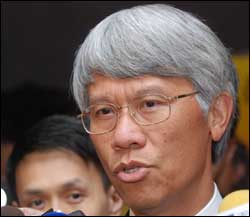 The Exchange Fund earned
investment income of HK$47 billion in the first six months of the year, a 53
percent jump over the same period a year ago, thanks largely to the hot equities
market. The Hong Kong Treasury's share of the take is HK$13.3 billion. Figures
released yesterday by the Hong Kong Monetary Authority show the Exchange Fund
gained a total of HK$15.1 billion from Hong Kong equities, an increase of 41
percent over the previous year; HK$12.3 billion from bond returns, up 193
percent; HK$12.1 billion from gains on other equities, a surge of 246 percent;
and HK$7.5 billion from foreign exchange gains, a decline of 39 percent from
HK$12.3 billion. "The outlook for Hong Kong's equity market for the second half
will be quite volatile, but bullish," said Billy Mak, associate professor in the
department of finance and decision sciences at Hong Kong Baptist University. The
positive outlook, he added, stems from expectations that corporate earning
performances will be strong amid robust economic growth. The drop in the
Exchange Fund's exchange valuation gain was attributed to the weak US dollar.
Mak said the fund is already investing a sizable portion of foreign currency
reserves in US dollar assets for the purpose of safeguarding the Hong Kong
dollar currency peg. "So the weakening US dollar will definitely affect that
portion," he said. However, this does not mean the Hong Kong dollar should
de-peg from the greenback, said Nicholas Kwan Ka- ming, Asia regional head of
research for Standard Chartered Bank. "The purpose of the Exchange Fund lies in
maintaining monetary stability, and should not be [judged] solely by how much
investment return it is generating," Kwan said. "Exchange gain represents a
small portion of the total investment income of the fund. It can shift the
investment portfolio to make up for the potential loss." Commenting on the
Exchange Fund results, HKMA chief executive Joseph Yam Chi-kwong said despite
continued global economic growth so far in 2007, financial markets have
experienced sharp volatility. He noted the global stock market correction in
late February and early March and the rise in long-term bond yields in May and
June as concerns. "It is nevertheless encouraging that, notwithstanding these
sharp and unexpected market movements, the Exchange Fund has been able to earn
an investment income of HK$47 billion in the first half of the year," Yam said
in a statement published on the HKMA website. He cautioned that sustainability
of the recent stock market rally and investor optimism should not be taken for
granted because uncertainties over global economic strength and interest-rate
movements will continue to cloud the investment outlook in the equity, bond and
currency markets. In his weekly blog "Viewpoint," published on the HKMA website,
Yam also said the issue of the carry trade should be watched. But he believes
the chances of a financial crisis recurring are slim. The Exchange Fund's total
asset value stood at HK$1.257 trillion as of June 30, up by 13.66 percent from
the HK$1.105 trillion a year ago. The Exchange Fund earned
investment income of HK$47 billion in the first six months of the year, a 53
percent jump over the same period a year ago, thanks largely to the hot equities
market. The Hong Kong Treasury's share of the take is HK$13.3 billion. Figures
released yesterday by the Hong Kong Monetary Authority show the Exchange Fund
gained a total of HK$15.1 billion from Hong Kong equities, an increase of 41
percent over the previous year; HK$12.3 billion from bond returns, up 193
percent; HK$12.1 billion from gains on other equities, a surge of 246 percent;
and HK$7.5 billion from foreign exchange gains, a decline of 39 percent from
HK$12.3 billion. "The outlook for Hong Kong's equity market for the second half
will be quite volatile, but bullish," said Billy Mak, associate professor in the
department of finance and decision sciences at Hong Kong Baptist University. The
positive outlook, he added, stems from expectations that corporate earning
performances will be strong amid robust economic growth. The drop in the
Exchange Fund's exchange valuation gain was attributed to the weak US dollar.
Mak said the fund is already investing a sizable portion of foreign currency
reserves in US dollar assets for the purpose of safeguarding the Hong Kong
dollar currency peg. "So the weakening US dollar will definitely affect that
portion," he said. However, this does not mean the Hong Kong dollar should
de-peg from the greenback, said Nicholas Kwan Ka- ming, Asia regional head of
research for Standard Chartered Bank. "The purpose of the Exchange Fund lies in
maintaining monetary stability, and should not be [judged] solely by how much
investment return it is generating," Kwan said. "Exchange gain represents a
small portion of the total investment income of the fund. It can shift the
investment portfolio to make up for the potential loss." Commenting on the
Exchange Fund results, HKMA chief executive Joseph Yam Chi-kwong said despite
continued global economic growth so far in 2007, financial markets have
experienced sharp volatility. He noted the global stock market correction in
late February and early March and the rise in long-term bond yields in May and
June as concerns. "It is nevertheless encouraging that, notwithstanding these
sharp and unexpected market movements, the Exchange Fund has been able to earn
an investment income of HK$47 billion in the first half of the year," Yam said
in a statement published on the HKMA website. He cautioned that sustainability
of the recent stock market rally and investor optimism should not be taken for
granted because uncertainties over global economic strength and interest-rate
movements will continue to cloud the investment outlook in the equity, bond and
currency markets. In his weekly blog "Viewpoint," published on the HKMA website,
Yam also said the issue of the carry trade should be watched. But he believes
the chances of a financial crisis recurring are slim. The Exchange Fund's total
asset value stood at HK$1.257 trillion as of June 30, up by 13.66 percent from
the HK$1.105 trillion a year ago.
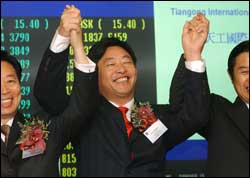 Undeterred by the
market plunge yesterday, shares of high-speed steel maker Tiangong International
(0826) soared on their trading debut, advancing 81.76 percent above the offer
price. Tiangong hit a high of HK$12.10 before pulling back to close at HK$11.56,
up from the offer price of HK$6.36, with HK$1.28 billion worth of shares traded.
The Jiangsu-based company became the fourth best-performing new listing on the
Hong Kong main board. China Communications Services (0552) was the third-highest
gainer on debut, rising 85 percent; China High Speed Transmission (0658) surged
97.7 percent, ranking second; while Beijing Enterprises Holdings (0392) gained
the most, rocketing 222 percent on its May 1997 debut. "Tiangong's performance
was above market expectations of 25 percent," said Cherrie Yan, analyst at
Phillip Securities. The Hang Seng Index retreated from a record high to close
down 0.6 percent yesterday. Undeterred by the
market plunge yesterday, shares of high-speed steel maker Tiangong International
(0826) soared on their trading debut, advancing 81.76 percent above the offer
price. Tiangong hit a high of HK$12.10 before pulling back to close at HK$11.56,
up from the offer price of HK$6.36, with HK$1.28 billion worth of shares traded.
The Jiangsu-based company became the fourth best-performing new listing on the
Hong Kong main board. China Communications Services (0552) was the third-highest
gainer on debut, rising 85 percent; China High Speed Transmission (0658) surged
97.7 percent, ranking second; while Beijing Enterprises Holdings (0392) gained
the most, rocketing 222 percent on its May 1997 debut. "Tiangong's performance
was above market expectations of 25 percent," said Cherrie Yan, analyst at
Phillip Securities. The Hang Seng Index retreated from a record high to close
down 0.6 percent yesterday.
 A
month after floating shares on the Shanghai bourse, China COSCO (1919) said
yesterday it is negotiating with parent China Ocean Shipping (Group) for a
possible private issue of new A shares. A
month after floating shares on the Shanghai bourse, China COSCO (1919) said
yesterday it is negotiating with parent China Ocean Shipping (Group) for a
possible private issue of new A shares.
Cheung Kong Holdings (0001) and
partner Keppel Land are among property heavyweights vying for a prime site in
Singapore, with market watchers estimating bids could have topped the HK$10
billion mark.
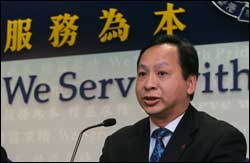 Police have arrested
eight people over a HK$5 million internet scam that made use of international
e-auction platform eBay to cheat would-be buyers all over the world. It is
believed more than 10,000 people have been swindled through fraudulent
transactions and police are still trying to ascertain the actual number of
victims. The suspects - five men and three women aged between 18 and 47 - were
detained in raids that began across the territory early yesterday. They are
alleged to have been involved in a well- organized e-auction fraud syndicate
that was smashed following intensive investigations with the help of eBay, which
is based in the United States. Senior Superintendent Man Chi- hung of the
Commercial Crime Bureau's technology crime division said most of the
transactions involved electronic products such as MP3 players and computer
memory cards. Police have arrested
eight people over a HK$5 million internet scam that made use of international
e-auction platform eBay to cheat would-be buyers all over the world. It is
believed more than 10,000 people have been swindled through fraudulent
transactions and police are still trying to ascertain the actual number of
victims. The suspects - five men and three women aged between 18 and 47 - were
detained in raids that began across the territory early yesterday. They are
alleged to have been involved in a well- organized e-auction fraud syndicate
that was smashed following intensive investigations with the help of eBay, which
is based in the United States. Senior Superintendent Man Chi- hung of the
Commercial Crime Bureau's technology crime division said most of the
transactions involved electronic products such as MP3 players and computer
memory cards.
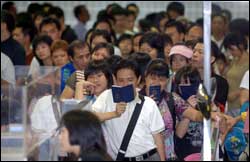 Executive councillor Cheng
Yiu-tong said yesterday he expects Beijing to give the go-ahead to a proposal
that reportedly will allow up to two million Shenzhen residents easy access to
the SAR. The non-official Exco member, who is also a local NPC deputy and the
president of the Federation of Trade Unions, would not say if such a proposal
would be included in Chief Executive Donald Tsang Yam-kuen's policy address in
October. "But I think there will be little problem [in getting Beijing's
approval]," Cheng said. If approved, he said there would probably be a three-day
time limit on such visits. Cheng chairs the Hong Kong-China Relation Strategic
Development Research Fund, which advocated such an idea in one of its research
studies. According to a Ming Pao report published Wednesday, the proposal would
only affect Shenzhen residents with household records rather than the special
economic zone's entire population of more than eight million. Le Zheng, director
of the Shenzhen Academy of Social Sciences, estimated the scheme would attract
an extra 10,000 to 20,000 Shenzhen residents per day to the territory on one-day
trips. Executive councillor Cheng
Yiu-tong said yesterday he expects Beijing to give the go-ahead to a proposal
that reportedly will allow up to two million Shenzhen residents easy access to
the SAR. The non-official Exco member, who is also a local NPC deputy and the
president of the Federation of Trade Unions, would not say if such a proposal
would be included in Chief Executive Donald Tsang Yam-kuen's policy address in
October. "But I think there will be little problem [in getting Beijing's
approval]," Cheng said. If approved, he said there would probably be a three-day
time limit on such visits. Cheng chairs the Hong Kong-China Relation Strategic
Development Research Fund, which advocated such an idea in one of its research
studies. According to a Ming Pao report published Wednesday, the proposal would
only affect Shenzhen residents with household records rather than the special
economic zone's entire population of more than eight million. Le Zheng, director
of the Shenzhen Academy of Social Sciences, estimated the scheme would attract
an extra 10,000 to 20,000 Shenzhen residents per day to the territory on one-day
trips.
 China:
Almost two thirds of China's exporters are able to deal with the effect of yuan
appreciation on exports, according to a new survey. More than one third of
exporters believe the exchange rate has had a major negative impact on exports
and less than one third consider export rebate cuts as an important factor,
according to the survey reported in Friday's China Business News. Almost half
of the companies surveyed said they would avoid staff cuts if the yuan continued
to appreciate and a quarter would consider laying off less than five percent of
their employees, according to survey. Few companies responded to appreciation by
reducing staff or payment, or by moving production to lower-cost countries. More
than 70 percent of the companies believed the prices of export products could be
raised by one to five percent. However, three quarters had no idea of or had not
used financial tools to reduce risks and only one in five had begun to improve
efficiency and add more values to their products, said the survey.
China:
Almost two thirds of China's exporters are able to deal with the effect of yuan
appreciation on exports, according to a new survey. More than one third of
exporters believe the exchange rate has had a major negative impact on exports
and less than one third consider export rebate cuts as an important factor,
according to the survey reported in Friday's China Business News. Almost half
of the companies surveyed said they would avoid staff cuts if the yuan continued
to appreciate and a quarter would consider laying off less than five percent of
their employees, according to survey. Few companies responded to appreciation by
reducing staff or payment, or by moving production to lower-cost countries. More
than 70 percent of the companies believed the prices of export products could be
raised by one to five percent. However, three quarters had no idea of or had not
used financial tools to reduce risks and only one in five had begun to improve
efficiency and add more values to their products, said the survey.
New standards for cooking oil are
due to take effect soon, a government official said yesterday. "We are looking
at a total of 92 standards for the cooking oil industry and we expect the
standard regulatory authority to issue some shortly," Du Zheng, director of the
Standards and Quality Center of State Administration of Grain, told China Daily.
"Thirty of the standards are almost decided upon, 10 of which address the edible
oil sector," he added. The 10 edible oil standards will address product quality
and the manufacturing processes of four categories of edible oil - sesame oil,
olive oil, palm oil and multi-purpose nutrition oil. China has already issued
product standards for eight kinds of plant-based oil, such as soybean and peanut
oil. "The new standards will help guide manufacturers and ensure the market as a
whole is well regulated. Of course, since the manufacture of cooking oil is
complicated, the healthy development of the segment will also depend on
self-regulation," Du stressed. Zhang Zhentao, general manager of COFCO Food
Sales & Distribution Co Ltd, said his company has been actively involved in
drafting the new standards and has provided the regulator with technical details
for Fortune Cooking Oil, an edible oil brand managed by COFCO.
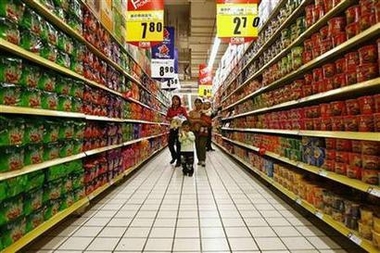 China needs to improve the quality of
its exports to win a better international reputation, Premier Wen Jiabao said
during a meeting on Friday that set out punishments for food and drug firms that
violate standards. "Product quality relates to our people's interest, the
survival and development of our enterprises and the image of our nation," Wen
told the meeting on export quality. It was crucial to win over the international
market with good-quality exports, Wen added. Chinese exports of everything from
fish to toys, pet food to toothpaste, have been found in recent months to be
mislabeled, unsafe or dangerously contaminated, creating an international
backlash. Wen's remarks were reported on state radio and TV. "We will not avoid
problems, but we protest against untrue reports that tell only part of the
story, and trade protectionism and discrimination," Wen was quoted as saying.
Food safety scandals are a regular topic in the Chinese media, but the nation
lacks a basic food safety law and the ability to enforce its food and drug
safety regulations at home or for exports. Its imports are generally carefully
scrutinized. The head of the State Food and Drug Administration was executed
last month, after being found guilty of accepting bribes to approve drugs. "It
is a timely, urgent and important job and also a long-term and enduring task for
us to fully improve the quality of Chinese products," Wen said. China would
raise the threshold for products relating to human health and safety so as to
prevent problematic exports from leaving the country, he said. The authorities
would also check every stage of production, including raw materials, additives
and intermediate products, so as to make the "made in China" brand a symbol for
goods with great quality, Wen said. Producers of food, drugs and other
agricultural goods that violate the food safety rules would face fines of up to
100,000 yuan ($13,220), have operation certificates or export permits cancelled
or even risk arrest, according to regulations carried on the central government
Web site China needs to improve the quality of
its exports to win a better international reputation, Premier Wen Jiabao said
during a meeting on Friday that set out punishments for food and drug firms that
violate standards. "Product quality relates to our people's interest, the
survival and development of our enterprises and the image of our nation," Wen
told the meeting on export quality. It was crucial to win over the international
market with good-quality exports, Wen added. Chinese exports of everything from
fish to toys, pet food to toothpaste, have been found in recent months to be
mislabeled, unsafe or dangerously contaminated, creating an international
backlash. Wen's remarks were reported on state radio and TV. "We will not avoid
problems, but we protest against untrue reports that tell only part of the
story, and trade protectionism and discrimination," Wen was quoted as saying.
Food safety scandals are a regular topic in the Chinese media, but the nation
lacks a basic food safety law and the ability to enforce its food and drug
safety regulations at home or for exports. Its imports are generally carefully
scrutinized. The head of the State Food and Drug Administration was executed
last month, after being found guilty of accepting bribes to approve drugs. "It
is a timely, urgent and important job and also a long-term and enduring task for
us to fully improve the quality of Chinese products," Wen said. China would
raise the threshold for products relating to human health and safety so as to
prevent problematic exports from leaving the country, he said. The authorities
would also check every stage of production, including raw materials, additives
and intermediate products, so as to make the "made in China" brand a symbol for
goods with great quality, Wen said. Producers of food, drugs and other
agricultural goods that violate the food safety rules would face fines of up to
100,000 yuan ($13,220), have operation certificates or export permits cancelled
or even risk arrest, according to regulations carried on the central government
Web site
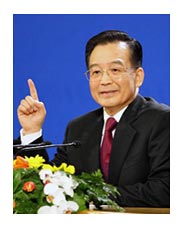 Chinese Premier Wen Jiabao said on
Friday that China would strengthen exchanges and cooperation with other
countries to cope with the issue of food safety "in a responsible way" at a
national work meeting in Beijing. The following are measures the Chinese
government has taken since China''s food quality was called into question both
locally and globally. (1) China and the United States will hold a
vice-ministerial-level talk on food security in August and the two sides will
sign a memorandum of understanding on food safety by the end of this year to
enable the two countries to resolve food safety issues more effectively. (2) The
U.S. Health and Human Services officials will visit China at the end of July to
exchange views with Chinese officials on the U.S. detention of four categories
of aquatic products (catfish, basa and dace, shrimp and eel) that were alleged
to contain banned substances. (3) China pledged on July 25 to provide regular
and detailed information about potentially dangerous exports from China based on
European complaints during the visit of Meglena Kuneva, the European
commissioner for consumer protection. (4) China has established bilateral
mechanisms and multi-lateral mechanisms on food safety with its trade partners
including the United States, the European Union, Japan and the Republic of
Korea. Chinese Premier Wen Jiabao said on
Friday that China would strengthen exchanges and cooperation with other
countries to cope with the issue of food safety "in a responsible way" at a
national work meeting in Beijing. The following are measures the Chinese
government has taken since China''s food quality was called into question both
locally and globally. (1) China and the United States will hold a
vice-ministerial-level talk on food security in August and the two sides will
sign a memorandum of understanding on food safety by the end of this year to
enable the two countries to resolve food safety issues more effectively. (2) The
U.S. Health and Human Services officials will visit China at the end of July to
exchange views with Chinese officials on the U.S. detention of four categories
of aquatic products (catfish, basa and dace, shrimp and eel) that were alleged
to contain banned substances. (3) China pledged on July 25 to provide regular
and detailed information about potentially dangerous exports from China based on
European complaints during the visit of Meglena Kuneva, the European
commissioner for consumer protection. (4) China has established bilateral
mechanisms and multi-lateral mechanisms on food safety with its trade partners
including the United States, the European Union, Japan and the Republic of
Korea.
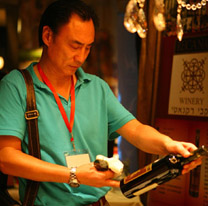 A visitor at Experience Israel, a consumer goods event in Beijing, checks
Israeli wine. Israeli producer hope their high-end products can attract China's
affluent consumers.
A visitor at Experience Israel, a consumer goods event in Beijing, checks
Israeli wine. Israeli producer hope their high-end products can attract China's
affluent consumers.
 Summer is particularly hot in big
cities. To help city dwellers keep cool through this difficult period, here are
some tips to rescue them from the heat. Summer is particularly hot in big
cities. According to the ancient lunar calendar, the last 10 days of July are
the hottest days in the year. To help city dwellers keep cool through this
difficult period, here are some tips to rescue you from the heat. With the right
liquids, right clothes, right diet and good habits, people can ease through the
hash period of the year without too much difficulty. Summer is particularly hot in big
cities. To help city dwellers keep cool through this difficult period, here are
some tips to rescue them from the heat. Summer is particularly hot in big
cities. According to the ancient lunar calendar, the last 10 days of July are
the hottest days in the year. To help city dwellers keep cool through this
difficult period, here are some tips to rescue you from the heat. With the right
liquids, right clothes, right diet and good habits, people can ease through the
hash period of the year without too much difficulty.
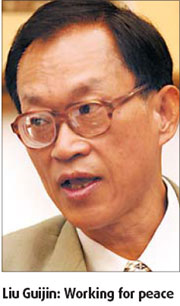 Confrontation over
Darfur 'will lead us nowhere' - It's like sitting around a dinner table:
Westerners use forks and knives, Chinese prefer chopsticks, and Arabs and
Indians their hands. The mediums may be different, the purpose is the same. Why
should all of us have to use forks and knives? You should not force others to
use the medium you like. The same applies to the negotiation table. The solution
to a problem is more important than the means employed. Coercion and
confrontation "will lead us nowhere". This is how China's special envoy to
Darfur Liu Guijin describes the Darfur issue. "China insists on using influence
without interference, and we know respect for all the parties is vital to
finding a solution," Liu said in an interview with China Daily. "If the
situation in Darfur gets out of control or if it gets too late before a solution
is found, it will hurt the interest of not only the people in Darfur, but also
the international community." But to find a fair solution, "you have to learn
how to deal with the Sudanese government" because no peacekeeping operation can
be smooth without its support, Liu said. The international community should not
forget that it is a "legitimate government that deserves respect". "We sit
together to solve the problem and restore peace in Darfur, not to punish one
side in favor of another." China has been trying to find a solution agreeable to
all the parties. It has been trying to alleviate the suffering of the people,
too. It sent a team of agriculture experts to Sudan last month to study the
possibility of setting up an agriculture technology demonstration center. "Such
help targets the right cause of the conflict - poverty." China has already given
$10 million in humanitarian aid and promised to offer more. China has used its
ties with Sudan to build infrastructure such as schools, hospitals and water
projects. But their relations have been politicized by a section of the media
and some NGOs and politicians, Liu said. Confrontation over
Darfur 'will lead us nowhere' - It's like sitting around a dinner table:
Westerners use forks and knives, Chinese prefer chopsticks, and Arabs and
Indians their hands. The mediums may be different, the purpose is the same. Why
should all of us have to use forks and knives? You should not force others to
use the medium you like. The same applies to the negotiation table. The solution
to a problem is more important than the means employed. Coercion and
confrontation "will lead us nowhere". This is how China's special envoy to
Darfur Liu Guijin describes the Darfur issue. "China insists on using influence
without interference, and we know respect for all the parties is vital to
finding a solution," Liu said in an interview with China Daily. "If the
situation in Darfur gets out of control or if it gets too late before a solution
is found, it will hurt the interest of not only the people in Darfur, but also
the international community." But to find a fair solution, "you have to learn
how to deal with the Sudanese government" because no peacekeeping operation can
be smooth without its support, Liu said. The international community should not
forget that it is a "legitimate government that deserves respect". "We sit
together to solve the problem and restore peace in Darfur, not to punish one
side in favor of another." China has been trying to find a solution agreeable to
all the parties. It has been trying to alleviate the suffering of the people,
too. It sent a team of agriculture experts to Sudan last month to study the
possibility of setting up an agriculture technology demonstration center. "Such
help targets the right cause of the conflict - poverty." China has already given
$10 million in humanitarian aid and promised to offer more. China has used its
ties with Sudan to build infrastructure such as schools, hospitals and water
projects. But their relations have been politicized by a section of the media
and some NGOs and politicians, Liu said.
France and China will sign an
accord in Beijing on Tuesday for the construction of two third-generation EPR
nuclear reactors, in the biggest contract ever netted by the French company
Areva, informed sources said yesterday.
July 27, 2007
 Hong Kong:
A former banker and an ex-stock
broker were each sentenced to 23 months' jail for pocketing bribes from former
chairman of Semtech International Holdings Derek Wong Chong-kwong who is still
missing after failing to turn up in court on Tuesday. Hong Kong:
A former banker and an ex-stock
broker were each sentenced to 23 months' jail for pocketing bribes from former
chairman of Semtech International Holdings Derek Wong Chong-kwong who is still
missing after failing to turn up in court on Tuesday.
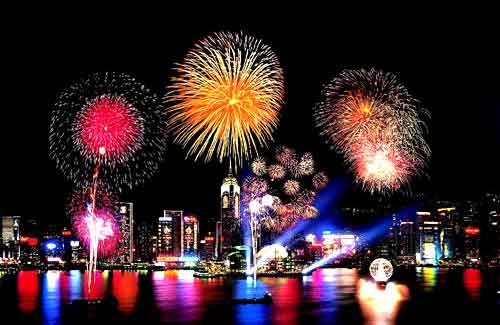 Hong Kong has been
ranked as the world's eighth most fashionable city in a latest survey by Global
Language Monitor. China News Service Thursday quoted HK's Wen Wei Po newspaper
as saying, also listed as one of the world's most fashionable cities is
Shanghai, eastern China's financial hub, taking the fourteenth place on the top
25 list. The California-based Global Language Monitor says the rise of Shanghai
in the list indicates that a Chinese mainland city has for the first time broken
into the big names. New York was elected as the top fashion city for the fourth
consecutive year. Rome came second and Paris took the third place. Asian cities
on the list also include Tokyo, in the 6th place, Singapore in the 10th and
Bangkok in the 17th. Global Language Monitor, a non-profit organization, is in
charge of documenting, analyzing and tracking trends in language, especially in
English. The American company also conducts fashion surveys. Hong Kong has been
ranked as the world's eighth most fashionable city in a latest survey by Global
Language Monitor. China News Service Thursday quoted HK's Wen Wei Po newspaper
as saying, also listed as one of the world's most fashionable cities is
Shanghai, eastern China's financial hub, taking the fourteenth place on the top
25 list. The California-based Global Language Monitor says the rise of Shanghai
in the list indicates that a Chinese mainland city has for the first time broken
into the big names. New York was elected as the top fashion city for the fourth
consecutive year. Rome came second and Paris took the third place. Asian cities
on the list also include Tokyo, in the 6th place, Singapore in the 10th and
Bangkok in the 17th. Global Language Monitor, a non-profit organization, is in
charge of documenting, analyzing and tracking trends in language, especially in
English. The American company also conducts fashion surveys.
Jewelry retailer Luk Fook Holdings
(0590) said net income surged 107 percent to HK$198.1 million for the year ended
March, supported by sales to couples tying the knot and purchases by mainland
visitors to Hong Kong during the Golden Week holidays in May and October.
The Legislative Council is seeking a one-off HK$20
million grant from public coffers to set up a task force to monitor the
construction of the Legco complex at Tamar, the president of the legislature
said yesterday.
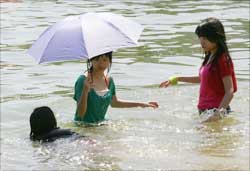 The heatwave has
continued to take its toll, with two deaths and more than a dozen people falling
ill in the past few days, and the temperature soaring to a record high on
southern Hong Kong Island. A dole recipient taking part in outdoor community
work collapsed with suspected heatstroke yesterday, bringing to 13 the number of
people who have been overcome by the heat since Monday. Two people - an outdoor
worker and a teenager playing football - died on Monday and at least eight
people were taken ill. Another five people fell sick on Tuesday. According to
the Hong Kong Observatory, the temperature hit a record high of 38 degrees
Celsius at Repulse Bay on Hong Kong Island yesterday, while temperatures of
above 36 degrees Celsius were recorded in parts of northern New Territories. The
highest temperature on record was 36.1 degrees, which was registered on August
19, 1900, and August 18, 1990. The very hot weather warning was issued on
Tuesday afternoon and remained in force yesterday. The heatwave has
continued to take its toll, with two deaths and more than a dozen people falling
ill in the past few days, and the temperature soaring to a record high on
southern Hong Kong Island. A dole recipient taking part in outdoor community
work collapsed with suspected heatstroke yesterday, bringing to 13 the number of
people who have been overcome by the heat since Monday. Two people - an outdoor
worker and a teenager playing football - died on Monday and at least eight
people were taken ill. Another five people fell sick on Tuesday. According to
the Hong Kong Observatory, the temperature hit a record high of 38 degrees
Celsius at Repulse Bay on Hong Kong Island yesterday, while temperatures of
above 36 degrees Celsius were recorded in parts of northern New Territories. The
highest temperature on record was 36.1 degrees, which was registered on August
19, 1900, and August 18, 1990. The very hot weather warning was issued on
Tuesday afternoon and remained in force yesterday.
 China:
The number of overseas tourists who visited Beijing in the first half of the
year rose 11 percent on last year to 1.97 million, the municipal statistics
bureau said on Thursday. The capital hosted 1.7 million foreign tourists in the
first six months, up 11.9 from the same period last year, the bureau said.
Japan, the United States and the Republic of Korea are currently the top three
sources of the city's foreign tourists. Beijing also hosted 260,000 tourists
from Hong Kong, Macao and Taiwan, an increase of 5.6 percent. Tourism has boomed
in Beijing in recent years as the 2008 Olympic Games approaches. Last year, it
hosted 3.9 million overseas tourists, up 7.5 percent from 2005, according to the
Beijing Tourism Bureau.
China:
The number of overseas tourists who visited Beijing in the first half of the
year rose 11 percent on last year to 1.97 million, the municipal statistics
bureau said on Thursday. The capital hosted 1.7 million foreign tourists in the
first six months, up 11.9 from the same period last year, the bureau said.
Japan, the United States and the Republic of Korea are currently the top three
sources of the city's foreign tourists. Beijing also hosted 260,000 tourists
from Hong Kong, Macao and Taiwan, an increase of 5.6 percent. Tourism has boomed
in Beijing in recent years as the 2008 Olympic Games approaches. Last year, it
hosted 3.9 million overseas tourists, up 7.5 percent from 2005, according to the
Beijing Tourism Bureau.
China on Wednesday banned the
imports of poultry and poultry products from Germany, the Czech Republic, the
State of Virginia of the United States as well as the imports of swine products
from the Republic of Georgia. Chinese Ministry of Agriculture and the General
Administration of Quality Supervision, Inspection and Quarantine jointly issued
the public notice on Wednesday, saying both direct and indirect imports are
prohibited due to local outbreak of animal diseases. The notice said that
recently Germany, the Czech Republic and some areas of the United States were
hit by avian influenza and the Republic of Georgia by African swine fever. The
ban is aimed at preventing these animal diseases from infecting China, so as to
protect China''s animal husbandry industry and ensure public health of the
Chinese. China ordered the return or destruction of poultry, pigs, wild boar and
related products that had been shipped to China since the outbreak of relevant
animal diseases. No poultry, pigs, wild boars and related products from the
above countries or areas are allowed to enter the Chinese territory. If poultry,
pigs, wild boars and related products from the disease-hit countries and areas
would be found on ships, boats, planes, trains or any other transportation
vehicle that pass by or stop over the Chinese territory, they would be destroyed
under the supervision of the General Administration of Quality Supervision,
Inspection and Quarantine, said the notice. The nation''s quality supervision,
inspection and quarantine bodies and animal epidemic prevention organizations at
all levels are urged to watch closely at this issue and act in accordance with
relevant laws, according to the notice.
 Souvenirs made from panda droppings
are on display during a media preview in Chengdu, Southwest China's Sichuan
Province July 26, 2007. The special items made a debut in the city which is
billed as home to the most endangered animal in the world.
Souvenirs made from panda droppings
are on display during a media preview in Chengdu, Southwest China's Sichuan
Province July 26, 2007. The special items made a debut in the city which is
billed as home to the most endangered animal in the world.
 A newborn panda cub sleeps in an incubator at Chengdu Research Base of Giant
Panda Breeding in Chengdu, southwest China's Sichuan province July 26, 2007.
A newborn panda cub sleeps in an incubator at Chengdu Research Base of Giant
Panda Breeding in Chengdu, southwest China's Sichuan province July 26, 2007.
More than 300 billion yuan ($39.5
billion) is ready to flow into the international market with China's insurance
companies getting government approval to invest abroad. The new rules that
became effective yesterday raised Chinese insurers' overseas investment ceiling
from 5 percent of their assets to 15 percent, said a China Insurance Regulatory
Commission (CIRC) statement. The CIRC, Bank of China and the State
Administration of Foreign Exchanges jointly issued the rules. At the end of
2006, the industry's total assets were valued at 2 trillion yuan ($263 billion).
The immediate beneficiary of the new rules may be Hong Kong. Mainland companies'
shares traded in Hong Kong, or H shares, are likely to be "the main target" of
insurers, said Central University of Finance and Economics professor Hao Yansu,
who specializes in the insurance industry. Shenyin & Wanguo Securities Co
analyst Yu Bin said: "Given the continuing revaluation of the renminbi, the
overseas investment of most insurers is likely to target equities rather than
bonds." According to the rules, only insurance companies with a capital adequacy
ratio of 10 percent or more can invest abroad. The products that they can invest
in include bank deposits, commercial bills, bonds, monetary funds and stocks.
But the CIRC statement has warned insurers to be "very careful" while investing
in financial derivatives. Orient Securities Company analyst Wang Xiaogang said
it's unlikely for the mainland stock market to get a jolt from the move because
"some of the domestic capital has already flowed into Hong Kong and the general
price gap between H shares and A shares in Shanghai and Shenzhen is narrowing".
Insurers will cash in on the chance to expand their investment overseas, even
though the domestic stock market is passing through its best phase in seven
years. But again, overseas expansion is important for the diversification of
their investment portfolios, he said.
China will
curb exports of cheap, labor- intensive products to force manufacturers into
making higher-quality goods, in a move to narrow the world's largest trade
surplus and reduce environmental damage.
US Treasury
Secretary Henry Paulson will visit Beijing next week to make a last-minute plea
for more currency flexibility as Congress prepares to act on legislation to curb
growing trade imbalances with the mainland.
July 26, 2007
 Hong Kong:
Pacific Basin Shipping (2343), a
Hong Kong-listed dry-bulk shipper, is making a foray into maritime
infrastructure though a joint-venture with a state- owned port company to partly
own and operate a new cargo terminal in the mainland. Hong Kong:
Pacific Basin Shipping (2343), a
Hong Kong-listed dry-bulk shipper, is making a foray into maritime
infrastructure though a joint-venture with a state- owned port company to partly
own and operate a new cargo terminal in the mainland.
 The former chairman of Semtech International Holdings,
Derek Wong Chong-kwong, is believed to be on the run after skipping a court
appearance yesterday in relation to his previous conviction on corruption
charges relating to share placements by the company.
The former chairman of Semtech International Holdings,
Derek Wong Chong-kwong, is believed to be on the run after skipping a court
appearance yesterday in relation to his previous conviction on corruption
charges relating to share placements by the company.
The number of imported laborers of
China's Macao Special Administrative Region reached 73,460 at the end of May,
accounting for nearly 25 percent of the region's total labor force, according to
official statistics issued Wednesday. The figures from the Labor Affair Bureau
showed that Macao with a population of 520,000 has a total labor force of
301,000. Laborers from the Chinese mainland accounted for 55.5 percent of the
total imported labor force, the figures showed. Locals have long been urging the
government to protect the interests of the local work force by ensuring them of
employment priority.
Tom Online (8282), a wireless
internet company controlled by Li Ka-shing, tumbled to a net loss of US$9.56
million (HK$74.56 million) in the second quarter against a US$11.7 million net
profit in the corresponding quarter a year ago, as revenue plunged and a joint
venture suffered losses.
With their eyes set on a possible 550,000 visitors, local
games producers are hoping the annual Hong Kong Ani- Com and Game Fair which
begins on Friday will give them a multimillion- dollar payday. "The fair has, on
average, been enjoying a 12 percent annual increase in terms of visitors so this
year we expect 550,000 visitors to show up against 490,000 last year," fair
chief executive Leung Chung-poon said yesterday. Leung said the extended fair
hours should also help ensure a bumper crowd. The fair, in which a comics
festival and games fair are held in conjunction, runs until Tuesday at Hong Kong
Convention and Exhibition Centre. "Opening hours will be increased by over an
hour, until 11.30pm. I believe this will help us attract the working population
who may otherwise not get enough time after they finish work and dinner," he
said. Leung said additional attractions, such as music and dance performances,
would also help. There will be about 100 exhibitors, mostly from Hong Kong, with
about 20 from the mainland. Oscar Chu Chung-ho, president of U1 Technology, one
of the largest local game producers, is confident in the success of the fair and
company sales. "Last year we earned about HK$1 million in sales, but the fair is
not really the place where we earn most of our income," Chu said. "During the
periods around the fair, we earn much more from our outside outlets." Chu said
he is expecting fair sales to reach between HK$1.2 million and HK$1.5 million
and about three to four times that amount outside the fair. One of U1
Technology's top products is a network game called Akuma. "The game is the first
to employ the Lucid Platform 2.0 game engine," Chu said. The game engine was
produced by the Hong Kong Polytechnic University and funded by the government.
One of the main fringe events is the second Hong Kong International Animation
Film Festival, which began at the weekend. Ten animation movies will be screened
and viewers can gain entrance to the game fair. There will also be the 2007
World Cyber Games, in which 300 local players will be engaged.
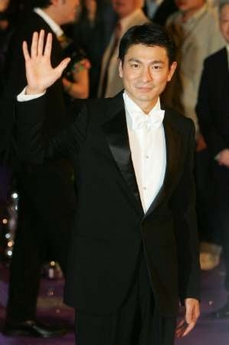 Andy Lau Tak-wah has
signed on to star in a remake of the movie that inspired the 1986 John Woo
gangster classic A Better Tomorrow, a spokeswoman for Lau and the film's
director said. Lau, one of Chinese cinema's biggest stars, has agreed to appear
in the movie called Ying Hong Boon Sik in Cantonese, spokeswoman Alice Tam said
yesterday. He will play a mobster who is betrayed by a close friend, director
Stephen Fung Tak-lun said. Ying Hong Boon Sik is a remake of a 1967 movie by the
same name, Fung said. The 1967 movie inspired A Better Tomorrow, the
Woo-directed action thriller that made Chow Yun-fat's trench-coat wearing,
gun-toting gangster character an icon. It was not immediately clear who is
funding Fung's movie and when he will start shooting. Spokeswoman Emily Wong at
Hong Kong movie company Media Asia, which said earlier it was in talks with Fung
about investing in the movie, said the company was not involved in the project
any more. Fung grabbed headlines recently when Hollywood producer Andrew
Tennenbaum bought the remake rights to the Hong Kong director's comedy Enter The
Phoenix. Tennenbaum produced The Bourne Identity, The Bourne Supremacy and the
upcoming The Bourne Ultimatum. Lau's credits include the kung fu movie House of
Flying Daggers and the crime thriller Infernal Affairs, which was remade by
Martin Scorsese as The Departed. Lau has shot two Chinese historical epics
recently - Three Kingdoms: Resurrection of the Dragon and The Warlords. Lau, who
also sings, is scheduled to launch a concert tour in China this year. Andy Lau Tak-wah has
signed on to star in a remake of the movie that inspired the 1986 John Woo
gangster classic A Better Tomorrow, a spokeswoman for Lau and the film's
director said. Lau, one of Chinese cinema's biggest stars, has agreed to appear
in the movie called Ying Hong Boon Sik in Cantonese, spokeswoman Alice Tam said
yesterday. He will play a mobster who is betrayed by a close friend, director
Stephen Fung Tak-lun said. Ying Hong Boon Sik is a remake of a 1967 movie by the
same name, Fung said. The 1967 movie inspired A Better Tomorrow, the
Woo-directed action thriller that made Chow Yun-fat's trench-coat wearing,
gun-toting gangster character an icon. It was not immediately clear who is
funding Fung's movie and when he will start shooting. Spokeswoman Emily Wong at
Hong Kong movie company Media Asia, which said earlier it was in talks with Fung
about investing in the movie, said the company was not involved in the project
any more. Fung grabbed headlines recently when Hollywood producer Andrew
Tennenbaum bought the remake rights to the Hong Kong director's comedy Enter The
Phoenix. Tennenbaum produced The Bourne Identity, The Bourne Supremacy and the
upcoming The Bourne Ultimatum. Lau's credits include the kung fu movie House of
Flying Daggers and the crime thriller Infernal Affairs, which was remade by
Martin Scorsese as The Departed. Lau has shot two Chinese historical epics
recently - Three Kingdoms: Resurrection of the Dragon and The Warlords. Lau, who
also sings, is scheduled to launch a concert tour in China this year.
The scale of the police investigation into the attacks
targeting New World Development properties in July is one of the biggest in
recent times, according to Director of Crime and Security John Lee Ka-chiu.
Police have so far arrested 32 people aged between 20 and 60. All but one are
men. But Lee declined to comment on whether the mastermind behind the attacks
was among those arrested. "The police have so far interviewed 150 staff of the
New World Group and 400 others who are not part of the group," Lee said
yesterday. "We have also raided and inspected more than 800 premises in
different places and have seized lots of evidence which has been sent to the
government laboratory for examination." He said the investigation involved
various police departments including the Organized Crime and Triad Bureau
because the force was determined to solve a case that is seen as a direct
challenge to the government, the police and the community. He said for the time
being, the police could not divulge further information, such as the possible
motive, as this could affect the investigation. "But we are confident we will
get to the bottom of it," Lee said, adding: "I hope we can say more after the
laboratory's report." The attackers targeted the New World Group's headquarters
in Central, 16 mobile phone shops and two hotels. Among those arrested was the
president of the Hong Kong Muay Thai Association, Lee Yuk-tim. The 50-year-old
man took charge of the Thai boxing association after his release from jail
following a 1996 conviction for being a triad member. Though the vandalism
happened on July 4, it was one of the main points of yesterday's review of crime
in the first six months of this year. The number of drug offenses and drug
seizures soared in the first half of this year though the city's general crime
rate has risen by only 2.3 percent. Police are also very concerned at the number
of juveniles and young persons involved in drug cases, Lee said. A total of 403
youngsters were arrested in relation to drug-related crimes in the first six
months, a 97.5 percent increase from last year's 204 for the same period. Police
seized 42,759 tablets of ecstasy and 444 kilograms of cannabis, both being 12
times the amount seized during the same period last year. Lee said the increase
in drug seizures was the result of the rising supply and demand as well as
better intelligence. He said police will continue to work closely with other
government departments and concerned organizations to crack down on drug crimes
and to educate young people about the dangers drugs posed to their health. The
number of domestic violence cases doubled in the first six months of this year,
from 1,834 in the first half last year to 3,702 this year. Lee said this was
because people were now more willing to report such cases to the police. The
number of rapes and criminal intimidation also rose, 52.6 percent and 32.5
percent respectively, but there was a fall in the number of homicides and bank
robberies. There were a total of 40,357 crimes reported in the first half of
this year, compared with last year's 39, 433.
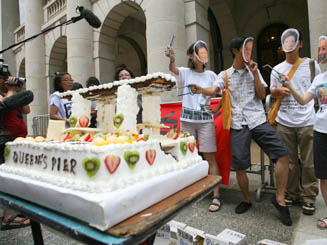 Police may use
force if they are attacked when government workers dismantle Queen's Pier,
possibly before the end of this month, Development Secretary Carrie Lam Cheng
Yuet-ngor warned yesterday. "I pledge that we will not use violence to cordon
off the pier area," she told a Legislative Council panel. "It is not the usual
way we do things." But she added an attack would prompt different tactics. Mrs
Lam said the government was still open to options as to where to rebuild the
54-year-old pier. Mrs Lam, who promised to meet the activists on Sunday in a
public forum, said the government would clear the pier area to avoid further
delays in the Central reclamation project. Police may use
force if they are attacked when government workers dismantle Queen's Pier,
possibly before the end of this month, Development Secretary Carrie Lam Cheng
Yuet-ngor warned yesterday. "I pledge that we will not use violence to cordon
off the pier area," she told a Legislative Council panel. "It is not the usual
way we do things." But she added an attack would prompt different tactics. Mrs
Lam said the government was still open to options as to where to rebuild the
54-year-old pier. Mrs Lam, who promised to meet the activists on Sunday in a
public forum, said the government would clear the pier area to avoid further
delays in the Central reclamation project.
 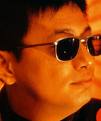 Australian actress still to work with HK director - A
much-anticipated project involving Nicole Kidman and Wong Kar-wai is still
alive, but it is not easy co-ordinating the schedules of the Oscar-winning
actress and Hong Kong director, Kidman’s publicist said on Wednesday. “I can
tell you that they still continue to discuss making the movie together. I
believe it is a matter of both of their schedules, not just Ms Kidman’s,” the
publicist, Catherine Olim, said in an e-mail to AP. Charlotte Yu, a spokesman
for Wong’s production company, Jettone Films, said she did not know the latest
status of the film, tentatively called Lady from Shanghai. Little is known about
the film, and its story has not been made public. Wong was quoted as saying in
May 2005 he had started preparing for the film. A film consultant told AP in
February 2006 that the project was being delayed to 2007 because Wong had not
found a strong male lead. But there are no signs that Wong will start shooting
this year. His English debut, My Blueberry Nights, is scheduled to be released
in November and Wong will likely be tied up with promoting that film until then.
Wong, who was born in Shanghai and moved to the territory at the age of five, is
a Hong Kong icon. He has international reputation for art-house films with
mood-setting visuals and melancholy soundtracks. He has attracted a strong
following among the Hollywood elite despite making mostly Chinese-language
films. His breakthrough film was 1994’sChungking Express in which the tagline
“If my memory of her has an expiration date, let it be 10,000 years...” became a
classical quote for lovers. Happy Together won him the best director title in
the Cannes Festival in 1997. Wong is known for not using detailed scripts for
his films. Many of his films feature famous Hong Kong stars including Maggie
Cheung Man-yuk, Tony Leung Chiu-wai and Faye Wong. Japanese star Takuya Kimura
played a part in the 2004 film 2046.Kidman has been quoted as referring to Wong
as “God”. Other Americans have similar views. Director Sofia Coppola praised
Wong in her Oscar acceptance speech in 2004. Quentin Tarantino lists Wong’s 1994
Chungking Express as one of his favourite films. My Blueberry Nights, the
opening film in this year’s Cannes Festival, features a distinguished cast
including Jude Law, Natalie Portman, Rachel Weisz and Grammy-winning singer
Norah Jones in her film debut. Kidman, the Hawaiian-born Australian actress, won
best actress Oscar for The Hours in 2002. She was most recently seen in Fur: An
Imaginary Portrait of Diane Arbus.
Australian actress still to work with HK director - A
much-anticipated project involving Nicole Kidman and Wong Kar-wai is still
alive, but it is not easy co-ordinating the schedules of the Oscar-winning
actress and Hong Kong director, Kidman’s publicist said on Wednesday. “I can
tell you that they still continue to discuss making the movie together. I
believe it is a matter of both of their schedules, not just Ms Kidman’s,” the
publicist, Catherine Olim, said in an e-mail to AP. Charlotte Yu, a spokesman
for Wong’s production company, Jettone Films, said she did not know the latest
status of the film, tentatively called Lady from Shanghai. Little is known about
the film, and its story has not been made public. Wong was quoted as saying in
May 2005 he had started preparing for the film. A film consultant told AP in
February 2006 that the project was being delayed to 2007 because Wong had not
found a strong male lead. But there are no signs that Wong will start shooting
this year. His English debut, My Blueberry Nights, is scheduled to be released
in November and Wong will likely be tied up with promoting that film until then.
Wong, who was born in Shanghai and moved to the territory at the age of five, is
a Hong Kong icon. He has international reputation for art-house films with
mood-setting visuals and melancholy soundtracks. He has attracted a strong
following among the Hollywood elite despite making mostly Chinese-language
films. His breakthrough film was 1994’sChungking Express in which the tagline
“If my memory of her has an expiration date, let it be 10,000 years...” became a
classical quote for lovers. Happy Together won him the best director title in
the Cannes Festival in 1997. Wong is known for not using detailed scripts for
his films. Many of his films feature famous Hong Kong stars including Maggie
Cheung Man-yuk, Tony Leung Chiu-wai and Faye Wong. Japanese star Takuya Kimura
played a part in the 2004 film 2046.Kidman has been quoted as referring to Wong
as “God”. Other Americans have similar views. Director Sofia Coppola praised
Wong in her Oscar acceptance speech in 2004. Quentin Tarantino lists Wong’s 1994
Chungking Express as one of his favourite films. My Blueberry Nights, the
opening film in this year’s Cannes Festival, features a distinguished cast
including Jude Law, Natalie Portman, Rachel Weisz and Grammy-winning singer
Norah Jones in her film debut. Kidman, the Hawaiian-born Australian actress, won
best actress Oscar for The Hours in 2002. She was most recently seen in Fur: An
Imaginary Portrait of Diane Arbus.
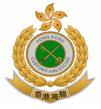
 Hong Kong and United States
customs officers will conduct a series of joint factory observation visits in
Hong Kong from August 10. Head of trade controls for the Hong Kong Customs and
Excise Department, Cheung Sai-yan, said on Wednesday the visits were part of a
policy of co-operation between Hong Kong and US customs. Mr Cheung said they
were needed to ensure legitimate textiles and clothing trade continues, as well
as to combat illegal trans-shipment of textiles and clothing products. “The
joint visits will keep the US updated on the manufacture of textiles and
clothing products in Hong Kong and the implementation of Hong Kong’s origin
control programme for textiles and clothing exports,” he said. Mr Cheung said
the visits would facilitate a better understanding by the US Customs authorities
of the effectiveness of Hong Kong’s origin control system. They would also
ensure that textiles and clothing exports claiming to be products of Hong Kong
are genuinely manufactured in Hong Kong, he added. “This will also be conducive
to the legitimate textiles trade especially at a time when restrictive measures
are still in place against certain textile exports from other economies in the
region,” Mr Cheung said. The joint visiting teams, comprising Hong Kong and US
Customs officers, will inspect only textile factories which have given prior
consent. “Joint visit team members will not undertake any enforcement activities
during the visits. Enforcement activities, if necessary, will be undertaken by
Hong Kong Customs officers independently and separately from the visits,” Mr
Cheung said. The visits will not disrupt the production and operation of
factories. The visits, starting from August 10, will last for about two weeks.
Detailed arrangements about the visits have been announced by the Trade and
Industry Department separately through a Notice to Exporters and Certificate of
Origin Circular. Hong Kong and United States
customs officers will conduct a series of joint factory observation visits in
Hong Kong from August 10. Head of trade controls for the Hong Kong Customs and
Excise Department, Cheung Sai-yan, said on Wednesday the visits were part of a
policy of co-operation between Hong Kong and US customs. Mr Cheung said they
were needed to ensure legitimate textiles and clothing trade continues, as well
as to combat illegal trans-shipment of textiles and clothing products. “The
joint visits will keep the US updated on the manufacture of textiles and
clothing products in Hong Kong and the implementation of Hong Kong’s origin
control programme for textiles and clothing exports,” he said. Mr Cheung said
the visits would facilitate a better understanding by the US Customs authorities
of the effectiveness of Hong Kong’s origin control system. They would also
ensure that textiles and clothing exports claiming to be products of Hong Kong
are genuinely manufactured in Hong Kong, he added. “This will also be conducive
to the legitimate textiles trade especially at a time when restrictive measures
are still in place against certain textile exports from other economies in the
region,” Mr Cheung said. The joint visiting teams, comprising Hong Kong and US
Customs officers, will inspect only textile factories which have given prior
consent. “Joint visit team members will not undertake any enforcement activities
during the visits. Enforcement activities, if necessary, will be undertaken by
Hong Kong Customs officers independently and separately from the visits,” Mr
Cheung said. The visits will not disrupt the production and operation of
factories. The visits, starting from August 10, will last for about two weeks.
Detailed arrangements about the visits have been announced by the Trade and
Industry Department separately through a Notice to Exporters and Certificate of
Origin Circular.
 China:
U.S. Treasury Secretary Henry Paulson will travel to China at the end of this
week to meet with government officials and discuss the U.S.-China Strategic
Economic Dialogue (SED), according to a statement issued Tuesday by the Treasury
Department. "This trip is part of an ongoing process to strengthen our strategic
economic relationship -- to address long term issues such as working with China
to rebalance its growth and increase the flexibility of its currency, and also
to address short term issues as they arise," Paulson said in the statement.
Paulson will meet with Chinese leaders in Beijing to discuss a broad range of
issues that are critical to the U.S.-China economic relationship. e is expected
to raise with Chinese leadership issues of concern to the U.S. Congress in his
meetings there, as well as follow up on action items that were identified at the
last meeting of the SED in May, the statement said. Paulson will begin his trip
with a visit to Qinghai Lake on July 30. On July 31, Paulson will travel to
Beijing where he will spend Tuesday and Wednesday meeting with Chinese officials
including President Hu Jintao and Vice Premier Wu Yi, according to the
statement. The SED mechanism, jointly initiated by Chinese President Hu Jintao
and U.S. President George W. Bush in September last year, serves as a platform
for both sides to discuss long-term, strategic and comprehensive issues in
bilateral trade relationship. The next or third SED will be held in Beijing in
December this year.
China:
U.S. Treasury Secretary Henry Paulson will travel to China at the end of this
week to meet with government officials and discuss the U.S.-China Strategic
Economic Dialogue (SED), according to a statement issued Tuesday by the Treasury
Department. "This trip is part of an ongoing process to strengthen our strategic
economic relationship -- to address long term issues such as working with China
to rebalance its growth and increase the flexibility of its currency, and also
to address short term issues as they arise," Paulson said in the statement.
Paulson will meet with Chinese leaders in Beijing to discuss a broad range of
issues that are critical to the U.S.-China economic relationship. e is expected
to raise with Chinese leadership issues of concern to the U.S. Congress in his
meetings there, as well as follow up on action items that were identified at the
last meeting of the SED in May, the statement said. Paulson will begin his trip
with a visit to Qinghai Lake on July 30. On July 31, Paulson will travel to
Beijing where he will spend Tuesday and Wednesday meeting with Chinese officials
including President Hu Jintao and Vice Premier Wu Yi, according to the
statement. The SED mechanism, jointly initiated by Chinese President Hu Jintao
and U.S. President George W. Bush in September last year, serves as a platform
for both sides to discuss long-term, strategic and comprehensive issues in
bilateral trade relationship. The next or third SED will be held in Beijing in
December this year.
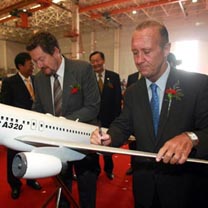 Xi'an Aircraft Company (XAC), a
subsidiary of China Aviation Industry Corporation I (AVIC I), yesterday made its
first delivery of an Airbus A319 wing box - making the country Airbus' only wing
box manufacturer outside Europe. The wing box, or the main body of the wing and
among the toughest structural parts of an aircraft, is valued $1.75 million per
set. It will be dispatched to the Airbus assembly plant in Broughton in the UK.
"Airbus has ordered 250 sets of wing boxes from our company. We expect to make
two sets this year. Production will pick up to four sets per month by the end of
2009, and then to six sets per month in 2010," Tang Jun, vice-president of XAC,
told China Daily. Airbus plans to increase its subcontract volume in China from
the current $60 million to $120 million by 2010, about 50 percent of which will
be contributed by the overall wing program, according to company sources.
Yesterday's delivery signals important progress in China's aircraft
manufacturing industry, Tang said. The A319 wing box is the largest and most
complicated Airbus aircraft component a Chinese aviation manufacturer has ever
made. The wing box is the third phase of the long-term technological partnership
between Airbus and China's aviation industry, which started eight years ago. The
first two phases covered technology transfer of wing leading edge track ribs,
and wing leading edge and trailing edge packages. The delivery "reaffirms
Airbus' commitment to a meaningful partnership with China," said Laurence
Barron, Airbus China president. According to Tang, XAC and Airbus are in talks
on more wing-related technology transfer. China expects to obtain the rest of
the wing-related contracts from Airbus by 2009, said Yang Chunsheng, a senior
executive with China National Aero-Technology Import & Export Corporation. If
that comes true, he said, "Xi'an will be able to directly provide Airbus wings
to the future A320 assembly line in Tianjin." Airbus and Chinese partners
officially signed an agreement last month to open the assembly line there to
produce the European aircraft manufacturer's A320 jets. The plant is expected to
deliver its first aircraft in early 2009, Airbus said. The assembly line will be
able to produce four A320s a month by 2011 and a total of about 300 A320 planes
by 2016, the company said. Xi'an Aircraft Company (XAC), a
subsidiary of China Aviation Industry Corporation I (AVIC I), yesterday made its
first delivery of an Airbus A319 wing box - making the country Airbus' only wing
box manufacturer outside Europe. The wing box, or the main body of the wing and
among the toughest structural parts of an aircraft, is valued $1.75 million per
set. It will be dispatched to the Airbus assembly plant in Broughton in the UK.
"Airbus has ordered 250 sets of wing boxes from our company. We expect to make
two sets this year. Production will pick up to four sets per month by the end of
2009, and then to six sets per month in 2010," Tang Jun, vice-president of XAC,
told China Daily. Airbus plans to increase its subcontract volume in China from
the current $60 million to $120 million by 2010, about 50 percent of which will
be contributed by the overall wing program, according to company sources.
Yesterday's delivery signals important progress in China's aircraft
manufacturing industry, Tang said. The A319 wing box is the largest and most
complicated Airbus aircraft component a Chinese aviation manufacturer has ever
made. The wing box is the third phase of the long-term technological partnership
between Airbus and China's aviation industry, which started eight years ago. The
first two phases covered technology transfer of wing leading edge track ribs,
and wing leading edge and trailing edge packages. The delivery "reaffirms
Airbus' commitment to a meaningful partnership with China," said Laurence
Barron, Airbus China president. According to Tang, XAC and Airbus are in talks
on more wing-related technology transfer. China expects to obtain the rest of
the wing-related contracts from Airbus by 2009, said Yang Chunsheng, a senior
executive with China National Aero-Technology Import & Export Corporation. If
that comes true, he said, "Xi'an will be able to directly provide Airbus wings
to the future A320 assembly line in Tianjin." Airbus and Chinese partners
officially signed an agreement last month to open the assembly line there to
produce the European aircraft manufacturer's A320 jets. The plant is expected to
deliver its first aircraft in early 2009, Airbus said. The assembly line will be
able to produce four A320s a month by 2011 and a total of about 300 A320 planes
by 2016, the company said.
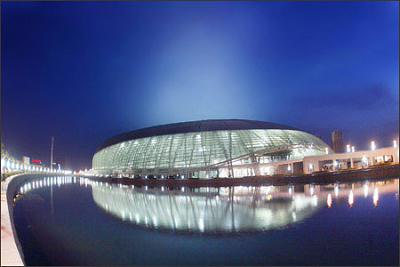 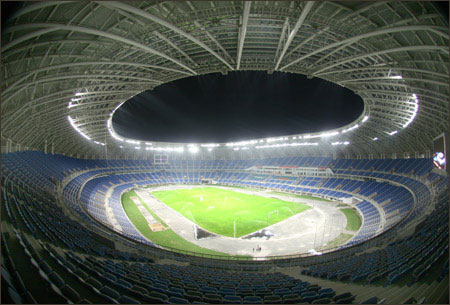 The outside of the Tianjin Olympic Center Stadium. After
over 1,000 days of construction, the stadium is now on its way toward
inauguration.
The outside of the Tianjin Olympic Center Stadium. After
over 1,000 days of construction, the stadium is now on its way toward
inauguration.
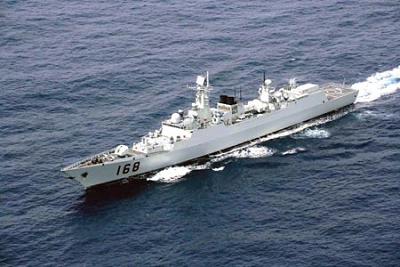 Guided missile destroyer Guangzhou. Two Chinese naval vessels left Hainan on
Tuesday for an 87-day tour that will take them to Russia, Britain, Spain and
France. Two Chinese naval vessels left Sanya, Hainan, on Tuesday for an 87-day
tour that will take them to Russia, Britain, Spain and France. The guided
missile destroyer Guangzhou and the supply ship Weishanhu are under the command
of Major General Su Zhiqian, deputy commander of the South China Sea Fleet of
the Chinese Navy. The Guangzhou -- 155 meters long, 16 meters wide and with a
displacement of 5,850 tons -- is said to be one of China's newest naval vessels.
The two ships will travel more than 23,000 nautical miles, stopping in Russia's
Saint Petersburg, Britain's Portsmouth, Spain's Cadiz, and France's Toulon in
succession. More than 500 soldiers and officers are on board the vessels. They
will join activities for the Year of China in Saint Petersburg and hold joint
rescue exercises with the British, Spanish and French navies.
Guided missile destroyer Guangzhou. Two Chinese naval vessels left Hainan on
Tuesday for an 87-day tour that will take them to Russia, Britain, Spain and
France. Two Chinese naval vessels left Sanya, Hainan, on Tuesday for an 87-day
tour that will take them to Russia, Britain, Spain and France. The guided
missile destroyer Guangzhou and the supply ship Weishanhu are under the command
of Major General Su Zhiqian, deputy commander of the South China Sea Fleet of
the Chinese Navy. The Guangzhou -- 155 meters long, 16 meters wide and with a
displacement of 5,850 tons -- is said to be one of China's newest naval vessels.
The two ships will travel more than 23,000 nautical miles, stopping in Russia's
Saint Petersburg, Britain's Portsmouth, Spain's Cadiz, and France's Toulon in
succession. More than 500 soldiers and officers are on board the vessels. They
will join activities for the Year of China in Saint Petersburg and hold joint
rescue exercises with the British, Spanish and French navies.
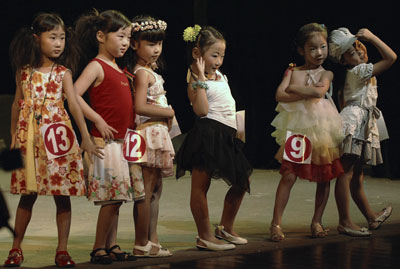 Children perform onstage during a modeling
competition in Hefei in eastern China's Anhui province July 25, 2007. About 200
children aged 4 to 16 took part in the competition, according to local media.
Children perform onstage during a modeling
competition in Hefei in eastern China's Anhui province July 25, 2007. About 200
children aged 4 to 16 took part in the competition, according to local media.
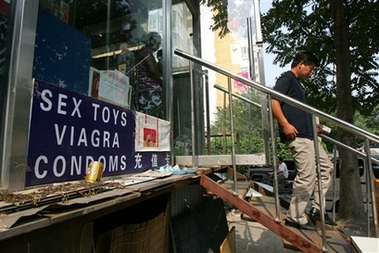 A man emerges after buying a pack of
cigarettes at a store that also offers viagra in Beijing, China, in this July 2,
2007 file photo. Chinese police have cracked four criminal networks that made
fake Viagra, Tamiflu and anti-malaria drugs and sold them within China and to
customers in Southeast Asia, the United States and Europe - China announced
Wednesday that it is strengthening its food safety regulations in the wake of
discoveries of toxic chemicals that prompted a slew of international bans and
recalls on its exports. China also announced that it had busted criminal
networks that made fake bird flu medicine, anti-malaria drugs, Viagra and
toothpaste. The government said on its Web site that the Cabinet had passed a
draft regulation that "strictly regulates the activities of producers,
strengthens the responsibility of local governments and increases the punishment
for illegal activities." No details were given, but the government said Premier
Wen Jiabao attended the State Council meeting, an indication of high-level
concern about the problem. "Product quality and food safety concerns the health
and the life of the people, it concerns the trustworthiness of companies and the
image of the country," the statement said. "We must attach great importance to
the matter."' The regulation goes into effect after publication by the State
Council. The government did not say when that would occur. The government said
the fake-drug rings were busted between August 2005 and May 2006 and involved
gangs across the country, two of which sold their products via the Internet or
by e-mail, according to the Ministry of Public Security. The announcement,
posted late Tuesday on the government's Web site, did not say what happened to
the suspects, if anyone was sickened as a result or why the information was
released only now. A woman who answered the telephone Wednesday at the ministry
said the cases were among the 10 largest in a yearlong campaign against
counterfeits that began in March 2006. China recently executed the former head
of its food and drug watchdog for approving untested medicine for cash,
including an antibiotic that killed at least 10 people.
A man emerges after buying a pack of
cigarettes at a store that also offers viagra in Beijing, China, in this July 2,
2007 file photo. Chinese police have cracked four criminal networks that made
fake Viagra, Tamiflu and anti-malaria drugs and sold them within China and to
customers in Southeast Asia, the United States and Europe - China announced
Wednesday that it is strengthening its food safety regulations in the wake of
discoveries of toxic chemicals that prompted a slew of international bans and
recalls on its exports. China also announced that it had busted criminal
networks that made fake bird flu medicine, anti-malaria drugs, Viagra and
toothpaste. The government said on its Web site that the Cabinet had passed a
draft regulation that "strictly regulates the activities of producers,
strengthens the responsibility of local governments and increases the punishment
for illegal activities." No details were given, but the government said Premier
Wen Jiabao attended the State Council meeting, an indication of high-level
concern about the problem. "Product quality and food safety concerns the health
and the life of the people, it concerns the trustworthiness of companies and the
image of the country," the statement said. "We must attach great importance to
the matter."' The regulation goes into effect after publication by the State
Council. The government did not say when that would occur. The government said
the fake-drug rings were busted between August 2005 and May 2006 and involved
gangs across the country, two of which sold their products via the Internet or
by e-mail, according to the Ministry of Public Security. The announcement,
posted late Tuesday on the government's Web site, did not say what happened to
the suspects, if anyone was sickened as a result or why the information was
released only now. A woman who answered the telephone Wednesday at the ministry
said the cases were among the 10 largest in a yearlong campaign against
counterfeits that began in March 2006. China recently executed the former head
of its food and drug watchdog for approving untested medicine for cash,
including an antibiotic that killed at least 10 people.
 Ion network - 3i is a
leading private equity business with a history of 62 years. Established in 1945
with funding from the Bank of England, UK clearing banks and the City, seasoned
entrepreneur William Piercy (later Lord Piercy) was appointed to manage the
initial fund. 3i Group listed in London in 1994 and remains the only FTSE 100
Private Equity business, with five different asset classes and $14.3 billion
under management. The company has invested over $250 million in many well-known
Chinese companies, such as: Focus Media, Chinas largest multi-channel
advertising media company; D.Phone, one of China's earliest mobile phone
retailers; PCD, established by Ports CEO, a high-end department store; and Inner
Mongolia Little Sheep Catering Chain Co, China's leading retail hotpot
restaurant chain. 3i is currently invested in more than 500 businesses
worldwide. At least 60 of these businesses operate in Asia, of which more than
35 are in China. Lily Jin was voted the best venture capitalist in 2006 by
Forbes for her investments in Mengniu Dairy and Suntech Power. Ion network - 3i is a
leading private equity business with a history of 62 years. Established in 1945
with funding from the Bank of England, UK clearing banks and the City, seasoned
entrepreneur William Piercy (later Lord Piercy) was appointed to manage the
initial fund. 3i Group listed in London in 1994 and remains the only FTSE 100
Private Equity business, with five different asset classes and $14.3 billion
under management. The company has invested over $250 million in many well-known
Chinese companies, such as: Focus Media, Chinas largest multi-channel
advertising media company; D.Phone, one of China's earliest mobile phone
retailers; PCD, established by Ports CEO, a high-end department store; and Inner
Mongolia Little Sheep Catering Chain Co, China's leading retail hotpot
restaurant chain. 3i is currently invested in more than 500 businesses
worldwide. At least 60 of these businesses operate in Asia, of which more than
35 are in China. Lily Jin was voted the best venture capitalist in 2006 by
Forbes for her investments in Mengniu Dairy and Suntech Power.
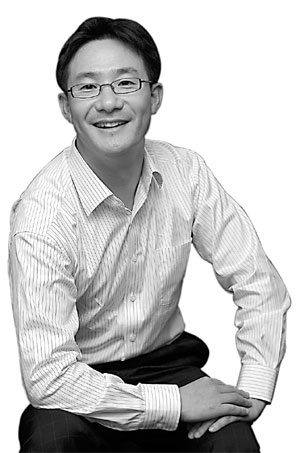 Art of
investment - Profile of Li Jianguang - 2000: Vice-President and Partner of IDGVC;
1999: Assistant General Manager, Tintic Trust & Investment; 1994: Manager,
Crosby Group, Beijing Representative Office; 1987: Research Fellow, Chinese
Academy of Social Sciences; 1987: Graduated from Peking University, Economics
Department. IDG Technology Venture Investment (IDGVC Partners) is one of the
most prestigious venture capital firms in China. Since it was first established
in 1992 with offices in Beijing, Shanghai, Guangzhou, Boston and the Silicon
Valley, the organization has invested in a group of unknown start-ups in the
country that later became big names - like Baidu, Focus Media, Sohu, Tencent,
EachNet, Dangdang and Ctrip. One of the earliest US venture capital firms to
enter the Chinese market, IDGVC Partners invests in early to growth-stage
companies and is focused on hi-tech sectors like the Internet,
telecommunications, wireless communications, digital media, IC (integrated
circuit) and life science. It manages over $800 million in capital and has an
investment portfolio of 100 start-up companies, 30 of which have completed
public offerings or successful mergers. Earlier this month, IDG Partners
announced it had successfully raised $510 million in investment for its
IDG-Accel China Fund II in just 45 days. On the eve of the company's new round
of investing, Li Jianguang, vice-president and partner of IDGVC Partners, sat
down with China Business Weekly reporter Wang Xing to talk about the art of
investment. Art of
investment - Profile of Li Jianguang - 2000: Vice-President and Partner of IDGVC;
1999: Assistant General Manager, Tintic Trust & Investment; 1994: Manager,
Crosby Group, Beijing Representative Office; 1987: Research Fellow, Chinese
Academy of Social Sciences; 1987: Graduated from Peking University, Economics
Department. IDG Technology Venture Investment (IDGVC Partners) is one of the
most prestigious venture capital firms in China. Since it was first established
in 1992 with offices in Beijing, Shanghai, Guangzhou, Boston and the Silicon
Valley, the organization has invested in a group of unknown start-ups in the
country that later became big names - like Baidu, Focus Media, Sohu, Tencent,
EachNet, Dangdang and Ctrip. One of the earliest US venture capital firms to
enter the Chinese market, IDGVC Partners invests in early to growth-stage
companies and is focused on hi-tech sectors like the Internet,
telecommunications, wireless communications, digital media, IC (integrated
circuit) and life science. It manages over $800 million in capital and has an
investment portfolio of 100 start-up companies, 30 of which have completed
public offerings or successful mergers. Earlier this month, IDG Partners
announced it had successfully raised $510 million in investment for its
IDG-Accel China Fund II in just 45 days. On the eve of the company's new round
of investing, Li Jianguang, vice-president and partner of IDGVC Partners, sat
down with China Business Weekly reporter Wang Xing to talk about the art of
investment.
US-based Westinghouse Electric
yesterday signed a multi-billion-dollar deal with mainland partners to build
four nuclear reactors in eastern China, clinching a pact agreed between Beijing
and Washington seven months ago.
Pirated software worth US$500
million (HK$3.9 billion), including counterfeit Microsoft and Symantec products,
has been seized in a long-running joint probe by Chinese police and the US
Federal Bureau of Investigation, officials from both countries said yesterday.
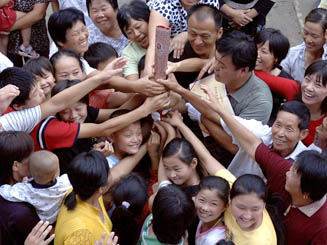 An Jiankun (with certificate) and residents of flood-hit Yingnan village in
Anhui province clutch a 2008 Beijing Olympic Games torch. Mr An, who is the
village's party leader, was named the first torchbearer for the Olympic Games
from the province because of his good performance during the floods, local media
had reported.
An Jiankun (with certificate) and residents of flood-hit Yingnan village in
Anhui province clutch a 2008 Beijing Olympic Games torch. Mr An, who is the
village's party leader, was named the first torchbearer for the Olympic Games
from the province because of his good performance during the floods, local media
had reported.
July 25, 2007
 Hong Kong:
On their second day of trading,
units of the HSBC China Dragon Fund (0820) soared 41.5 percent on heavy
turnover, driven by the irrational exuberance of foreign funds and asset
managers toward the A-share market, analysts said. Hong Kong:
On their second day of trading,
units of the HSBC China Dragon Fund (0820) soared 41.5 percent on heavy
turnover, driven by the irrational exuberance of foreign funds and asset
managers toward the A-share market, analysts said.
Six former and incumbent senior
executives of listed property developer Grand Field Group Holdings (0115) and
securities and commodities broker Upbest Group (0335) have been charged by the
Independent Commission Against Corruption with alleged conspiracy to defraud
shareholders and the stock exchange.
Billions continue to pour into
mainland equity markets regardless of new monetary measures unveiled on Friday
to tighten the liquidity tap. And the interest rate increase appears to have
done little to slow the bull run in Hong Kong.
Mainland commercial banks have sold
13 billion yuan (HK$13.42 billion) worth of financial products associated with
the qualified domestic institutional investor scheme by the end of last month,
accounting for 26 percent of the 50 billion yuan QDII quotas, according to the
banking regulator.
The former Communist Party boss of
Shanghai - the highest-level party official to be dismissed in a decade - is
closer to being punished in a corruption scandal, a Hong Kong newspaper reported
yesterday.
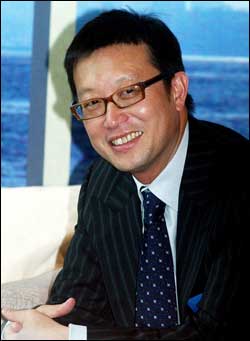 The Hong Kong
director whose movie inspired Oscar-winner The Departed plans to make his
television debut with a Chinese- language kung fu series based on a comic book.
Andrew Lau Wai-keung said in an interview with the Chinese news website Sina.com
that he hopes the series, called A Bi Jian in Chinese, will also spawn a movie
and an online game. Footage of the interview was posted on Sina.com yesterday.
Lau said he wants to give TV a try because it does not have the same time
constraints as a movie. "After making a movie, maybe you weren't able to shoot
many of your ideas, because a movie is only 1 or two hours long, but TV gives
you space to film a lot of things." Lau rose to fame after making the 2002 crime
thriller Infernal Affairs, which was remade by Martin Scorsese as The Departed,
starring Leonardo DiCaprio, Jack Nicholson and Matt Damon. It won the Best
Picture Oscar at the 2007 Academy Awards. Lau has since shot the Hollywood movie
The Flock, starring Richard Gere and Claire Danes. Lau said he plans to devote
the same resources to his TV show as a movie, including computer special
effects. "I want to put elements from movies into TV to raise the quality of
TV," he said. The director did not say how many episodes his new series will
comprise or how much it will cost. He also did not give a shooting schedule or
say if anyone had commissioned the show. Calls to Lau's office seeking more
detail on the project went unanswered. Sina.com said he visited Beijing recently
to cast for the show. The Hong Kong
director whose movie inspired Oscar-winner The Departed plans to make his
television debut with a Chinese- language kung fu series based on a comic book.
Andrew Lau Wai-keung said in an interview with the Chinese news website Sina.com
that he hopes the series, called A Bi Jian in Chinese, will also spawn a movie
and an online game. Footage of the interview was posted on Sina.com yesterday.
Lau said he wants to give TV a try because it does not have the same time
constraints as a movie. "After making a movie, maybe you weren't able to shoot
many of your ideas, because a movie is only 1 or two hours long, but TV gives
you space to film a lot of things." Lau rose to fame after making the 2002 crime
thriller Infernal Affairs, which was remade by Martin Scorsese as The Departed,
starring Leonardo DiCaprio, Jack Nicholson and Matt Damon. It won the Best
Picture Oscar at the 2007 Academy Awards. Lau has since shot the Hollywood movie
The Flock, starring Richard Gere and Claire Danes. Lau said he plans to devote
the same resources to his TV show as a movie, including computer special
effects. "I want to put elements from movies into TV to raise the quality of
TV," he said. The director did not say how many episodes his new series will
comprise or how much it will cost. He also did not give a shooting schedule or
say if anyone had commissioned the show. Calls to Lau's office seeking more
detail on the project went unanswered. Sina.com said he visited Beijing recently
to cast for the show.
Parents who think they can secure
places in elite schools for their children are "living in a fantasy world,"
according to the headmaster of a prestigious secondary school. The warning came
from Terence Chang Cheuk-cheung, headmaster of Diocesan Boys' School - a
secondary school in Mong Kok with a reputation of being a "through train" for
students from other educational institutions in the territory. Chang said
yesterday parents must not be misled by the case of a woman teacher at the elite
Diocesan Preparatory School in Kowloon Tong who was arrested by graftbusters
over the weekend on suspicion of collecting and soliciting more than HK$700,000
from various parents to secure places at the school for their children. The
suspect, who was responsible for handling student admissions at the aided
institution on Chester Road, was picked in a sting operation by officers of the
Independent Commission Against Corruption as she was allegedly being paid a
second installment of HK$70,000 by a parent at a restaurant in the Festival Walk
shopping complex in Kowloon Tong. It is also alleged the woman had approached
three other parents and solicited advantages from them, claiming she could get
their children admitted to her school. ICAC investigations revealed that two of
the parents had allegedly paid the suspect HK$20,000 and HK$580,000,
respectively.
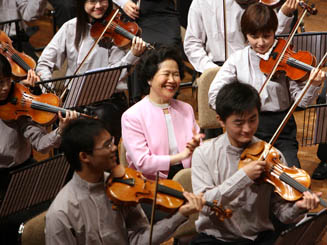 Former chief
secretary Anson Chan Fang On-sang said yesterday she was very disappointed with
the government green paper on the ways to achieve universal suffrage, as it
seemed to be "a recipe of confusion and procrastination". Mrs Chan said remarks
by Chief Secretary Henry Tang Ying-yen, who said the public's opinions "would
only be a reference point, instead of the determining factor in the
consultation", did not match those of Chief Executive Donald Tsang Yam-kuen
during his election campaign. Former chief
secretary Anson Chan Fang On-sang said yesterday she was very disappointed with
the government green paper on the ways to achieve universal suffrage, as it
seemed to be "a recipe of confusion and procrastination". Mrs Chan said remarks
by Chief Secretary Henry Tang Ying-yen, who said the public's opinions "would
only be a reference point, instead of the determining factor in the
consultation", did not match those of Chief Executive Donald Tsang Yam-kuen
during his election campaign.
A District Court judge on Tuesday ordered the arrest of a
former chairman of Semtech International Holdings after he failed to turn up to
hear a verdict over his bribery charges. The lawyer representing Derek Wong
Chong-kwong, who was accused of bribing agents in return for promoting his
company’s shares, told the court several attempts to contact his client by
telephone on Tuesday were unsuccessful. The court was to originally deliver a
verdict on Tuesday morning on the case involving Wong and two others. Wong’s
counsel said he could not get in touch with him since their last telephone
conversation dated last Tuesday. The lawyer told the court he believed Wong
could have possibly met some accident. Judge Colin Mackintosh issued an arrest
order on Wong and adjourned the case until Tuesday afternoon. The judge also
required the defence counsel to contact people who last saw Wong. He said the
aim was to obtain information to help determine whether Wong had breached bail
conditions or his absence was due to causes beyond his control. Wong, 37, has
pleaded not guilty to two counts of offering advantages to an agent. The alleged
offences, which took place in 2004, involved some HK$500,000 in bribes. Two
co-defendants, Earnest Leung Chi-wah and Yung Ka-tim, both 48, appeared in court
on Tuesday. They have denied a count of accepting an advantage as an agent.
 China:
Peacekeeping - a rising role for China's PLA -
Currently,
1,643 Chinese peacekeepers are serving on UN missions to help secure peace and
order in war-torn countries.
China:
Peacekeeping - a rising role for China's PLA -
Currently,
1,643 Chinese peacekeepers are serving on UN missions to help secure peace and
order in war-torn countries.
Southeast Asian nations and China
are on track to establishing a free trade pact with just a number of details to
be ironed out, a senior ASEAN official said Monday. "We are on track on (the)
ASEAN-China" free trade area, said Ong Keng Yong, secretary-general of the
10-member Association of Southeast Asian Nations. Trade between China and ASEAN,
expanding by nearly 40 percent a year, is likely to exceed US$200 billion a year
by 2008, two years before the free trade area is due to be established in 2010.
"By 2010 is well within our expectations," Ong said on the sidelines of a
luncheon with American business leaders in Singapore. Plans were set in 2002 for
a free trade area with China that will create a market of about 1.8 billion
consumers -- more than a quarter of humanity -- and trade totaling more than
US$2 trillion (euro1.6 trillion). Countries have already begun slashing tariffs
on some products, though tough negotiations continue on loosening trade
restrictions for finance and other service industries. "Some services still
(need) to be ironed out," Ong said, without elaborating. He said negotiations on
how the agreement will cover investments between the China and ASEAN will
hopefully be completed by the end of the year. ASEAN is a key market for Chinese
manufacturers, as well as a source for energy, rubber, minerals and other
natural resources. ASEAN's members are Brunei, Cambodia, Indonesia, Laos,
Malaysia, Myanmar, Philippines, Singapore, Thailand and Vietnam -- countries
ranging from some of Southeast Asia's most affluent to some of its poorest.
 Sex, a centuries-old taboo considered by most of Chinese, is creating a buzz in
this conservative country. Claims that approximately 25 percent of Chinese
adults had multiple sex partners in 2006 by Pan Suiming, director of Institute
of Sexuality and Gender at Renmin University of China, has prompted society to
open debate over whether China has become morally corrupted. Pan said having
multiple sex partners is partially indicative of a sexual revolution, during an
interview with Life Times on July 6. Touching the surface of a topic the whole
nation is trying to avoid, the sexl scholar believes the Chinese are getting
closer to an open and transparent attitude toward sex. Pan's shocking claims
were part of his survey Chinese's sexual behaviors and relations: 2000-2006 of
6,010 Chinese aged between 18-61. The sex survey asks about premarital sex and
homosexuality, both of which are on the rise on the back of the country's
double-digit economic growth. The practice of having sex with more than one
other person gained a momentum in the last few years. Its rate occurrence
advanced to 25.3 percent in 2006, from 16.9 percent in 2000, a seven percent
increase from the same period last year. The figure was six percent in the
1980s, a time when China launched its reform and began opening up its economy to
the rest of the world. Pan's findings are unpopular, as many believe the
sharp-rise in people having more than one sexual partner indicates the country
is on the verge of falling from morality. "Loyalty to marriage is an enduring
theme of society and has a deep place in people's souls. His findings cannot
change that fact," a netizen, only identified by his nickname Xiao.Xiao.Xiao
wrote on the popular qq.com. But the expert defied public opinions, arguing the
results of his survey marked a progress in people's attitude toward sex. His
findings indicate women, usually passive in sex, are becoming more active in the
bedroom. "The exodus of women from rural areas to urban cities has contributed
to the changes in women," explained Pan. He added that the improvement in
women's education is helping them get rid of the conventional stereotype that
women are for bearing and raising offspring for men. "The longing for of love
and happiness has led to changes in women's attitudes toward sex," said Pan.
"And easy access to abortions and birth control have also had a great impact on
women." Of course, a sex revolution isn't just about a variety of spiced-up
sexual activities. "A harmonious society must include sex, which is no longer a
revolution but a part of our lives," said Pan.
Sex, a centuries-old taboo considered by most of Chinese, is creating a buzz in
this conservative country. Claims that approximately 25 percent of Chinese
adults had multiple sex partners in 2006 by Pan Suiming, director of Institute
of Sexuality and Gender at Renmin University of China, has prompted society to
open debate over whether China has become morally corrupted. Pan said having
multiple sex partners is partially indicative of a sexual revolution, during an
interview with Life Times on July 6. Touching the surface of a topic the whole
nation is trying to avoid, the sexl scholar believes the Chinese are getting
closer to an open and transparent attitude toward sex. Pan's shocking claims
were part of his survey Chinese's sexual behaviors and relations: 2000-2006 of
6,010 Chinese aged between 18-61. The sex survey asks about premarital sex and
homosexuality, both of which are on the rise on the back of the country's
double-digit economic growth. The practice of having sex with more than one
other person gained a momentum in the last few years. Its rate occurrence
advanced to 25.3 percent in 2006, from 16.9 percent in 2000, a seven percent
increase from the same period last year. The figure was six percent in the
1980s, a time when China launched its reform and began opening up its economy to
the rest of the world. Pan's findings are unpopular, as many believe the
sharp-rise in people having more than one sexual partner indicates the country
is on the verge of falling from morality. "Loyalty to marriage is an enduring
theme of society and has a deep place in people's souls. His findings cannot
change that fact," a netizen, only identified by his nickname Xiao.Xiao.Xiao
wrote on the popular qq.com. But the expert defied public opinions, arguing the
results of his survey marked a progress in people's attitude toward sex. His
findings indicate women, usually passive in sex, are becoming more active in the
bedroom. "The exodus of women from rural areas to urban cities has contributed
to the changes in women," explained Pan. He added that the improvement in
women's education is helping them get rid of the conventional stereotype that
women are for bearing and raising offspring for men. "The longing for of love
and happiness has led to changes in women's attitudes toward sex," said Pan.
"And easy access to abortions and birth control have also had a great impact on
women." Of course, a sex revolution isn't just about a variety of spiced-up
sexual activities. "A harmonious society must include sex, which is no longer a
revolution but a part of our lives," said Pan.
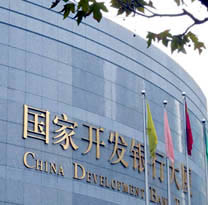 China
Development Bank's Shanghai branch. The bank dramatically increased its
international profile by announcing that it will buy up to 5% in London-based
Barclays. China
Development Bank's Shanghai branch. The bank dramatically increased its
international profile by announcing that it will buy up to 5% in London-based
Barclays.
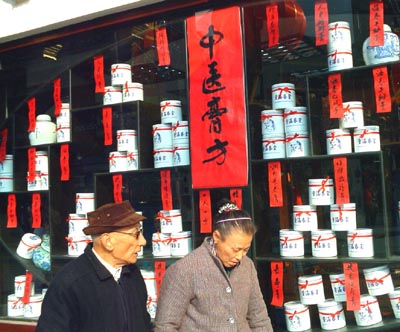 A traditional Chinese
medicine store in Shanghai. Some drugmakers are raising funds overseas to bring
companies up to modern pharmaceutical industry standards. China Shenghuo
Pharmaceutical Holdings Inc, the first traditional Chinese medicine (TCM) maker
on the American Stock Exchange, plans to raise as much as $300 million in the
coming years to build a large, modern pharmaceutical company producing
traditional herbal medicine. The company specializes in panax notoginseng, the
Latin name for a root that is used to treat wounds, bleeding and even internal
blood disorders. Shenghuo aims to raise $10-20 million from additional share
sales later this quarter to fund growth for the medium-sized company based in
Kunming, Southwest China's Yunnan Province, an area that boasts rich herbal
medicine resources. As the Chinese pharmaceutical industry is expected to
consolidate and companies realize the importance of innovation and
brand-building, private firms with plans for expansion have turned to overseas
investors for funds. "This is such a huge industry, we could not be successful
without more investment," said Lan Guihua, chairman and CEO of Shenghuo.
Shenghuo floated its stock in June through a backdoor listing using a share
exchange program with a United States firm by selling 2.6486 million shares
priced at $3.5. In March, Tongjitang Technology, a company in neighboring
Guizhou, became the first TCM maker to list on the New York Stock Exchange, when
it raised $120 million. Guo Yunpei, deputy chief editor of China Medicine News,
said the situation in China is similar to the pharmaceutical industry in the US
at one time, when there were over 3,000 drugmakers - yet after intense
consolidation, there are now only about 500.
A traditional Chinese
medicine store in Shanghai. Some drugmakers are raising funds overseas to bring
companies up to modern pharmaceutical industry standards. China Shenghuo
Pharmaceutical Holdings Inc, the first traditional Chinese medicine (TCM) maker
on the American Stock Exchange, plans to raise as much as $300 million in the
coming years to build a large, modern pharmaceutical company producing
traditional herbal medicine. The company specializes in panax notoginseng, the
Latin name for a root that is used to treat wounds, bleeding and even internal
blood disorders. Shenghuo aims to raise $10-20 million from additional share
sales later this quarter to fund growth for the medium-sized company based in
Kunming, Southwest China's Yunnan Province, an area that boasts rich herbal
medicine resources. As the Chinese pharmaceutical industry is expected to
consolidate and companies realize the importance of innovation and
brand-building, private firms with plans for expansion have turned to overseas
investors for funds. "This is such a huge industry, we could not be successful
without more investment," said Lan Guihua, chairman and CEO of Shenghuo.
Shenghuo floated its stock in June through a backdoor listing using a share
exchange program with a United States firm by selling 2.6486 million shares
priced at $3.5. In March, Tongjitang Technology, a company in neighboring
Guizhou, became the first TCM maker to list on the New York Stock Exchange, when
it raised $120 million. Guo Yunpei, deputy chief editor of China Medicine News,
said the situation in China is similar to the pharmaceutical industry in the US
at one time, when there were over 3,000 drugmakers - yet after intense
consolidation, there are now only about 500.
China will spend 620 billion yuan
(82 billion U.S. dollars) building subways and urban railways in 15 major cities
in the next ten years to ease traffic jams, according to the Ministry of
Construction. Around 1,700 kilometers of light rail systems will be built in the
15 cities, including Beijing, Shanghai, Guangzhou, Chongqing, Shenzhen and some
provincial capitals. Currently, there are only 22 urban rail lines with a total
length of 602.3 kilometers in operation or in trial operation in China, mainly
in Beijing, Shanghai and Guangzhou, according to ministry's statistics. An
official with the ministry said that 36 urban rail lines are under construction
in 12 cities.
Air China Ltd., the official airline
partner for the 2008 Beijing Olympics, is working to cut delays and improve
employees' English language skills ahead of next year's Games, according to
executives. The standard of service on the Hong Kong-listed airline, part owned
by Cathay Pacific is a popular topic of discussion in Beijing, with complaints
ranging from frequent delays to poor English abilities. Air China says some of
those delays are caused by the weather and are unavoidable -- thunderstorms
which strike Beijing during the summer frequently lead to the airport closing --
but acknowledge they could keep passengers better informed. "We will improve our
service quality this year, including addressing the delay problem," vice
president in charge of sales Zhang Lan told a small group of foreign reporters.
"A lot of information does not reach the front-line workers," admitted senior
vice president He Li. "We're working on that too. These are the people who
reflect the general service attitude of the airline." Frustration at mysterious
delays, diversions and cancellations have at times boiled over into violence at
Chinese airports, as passengers try to storm grounded aircraft and police are
brought in to keep peace. The government is keen to improve service standards at
airports and on Chinese airlines ahead of the Games, worried delays and rudeness
could tarnish China's image. Raising English skills is another area Air China is
concentrating on, as English is the international language of aviation. China's
civil aviation regulator issued a terse statement last month demanding Chinese
pilots improve their English. Many Chinese pilots are ex-military and speak
little or even no English, though some airlines do now train their new pilots
overseas to ensure they have the required language skills. "We pay a great deal
of attention to this issue," said He. "But we are a developing country, whose
language is Chinese. It's quite hard for us."
The global smash hit musical "Mamma
Mia!", now showing in Shanghai Grand Theater on its China tour, is planning to
launch a Chinese version, an official of the theater disclosed on Tuesday. Hong
Kong-based Wen Wei Po quoted the official as saying that the musical's European
production company, Littlestar, has shown a great interest on a Chinese version
of the drama. Discussion on the details, such as the scenario and the cast, is
expected to be carried out after this performance season ends. The musical has
already been adapted into various languages including Swedish, Russian, Japanese
and Korean during its international tour. The largest difficulty of the
adaptations lies on the translation of ABBA's songs, a director of the musical
said. Although many suggested retaining the English lyrics, Littlestar believed
singing in a local language would make the audience feel closer to the show. "We
now need a Chinese 'poet' as good as ABBA," the director said. The show's
current China tour covers Shanghai (in Shanghai Grand Theater from July 6 to
August 2) and Beijing (Poly Theater from August 7 to 19).
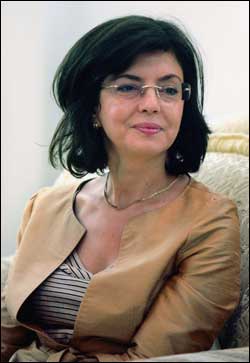 The European Union has urged China to
be more vigilant about product safety, particularly when it comes to toys, and
to provide more information about the measures it takes against manufacturers of
fake or shoddy exports. EU Consumer Commissioner Meglena Kuneva yesterday made
the request during talks in Beijing with Li Changjiang, head of China's product
safety watchdog, the General Administration for Quality Supervision, Inspection
and Quarantine. Kuneva encouraged China to make greater efforts to improve its
market surveillance to prevent dangerous products ending up in the EU and to
help improve China's reputation as an exporter. "There is an improvement, but
also it's equally valid that there is need of more step up of the reforms on the
market and on the market surveillance," Kuneva said. Last year, 924 products -
from unsafe lighters to wobbly strollers to short- circuiting kettles - were
identified as too dangerous to be sold in the 27 European Union nations, plus
Iceland, Liechtenstein and Norway. The European Union has urged China to
be more vigilant about product safety, particularly when it comes to toys, and
to provide more information about the measures it takes against manufacturers of
fake or shoddy exports. EU Consumer Commissioner Meglena Kuneva yesterday made
the request during talks in Beijing with Li Changjiang, head of China's product
safety watchdog, the General Administration for Quality Supervision, Inspection
and Quarantine. Kuneva encouraged China to make greater efforts to improve its
market surveillance to prevent dangerous products ending up in the EU and to
help improve China's reputation as an exporter. "There is an improvement, but
also it's equally valid that there is need of more step up of the reforms on the
market and on the market surveillance," Kuneva said. Last year, 924 products -
from unsafe lighters to wobbly strollers to short- circuiting kettles - were
identified as too dangerous to be sold in the 27 European Union nations, plus
Iceland, Liechtenstein and Norway.
July 24, 2007
 Hong Kong:
Despite investor despair over the
meltdown in the US subprime mortgage market, analysts expect HSBC (0005) to
report net profit in the first half grew 39 percent quarter on quarter to
US$9.79 billion (HK$76.36 billion). Hong Kong:
Despite investor despair over the
meltdown in the US subprime mortgage market, analysts expect HSBC (0005) to
report net profit in the first half grew 39 percent quarter on quarter to
US$9.79 billion (HK$76.36 billion).
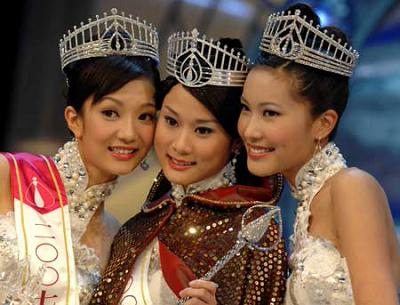 Miss Hong Kong 2007
Kayi Cheung (C) poses with first runner-up Grace Wong (L) and second runner-up
Lorretta Chow after winning the annual beauty contest in Hong Kong July 21,
2007. Miss Hong Kong 2007
Kayi Cheung (C) poses with first runner-up Grace Wong (L) and second runner-up
Lorretta Chow after winning the annual beauty contest in Hong Kong July 21,
2007.
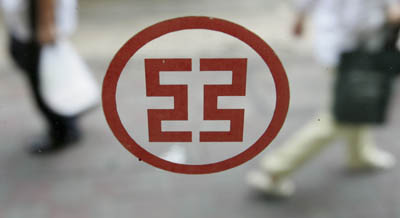 Residents walk past a
branch of Industrial and Commercial Bank of China (Asia) in Central, a business
district in Hong Kong October 27, 2006. In a fresh sign of China's financial
strength, a leap in the shares of Industrial & Commercial Bank of China on
Monday made it the world's biggest bank by market capitalization, overtaking US
giant Citigroup. ICBC's Shanghai-listed A shares surged 2.68 percent to 5.75
yuan, giving it a market capitalization of $254 billion, according to Reuters
calculations. That exceeded the $251 billion capitalization of Citigroup,
previously the world's biggest bank, when its shares closed at $50.73 in New
York on Friday. HSBC Holdings was in third place with $215 billion. Shares in
ICBC, which listed in Shanghai and Hong Kong last October, have gained 15
percent this month on the back of a rally in China's booming stock market as
well as strong growth in the bank's own earnings. Weakness in Citigroup's share
price, and appreciation of the yuan against the dollar have also shifted market
values in favor of ICBC. But some analysts believe ICBC's ballooning
capitalization may also be a sign of a dangerously overheated Shanghai stock
market as speculating Chinese investors pour money into shares. ICBC, a
state-controlled behemoth which is trying to modernize a creaky branch network
operating almost entirely inside China, reported income of $24 billion last
year. Citigroup, one of the world's most sophisticated financial institutions
with operations around the globe, reported income almost four times as large, at
$90 billion. ICBC's share price on Monday valued it at 28 times analysts'
forecasts for its earnings per share in 2007, far above 11 times for Citigroup
and an average of 16 times for major global banks, according to Reuters
Estimates. Residents walk past a
branch of Industrial and Commercial Bank of China (Asia) in Central, a business
district in Hong Kong October 27, 2006. In a fresh sign of China's financial
strength, a leap in the shares of Industrial & Commercial Bank of China on
Monday made it the world's biggest bank by market capitalization, overtaking US
giant Citigroup. ICBC's Shanghai-listed A shares surged 2.68 percent to 5.75
yuan, giving it a market capitalization of $254 billion, according to Reuters
calculations. That exceeded the $251 billion capitalization of Citigroup,
previously the world's biggest bank, when its shares closed at $50.73 in New
York on Friday. HSBC Holdings was in third place with $215 billion. Shares in
ICBC, which listed in Shanghai and Hong Kong last October, have gained 15
percent this month on the back of a rally in China's booming stock market as
well as strong growth in the bank's own earnings. Weakness in Citigroup's share
price, and appreciation of the yuan against the dollar have also shifted market
values in favor of ICBC. But some analysts believe ICBC's ballooning
capitalization may also be a sign of a dangerously overheated Shanghai stock
market as speculating Chinese investors pour money into shares. ICBC, a
state-controlled behemoth which is trying to modernize a creaky branch network
operating almost entirely inside China, reported income of $24 billion last
year. Citigroup, one of the world's most sophisticated financial institutions
with operations around the globe, reported income almost four times as large, at
$90 billion. ICBC's share price on Monday valued it at 28 times analysts'
forecasts for its earnings per share in 2007, far above 11 times for Citigroup
and an average of 16 times for major global banks, according to Reuters
Estimates.
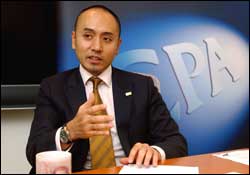 The mainland will
become a key global player in the private equity industry in terms of
institutional investors and market participants in 10 years, said Peter Lee,
executive director of NIF SMBC Ventures Asia, a venture capital firm. "We are
seeing a very rapid development in the private equity industry in Asia,
especially in China," said Lee, who is also a member of the financial reporting
and corporate governance committee at CPA Australia. According to Lee, the
committed capital - total pledged to a private equity fund - by the end of the
first half in China was about US$4.33 billion (HK$33.77 billion), representing a
220 percent increase over the same period last year. Lee described it as an
"unprecedented," increase. In comparison, the combined committed capital in
India and Australia - the other two major markets for private equity - during
the same period was US$3.2 billion, Lee said. Lee said the private equity
industry in the mainland would grow at a robust pace over the next three to five
years. While the private equity industry in the mainland has been historically
dominated by foreign players, domestic firms are increasingly becoming active
and institutional investors are recognizing private equity as a major asset
class, Lee said. "That would boost the activities and awareness of the private
equity market, and is a positive development for the private equity industry in
China." Lee does not see the emergence of domestic private equity funds as a
threat to foreign private equity funds operating in the mainland. The mainland will
become a key global player in the private equity industry in terms of
institutional investors and market participants in 10 years, said Peter Lee,
executive director of NIF SMBC Ventures Asia, a venture capital firm. "We are
seeing a very rapid development in the private equity industry in Asia,
especially in China," said Lee, who is also a member of the financial reporting
and corporate governance committee at CPA Australia. According to Lee, the
committed capital - total pledged to a private equity fund - by the end of the
first half in China was about US$4.33 billion (HK$33.77 billion), representing a
220 percent increase over the same period last year. Lee described it as an
"unprecedented," increase. In comparison, the combined committed capital in
India and Australia - the other two major markets for private equity - during
the same period was US$3.2 billion, Lee said. Lee said the private equity
industry in the mainland would grow at a robust pace over the next three to five
years. While the private equity industry in the mainland has been historically
dominated by foreign players, domestic firms are increasingly becoming active
and institutional investors are recognizing private equity as a major asset
class, Lee said. "That would boost the activities and awareness of the private
equity market, and is a positive development for the private equity industry in
China." Lee does not see the emergence of domestic private equity funds as a
threat to foreign private equity funds operating in the mainland.
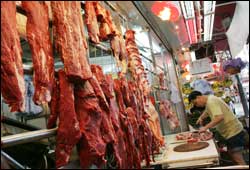 Beef traders have
failed to reach a consensus on boycotting cattle sales after the supply of live
cattle dropped by about one-fourth yesterday. The threat of a boycott had
emerged after Ng Fung Hong - the city's sole supplier of live cattle from the
mainland - raised the wholesale price of live cattle Saturday. A fresh meat
coalition complained that only 90 head of cattle were to be offered for sale
yesterday, compared with the daily average of 120. About 20 buyers staged a
protest and threatened to boycott the sale at the Sheung Shui abattoir when they
knew the supply had been cut. They talked to representatives of Ng Fung Hong and
decided to allocate cattle among buyers to solve the shortage problem after a
two-hour meeting. A buyer later told reporters Ng Fung Hong had explained the
decrease in supply was due to a traffic accident, but the buyers were not
satisfied with the explanation. Beef traders have
failed to reach a consensus on boycotting cattle sales after the supply of live
cattle dropped by about one-fourth yesterday. The threat of a boycott had
emerged after Ng Fung Hong - the city's sole supplier of live cattle from the
mainland - raised the wholesale price of live cattle Saturday. A fresh meat
coalition complained that only 90 head of cattle were to be offered for sale
yesterday, compared with the daily average of 120. About 20 buyers staged a
protest and threatened to boycott the sale at the Sheung Shui abattoir when they
knew the supply had been cut. They talked to representatives of Ng Fung Hong and
decided to allocate cattle among buyers to solve the shortage problem after a
two-hour meeting. A buyer later told reporters Ng Fung Hong had explained the
decrease in supply was due to a traffic accident, but the buyers were not
satisfied with the explanation.
A lawmaker's renewed push for cuts in taxi fares to deal
with illicit discount cabbies has been met with strong opposition from part of
the taxi trade. Speaking on RTHK's City Forum yesterday, Democrat Andrew Cheng
Kar-foo, who chairs the Legislative Council's transport panel, said lowering
fares for long-distance journeys may level the market share - up to 90 percent
of which is now dominated by discounted cabs - among the territory's 18,000 taxi
drivers and help their business. "I believe this could solve the issue of
vicious competition between legitimate cab drivers and those offering discounts
to passengers," said Cheng, again urging the government to review whether price
negotiations by any party should be allowed under the law. His proposal involves
lowering the meter fare jump to HK$1 per 200 meters or a minute's waiting period
- instead of the current HK$1.40 - after the meter passes HK$50. The suggestions
are similar to those made by Hong Kong Public Light Bus Owners' and Drivers'
Association president Lai Ming-hung. Lai's proposal included raising the initial
meter fare from HK$15 to HK$17, while the proposed reduction in the meter fare
jump is the same as Cheng's. However, plans for a fare reduction were opposed by
representatives of call- cab drivers and taxi owners.
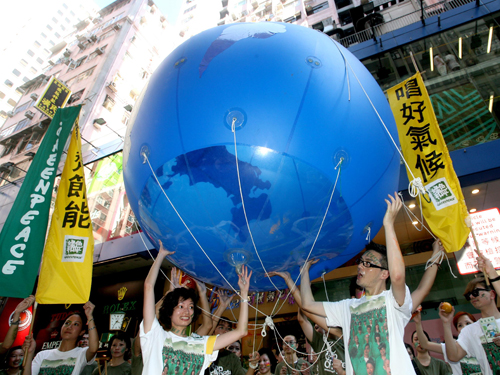 Local politicians
yesterday cut their ties to pieces and vowed to dress down this summer as they
called on the government to take climate change seriously. Their protest came as
green activists staged a parade in Causeway Bay to raise awareness of global
warming. They attacked senior government officials who continued to dress
formally at public functions, even though they promoted a dress-down code for
the civil service as a way of saving on energy bills. "Senior officials are just
paying lip service to the dress-down call. They themselves defy the idea," said
Fan Kwok-wai, a Sai Kung district councillor, who is also a member of the
Democratic Party. The councillor was among nine other politicians from Tai Po
and Tseung Kwan O to protest at government headquarters yesterday, a day before
"major heat", the hottest day in the Chinese lunar calendar. They handed a
petition letter to a government representative before shredding their ties in a
symbolic protest. Local politicians
yesterday cut their ties to pieces and vowed to dress down this summer as they
called on the government to take climate change seriously. Their protest came as
green activists staged a parade in Causeway Bay to raise awareness of global
warming. They attacked senior government officials who continued to dress
formally at public functions, even though they promoted a dress-down code for
the civil service as a way of saving on energy bills. "Senior officials are just
paying lip service to the dress-down call. They themselves defy the idea," said
Fan Kwok-wai, a Sai Kung district councillor, who is also a member of the
Democratic Party. The councillor was among nine other politicians from Tai Po
and Tseung Kwan O to protest at government headquarters yesterday, a day before
"major heat", the hottest day in the Chinese lunar calendar. They handed a
petition letter to a government representative before shredding their ties in a
symbolic protest.
 China:
China Eastern Airlines has signed a deal to buy 10 A320
passenger jets from Airbus to meet domestic demand for short-and medium-distance
passenger transport.
China:
China Eastern Airlines has signed a deal to buy 10 A320
passenger jets from Airbus to meet domestic demand for short-and medium-distance
passenger transport.
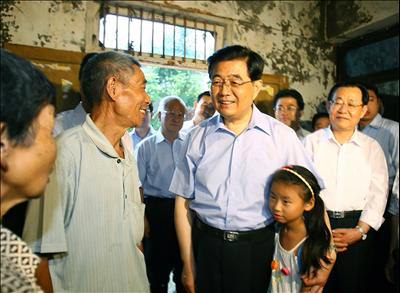 Chinese President Hu
Jintao visits the southwest municipality of Chongqing over the weekend to
inspire locals to fight the flood and summon up the confidence in rebuilding
homes. Chinese President Hu
Jintao visits the southwest municipality of Chongqing over the weekend to
inspire locals to fight the flood and summon up the confidence in rebuilding
homes.
The manufacturer of China's first locally developed short
haul plane has received its first overseas order for ARJ21 regional plane, the
Oriental Morning Post reported today. China Aviation Industry Corporation I (AVIC
I) received the order from Lao Airlines for two ARJ21 jets. AVIC I has received
orders for 71 ARJ21 jets from domestic airline service firms including Shanghai
Airlines, Shandong Airlines and Xiamen Airlines. Shanghai Airlines ordered five
ARJ21 jets, Xiamen Airlines plans to buy six such regional airliners, and
Shandong Airlines wants to buy 10 such planes. In addition to the airlines,
Shenzhen Financial Leasing Co Ltd and Shanghai Electric Leasing Co Ltd have
ordered 20 and 30 ARJ21 jets respectively. The jet is expected to take off for
its maiden flight in March, 2008, according to Lu Zheng, vice general manager
for marketing of AVIC I Commercial Aircraft Co Ltd, a unit of AVIC I. The ARJ21
jet, powered by turbofan engines, can carry 70 to 110 passengers and boasts a
maximum flight distance of 2,000 nautical miles. Insiders said the planes will
sell at roughly US$30.50 million each. Currently, AVIC I Commercial is promoting
the jet worldwide. According to Lu, the manufacturer will attend the Asian
Aerospace International Expo, which will be held from September 3 to 5 this year
in Hong Kong. Lin Zuoming, general manger of AVIC I, said earlier that AVIC I
Commercial is mulling an overseas listing and hired Citibank as investment
adviser. AVIC I Commercial is expected to become the first Chinese civilian
aviation company listing overseas. An insider said that AVIC I's Shanghai
Aircraft Manufacturing Factory, a manufacturer of commercial aircraft, would
likely inject assets into AVIC I Commercial Aircraft. The ARJ21 program was
officially approved in 2002, with a governmental investment of 5 billion yuan
(US$661 million) for the first stage of the project.
Beijing's Silk Street, famous for
knock-off designer gear from North Face jackets to Louis Vuitton bags, has been
raided again after state media heralded a cleanout of fake goods.
July 21 - 23, 2007
 Hong Kong:
The composite Consumer Price Index (CPI) figures for June in Hong Kong rose by
1.3 percent in June over a year earlier, larger than the 1.2 percent increase in
May, official figures released Friday indicated. The larger year-on-year
increase in the Composite CPI in June than in May was mainly due to the enlarged
increase in the prices of pork, said The Census and Statistics Department of
Hong Kong Special Administrative Region. Meanwhile, the Budget measure of rates
concession for the first two quarters of 2007/08 (i.e. April to September 2007)
continued to carry effect in June. Netting out this factor, the year-on- year
increase in the composite CPI was 2.4 percent. This measure would continue to
carry impact on the CPI until September this year. A spokesman of the department
said that he believed that rising food prices and its volatility would continue
to play a bigger role in affecting inflation in the near term. However, the
rates concession for the third quarter and other one-off measures to be
introduced later in the year would continue to keep the inflation number down in
the second half of the year. Moreover, rapid labor productivity growth should
provide some cushion against overall inflationary pressures, he said. Hong Kong:
The composite Consumer Price Index (CPI) figures for June in Hong Kong rose by
1.3 percent in June over a year earlier, larger than the 1.2 percent increase in
May, official figures released Friday indicated. The larger year-on-year
increase in the Composite CPI in June than in May was mainly due to the enlarged
increase in the prices of pork, said The Census and Statistics Department of
Hong Kong Special Administrative Region. Meanwhile, the Budget measure of rates
concession for the first two quarters of 2007/08 (i.e. April to September 2007)
continued to carry effect in June. Netting out this factor, the year-on- year
increase in the composite CPI was 2.4 percent. This measure would continue to
carry impact on the CPI until September this year. A spokesman of the department
said that he believed that rising food prices and its volatility would continue
to play a bigger role in affecting inflation in the near term. However, the
rates concession for the third quarter and other one-off measures to be
introduced later in the year would continue to keep the inflation number down in
the second half of the year. Moreover, rapid labor productivity growth should
provide some cushion against overall inflationary pressures, he said.
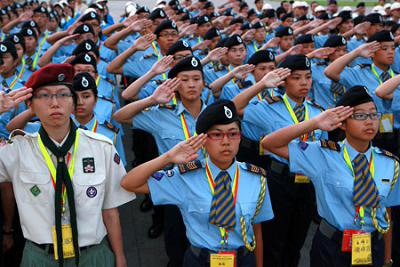 Hong Kong
students salute the Chinese national flag during an early morning flag-raising
ceremony at Tiananmen Square in Beijing July 20, 20007. More than 1,700
secondary school and university students from the Special Administrative Region
are in the Chinese capital to participate in a summer program as part of the
celebrations marking the 10th anniversary of Hong Kong’s return to the
motherland. Hong Kong
students salute the Chinese national flag during an early morning flag-raising
ceremony at Tiananmen Square in Beijing July 20, 20007. More than 1,700
secondary school and university students from the Special Administrative Region
are in the Chinese capital to participate in a summer program as part of the
celebrations marking the 10th anniversary of Hong Kong’s return to the
motherland.
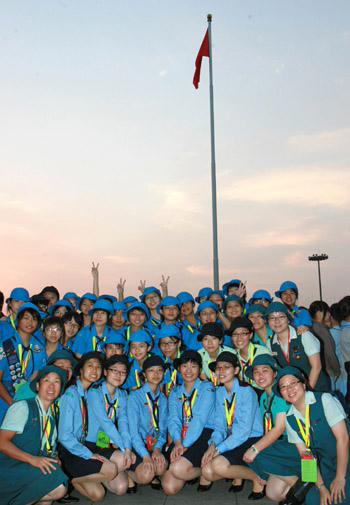 Hong
Kong students and a teacher pose for a photo after an early morning flag-raising
ceremony at Tiananmen Square in Beijing July 20, 20007. More than 1,700
secondary school and university students from the Special Administrative Region
are in the Chinese capital to participate in a summer program as part of the
celebrations marking the 10th anniversary of Hong Kong’s return to the
motherland. Hong
Kong students and a teacher pose for a photo after an early morning flag-raising
ceremony at Tiananmen Square in Beijing July 20, 20007. More than 1,700
secondary school and university students from the Special Administrative Region
are in the Chinese capital to participate in a summer program as part of the
celebrations marking the 10th anniversary of Hong Kong’s return to the
motherland.
The number of Macao's visitor arrivals reached 1,921,384
in June, a remarkable year-on-year rise of 20.3 percent, according to official
statistics issued Friday. The figures from the government-run Statistics and
Census Service (SCS) showed that the majority of the visitors in the month came
from China's mainland (51.8 percent), Hong Kong (32.2 percent) and Taiwan (6.3
percent). Among the mainland visitors, some 50 percent traveled to Macao under
the Individual Visit Scheme, which frees mainland tourists from the group tour.
Macao, the only part of China where casino gaming is legal, has been enhancing
its fame as a tourism destination with the aid of the booming gaming industry.
Prominent Hong Kong banker David Li
Kwok-po has vowed to defend his good name after he was officially informed by
the US Securities and Exchange Commission of possible legal action against him
in connection with the alleged Dow Jones insider trading case in which a Hong
Kong couple reaped a profit of US$8.2 million (HK$63.96 million).
Property developer HKC (Holdings)
(0190) plans to boost its property and renewable energy development in the
mainland after entering into a strategic alliance with Cerberus Asia Capital
Management, a New York-based private equity fund.
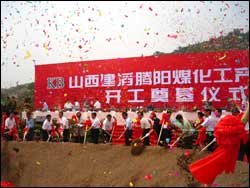 Printed circuit board
manufacturing giant Kingboard Chemical Holdings (0148) plans to invest 1.6
billion yuan (HK$1.65 billion) in a new coal-based chemical project in Shanxi
province as the company aggressively expands its upstream chemical business. The
project located in Luliang, Shanxi province, includes coal mining and
coke/methanol production. It will be jointly operated by Kingboard and Tengyang
Coal and Chemical, a domestically owned cement maker. Shenzhen-based Kingboard
will own 60 percent of the coal mining operations and 80 percent of the coke/
methanol production facilities. Printed circuit board
manufacturing giant Kingboard Chemical Holdings (0148) plans to invest 1.6
billion yuan (HK$1.65 billion) in a new coal-based chemical project in Shanxi
province as the company aggressively expands its upstream chemical business. The
project located in Luliang, Shanxi province, includes coal mining and
coke/methanol production. It will be jointly operated by Kingboard and Tengyang
Coal and Chemical, a domestically owned cement maker. Shenzhen-based Kingboard
will own 60 percent of the coal mining operations and 80 percent of the coke/
methanol production facilities.
Conglomerate Emperor International
Holdings (0163) reported net profit for the year ended March 31 fell 8.27
percent to HK$488 million, while its Macau hotel and gaming associate, Emperor
Entertainment Hotel (0296), saw net profit rise 63 percent to HK$272 million.
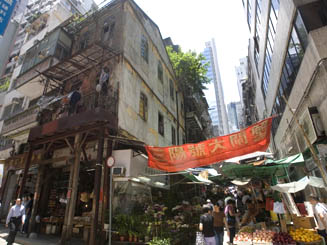 The Urban Renewal Authority pushed ahead
yesterday with its plan to knock down the city's oldest wet market despite
strong opposition from heritage and residents' concern groups.
The Urban Renewal Authority pushed ahead
yesterday with its plan to knock down the city's oldest wet market despite
strong opposition from heritage and residents' concern groups.
 China:
The International Monetary Fund’s new economist, Simon Johnson, on Thursday said
China-bashing was used “excessively and inappropriately” by politicians as an
excuse to protect domestic markets. Mr Johnson said China, now the world’s
fourth-largest economy, should be given more credit for its contribution to
global growth and poverty reduction. “China is being used excessively and
inappropriately by politicians as a way to play the protectionist card,” said Mr
Johnson, who joined the fund in late March. “Bashing them for this and that
trade dispute is not a good idea. I think they recognise they need to continue
reforming their economy.” United States Treasury Secretary Henry Paulson
acknowledged on July 3 that American attitudes toward China had soured over what
some US interests saw as unfair trade tactics and worry about unsafe products
from China. The US has taken issue with the Chinese currency and labeled it as
undervalued, which American manufacturers charge is giving Beijing an unfair
competitive trade advantage. “A big part of the world growth today is due to
China’s success, reforming its economy and sustaining its growth and this is not
sufficiently appreciated,” Mr Johnson said. “China has done an enormous amount
to reduce poverty around the world ... and I think they should get more
recognition for that.” He said China had made voluntary economic commitments in
IMF-led multilateral consultations earlier this year, along with the US,
eurozone, Japan and Saudi Arabia. The talks focused on ways to rebalance the
global economy, which would address the large deficits in the US and massive
surpluses in Asia and elsewhere. “The Chinese will follow through on those
commitments and we should help them,” Mr Johnson said. He said the rise in the
yuan was good but said faster progress would help China manage its domestic
economy. “Everyone also wants that to be an orderly process and I don’t think it
is in any of our interests to have anything destabilizing happen, nor do we see
signs of destabilization right now,” he added.
China:
The International Monetary Fund’s new economist, Simon Johnson, on Thursday said
China-bashing was used “excessively and inappropriately” by politicians as an
excuse to protect domestic markets. Mr Johnson said China, now the world’s
fourth-largest economy, should be given more credit for its contribution to
global growth and poverty reduction. “China is being used excessively and
inappropriately by politicians as a way to play the protectionist card,” said Mr
Johnson, who joined the fund in late March. “Bashing them for this and that
trade dispute is not a good idea. I think they recognise they need to continue
reforming their economy.” United States Treasury Secretary Henry Paulson
acknowledged on July 3 that American attitudes toward China had soured over what
some US interests saw as unfair trade tactics and worry about unsafe products
from China. The US has taken issue with the Chinese currency and labeled it as
undervalued, which American manufacturers charge is giving Beijing an unfair
competitive trade advantage. “A big part of the world growth today is due to
China’s success, reforming its economy and sustaining its growth and this is not
sufficiently appreciated,” Mr Johnson said. “China has done an enormous amount
to reduce poverty around the world ... and I think they should get more
recognition for that.” He said China had made voluntary economic commitments in
IMF-led multilateral consultations earlier this year, along with the US,
eurozone, Japan and Saudi Arabia. The talks focused on ways to rebalance the
global economy, which would address the large deficits in the US and massive
surpluses in Asia and elsewhere. “The Chinese will follow through on those
commitments and we should help them,” Mr Johnson said. He said the rise in the
yuan was good but said faster progress would help China manage its domestic
economy. “Everyone also wants that to be an orderly process and I don’t think it
is in any of our interests to have anything destabilizing happen, nor do we see
signs of destabilization right now,” he added.
China will raise one-year deposit
and loan interest rates by 27 basis points to 3.33 percent and 6.84 percent
respectively as of July 21, the central bank announced on Friday. This is the
third time that China raised the one-year benchmark interest rates this year as
a further move to curb the country's booming economy. China's GDP grew by 11.5
percent in the first half of 2007, 0.5 percentage point higher from the previous
year, the National Bureau of Statistics said on Thursday. The consumer price
index (CPI), the main gauge of inflation, rose 3.2 percent in the first half of
this year compared with the same period last year. In June, CPI jumped by 4.4
percent compared with the same month last year, well above the government's
target of 3 percent for 2007. The move aims to "rationalize the growth of
lending and investment, adjust and stabilize expectancy of inflation and
maintain price stability", the People's Bank of China (PBoC) said in a statement
on its website. China raised the one-year deposit and loan interest rate by 27
basis points in March and by 27 and 18 basis points respectively in May. China's
State Council announced Friday to reduce the tax on interest income from 20 to 5
percent as of August 15. The move is to adapt to changes in China's economic and
social situation, the State Council, or cabinet, said in a statement. It
received authorization to scrap or cut the tax for banking savings from the
Standing Committee of the National People's Congress on June 29. Experts say the
move aims to narrow the gap between deposit rate and inflation to make bank
savings more attractive and to curb the excess liquidity. The reduction in
interest income tax will increase earnings from bank savings and is conducive to
the economy featured now by rapid increases in investment and rising inflation,
the State Council said in a news release. China's gross domestic product grew by
11.5 percent year-on-year in the first half of 2007, 0.5 percentage point higher
from the previous year, and the fixed assets investment soared 25.9 percent, the
National Bureau of Statistics said on Thursday. The consumer price index (CPI),
the main gauge of inflation, rose 3.2 percent year-on-year in the first half of
this year. In June, the CPI jumped by 4.4 percent from a year earlier, the
highest in 32 months and well above the government's target of 3 percent for
2007. China began to levy tax on bank savings in November 1999. In the past
eight years, the tax has played a positive role in encouraging consumption and
investment, adjusting personal earnings and increasing fiscal revenues, said the
news release.
The Chinese government is reassessing the way in which it
supervises food safety in order to improve the efficiency of the current system,
a senior quality control official said on Friday. Li Changjiang, minister in
charge of the General Administration of Quality Supervision, Inspection and
Quarantine (AQSIQ), said that various government departments are responsible for
food safety in China. The government is reassessing the current supervision
mechanism, he said, adding new measures will be taken to enhance supervision
after sufficient investigations and studies are made. The existing food
supervision system involves at least five central government departments - AQSIQ,
the State Administration for Industry and Commerce, the Ministry of Agriculture,
the Ministry of Health and the State Food and Drug Administration - which are
responsible for supervising farming, production and processing, and distribution
and selling. New laws should be made to facilitate cooperation among different
government agencies in order to change the overlapping food supervision system,
Vice Health Minister Wang Longde said earlier this month. Li said China was
endeavoring to tackle its food safety problem in a comprehensive way. "To ensure
the quality of food exports, the Chinese government has set up a monitoring
system that covers plantations, breeding farms and production bases," said Li.
"Only products that pass strict quarantine inspection are allowed to be
exported." With the United States only running random checks on imports at all
its ports, AQSIQ was exchanging views with the U.S. Food and Drug Administration
in the hope of ensuring food safety on the basis of effective supervision by
each side, said Li.

 Five days after filming began on Chen Kaige's "Mei Lanfang"
biopic, a supplementary press conference was held on Thursday to welcome its
most anticipated cast members: Leon Lai and Zhang Ziyi. Both stars were absent
from a commencement ceremony held on July 14 in Beijing. Leon Lai, who is also a
Cantopop singer, will play the late Peking opera master Mei Lanfang. He is
reportedly busy polishing his opera skills, sparing time from another film in
production which is directed by Hong Kong's Ching Siu-tung. Zhang Ziyi will play
Mei Lanfang's fellow singer, Meng Xiaodong. She was recently spotted in the Sun
Valley Resort in the United States with her billionaire boyfriend Vivi Nevo.
There is still no exact date revealed for the two actors' joining the cast.
Other leading cast members, including Chen Hong, Gillian Chung and Japanese
actor Masanobu Ando, were all at the press conference and explained their role
in the film. Mei Baojiu, Mei Lanfang's youngest son and a prominent Peking opera
singer himself, also showed up expressing his thanks and confidence in the
production team. The film is due out next year.
Five days after filming began on Chen Kaige's "Mei Lanfang"
biopic, a supplementary press conference was held on Thursday to welcome its
most anticipated cast members: Leon Lai and Zhang Ziyi. Both stars were absent
from a commencement ceremony held on July 14 in Beijing. Leon Lai, who is also a
Cantopop singer, will play the late Peking opera master Mei Lanfang. He is
reportedly busy polishing his opera skills, sparing time from another film in
production which is directed by Hong Kong's Ching Siu-tung. Zhang Ziyi will play
Mei Lanfang's fellow singer, Meng Xiaodong. She was recently spotted in the Sun
Valley Resort in the United States with her billionaire boyfriend Vivi Nevo.
There is still no exact date revealed for the two actors' joining the cast.
Other leading cast members, including Chen Hong, Gillian Chung and Japanese
actor Masanobu Ando, were all at the press conference and explained their role
in the film. Mei Baojiu, Mei Lanfang's youngest son and a prominent Peking opera
singer himself, also showed up expressing his thanks and confidence in the
production team. The film is due out next year.
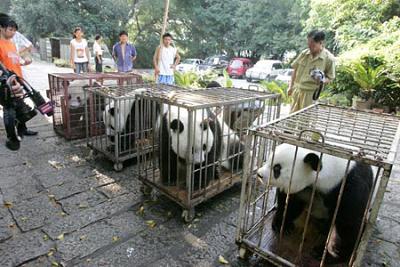 Four giant pandas from
the Fuzhou Giant Panda Research Center are caged before they are moved to a
cooler spot on a mountain in Fuzhou, South China’s Fujian Province, July 19,
2007. Fuzhou has been gripped by hot weather, with temperatures reaching 39
degrees Celsius. Four giant pandas from
the Fuzhou Giant Panda Research Center are caged before they are moved to a
cooler spot on a mountain in Fuzhou, South China’s Fujian Province, July 19,
2007. Fuzhou has been gripped by hot weather, with temperatures reaching 39
degrees Celsius.
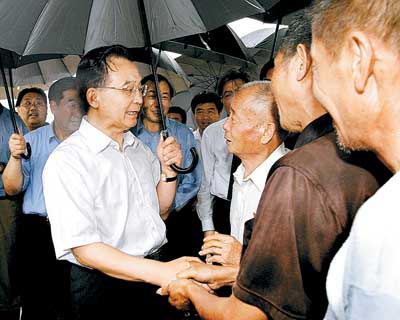 Chinese Premier Wen
Jiabao is in the focus of a hot topic among Chinese Internet users after a news
photo of him visiting flood-affected regions was released online. In the
seemingly ordinary photo taken on July 13 in which Wen shakes hands with a local
resident who lost his home in the flood, netizens discovered that the Premier is
holding his own umbrella. A web-user posted the photo of the umbrella-wielding
Premier along with several other pictures in which official-looking figures had
people holding umbrellas for them. One official was delivering a speech while a
young girl held the umbrella for him. The contrast between the set of pictures
was so dramatic that the posting attracted hundreds of comments from web-users
within hours. They were eager to express their happiness of seeing the Premier
in plain clothes and decried the bureaucracy that happens at the local level,
saying senior political figures are serving ordinary people. As one of the top
leaders in the world's most populous nation, Premier Wen is widely admired by
the Chinese as he's concerned about ordinary citizens, especially the poor.
People think highly of him because he isn't concerned about material things for
himself. Chinese Premier Wen
Jiabao is in the focus of a hot topic among Chinese Internet users after a news
photo of him visiting flood-affected regions was released online. In the
seemingly ordinary photo taken on July 13 in which Wen shakes hands with a local
resident who lost his home in the flood, netizens discovered that the Premier is
holding his own umbrella. A web-user posted the photo of the umbrella-wielding
Premier along with several other pictures in which official-looking figures had
people holding umbrellas for them. One official was delivering a speech while a
young girl held the umbrella for him. The contrast between the set of pictures
was so dramatic that the posting attracted hundreds of comments from web-users
within hours. They were eager to express their happiness of seeing the Premier
in plain clothes and decried the bureaucracy that happens at the local level,
saying senior political figures are serving ordinary people. As one of the top
leaders in the world's most populous nation, Premier Wen is widely admired by
the Chinese as he's concerned about ordinary citizens, especially the poor.
People think highly of him because he isn't concerned about material things for
himself.
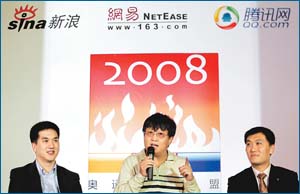 Chen Tong (C)
editor in chief with sina.com, Netease's chief operation officer Dong
Ruibao(L),and General Manager Sun Huaizhong with qq.com attend the joint news
conference held in Beijing July 19, 2007. Leading Chinese portals sina.com,
Netease (163.com), and qq.com announced yesterday a joint "Olympic Coverage
Alliance," with the aim of providing more elaborate and timely Internet coverage
of the 2008 Olympic Games in Beijing. "It is the first daring attempt to
integrate Chinese network resources and forge an interactive platform to spread
abroad Olympic spirit," said a joint announcement released later. The
announcement said the three companies will create multi-dimensional coverage of
the Games through high-tech offerings like news round-up, blogs, online
community resources, e-mail, and information services. The newly-established
alliance, however, was strongly criticized by big rival Internet company
sohu.com, also the Olympic official sponsor, which claims the Olympic Alliance
doesn't have any authorization to report on the field. "I wouldn't like to judge
any an individual or his company in public, but it is not true that what the
company you mentioned said that it owns a so-called 'preferential treatment' in
news coverage by then," Chen Tong, editor in chief of sina.com told media. "That
website is none other than an Olympic sponsor who was required to construct and
maintain the Beijing Olympic Committee (BOCOG) official website," Chen said. "So
far, there hasn't been any Chinese website media company that's gotten a news
report certificate for the Games." Chen added that the site tom.com may join the
alliance in the near future, and welcomed the participation of other online
media outlets. Early this month, BOCOG media service chief Sun Weijia clarified
there will be most likely new media, or online media companies reporting on the
Beijing Games, but he also stressed that the International Olympic Committee
(IOC) has the final word, and may allocate small quotas to new media outlets
based on their capacity and international status. The Alexa Company of defining
the website ranking measurement has listed the three websites in the alliance
among the top 20 portals websites in the world. They've grasped considerable
profits and market share. Nielsen/Netratings, a global company measuring online
audiences, said when the Olympic Games have been in session, more than 90
percent of Chinese netizens have turned to the web as their primary resource for
information, with weekly online times as high 15 hours, more than total period
of time spent on telecasts and paper media. Chen Tong (C)
editor in chief with sina.com, Netease's chief operation officer Dong
Ruibao(L),and General Manager Sun Huaizhong with qq.com attend the joint news
conference held in Beijing July 19, 2007. Leading Chinese portals sina.com,
Netease (163.com), and qq.com announced yesterday a joint "Olympic Coverage
Alliance," with the aim of providing more elaborate and timely Internet coverage
of the 2008 Olympic Games in Beijing. "It is the first daring attempt to
integrate Chinese network resources and forge an interactive platform to spread
abroad Olympic spirit," said a joint announcement released later. The
announcement said the three companies will create multi-dimensional coverage of
the Games through high-tech offerings like news round-up, blogs, online
community resources, e-mail, and information services. The newly-established
alliance, however, was strongly criticized by big rival Internet company
sohu.com, also the Olympic official sponsor, which claims the Olympic Alliance
doesn't have any authorization to report on the field. "I wouldn't like to judge
any an individual or his company in public, but it is not true that what the
company you mentioned said that it owns a so-called 'preferential treatment' in
news coverage by then," Chen Tong, editor in chief of sina.com told media. "That
website is none other than an Olympic sponsor who was required to construct and
maintain the Beijing Olympic Committee (BOCOG) official website," Chen said. "So
far, there hasn't been any Chinese website media company that's gotten a news
report certificate for the Games." Chen added that the site tom.com may join the
alliance in the near future, and welcomed the participation of other online
media outlets. Early this month, BOCOG media service chief Sun Weijia clarified
there will be most likely new media, or online media companies reporting on the
Beijing Games, but he also stressed that the International Olympic Committee
(IOC) has the final word, and may allocate small quotas to new media outlets
based on their capacity and international status. The Alexa Company of defining
the website ranking measurement has listed the three websites in the alliance
among the top 20 portals websites in the world. They've grasped considerable
profits and market share. Nielsen/Netratings, a global company measuring online
audiences, said when the Olympic Games have been in session, more than 90
percent of Chinese netizens have turned to the web as their primary resource for
information, with weekly online times as high 15 hours, more than total period
of time spent on telecasts and paper media.
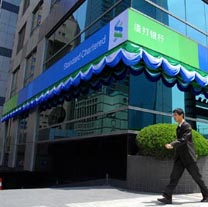 A
Standard Chartered Bank outlet in Shanghai. The bank yesterday opened an
operation center in Tianjin's Binhai New Area in order to solidify its
back-office operations in China and support its rapid business growth in the
country. A
Standard Chartered Bank outlet in Shanghai. The bank yesterday opened an
operation center in Tianjin's Binhai New Area in order to solidify its
back-office operations in China and support its rapid business growth in the
country.
July 20, 2007
 Hong Kong:
The Export-Import Bank of China (China Exim Bank) announced on Thursday that it
has received approval from the central bank to issue two billion yuan worth of
Renminbi bonds in Hong Kong. China Exim Bank will become the second mainland
bank to issue such bonds in Hong Kong after the China Development Bank (CDB).
The CDB issued five billion yuan worth of RMB bonds from June 26 to July 6.
China Exim Bank said it will sell the bonds to both individual and institutional
investors after getting approval from the Hong Kong Securities and Futures
Commission. It did not provide other details about its bonds sales. Both China
Exim Bank and China Development Bank are policy banks. The Bank of China and
China Construction Bank, two of the nation's big-four state-owned commercial
banks, have announced they are considering issuing RMB bonds in Hong Kong. The
People's Bank of China (PBoC) and the National Development and Reform Commission
issued a regulation on June 8 that would allow policy and commercial banks to
issue the yuan-denominated bonds in Hong Kong. "The issuance of RMB bonds will
strengthen Hong Kong's status as an international financial center," Ma Delun,
assistant governor of the PBoC, said in June. Founded in 1994 and solely owned
by the government, China Exim Bank serves to boost the nation's foreign trade
and economic cooperation by providing policy financing, onlending foreign
government loans and lending Chinese government Concessional Loans. It has 10
business branches and five representative offices nationwide and three overseas
representative offices in South Africa, Paris and St. Petersburg. Hong Kong:
The Export-Import Bank of China (China Exim Bank) announced on Thursday that it
has received approval from the central bank to issue two billion yuan worth of
Renminbi bonds in Hong Kong. China Exim Bank will become the second mainland
bank to issue such bonds in Hong Kong after the China Development Bank (CDB).
The CDB issued five billion yuan worth of RMB bonds from June 26 to July 6.
China Exim Bank said it will sell the bonds to both individual and institutional
investors after getting approval from the Hong Kong Securities and Futures
Commission. It did not provide other details about its bonds sales. Both China
Exim Bank and China Development Bank are policy banks. The Bank of China and
China Construction Bank, two of the nation's big-four state-owned commercial
banks, have announced they are considering issuing RMB bonds in Hong Kong. The
People's Bank of China (PBoC) and the National Development and Reform Commission
issued a regulation on June 8 that would allow policy and commercial banks to
issue the yuan-denominated bonds in Hong Kong. "The issuance of RMB bonds will
strengthen Hong Kong's status as an international financial center," Ma Delun,
assistant governor of the PBoC, said in June. Founded in 1994 and solely owned
by the government, China Exim Bank serves to boost the nation's foreign trade
and economic cooperation by providing policy financing, onlending foreign
government loans and lending Chinese government Concessional Loans. It has 10
business branches and five representative offices nationwide and three overseas
representative offices in South Africa, Paris and St. Petersburg.
China Reinsurance (Group) Company is
striving to attract international strategic investors by eventually launching
listings on both the Hong Kong and Shanghai bourses by the end of the year, said
the company's general manger Liu Jingsheng. China Re, which is fully owned by
the Ministry of Finance, has about 90 percent of the domestic market. The
reinsurer received a US$4 billion capital injection from Central Huijin
Investment in April to meet growing demand for insurance and fund the expected
listings.
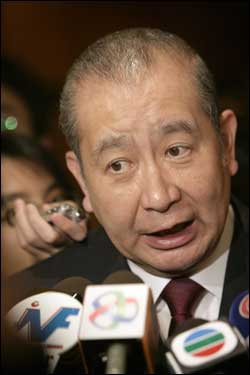 The US Securities and Exchange Commission may take action
soon to prosecute parties involved in the insider trading of Dow Jones shares
before news of the US$5 billion (HK$39 billion) takeover bid of the media giant
by Rupert Murdoch's News Corp first surfaced, a source said yesterday. Prominent
Hong Kong banker David Li Kwok-po may need to respond if the US regulator
decides to act, the source said. "I have not heard of [a possible prosecution].
I am not aware of the situation," said Li, chairman of Bank of East Asia (0023)
and a member of the Dow Jones board. He declined further comment when contacted
last night, but may comment on the case as early as today, a BEA spokesman said.
The possible prosecution will proceed as a civil case rather than a criminal
matter, said the source. The New York Times reported on May 10 that Li would be
questioned by the SEC over the possible leaking of confidential information on
the media buyout. He was linked to the case due to his close business
relationship with Michael Leung Kai-hung, father of Charlotte Wong Leung Ka-on,
who together with her husband Wong Kan-king are accused of insider trading. The
Hong Kong couple had reaped a profit of US$8.2 million from trading a total of
415,000 Dow Jones shares between April 13 and May 4. There have been suggestions
that Li may be involved in the case as the company secretary of Dow Jones had
informed Li of the takeover bid on April 13 New York time. On April 14 in Hong
Kong - which is 12 hours ahead of New York - Li and Michael Leung both flew on
the same flight from Hong Kong to Beijing. On April 13 New York time, Wong
Kan-king paid US$2.6 million to snap up 74,400 Dow Jones shares at US$34.85
apiece.
The US Securities and Exchange Commission may take action
soon to prosecute parties involved in the insider trading of Dow Jones shares
before news of the US$5 billion (HK$39 billion) takeover bid of the media giant
by Rupert Murdoch's News Corp first surfaced, a source said yesterday. Prominent
Hong Kong banker David Li Kwok-po may need to respond if the US regulator
decides to act, the source said. "I have not heard of [a possible prosecution].
I am not aware of the situation," said Li, chairman of Bank of East Asia (0023)
and a member of the Dow Jones board. He declined further comment when contacted
last night, but may comment on the case as early as today, a BEA spokesman said.
The possible prosecution will proceed as a civil case rather than a criminal
matter, said the source. The New York Times reported on May 10 that Li would be
questioned by the SEC over the possible leaking of confidential information on
the media buyout. He was linked to the case due to his close business
relationship with Michael Leung Kai-hung, father of Charlotte Wong Leung Ka-on,
who together with her husband Wong Kan-king are accused of insider trading. The
Hong Kong couple had reaped a profit of US$8.2 million from trading a total of
415,000 Dow Jones shares between April 13 and May 4. There have been suggestions
that Li may be involved in the case as the company secretary of Dow Jones had
informed Li of the takeover bid on April 13 New York time. On April 14 in Hong
Kong - which is 12 hours ahead of New York - Li and Michael Leung both flew on
the same flight from Hong Kong to Beijing. On April 13 New York time, Wong
Kan-king paid US$2.6 million to snap up 74,400 Dow Jones shares at US$34.85
apiece.
Hong Kong's three note-issuing
banks cannot have more than 20 percent of their shares controlled by a foreign
government if they want to continue to be authorized to issue banknotes, the
Hong Kong Monetary Authority announced yesterday.
Hubei-based East Star Airlines has
won approval from mainland aviation regulators to operate flights from Wuhan to
Hong Kong and Macau starting in September, bringing the private carrier a step
closer to its goal of servicing international destinations.
The authorities may move ahead to
compensate and resettle residents left in a 600-year-old walled village in Wong
Tai Sin in a race to improve their living conditions and save the historic site,
Secretary for Development Carrie Lam Cheng Yuet-ngor said.
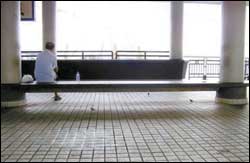 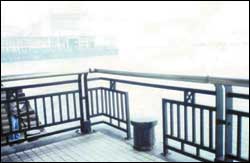 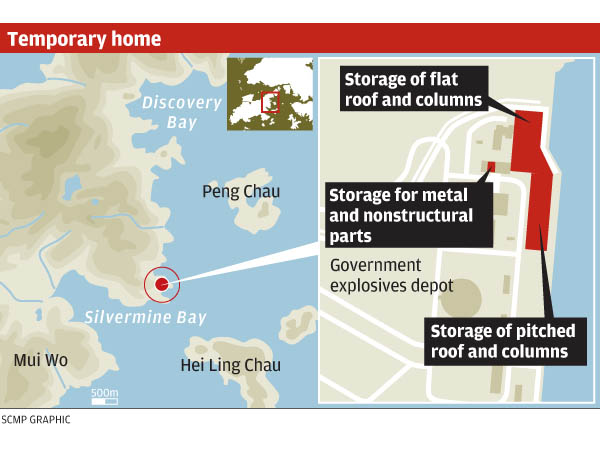 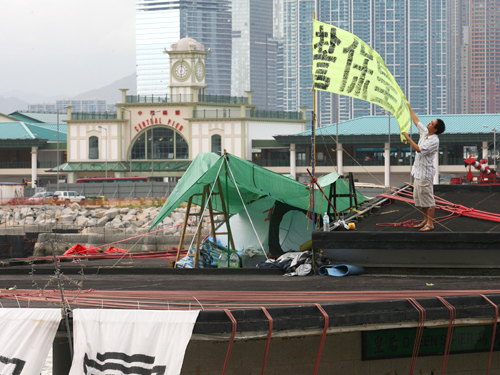 People wishing to get a last glimpse of Queen's Pier in its original form should
do so before the end of this month when it will be dismantled and stored at the
government's explosives depot on Lantau Island, legislators were told yesterday.
The pier will be reassembled in an unspecified area, but not before 2010,
according to a Development Bureau paper to be discussed by the Legislative
Council's lands and works panel next Tuesday.
People wishing to get a last glimpse of Queen's Pier in its original form should
do so before the end of this month when it will be dismantled and stored at the
government's explosives depot on Lantau Island, legislators were told yesterday.
The pier will be reassembled in an unspecified area, but not before 2010,
according to a Development Bureau paper to be discussed by the Legislative
Council's lands and works panel next Tuesday.
Almost 5 million people visited Ocean Park in the 12
months to June 30, breaking attendance records for the third consecutive year.
"As we close out the year, our attendance is going to end up being reported at
just below 5 million, an all-time record for the company," chief executive Tom
Mehrmann told the Legislative Council yesterday. The results for 2006-07 still
need to be audited, but Mr Mehrmann said growth in profits should "follow suit".
In 2005-06, the park reported attendance of 4.38 million and profits of HK$156.5
million. Chairman Allan Zeman said the park also recorded about a 30 per cent
growth in both attendance and in-park spending in the first two weeks of July,
compared with a year ago. Visitors have been flocking to Ocean Park to catch a
glimpse of two new giant panda cubs, which were unveiled to the public on July
1. Mr Zeman said despite the greater-than-expected attendance figures, the
existing forecast of 5.8 million visitors by 2012-13 - when the park's six-year,
HK$5.5 billion redevelopment is due to be completed - would remain in place for
now. The works will more than double the number of attractions from the existing
35 by 2012. The majority will be rides for families and children, as well as
exhibits. Mr Zeman said Ocean Park had also conducted a feasibility study for
three new hotels. The findings will be submitted to the government, which still
needs to evaluate various issues, such as land premium. The plan involves
developing the hotels using a "build-operate-transfer" model, in which companies
bid for the right to build and operate an asset for a specified time, typically
30 years, before transferring it back to the owner. The hotels include the Ocean
Hotel by the park's main entrance, a two- or three-star lodge with 635 rooms.
Near the Tai Shue Wan entrance would be the four-star Fisherman's Wharf (SEHK:
0004) Hotel, with about 450 rooms, and the Summit Hotel, a spa-resort with
roughly 160 rooms.
Guangdong's
continued electricity shortages are inflicting serious losses on Hong Kong
factories operating in the Pearl River Delta, the head of an industry body said
yesterday.
 China:
China''s gross domestic product (GDP) rose 11.5 percent in the first half of the
year, after it grew 11.9 percent in the second quarter, official figures
revealed on Thursday. The growth rate for the first half is 0.5 percentage
points higher than the same period last year and much faster than the planned
eight percent, spokesman Li Xiaochao with the National Bureau of Statistics told
a press conference. Consumption, the previously weakest engine compared with
exports and investment, has caught up as retail sales grew 15.4 percent in the
first half, 2.1 percentage points more than the rise in the same period last
year. Fixed assets investment rose 25.9 percent, down 3.9 percentage points.
"The changes in domestic demand since the beginning of the year are what we were
expecting," Li said, attributing the faster consumption to the rising income of
the public. China has used a full arsenal of industrial and taxation policies to
help the poor, including subsidizing low-income families and farmers, increasing
minimum wages and investing more in education, medical care and housing. "We are
keeping a close watch on what direction the accelerated economic growth is
taking," said Li, "but whether or not the economy is overheated is a
comprehensive issue that should be viewed from different angles." With most key
economic figures soaring in the second quarter, fixed asset investment slowed
down and exports grew no faster than last year, said Li, rebuffing concerns that
China''s economy was becoming overheated. "A comprehensive viewpoint requires us
to look at not only economic growth but also prices and supplies of staple
goods."
China:
China''s gross domestic product (GDP) rose 11.5 percent in the first half of the
year, after it grew 11.9 percent in the second quarter, official figures
revealed on Thursday. The growth rate for the first half is 0.5 percentage
points higher than the same period last year and much faster than the planned
eight percent, spokesman Li Xiaochao with the National Bureau of Statistics told
a press conference. Consumption, the previously weakest engine compared with
exports and investment, has caught up as retail sales grew 15.4 percent in the
first half, 2.1 percentage points more than the rise in the same period last
year. Fixed assets investment rose 25.9 percent, down 3.9 percentage points.
"The changes in domestic demand since the beginning of the year are what we were
expecting," Li said, attributing the faster consumption to the rising income of
the public. China has used a full arsenal of industrial and taxation policies to
help the poor, including subsidizing low-income families and farmers, increasing
minimum wages and investing more in education, medical care and housing. "We are
keeping a close watch on what direction the accelerated economic growth is
taking," said Li, "but whether or not the economy is overheated is a
comprehensive issue that should be viewed from different angles." With most key
economic figures soaring in the second quarter, fixed asset investment slowed
down and exports grew no faster than last year, said Li, rebuffing concerns that
China''s economy was becoming overheated. "A comprehensive viewpoint requires us
to look at not only economic growth but also prices and supplies of staple
goods."
GENEVA: China should not be singled
out for particular concern over food safety, a major problem that rich and poor
countries alike must tackle through better regulation, top World Health
Organization (WHO) officials have said. Margaret Chan, WHO director-general,
said the United Nations agency receives about 200 reports of tainted food
products each month from its 193 member states. But many food-borne diseases go
unreported and outbreaks of salmonella or E. coli bacteria can take on massive
proportions according to the WHO, which backs "farm to fork" food safety. "I
have to say that food safety is a big problem for both developed and developing
countries," Chan told a news briefing on Tuesday, adding that the WHO was
working with countries to strengthen their regulatory frameworks." A number of
food safety problems have been reported in China that have raised overseas
concerns over the country's food safety. But Jorgen Schlundt, director of the
WHO's department of food safety, said China has been seriously addressing
shortcomings since 2001 and is starting to implement some of the WHO's
suggestions. "They are working on it. There is a high-level political commitment
to do something about it," Schlundt said, stressing that food safety is an issue
in all countries. "We are not expressing any concern especially about China.
"China has realized some time ago the need for updating its food safety system.
It takes a long time to update a system, not only for China. After the BSE
crisis, it took the UK a long time," he added. BSE, bovine spongiform
encephalopathy or mad cow disease, is a fatal brain disease in cattle that
emerged in Britain in 1986 and can cause the variant Creutzfeldt-Jakob disease
in humans. The WHO issues about 10 to 20 "emergency notifications" each year,
signaling a potential international public health problem linked to food,
according to Schlundt. Most relate to problems in industrialized countries,
which have better systems for reporting disease outbreaks, and the figures do
not indicate the true extent of problems elsewhere, he said.
 A staff member from
Beijing's weather modification practice base stands next to a two-pipe canon
used for rain reduction and cloud dispersion during a media presentation in
Beijing July 19, 2007. A staff member from
Beijing's weather modification practice base stands next to a two-pipe canon
used for rain reduction and cloud dispersion during a media presentation in
Beijing July 19, 2007.
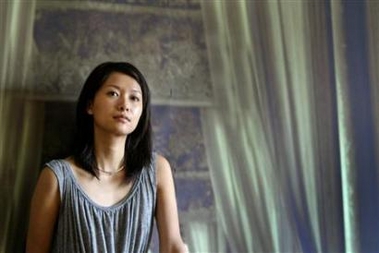 Chinese
actress-turned-director Xu Jinglei poses for a photo after an interview in
Beijing, in this June 1, 2005 file photo. Chinese actress-turned-director Xu
Jinglei became the world's most widely read blogger this month when her blog
logged 100 million page views within about 600 days, the Beijing News said on
Thursday. And Xu, who has a reputation for a high intellect and integrity, has
done it without writing about sex or providing a catalogue of kiss-and-tell
stories -- but focusing on her work and day-to-day life. The 100 millionth hit
occurred on July 12, according to www.sina.com.cn, a popular Chinese Web site
which provides blog services to many Chinese entertainers, including Xu who
started hers in October 2005 and published a book of her blogged articles in
March 2006. The 33-year-old blogger has invited 20 fans, selected from online
submissions, to her party to celebrate her latest success. Xu won international
acclaim when she won the best director award for "Letter From An Unknown Woman"
at the 2004 San Sebastian International Film Festival in Spain. Leading blog
search engine Technorati has said Xu's blog recorded last year the most incoming
links of any on the Internet. Huang Ke, an analyst with Sina, told Reuters Xu's
Web site has had 2 million more hits since July 12 breakthrough. Writer Han Han,
ranked second by Sina, will soon exceed the 100 million mark too, the analyst
added. Chinese
actress-turned-director Xu Jinglei poses for a photo after an interview in
Beijing, in this June 1, 2005 file photo. Chinese actress-turned-director Xu
Jinglei became the world's most widely read blogger this month when her blog
logged 100 million page views within about 600 days, the Beijing News said on
Thursday. And Xu, who has a reputation for a high intellect and integrity, has
done it without writing about sex or providing a catalogue of kiss-and-tell
stories -- but focusing on her work and day-to-day life. The 100 millionth hit
occurred on July 12, according to www.sina.com.cn, a popular Chinese Web site
which provides blog services to many Chinese entertainers, including Xu who
started hers in October 2005 and published a book of her blogged articles in
March 2006. The 33-year-old blogger has invited 20 fans, selected from online
submissions, to her party to celebrate her latest success. Xu won international
acclaim when she won the best director award for "Letter From An Unknown Woman"
at the 2004 San Sebastian International Film Festival in Spain. Leading blog
search engine Technorati has said Xu's blog recorded last year the most incoming
links of any on the Internet. Huang Ke, an analyst with Sina, told Reuters Xu's
Web site has had 2 million more hits since July 12 breakthrough. Writer Han Han,
ranked second by Sina, will soon exceed the 100 million mark too, the analyst
added.
The ice cream market has seen increasing competition
between international brands and leading local makers - and this year might be a
turning point for both players. Mengniu from Inner Mongolia has seen a rapidly
growing market share due to its successful sponsorship of Super Girl, based on
the hit American Idol show, launched by Central China's Hunan TV last year. At
the beginning of the year the world's largest ice cream brand Wall's started the
Magnum 2007 Blog Competition. The foreign company's quick reaction and ability
to learn has impressed the market. Traditional flavors, such as chocolate,
fruity and beans will continue to be popular this year, but new products,
designed for freshness or low calories, will become the summer's new attraction.
Nestle announced in March that it will develop more than 10 kinds of ice cream
products. Foreign companies all find China too big and the market too
diversified. Dealing with China is like operating in several different markets.
Although Wall's has spared no effort in promoting its brand in China, losses are
still unavoidable. This year might be a turning point for the company after six
consecutive years in the red. Wall's is now more and more familiar with the
Chinese market. Its strategy is developing markets around China, such as Vietnam
and Thailand and making neighboring countries influence China. It signed a
three-year contract with the convenience store chain 7-Eleven in Thailand for
the exclusive sale of its products. The company now has a 50 percent market
share in Thailand, with Nestle in the second spot with a share of about 10
percent. As a global leader, Nestle makes use of the company's global strategy
and resources. It plans to sell ice cream at retail prices of 10 to 20 yuan at
Starbucks outlets, with long-term plans to reach out through other channels such
as airplane catering, corporate activities and even food for those under medical
care. Competition for outlets - China's ice cream market was chaotic for many
years. Yili and Mengniu are the only domestic producers that have the potential
to compete against foreign rivals, while there are a large number of local
brands that "are busy for one season, and enjoy the whole year". Meanwhile, an
increasing number of ice cream shops have opened in recent years, with the
concept of offering freshly scooped ice cream and do-it-yourself combinations.
Some have attracted a large number of young and fashionable consumers.
China Petroleum & Chemical Corp
(0386), more popularly known as Sinopec, pumped 2.12 percent more crude oil in
the first half of the year and refined 6.4 percent more crude, but oil- price
volatility, which is likely to erode profit margins, is casting a shadow over
its second-half prospects.
July 19, 2007
 Hong Kong:
Shui On Construction and
Materials (0983), controlled by businessman Vincent Lo Hong-sui, plans to sell
HK$1.8 billion worth of shares in Shui On Land (0272) to its parent. Hong Kong:
Shui On Construction and
Materials (0983), controlled by businessman Vincent Lo Hong-sui, plans to sell
HK$1.8 billion worth of shares in Shui On Land (0272) to its parent.
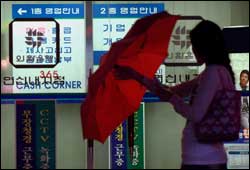 HSBC (0005) has expressed
interest in taking control of controversy-laden Korea Exchange Bank from US
private equity fund Lone Star in a deal that could cost at least US$5 billion
(HK$39 billion), according to a media report. HSBC has contacted Lone Star about
a potential deal to take a controlling stake in South Korea's fourth-largest
lender, London's Daily Telegraph reported, citing people familiar with the
situation. "I think, in general, it should be positive for HSBC's development,"
said an analyst at an Asian investment bank. "HSBC has been lately trying to
expand further in emerging markets, and this transaction is in line with that
strategy," he said. A deal with Lone Star would make sense, he said, since Lone
Star is not primarily a bank operator. "It's really a nonperforming loan
investor." Lone Star acquired a 50.5 percent stake in KEB for US$1.2 billion in
2003, when lenders in South Korea were reeling from the corporate collapses that
followed the Asian financial crisis. HSBC's expression of interest is said to be
"extremely preliminary," the Daily Telegraph said, citing sources. HSBC (0005) has expressed
interest in taking control of controversy-laden Korea Exchange Bank from US
private equity fund Lone Star in a deal that could cost at least US$5 billion
(HK$39 billion), according to a media report. HSBC has contacted Lone Star about
a potential deal to take a controlling stake in South Korea's fourth-largest
lender, London's Daily Telegraph reported, citing people familiar with the
situation. "I think, in general, it should be positive for HSBC's development,"
said an analyst at an Asian investment bank. "HSBC has been lately trying to
expand further in emerging markets, and this transaction is in line with that
strategy," he said. A deal with Lone Star would make sense, he said, since Lone
Star is not primarily a bank operator. "It's really a nonperforming loan
investor." Lone Star acquired a 50.5 percent stake in KEB for US$1.2 billion in
2003, when lenders in South Korea were reeling from the corporate collapses that
followed the Asian financial crisis. HSBC's expression of interest is said to be
"extremely preliminary," the Daily Telegraph said, citing sources.
Calling the law against homosexual
anal sex in a public place "unconstitutional," Hong Kong's top court has
unanimously rejected an appeal by the secretary of justice in a case in which
two men were charged but acquitted.
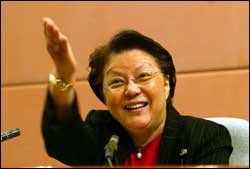
 Legislative Council
president Rita Fan Hsu Lai-tai has announced she will not run for the Legco
elections next year. She also denied reports she has been approached to join the
Standing Committee of the National People's Congress. "After a long and very
serious consideration, I have decided not to participate in the coming
Legislative Council election in 2008," Fan said yesterday. "I have decided to
step down from the presidency because, by the end of July 2008, I will have been
the president for 11 years ... I think we should have a new person with a
different style as the president." Fan, 61, who has served in Legco for 20
years, became the territory's first Legco president following the handover in
1997. She was also the first woman to take up the post. Educated at the
University of Hong Kong, Fan has been recognized for her efforts in both the
private and public sectors. She has served as Hong Kong deputy in the 10th
National People's Congress of the People's Republic of China and from 1989 to
1992 served as an executive councilor under British rule. She refused to comment
on whether her move is related to her possible candidacy for the NPC Standing
Committee, which she said was a rumor. "No one has ever contacted me to be a
member of the standing committee," Fan said. "It is absolutely too early to
think about [running for NPC membership]. Maybe in a few months I will think
about it but I haven't started thinking about it." The directly elected
legislator for the Hong Kong Island constituency in 2004 also said she had
decided not to run as she could not convince one of her key campaign aides at
the last election to help her again. "I chose to announce my decision a year
before the election as I want to let other people who are interested in standing
for the HK Island constituency next year that they do not need to consider Rita
Fan in their campaign strategies," Fan explained. She said she has already
notified the two possible candidates for the next president - Legco's House
Committee chairwoman Miriam Lau Kin-yee of the Liberal Party and the former
security chief Regina Ip Lau Suk-yee - of her decision. "They are both very
competent and capable women," Fan said. "I fully support them to run for the
Legco election next year." Lau said Fan's stepping down was regrettable but that
she respected Fan's decision. When asked whether she would run for the next
Legco presidency, Lau said it was a post for which she had some experience as
she acted in that capacity when Fan was not available. However, Lau emphasized
it was premature to say whether she will be a candidate. Ip also said she had
not made up her mind whether or not to run for the HK Island constituency but
she was confident she could win the backing of some of Fan's supporters as they
shared similar characteristics. We went to the same school. We are both working
wives and widows. We are both hard working," Ip said. Ip added the major
difference between them was her three decades of experience as a civil servant
and she felt this would give her a better feel for the government's policies.
Democrat Yeung Sum said Fan's decisions as a president were mainly fair though
there were occasions when the democrats did not agree with her judgment. "There
is always room for improvement, but by and large I think she has been accepted
as having held an acceptable equilibrium on most occasions," Civic Party
lawmaker Alan Leong Kah- kit said, noting Fan's move not to run was both
understandable and respectable. Widely known for her conservative political
views and reserved manner, Fan was once compared with Jiang Qing or Madame Mao,
the fourth wife of Mao Zedong, earlier in her career. However, medical sector
lawmaker Kwok Ka-ki said the comparison was unfair to Fan, who was entirely
different from the image or persona she projected to the public. Legislative Council
president Rita Fan Hsu Lai-tai has announced she will not run for the Legco
elections next year. She also denied reports she has been approached to join the
Standing Committee of the National People's Congress. "After a long and very
serious consideration, I have decided not to participate in the coming
Legislative Council election in 2008," Fan said yesterday. "I have decided to
step down from the presidency because, by the end of July 2008, I will have been
the president for 11 years ... I think we should have a new person with a
different style as the president." Fan, 61, who has served in Legco for 20
years, became the territory's first Legco president following the handover in
1997. She was also the first woman to take up the post. Educated at the
University of Hong Kong, Fan has been recognized for her efforts in both the
private and public sectors. She has served as Hong Kong deputy in the 10th
National People's Congress of the People's Republic of China and from 1989 to
1992 served as an executive councilor under British rule. She refused to comment
on whether her move is related to her possible candidacy for the NPC Standing
Committee, which she said was a rumor. "No one has ever contacted me to be a
member of the standing committee," Fan said. "It is absolutely too early to
think about [running for NPC membership]. Maybe in a few months I will think
about it but I haven't started thinking about it." The directly elected
legislator for the Hong Kong Island constituency in 2004 also said she had
decided not to run as she could not convince one of her key campaign aides at
the last election to help her again. "I chose to announce my decision a year
before the election as I want to let other people who are interested in standing
for the HK Island constituency next year that they do not need to consider Rita
Fan in their campaign strategies," Fan explained. She said she has already
notified the two possible candidates for the next president - Legco's House
Committee chairwoman Miriam Lau Kin-yee of the Liberal Party and the former
security chief Regina Ip Lau Suk-yee - of her decision. "They are both very
competent and capable women," Fan said. "I fully support them to run for the
Legco election next year." Lau said Fan's stepping down was regrettable but that
she respected Fan's decision. When asked whether she would run for the next
Legco presidency, Lau said it was a post for which she had some experience as
she acted in that capacity when Fan was not available. However, Lau emphasized
it was premature to say whether she will be a candidate. Ip also said she had
not made up her mind whether or not to run for the HK Island constituency but
she was confident she could win the backing of some of Fan's supporters as they
shared similar characteristics. We went to the same school. We are both working
wives and widows. We are both hard working," Ip said. Ip added the major
difference between them was her three decades of experience as a civil servant
and she felt this would give her a better feel for the government's policies.
Democrat Yeung Sum said Fan's decisions as a president were mainly fair though
there were occasions when the democrats did not agree with her judgment. "There
is always room for improvement, but by and large I think she has been accepted
as having held an acceptable equilibrium on most occasions," Civic Party
lawmaker Alan Leong Kah- kit said, noting Fan's move not to run was both
understandable and respectable. Widely known for her conservative political
views and reserved manner, Fan was once compared with Jiang Qing or Madame Mao,
the fourth wife of Mao Zedong, earlier in her career. However, medical sector
lawmaker Kwok Ka-ki said the comparison was unfair to Fan, who was entirely
different from the image or persona she projected to the public.
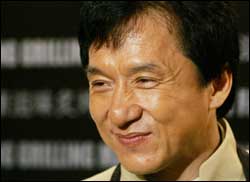 Jackie Chan
Kong-sang has signed on for what media described as a drama portraying the lives
of Chinese immigrants in Tokyo's bustling Shinjuku district scheduled to start
shooting in November, Chan's spokesman said yesterday. Solon So confirmed Chan's
involvement in the Derek Yee Tung-sing movie whose Chinese title translates as
Shinjuku Incident, but declined to give details about Chan's role or the plot.
According to The Beijing News newspaper, Shinjuku Incident is about Chinese
immigrants in Shinjuku, one of Tokyo's most crowded shopping and entertainment
districts. The report quoted Hong Kong director Yee as saying Chan's role will
be more drama than action. "A few years ago the audience couldn't accept Jackie
Chan as an actor. But he has matured and the timing is right," Yee reportedly
said. Chan mentioned the new movie in an interview last year. He would not
describe the story but said then it is based on a true story and that it would
be shot in Japan. So said Chan's production company, JCE Movies, has invested in
Shinjuku Incident, but did not provide further details. A spokeswoman for JCE,
Kitty Leung, said the film is scheduled to start shooting in November. The movie
does not have an English title yet. Chan is currently shooting The Forbidden
Kingdom, a Hollywood kung fu movie co-starring Jet Li. The Beijing News said
Shinjuku Incident will also feature Ken Watanabe from The Last Samurai and Hong
Kong actor Daniel Wu Yin-cho. JCE spokeswoman Leung declined to reveal the cast.
Contact information for Watanabe's publicist was not immediately available.
Calls to director Yee's office went unanswered. Jackie Chan
Kong-sang has signed on for what media described as a drama portraying the lives
of Chinese immigrants in Tokyo's bustling Shinjuku district scheduled to start
shooting in November, Chan's spokesman said yesterday. Solon So confirmed Chan's
involvement in the Derek Yee Tung-sing movie whose Chinese title translates as
Shinjuku Incident, but declined to give details about Chan's role or the plot.
According to The Beijing News newspaper, Shinjuku Incident is about Chinese
immigrants in Shinjuku, one of Tokyo's most crowded shopping and entertainment
districts. The report quoted Hong Kong director Yee as saying Chan's role will
be more drama than action. "A few years ago the audience couldn't accept Jackie
Chan as an actor. But he has matured and the timing is right," Yee reportedly
said. Chan mentioned the new movie in an interview last year. He would not
describe the story but said then it is based on a true story and that it would
be shot in Japan. So said Chan's production company, JCE Movies, has invested in
Shinjuku Incident, but did not provide further details. A spokeswoman for JCE,
Kitty Leung, said the film is scheduled to start shooting in November. The movie
does not have an English title yet. Chan is currently shooting The Forbidden
Kingdom, a Hollywood kung fu movie co-starring Jet Li. The Beijing News said
Shinjuku Incident will also feature Ken Watanabe from The Last Samurai and Hong
Kong actor Daniel Wu Yin-cho. JCE spokeswoman Leung declined to reveal the cast.
Contact information for Watanabe's publicist was not immediately available.
Calls to director Yee's office went unanswered.
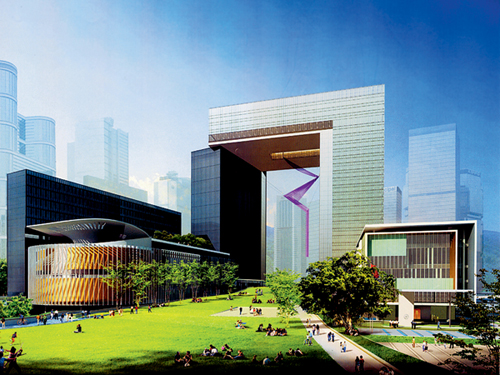 The towering, arch-shaped design known as The Door has
been chosen from four contenders for the Hong Kong government's new headquarters
on the harbourfront at Tamar - though it may not have been the option most
popular with the public. The government yesterday announced a selection panel
had picked the proposal by a Gammon-Hip Hing joint venture, but did not make
public the preferences expressed online and by visitors to an exhibition of
models of the designs. It would not say whether the public's opinions would be
revealed later. The choice was generally welcomed by professionals, but critics
said keeping secret the views of the 13,000 people who filled in comment cards
on the designs flew in the face of Chief Executive Donald Tsang Yam-kuen's
pledge of greater engagement with the public on decision-making. A contract to
build the headquarters, a building for the Chief Executive's Office and
Executive Council, a new chamber for the Legislative Council and a building for
lawmakers and the Legco secretariat will be awarded this year. Work is expected
to be completed by 2010. The four proposals were given scores by the selection
panel; 60 per cent of the score for each was for quality and 40 per cent for
cost. Sources close to bidders said the winning bid's price was at the top end
of the budget, which is HK$5.2 billion. The government said a letter of intent
had been issued to the winning bidder but that this did not mean it would get
the contract. The selection panel would need to reach a decision about that,
which would depend on Gammon-Hip Hing getting the approval of the Town Planning
Board. Planning permission is needed since under its plan, part of the
Legislative Council building encroaches on an area designated for open space.
The developers must apply to the board for rezoning of that part of the site.
They must also meet the tender requirement of keeping 2 hectares of open space
at the Admiralty site, formerly a British naval dockyard. "Whether the board
will approve the application depends on the accessibility of the open space [in
the company's design]," Chinese University architecture professor and planning
board member Bernard Lim Wan-fung said. "For example, will it be open to the
public 24 hours? Will we be able to walk directly to the waterfront?" He said
the chosen proposal was the best of the four because it provided better air flow
and was a more elegant design. Professor Lim urged the government to publish the
public's views on the four proposals and the scores the panel, headed by the
chief secretary, awarded them. Albert Lai Kwong-tak, chairman of the Hong Kong
People's Council for Sustainable Development, agreed. "If the government does
not announce the public's opinions ... it will be detrimental to public
enthusiasm [for the project]," he said. Vincent Ng Wing-shun, former
vice-president of the Hong Kong Institute of Architects, said the winning design
integrated the complex into the open space. "It's just like the government is
embracing the public, it's welcoming," he said. Other architects, who declined
to be named, likened it to the new CCTV headquarters in Beijing, also in the
form of an arch, while others said the distance between offices in the two sides
of the arch might hinder communication among staff. Gammon Construction chief
executive Thomas Ho On-sing said it was too early to comment.
The towering, arch-shaped design known as The Door has
been chosen from four contenders for the Hong Kong government's new headquarters
on the harbourfront at Tamar - though it may not have been the option most
popular with the public. The government yesterday announced a selection panel
had picked the proposal by a Gammon-Hip Hing joint venture, but did not make
public the preferences expressed online and by visitors to an exhibition of
models of the designs. It would not say whether the public's opinions would be
revealed later. The choice was generally welcomed by professionals, but critics
said keeping secret the views of the 13,000 people who filled in comment cards
on the designs flew in the face of Chief Executive Donald Tsang Yam-kuen's
pledge of greater engagement with the public on decision-making. A contract to
build the headquarters, a building for the Chief Executive's Office and
Executive Council, a new chamber for the Legislative Council and a building for
lawmakers and the Legco secretariat will be awarded this year. Work is expected
to be completed by 2010. The four proposals were given scores by the selection
panel; 60 per cent of the score for each was for quality and 40 per cent for
cost. Sources close to bidders said the winning bid's price was at the top end
of the budget, which is HK$5.2 billion. The government said a letter of intent
had been issued to the winning bidder but that this did not mean it would get
the contract. The selection panel would need to reach a decision about that,
which would depend on Gammon-Hip Hing getting the approval of the Town Planning
Board. Planning permission is needed since under its plan, part of the
Legislative Council building encroaches on an area designated for open space.
The developers must apply to the board for rezoning of that part of the site.
They must also meet the tender requirement of keeping 2 hectares of open space
at the Admiralty site, formerly a British naval dockyard. "Whether the board
will approve the application depends on the accessibility of the open space [in
the company's design]," Chinese University architecture professor and planning
board member Bernard Lim Wan-fung said. "For example, will it be open to the
public 24 hours? Will we be able to walk directly to the waterfront?" He said
the chosen proposal was the best of the four because it provided better air flow
and was a more elegant design. Professor Lim urged the government to publish the
public's views on the four proposals and the scores the panel, headed by the
chief secretary, awarded them. Albert Lai Kwong-tak, chairman of the Hong Kong
People's Council for Sustainable Development, agreed. "If the government does
not announce the public's opinions ... it will be detrimental to public
enthusiasm [for the project]," he said. Vincent Ng Wing-shun, former
vice-president of the Hong Kong Institute of Architects, said the winning design
integrated the complex into the open space. "It's just like the government is
embracing the public, it's welcoming," he said. Other architects, who declined
to be named, likened it to the new CCTV headquarters in Beijing, also in the
form of an arch, while others said the distance between offices in the two sides
of the arch might hinder communication among staff. Gammon Construction chief
executive Thomas Ho On-sing said it was too early to comment.
Three structures of the last walled village in a Hong Kong
urban area would be preserved under a re-development plan, Secretary for
Development Carrie Lam Cheng Yuet-ngor said on Wednesday. Speaking at a
Legislative Council’s subcommittee meeting on heritage conservation, Mrs Lam
said a clan hall, temple and ancient arch of Nga Tsin Wai Village, Wong Tai Sin,
would be preserved. Mrs Lam, who took over as the chief of the newly created
development bureau early this month, said the authorities would consider an
unprecedented move. This would include compensating and relocating residents
before re-development plans were complete. “I can assure residents that I will
look for sufficient justifications for this arrangement,” she said. However, Mrs
Lam told the Legco subcommittee that this arrangement, if implemented, should
not set a precedent for future projects. “This is because the Urban Renewal
Authority cannot afford the financial burden involved,” she said. The
600-year-old village was the last remaining walled village in the territory’s
urban area. Developer Cheung Kong (SEHK: 0001) now owns 80 per cent of the
village’s property rights. It is one of the disputed projects on the Urban
Renewal Authority’s plan for re-development. Conservation activists are
campaigning for the preservation of the whole village, citing its historic
value.
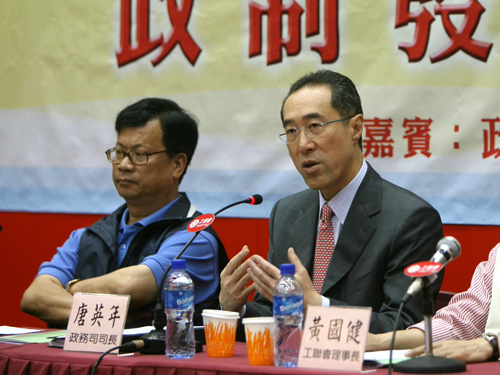 The most popular
proposal on political reform will have to gather two-thirds support from
legislators and Beijing's approval, Chief Secretary Henry Tang Ying-yen reminded
people in his first public appearance to promote the green paper. Speaking to
the Federation of Trade Unions yesterday, Mr Tang said he noticed that polls
were already taking place to gather public opinions on the paper's options.
"When an ideal proposal has come out, we shall ask whether it can obtain
two-thirds support in the Legislative Council, and whether it can obtain the
consent of the central government," he said. "It must also abide by the
framework set in the Basic Law." FTU president Cheng Yiu-tong said members had
expressed concern over the proposal to apply universal suffrage in 2012 and end
functional constituency seats in Legco. "Some have questioned if these will
breach the principles of `gradual and orderly progress' and `balanced
participation'," he said after the meeting with more than 100 workers.
Constitutional affairs chief Stephen Lam Sui-lung and labour chief Matthew
Cheung Kin-chung accompanied the chief secretary. "The arrangements were made to
demonstrate the team spirit in the administration and we will continue to work
like a team," Mr Tang said. He did not rule out having four ministers appear at
meetings to promote the green paper. Meanwhile, the pan-democratic camp had yet
to reach a consensus on details of the campaign to push for universal suffrage
in 2012, but said a "model answer" to the options suggested in the green paper
would be given soon. "The model answer will follow the format of the green paper
to help the public to understand it," Democratic Party lawmaker Yeung Sum said.
National People's Congress Standing Committee member Tsang Hin-chi said that "no
matter a quicker pace or a slower pace [to attain universal suffrage], we must
follow the rules as stated in the Basic Law". The most popular
proposal on political reform will have to gather two-thirds support from
legislators and Beijing's approval, Chief Secretary Henry Tang Ying-yen reminded
people in his first public appearance to promote the green paper. Speaking to
the Federation of Trade Unions yesterday, Mr Tang said he noticed that polls
were already taking place to gather public opinions on the paper's options.
"When an ideal proposal has come out, we shall ask whether it can obtain
two-thirds support in the Legislative Council, and whether it can obtain the
consent of the central government," he said. "It must also abide by the
framework set in the Basic Law." FTU president Cheng Yiu-tong said members had
expressed concern over the proposal to apply universal suffrage in 2012 and end
functional constituency seats in Legco. "Some have questioned if these will
breach the principles of `gradual and orderly progress' and `balanced
participation'," he said after the meeting with more than 100 workers.
Constitutional affairs chief Stephen Lam Sui-lung and labour chief Matthew
Cheung Kin-chung accompanied the chief secretary. "The arrangements were made to
demonstrate the team spirit in the administration and we will continue to work
like a team," Mr Tang said. He did not rule out having four ministers appear at
meetings to promote the green paper. Meanwhile, the pan-democratic camp had yet
to reach a consensus on details of the campaign to push for universal suffrage
in 2012, but said a "model answer" to the options suggested in the green paper
would be given soon. "The model answer will follow the format of the green paper
to help the public to understand it," Democratic Party lawmaker Yeung Sum said.
National People's Congress Standing Committee member Tsang Hin-chi said that "no
matter a quicker pace or a slower pace [to attain universal suffrage], we must
follow the rules as stated in the Basic Law".
 China:
The number of China's domestic mergers and acquisitions (M&As) jumped in the
first half of the year as funds raised in buoyant equity markets were put to use
to consolidate fragmented industries, analysts said yesterday.
China:
The number of China's domestic mergers and acquisitions (M&As) jumped in the
first half of the year as funds raised in buoyant equity markets were put to use
to consolidate fragmented industries, analysts said yesterday.
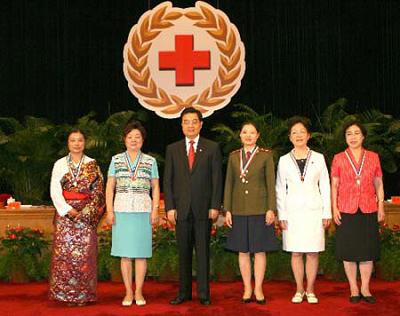 Chinese President Hu Jintao (L-3), who
is also the Honorary Director of the Red Cross Society of China, poses with five
Chinese nurses who won this year’s Florence Nightingale Medal for a group photo
after presenting the medals to them in Beijing, July 17, 2007. The Florence
Nightingale Medal is the Red Cross Movement’s highest international distinction
award for the nursing profession. Chinese President Hu Jintao (L-3), who
is also the Honorary Director of the Red Cross Society of China, poses with five
Chinese nurses who won this year’s Florence Nightingale Medal for a group photo
after presenting the medals to them in Beijing, July 17, 2007. The Florence
Nightingale Medal is the Red Cross Movement’s highest international distinction
award for the nursing profession.
China Life Insurance Co, the
country's largest insurer, is said to be ready to pay 3.6 billion yuan for a 60
percent stake of Zhongcheng Trust & Investment Corp.
Chinese regulators have concluded
China-made tires at the center of a massive US recall controversy meet American
safety standards, a government spokeswoman said Wednesday. Officials inspected
the Hangzhou Zhongce Rubber Co. and tested tires of the same type as those sold
in the United States, said the spokeswoman for the General Administration of
Quality Supervision, Inspection and Quarantine, or AQSIQ. She would give only
her surname, Xia. "They found that all of the examples meet American standards,"
Xia told The Associated Press. Xia said she did not know how many tires were
tested. Chinese news reports put the number at three. US authorities ordered a
recall of up to 450,000 tires made by Hangzhou Zhongce after its distributor,
Foreign Tire Sales Inc. of Union, New Jersey, said they lacked a key component,
known as a gum strip, that binds together belts of a tire. Xia said she did not
know whether the tests confirmed the tires lacked a gum strip or whether
authorities were sure they were representative of those sold in the United
States.
 Popular TV host Yang Lan grabbed the top spot; Taiwanese singer Yi Nengjing was
second and 42-year-old media scholar Yu Dan finished third. It is not a race
among women celebrities throughout China, but the results of a nationwide survey
of China's 50 most beautiful women. Even deceased actress Chen Xiaoxu, who made
a name for herself as Lin Daiyu in the dramatic TV series "A Dream of Red
Mansion", came in at fourth in the list. The results were released based on
votes by Internet users and judges' recommendations. As many as 539,073 Internet
users cast their votes via their mobile phones choosing from about 100
candidates, including 2005 Super Girl Li Yuchun, 2006 Super Girl Shang Wenjie,
and actress Zhao Wei. The eagerly awaited finale led to furor when Li Yuchun,
who reached stardom after winning the national singing contest "Super Voice
Girls" in 2005, failed to gain a position on the beauty list. Originally, Li was
voted to be the most beautiful woman, followed by Shang and Zhao in the primary
election. But their names didn't appear when the final results were announced.
"There must be some shady decision-making behind the selection," Li's fans
complained, citing reasons that third place Yu stood at 55 in the primary
selection.
Popular TV host Yang Lan grabbed the top spot; Taiwanese singer Yi Nengjing was
second and 42-year-old media scholar Yu Dan finished third. It is not a race
among women celebrities throughout China, but the results of a nationwide survey
of China's 50 most beautiful women. Even deceased actress Chen Xiaoxu, who made
a name for herself as Lin Daiyu in the dramatic TV series "A Dream of Red
Mansion", came in at fourth in the list. The results were released based on
votes by Internet users and judges' recommendations. As many as 539,073 Internet
users cast their votes via their mobile phones choosing from about 100
candidates, including 2005 Super Girl Li Yuchun, 2006 Super Girl Shang Wenjie,
and actress Zhao Wei. The eagerly awaited finale led to furor when Li Yuchun,
who reached stardom after winning the national singing contest "Super Voice
Girls" in 2005, failed to gain a position on the beauty list. Originally, Li was
voted to be the most beautiful woman, followed by Shang and Zhao in the primary
election. But their names didn't appear when the final results were announced.
"There must be some shady decision-making behind the selection," Li's fans
complained, citing reasons that third place Yu stood at 55 in the primary
selection.
 China's NBA star center Yao Ming walks with his Huston Rockets' conditioning
coach before a training session with his national teammates in Beijing July 17,
2007. The team is preparing for the upcoming Stankovic Continental Champions
Cup.
China's NBA star center Yao Ming walks with his Huston Rockets' conditioning
coach before a training session with his national teammates in Beijing July 17,
2007. The team is preparing for the upcoming Stankovic Continental Champions
Cup.
China and the United States will
hold a meeting in Beijing to discuss the detention of four kinds of China's
seafood exports by the US and the setting up of a collaboration mechanism on
food safety, a senior Chinese quality control official said on Wednesday. The
five-day consultation between Chinese food safety authorities and the Food and
Drug Administration (FDA) of the United States is scheduled to start on July 31,
said Li Yuanping, an official in charge of the safety of import and export
products at the General Administration of Quality Supervision, Inspection and
Quarantine (AQSIQ). Li also said that the recent suspension of sale of chicken
feet, pig ears and other animal products from seven US companies was conducted
according to a memorandum of understanding signed between the administration and
the US Department of Agriculture. The meat was contaminated with salmonella,
additives and veterinary drugs, according to the administration. In response to
criticism from overseas, he said that China was not counteracting overseas
complaints by picking holes in imports into the country. It's not the first time
China has suspended meat imports from the US -- the administration suspended
contaminated meat imports from 15 US companies in 2006, Li said. Meat imports
from 13 of those companies have resumed, according to Li. The FDA, under the US
Department of Health and Human Services, said on June 28 it would detain three
types of Chinese farm-raised fish -- catfish, basa and dace -- as well as shrimp
and eel unless suppliers could prove the shipments contained no harmful residues
unapproved in the U.S. for use in farmed seafood. Li Changjiang, the top quality
control official with AQSIQ, urged the US to "properly deal with the problem as
soon as possible" during a telephone conversation with US Health and Human
Services Secretary Michael Leavitt, adding that an "indiscriminate" ban of all
exports of such Chinese aquatic products was "unacceptable".
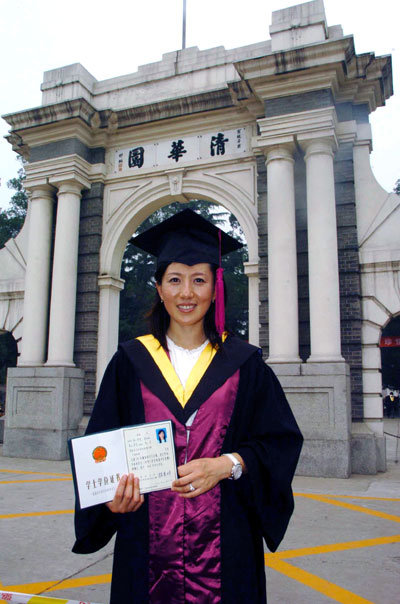 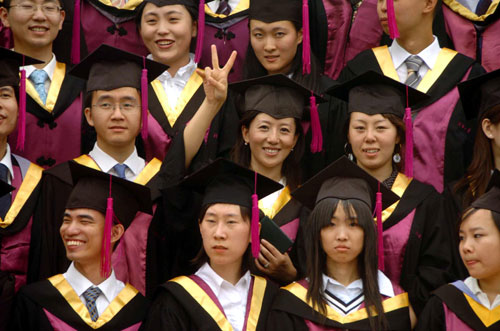 Former short track speed
skater and double Olympic gold medal winner Yang Yang (A) poses with her
schoolmates in graduating gowns in Tsinghua University July 17, 2007. Yang
received her bachelor's degree in economic management after five-year study in
the university.
Former short track speed
skater and double Olympic gold medal winner Yang Yang (A) poses with her
schoolmates in graduating gowns in Tsinghua University July 17, 2007. Yang
received her bachelor's degree in economic management after five-year study in
the university.
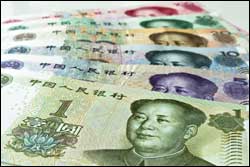 China should continue to strengthen its
macro tightening measures to deal with the country's soaring trade surplus and
credit and investment growth, a committee under the mainland's parliament said
yesterday. "The trend of economic growth going from relatively rapid to
overheating is becoming more evident," Xinhua News Agency cited the financial
and economic affairs committee of the National People's Congress as saying. The
committee had consulted with regulatory bodies, including the central bank and
the top planning agency, before reaching its conclusion. It also said China
continues to face increasing inflationary pressures, driven by rapidly
escalating food and property prices. The statement came ahead of tomorrow's
release of economic data, including second-quarter gross domestic product growth
and June's consumer price index figures. Meanwhile, Glenn Maguire, Asia- Pacific
chief economist at Societe Generale, said that while China's economy is rapidly
accelerating, it cannot be categorized as overheating. Anti-China sentiment and
calls for protectionist measures in the United States, are more cause for
concern for the Chinese economy than overheating, Maguire said. He added that
calls for punitive tariffs against Chinese goods in the United States will
further intensify due to the soaring trade imbalance, with China's surplus
possibly hitting US$300 billion (HK$2.34 trillion) by the end of 2007. China should continue to strengthen its
macro tightening measures to deal with the country's soaring trade surplus and
credit and investment growth, a committee under the mainland's parliament said
yesterday. "The trend of economic growth going from relatively rapid to
overheating is becoming more evident," Xinhua News Agency cited the financial
and economic affairs committee of the National People's Congress as saying. The
committee had consulted with regulatory bodies, including the central bank and
the top planning agency, before reaching its conclusion. It also said China
continues to face increasing inflationary pressures, driven by rapidly
escalating food and property prices. The statement came ahead of tomorrow's
release of economic data, including second-quarter gross domestic product growth
and June's consumer price index figures. Meanwhile, Glenn Maguire, Asia- Pacific
chief economist at Societe Generale, said that while China's economy is rapidly
accelerating, it cannot be categorized as overheating. Anti-China sentiment and
calls for protectionist measures in the United States, are more cause for
concern for the Chinese economy than overheating, Maguire said. He added that
calls for punitive tariffs against Chinese goods in the United States will
further intensify due to the soaring trade imbalance, with China's surplus
possibly hitting US$300 billion (HK$2.34 trillion) by the end of 2007.
China, the
world's largest pork consumer, will supply more poultry, beef and eggs and
tighten exports of corn to ease surging prices of the meat, the country's top
planning agency said.
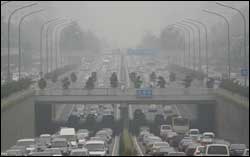 The Organization for Economic
Cooperation and Development warned yesterday that China's breakneck economic
growth was wreaking severe damage on the environment and said Beijing's efforts
to date to curb pollution had been insufficient. "Rapid economic development,
industrialization and urbanization have generated severe and growing pressures
on the environment resulting in significant damage to human health and depletion
of natural resources," said OECD Secretary General Angel Gurria in an
introduction to a report on China's environmental performance. He said "air
pollution levels in some cities are among the worst in the world, one-third of
water courses are severely polluted and illnesses and injuries are associated
with poor environmental and occupational conditions." China is also the world's
second- largest producer of greenhouse gases and is still the largest producer
and consumer of ozone-depleting substances, the report said. While authorities
have introduced some regulatory and economic measures, "these efforts have not
been sufficient to keep pace with environmental pressures and challenges
generated by the very rapid growth of the economy," the OECD said. The report,
which includes 51 policy recommendations, said energy consumption per unit of
economic output was about 20 percent higher than the OECD average. It also said
large-scale transfers of water from southern to northern China need to keep up
with growing demand. The Organization for Economic
Cooperation and Development warned yesterday that China's breakneck economic
growth was wreaking severe damage on the environment and said Beijing's efforts
to date to curb pollution had been insufficient. "Rapid economic development,
industrialization and urbanization have generated severe and growing pressures
on the environment resulting in significant damage to human health and depletion
of natural resources," said OECD Secretary General Angel Gurria in an
introduction to a report on China's environmental performance. He said "air
pollution levels in some cities are among the worst in the world, one-third of
water courses are severely polluted and illnesses and injuries are associated
with poor environmental and occupational conditions." China is also the world's
second- largest producer of greenhouse gases and is still the largest producer
and consumer of ozone-depleting substances, the report said. While authorities
have introduced some regulatory and economic measures, "these efforts have not
been sufficient to keep pace with environmental pressures and challenges
generated by the very rapid growth of the economy," the OECD said. The report,
which includes 51 policy recommendations, said energy consumption per unit of
economic output was about 20 percent higher than the OECD average. It also said
large-scale transfers of water from southern to northern China need to keep up
with growing demand.
July 18, 2007
 Hong Kong:
Shares of Fosun
International (0656) gained 12 percent on their trading debut yesterday, but
traded considerably below the 20 percent to 28 percent upside that was expected. Hong Kong:
Shares of Fosun
International (0656) gained 12 percent on their trading debut yesterday, but
traded considerably below the 20 percent to 28 percent upside that was expected.
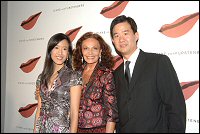 American husband and wife team David and Linda Ting were both working for Gucci
in New York when they first had the idea to bring high-end global brands to
Asia, via Hong Kong. Their company, Globalluxe Limited, was formed in 2001, with
US designer label Kate Spade as its first customer. As exclusive distributors
for the brand in Asia, Globalluxe has now opened 11 Kate Spade boutiques in
eight countries, and added US fashion brand Diane von Furstenberg (DVF) and
Italy's prestigious golf wear label Chervo to its stable.
American husband and wife team David and Linda Ting were both working for Gucci
in New York when they first had the idea to bring high-end global brands to
Asia, via Hong Kong. Their company, Globalluxe Limited, was formed in 2001, with
US designer label Kate Spade as its first customer. As exclusive distributors
for the brand in Asia, Globalluxe has now opened 11 Kate Spade boutiques in
eight countries, and added US fashion brand Diane von Furstenberg (DVF) and
Italy's prestigious golf wear label Chervo to its stable.
 Actor Xia Yu,
winner of Best Actor Award in 1994 Venice International Film Festival, and Hong
Kong multi-talented star Gigi Leung will go together in a new film "Bangzi,
Laohu, Ji",or "Bat, Tiger and Chicken." The film has started shooting in eastern
Chinese city of Hangzhou on Monday, targeting on this year's New Year's Eve
market. Director Wang Guangli said he would make the film "a large and
complicated guessing game" as well as a romantic love story. In the film, Xia
Yu, who plays the part of a fire balloon administrator, will fall in love with
Gigi Leung on a fire balloon. "We prepared a 25-meter diameter balloon.
Generally speaking, this kind of fire balloon is hard to control," the director
said. They plans to hold the floating balloon with a rope, like flying a kite.
This is the second time Xia Yu and Gigi Leung cooperated on the silver screen.
Seven years ago, they co-stared "My Brothers and Sisters", playing a brother and
a sister. Actor Xia Yu,
winner of Best Actor Award in 1994 Venice International Film Festival, and Hong
Kong multi-talented star Gigi Leung will go together in a new film "Bangzi,
Laohu, Ji",or "Bat, Tiger and Chicken." The film has started shooting in eastern
Chinese city of Hangzhou on Monday, targeting on this year's New Year's Eve
market. Director Wang Guangli said he would make the film "a large and
complicated guessing game" as well as a romantic love story. In the film, Xia
Yu, who plays the part of a fire balloon administrator, will fall in love with
Gigi Leung on a fire balloon. "We prepared a 25-meter diameter balloon.
Generally speaking, this kind of fire balloon is hard to control," the director
said. They plans to hold the floating balloon with a rope, like flying a kite.
This is the second time Xia Yu and Gigi Leung cooperated on the silver screen.
Seven years ago, they co-stared "My Brothers and Sisters", playing a brother and
a sister.
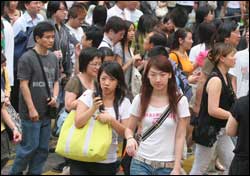 Hong Kong's population
will reach 8.57 million in 30 years' time, when up to one in four people will be
aged over 65 and the gender imbalance will get worse, according to projections
by the Census and Statistics Department. The department predicts the number of
males will fall from last year's 912 per 1,000 females to 709 per 1,000 females
by 2036. However, the estimated population still falls short of Chief Executive
Donald Tsang Yam-kuen's long-term target of 10 million. The SAR's population
stood at 6.86 million in the middle of last year. Commissioner of Census and
Statistics Fung Hing-wang said yesterday Hong Kong should come closer to Tsang's
target by putting in more effort. "Ten years after 2036, the population will be
about nine million, assuming the growth rate stays the same," he said. "If the
fertility rate were to increase from 0.9 percent in 2016 to 1.2 percent, like in
Japan or Singapore, which are similar economically and socially to Hong Kong, it
will add a further 600,000 to 700,000 to the population," he said. Of the 1.7
million growth in the overall population as projected over the next three
decades, only 491,000 will come from "natural increase," or the excess of births
over deaths, while 1.2 million will come through the influx of immigrants,
mainly one-way permit holders from the mainland. In an interview with The
Financial Times last month, Tsang said Hong Kong should aim for a population of
10 million over the long term to keep up with the likes of New York and London
as a global financial center. The projections highlighted three demographic
trends - the slowing of the territory's population growth, an aging population
and a declining male- to-female ratio. Fung said the rising trend of babies
being born to mainland women whose husbands are not Hong Kong permanent
residents will have a positive effect on the aging population. The number of
births is projected to remain at between 69,000 and 75,000 annually. Hong Kong's population
will reach 8.57 million in 30 years' time, when up to one in four people will be
aged over 65 and the gender imbalance will get worse, according to projections
by the Census and Statistics Department. The department predicts the number of
males will fall from last year's 912 per 1,000 females to 709 per 1,000 females
by 2036. However, the estimated population still falls short of Chief Executive
Donald Tsang Yam-kuen's long-term target of 10 million. The SAR's population
stood at 6.86 million in the middle of last year. Commissioner of Census and
Statistics Fung Hing-wang said yesterday Hong Kong should come closer to Tsang's
target by putting in more effort. "Ten years after 2036, the population will be
about nine million, assuming the growth rate stays the same," he said. "If the
fertility rate were to increase from 0.9 percent in 2016 to 1.2 percent, like in
Japan or Singapore, which are similar economically and socially to Hong Kong, it
will add a further 600,000 to 700,000 to the population," he said. Of the 1.7
million growth in the overall population as projected over the next three
decades, only 491,000 will come from "natural increase," or the excess of births
over deaths, while 1.2 million will come through the influx of immigrants,
mainly one-way permit holders from the mainland. In an interview with The
Financial Times last month, Tsang said Hong Kong should aim for a population of
10 million over the long term to keep up with the likes of New York and London
as a global financial center. The projections highlighted three demographic
trends - the slowing of the territory's population growth, an aging population
and a declining male- to-female ratio. Fung said the rising trend of babies
being born to mainland women whose husbands are not Hong Kong permanent
residents will have a positive effect on the aging population. The number of
births is projected to remain at between 69,000 and 75,000 annually.
One of Hong Kong’s most experienced politicians Rita Fan
Hsu Lai-tai announced on Tuesday afternoon that she will not run for re-election
to the legislature next year. The 61-year-old president of the legislative
council said her decision was made after “long and serious consideration”. Mrs
Fan said: “Preparation for the [Legco] election is time-consuming. I hope that
candidates interested in running for election for the Hong Kong Island
constituency will not have to take Rita Fan as a consideration, and will have
enough time, more than a year, to prepare for it.” She explained that by July
next year, she would have served for 11 years as president and it would be time
for “younger, more capable” people to emerge. The Legco speaker said she once
left the political stage in 1992, and returned in 1997 only because she intended
to help Hong Kong transit smoothly after the handover. Now that the situation in
Hong Kong has stabilized, Mrs Fan said it is time for her to step down. “There
is no more problem for smooth transition,” she said. Being asked if her move
implies her becoming a member of the National People’s Congress (NPC) Standing
Committee, Mrs Fan said this was just a rumor. “I think that [Tsang Hin-chi] has
high opinion of me,” she said. “But it is not me who has the power to decide [on
NPC membership].” Mr Tsang is the lone Hong Kong NPC delegate on the Standing
Committee. Mrs Fan said the Legco election and the NPC election were two
different issues. Mrs Fan said former secretary for security Regina Ip Lau
Suk-yee and Liberal Party vice-chairwoman Miriam Lau Kin-yee were capable
candidates to run for Legco election. “The final decision rests upon their
willingness. I cannot influence nor will I encourage them [to run for
election],” she added. The president expressed her confidence in the “collective
wisdom” of legislators to vote for a new Legco leader. She announced her plans
to travel and do things she has not had the chance to do after she steps down.
“I love to have fun and enjoy life,” she said. Mrs Fan was born in Shanghai.
After graduating from St Stephen’s Girls’ College, she obtained her bachelor
degree in science and a master’s degree in social science at the University of
Hong Kong. In 2003 she got an honorary doctor degree at the China University of
Political Science and Law. She entered Legco in 1983 and the executive council
in 1989 as a member until 1992. She had succeeded for three consecutive terms as
president of Legco since 1998. In 1993, Mrs Fan was chosen by the NPC to serve
on the Preliminary Working Committee for the Hong Kong Special Administrative
Region. In December 1995, the committee was turned into a 150-member Preparatory
Committee and Mrs Fan was given the task of convening the committee’s subgroup
on social and security issues. During her time as Legco president, Mrs Fan had
some memorable clashes with outspoken lawmaker Leung Kwok-hung or “long hair''.
 China:
In recent days the international media have been boiling with news of quality
problems in products "made in China," on which words like "poisonous
toothpaste," "shoddy tires", "lead toys," and "aquatic products containing
anti-bacteria agents" popped up frequently. The reasons behind a credit crisis
befalling Chinese products, this time, are complicated. For example, those who
stirred up a "china threat" in recent years have taken this opportunity for a
malicious attack. In addition, some western countries have raised their product
standards. However, what consumers are most concerned with has always been the
quality of products "made in China;" their lives have been caught up in the fast
expansion of Chinese products. Wasn't there an American journalist who tried a
life without Chinese commodities? Her experiment failed after one year, and her
conclusion was: such a life is difficult to maintain. As increasingly more
Chinese products appear in foreign supermarkets, retail stores, and restaurants,
and become globally known brands; foreign customers naturally began to pick and
choose. Most Chinese commodities that initially entered western markets were
cheap items in large baskets at supermarkets. Now, however, people look at
Chinese products in the same way they look at American and Japanese products.
Currently China exports over ten thousand types of commodities. Among such a
multitude of goods, each deal is made after careful discussion between exporters
and importers on qualifications, quality and other aspects. Therefore one is
justified in saying that products exported from China live up to standards of
importers and their states, as well as pass legal examination. Chinese products
are generally recognized and accepted by sellers and consumers of importing
countries. Problems with a few products should not significantly affect Chinese
exports. Manufacturing is crucial for a rising, developing nation like China.
Manufacturing represents the country's hard strength and simultaneously
determines China's international image. For more than two decades since its
reform and opening, China has been relying heavily on manufacturing for economic
development and will continue to do so. To improve the reputation of products
"made in China," product quality must first be improved. If we can look at
recent problems with products "made in China" overseas as both a challenge and
an opportunity; ensure that "made in China" becomes a standard in America and
Europe and China's food standards are high worldwide; and international
consumers enjoy high-quality products "made in China;" then we will not have to
fear any media hype!
China:
In recent days the international media have been boiling with news of quality
problems in products "made in China," on which words like "poisonous
toothpaste," "shoddy tires", "lead toys," and "aquatic products containing
anti-bacteria agents" popped up frequently. The reasons behind a credit crisis
befalling Chinese products, this time, are complicated. For example, those who
stirred up a "china threat" in recent years have taken this opportunity for a
malicious attack. In addition, some western countries have raised their product
standards. However, what consumers are most concerned with has always been the
quality of products "made in China;" their lives have been caught up in the fast
expansion of Chinese products. Wasn't there an American journalist who tried a
life without Chinese commodities? Her experiment failed after one year, and her
conclusion was: such a life is difficult to maintain. As increasingly more
Chinese products appear in foreign supermarkets, retail stores, and restaurants,
and become globally known brands; foreign customers naturally began to pick and
choose. Most Chinese commodities that initially entered western markets were
cheap items in large baskets at supermarkets. Now, however, people look at
Chinese products in the same way they look at American and Japanese products.
Currently China exports over ten thousand types of commodities. Among such a
multitude of goods, each deal is made after careful discussion between exporters
and importers on qualifications, quality and other aspects. Therefore one is
justified in saying that products exported from China live up to standards of
importers and their states, as well as pass legal examination. Chinese products
are generally recognized and accepted by sellers and consumers of importing
countries. Problems with a few products should not significantly affect Chinese
exports. Manufacturing is crucial for a rising, developing nation like China.
Manufacturing represents the country's hard strength and simultaneously
determines China's international image. For more than two decades since its
reform and opening, China has been relying heavily on manufacturing for economic
development and will continue to do so. To improve the reputation of products
"made in China," product quality must first be improved. If we can look at
recent problems with products "made in China" overseas as both a challenge and
an opportunity; ensure that "made in China" becomes a standard in America and
Europe and China's food standards are high worldwide; and international
consumers enjoy high-quality products "made in China;" then we will not have to
fear any media hype!
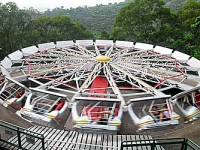 Wheel of Fortune
for China's Amusement Parks - Report from the China Amusement Machines and
Facilities Exhibition 2007, Beijing - Amusement park equipment manufacturing has
expanded steadily on the Chinese mainland over recent years to top Rmb5 billion
annually. While meeting domestic demand, amusement park equipment is also
exported to overseas markets. To attract more customers, some theme parks on the
Mainland are stepping up investment. Wheel of Fortune
for China's Amusement Parks - Report from the China Amusement Machines and
Facilities Exhibition 2007, Beijing - Amusement park equipment manufacturing has
expanded steadily on the Chinese mainland over recent years to top Rmb5 billion
annually. While meeting domestic demand, amusement park equipment is also
exported to overseas markets. To attract more customers, some theme parks on the
Mainland are stepping up investment.
East Star has become China's first private airline
authorized to operate international flights after less than two years in
business. The company is yet to release the timetable for the services, but
Hubei Television reported on Tuesday evening that a daily service would be
available from early September. According to Civil Aviation Administration of
China regulations, new airlines can qualify to apply to operate international
flights only after three years of operations. East Star, however, beat rivals
Okair, Ueair, Juneyao Airlines and Spring Airlines, which analysts say should be
attributed to the ongoing reform of China's civil aviation industry. Wuhan was
designated in October last year as the first city to carry out such reforms to
open up the country's civil aviation market. Under this reform, domestic
airlines are free to establish subsidiaries in Wuhan and open flights between
Wuhan and other domestic cities so long as they register with aviation
authorities. The first private airline in central and central-south China, East
Star has a registered capital of 80 million yuan and operates flights to more
than 10 cities in China. The company's fleet is expected to hit 20 by 2010.
American Airlines and Continental Airlines Inc. have asked
federal regulators for the right to operate new nonstop flights between the
United States and China beginning in March 2009.
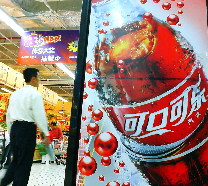 A shopper passes
a Coca-Cola stand at a Shanghai supermarket. The world's largest beverage maker
yesterday said it would pour $80 million to set up a new research center and a
new headquarters in China. A shopper passes
a Coca-Cola stand at a Shanghai supermarket. The world's largest beverage maker
yesterday said it would pour $80 million to set up a new research center and a
new headquarters in China.
ZTE Corp (0763), the mainland's
second-largest telecommunications equipment manufacturer, has secured more than
40 percent of the contracts to build network equipment for the commercial trial
based on the mainland's homegrown third-generation mobile standard, according to
company president Yin Yimin.
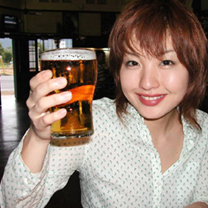 Summer is the perfect
season to crack open some beer. This bubbling alcoholic beverage doesn't just
help people cool down from the heat, but is also good for the body.
Nutritionists say beer is rich in silicon which is good for healthy bones. For
all the benefits beer brings, here we bring you some nice places in Beijing and
Shanghai to get a cold one or two. Summer is the perfect
season to crack open some beer. This bubbling alcoholic beverage doesn't just
help people cool down from the heat, but is also good for the body.
Nutritionists say beer is rich in silicon which is good for healthy bones. For
all the benefits beer brings, here we bring you some nice places in Beijing and
Shanghai to get a cold one or two.
July 17, 2007
 Hong Kong:
Hong Kong International
Airport reported a good performance in the first half of this year with
increases in passengers, cargo volumes and air traffic movements. Compared to
the corresponding period in 2006, the first six months of 2007 saw: Passenger
volume up 6.4 percent to 22.7 million; Cargo traffic grew 1.5 percent to 1.7
million tons; and ATMs increased 4.4 percent to 143,000. Compared to June 2006,
passenger and cargo volumes and ATMs all increased 5.7 percent, 5.3 percent, and
5.6 percent respectively. Hong Kong Airport Authority chief executive Stanley
Hui Hon-chung said HKIA expects passenger outbound volume to increase "as Hong
Kong people take summer holidays, plus strong inbound traffic from Europe, the
mainland and Southeast Asia." Hui also said the continued rise in cargo traffic
is particularly pleasing. In the busy vacation period, HKIA saw an increase in
passenger numbers of 5.7 percent, or 3.85 million, compared to the same period
in the previous year. For the 12 months ended June 30, passenger and cargo
traffic reached 45.8 million and 3.6 million tons respectively, an increase of
7.4 percent and 2.8 percent from the previous year's figures. Turnover for the
year ended March 31 showed a steady growth of HK$7.73 billion, an increase of 9
percent from the previous year's HK$7.07 billion. ATMs have also increased 4.8
percent from 270,000 to 283,000. HKIA earlier had announced a HK$4.5 billion
spending plan till 2010 to add parking stands and other facilities at the
airport. Projects such as a golf course, a cross-border ferry terminal and a
second airport hotel are under way. In the meantime, HKIA will offer a range of
social events and activities throughout this month and August in Terminal 1 and
2. They will feature magic shows, handicraft workshops, nail painting, story
telling, balloon art and a photo exhibition to provide travelers with "a
pleasant, memorable airport experience," Hui said. Hong Kong:
Hong Kong International
Airport reported a good performance in the first half of this year with
increases in passengers, cargo volumes and air traffic movements. Compared to
the corresponding period in 2006, the first six months of 2007 saw: Passenger
volume up 6.4 percent to 22.7 million; Cargo traffic grew 1.5 percent to 1.7
million tons; and ATMs increased 4.4 percent to 143,000. Compared to June 2006,
passenger and cargo volumes and ATMs all increased 5.7 percent, 5.3 percent, and
5.6 percent respectively. Hong Kong Airport Authority chief executive Stanley
Hui Hon-chung said HKIA expects passenger outbound volume to increase "as Hong
Kong people take summer holidays, plus strong inbound traffic from Europe, the
mainland and Southeast Asia." Hui also said the continued rise in cargo traffic
is particularly pleasing. In the busy vacation period, HKIA saw an increase in
passenger numbers of 5.7 percent, or 3.85 million, compared to the same period
in the previous year. For the 12 months ended June 30, passenger and cargo
traffic reached 45.8 million and 3.6 million tons respectively, an increase of
7.4 percent and 2.8 percent from the previous year's figures. Turnover for the
year ended March 31 showed a steady growth of HK$7.73 billion, an increase of 9
percent from the previous year's HK$7.07 billion. ATMs have also increased 4.8
percent from 270,000 to 283,000. HKIA earlier had announced a HK$4.5 billion
spending plan till 2010 to add parking stands and other facilities at the
airport. Projects such as a golf course, a cross-border ferry terminal and a
second airport hotel are under way. In the meantime, HKIA will offer a range of
social events and activities throughout this month and August in Terminal 1 and
2. They will feature magic shows, handicraft workshops, nail painting, story
telling, balloon art and a photo exhibition to provide travelers with "a
pleasant, memorable airport experience," Hui said.
Macao's tourist price index (TPI)
reached 129.59 in the second quarter, up 12.9 percent over the previous season,
according to official statistics issued Monday. The statistics from the
government-run Statistics and Census Service (SCS) attribute the TPI rise mainly
to the price hike occurred in the sectors of food and beverages in restaurant,
clothing and footwear, and jewelry. The TPI also saw a year-on-year increase of
7.95 percent in the second quarter, the figures showed. The TPI is an indicator
that reflects the price changes of goods and services purchased by visitors.
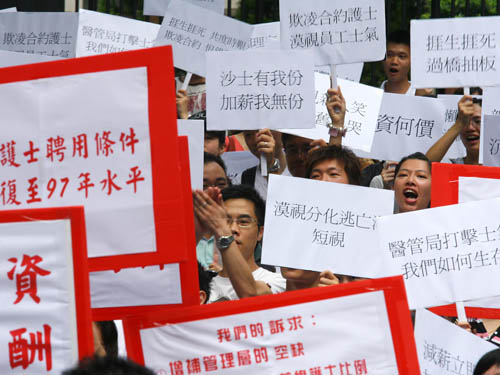 About 500 medical staff and nurses at public hospitals
took to the streets yesterday to demand higher pay. Protesters waved placards
and shouted "equal pay for equal work" in sweltering heat outside the main
entrance to the government headquarters in Central. The staff - mainly nurses,
physiotherapists and psychiatrists from 18 nursing unions - said they wanted pay
levels restored to pre-2000 levels. The Hospital Authority changed the pay scale
and cut wage packages for new doctors and nurses in 2000 after the economic
downturn.
About 500 medical staff and nurses at public hospitals
took to the streets yesterday to demand higher pay. Protesters waved placards
and shouted "equal pay for equal work" in sweltering heat outside the main
entrance to the government headquarters in Central. The staff - mainly nurses,
physiotherapists and psychiatrists from 18 nursing unions - said they wanted pay
levels restored to pre-2000 levels. The Hospital Authority changed the pay scale
and cut wage packages for new doctors and nurses in 2000 after the economic
downturn.
Trade fairs still a money-making
business despite profit warning - A profit warning posted by a leading trade
fair organizer may not be a pointer to the poor financial health of Hong Kong's
exhibitions sector, which in fact, is expanding physically, adding more space
and launching new events, analysts said. Last week, Kenfair International
Holdings (0223), known for its Mega Show series of exhibitions, said costs at
three overseas exhibitions have risen and losses widened, while losses at its
Spring Fair in January this year have tripled with exhibitor numbers falling.
The company is set to announce annual income for the year ended March 31 by the
end of this month. Sun Hung Kai Financial strategist Castor Pang Wai-sun said:
"It is weird to see the company losing money. Trade fairs continue to be a
money-making business. Europe and the United States are constantly being
overbooked, even in Hong Kong and the mainland." Kenfair organized three
overseas exhibitions in Europe and the United States, but none has performed
well. "It is about catching on to the trend and perhaps the company has missed
out. Overall, business opportunities for trade fairs should be good," an analyst
said. "Poor performance may be due to the fact that the company is taking on new
projects by expanding and increasing the number of overseas exhibitions," said
Kenny Tang Sing-hing, associate director at Tung Tai Securities. Pang noted that
customer reaction is critical. "If your customer loves your product, then it is
likely that they will continue to use you. But, if the exhibition is not
attractive, then very likely they will lose their clients." One of the biggest
players in the multibillion dollar business, Hong Kong Trade Development Council
is creating 19,400 square meters of extra exhibition space, equivalent to 1,000
booths by expanding the Hong Kong Convention and Exhibition Centre. The Hong
Kong Exhibition and Convention Industry Association, a trade body, estimates
that the exhibition industry contributes HK$19 billion to the economy, based on
data from an earlier study. Last month, the association said the number of trade
exhibitions increased to 65 last year from 40. It was the year that AsiaWorld-Expo
opened, offering 70,000 sq m of space in the city. TDC spokesman Lawrence Yau
Chung-hok said: "We believe the exhibition scene in Hong Kong is developing." He
added that trade fairs are international in composition. "TDC fairs consist of
50 percent overseas buyers." TDC, a public body, organized 31 fairs in fiscal
2006-2007 and also launched six new events. These attracted a record 27,000
exhibitors and 622,000 buyers, according to its annual report tabled to the
Legislative Council last week. TDC reported consolidated income of HK$1.93
billion in 2006-07. Tang from Tung Tai said: "The trade fair business in Hong
Kong is doing pretty good in itself, there is good growth. Kenfair's poor
performance may be due to their efforts aimed at expanding their overseas
market." Pico Far East Holdings (0752), a Hong Kong-listed exhibition services
provider, said last month net income for the six months ended April was up 39.9
percent to HK$80.2 million on turnover of HK$1.08 billion, up 30.5 percent.
Following the profit warning last Wednesday, Kenfair's shares fell 11.2 percent
to HK$1.03 the following day but closed on the last day of trading at HK$1.18,
up 14.5 percent. Pico dropped 2.7 percent on Friday to close at HK$2.51.
Hong Kong's population would grow to
8.57 million in 2036 — with as many as one in four aged over 65 and a lower
male-to-female ratio, latest projections by the government released on Monday
showed. On the basis of results of the 2006 population by-census, the Census and
Statistics Department estimated the territory’s population would increase at an
average annual rate of 0.7 per cent over the next three decades. At this rate,
the population would reach 8.57 million in mid-2036, from 6.86 million in the
middle of last year. The 1.71-million growth would comprise a natural increase
(births less deaths) of 0.49 million and a net movement (inflow less outflow) of
1.22 million, the figures showed. A growth rate of between 0.7 per cent and 0.9
per cent would continue in the next 20 years. Towards the end of the projection
period, it would slow down to 0.4 per cent with an increased number of deaths as
people grew older.
 China:
China had more than 860 million phone users by the end of May this year, partly
thanks to a growing rural market, statistics from the Ministry of Information
Industry have shown. The figure included 494 million mobile phone users and 372
million fixed-line subscribers, according to the ministry. The number of rural
users has been on the rise since the second half of 2006. With new registration
of about 1.7 million in the January-May period this year, the total rural phone
subscribers have topped 118.1 million, according to the ministry. In May alone,
the nation recorded new mobile phone subscribers of 7.16 million, while the
number of new fixed-line users in the first five months was 4.39 million. The
revenue of the country's telecommunications business rose 10.1 percent from a
year earlier to 318. 67 billion yuan (43.65 billion U.S. dollars) in the first
five months this year, said the ministry.
China:
China had more than 860 million phone users by the end of May this year, partly
thanks to a growing rural market, statistics from the Ministry of Information
Industry have shown. The figure included 494 million mobile phone users and 372
million fixed-line subscribers, according to the ministry. The number of rural
users has been on the rise since the second half of 2006. With new registration
of about 1.7 million in the January-May period this year, the total rural phone
subscribers have topped 118.1 million, according to the ministry. In May alone,
the nation recorded new mobile phone subscribers of 7.16 million, while the
number of new fixed-line users in the first five months was 4.39 million. The
revenue of the country's telecommunications business rose 10.1 percent from a
year earlier to 318. 67 billion yuan (43.65 billion U.S. dollars) in the first
five months this year, said the ministry.
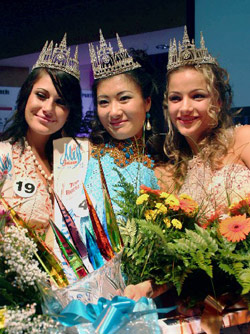 First place winner Bao Qingling (C) from
China, second place winner Kristina Weber (L) from Germany and third place
winner Nila Kudlyk from Ukraine pose for photos during the Miss Deaf World 2007
held in Prague, capital of Czech, July 14, 2007. Nineteen contestants from
nineteen countries took part in the Miss Deaf World 2007 held in Prague. First place winner Bao Qingling (C) from
China, second place winner Kristina Weber (L) from Germany and third place
winner Nila Kudlyk from Ukraine pose for photos during the Miss Deaf World 2007
held in Prague, capital of Czech, July 14, 2007. Nineteen contestants from
nineteen countries took part in the Miss Deaf World 2007 held in Prague.
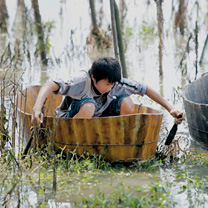 Huang Qi, who lives
in a village in Mengwa flood diversion area in Anhui Province, gets around in a
small wooden boat on July 15, 2007. The area was inundated when water was
released from a reservoir on the Huaihe River. Huang Qi, who lives
in a village in Mengwa flood diversion area in Anhui Province, gets around in a
small wooden boat on July 15, 2007. The area was inundated when water was
released from a reservoir on the Huaihe River.
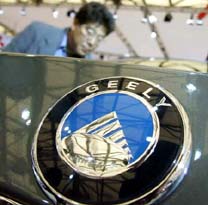 A Geely car is
exhibited at an auto expo in Shanghai April 28. Home-grown auto brands,
encouraged by robust sales, are seeking to expand their overseas presence and
shed their image as low-grade vehicle producers. A Geely car is
exhibited at an auto expo in Shanghai April 28. Home-grown auto brands,
encouraged by robust sales, are seeking to expand their overseas presence and
shed their image as low-grade vehicle producers.
Starting July 15, the Shanghai Municipal Government began
to levy land value-added tax on transactions of second-hand non-ordinary
commodity housing, the Xinhuanet reported Sunday. According to a notice issued
on July 13 by the city's taxation bureau, value-added tax is currently imposed
on non-ordinary houses transferred individually without assessed prices or
invoices. A tax of 0.5 percent of the net gains from property deals will be
levied on owners who have retained their property for less than three years. A
50-percent exemption is available if an apartment is kept for more than three
years but less than five years before the transaction, according to the notice.
According to the municipal government's rule, ordinary commodity housing refers
to houses up to the following criteria: The floor-area ratio is above 1.0; the
total floor space per suite is no larger than 140 square meters; the selling
price is less than 17,500 yuan(US$2303) per square meter if the property is
located within the Inner Ring Road of Shanghai, less than 10,000 yuan per square
meter between the Inner Ring Road and the Outer Ring Road, or less than 7,000
yuan per square meter outside the Outer Ring Road. Those homes which cannot meet
the above requirements are categorized as non-regular housing. From now on, the
total amount of tax levied on the transaction of non-ordinary second-hand houses
theoretically can reach as high as 9.55 percent of the transaction price. That
includes the business tax (5.55 percent), deed tax (1.5 percent), individual
income tax (2 percent), land value-added tax (0.5 percent), as well as stamp tax
and service fees.
Although China has an overall foreign trade surplus, it
had a deficit of $87.5 billion in 2006 with East Asian countries, said Liao
Xiaoqi, vice minister of commerce, on Saturday. Liao said at the 3rd East Asia
Investment Forum that economic and trade exchanges between China and East Asian
countries have been growing very fast, with the combined trade volume reaching
$502.4 billion in 2006, accounting for 32.5 percent of China's foreign trade for
the year. He said that China mainly imports raw materials and parts from East
Asia, and exports the processed or assembled products to European and American
markets. China has become the largest export market for the Republic of Korea,
the no. 2 export market for Japan, the no. 3 export market for Thailand, and the
no. 4 export market for Indonesia, Singapore, the Philippines and Malaysia.
"China's development has brought about growth opportunities for East Asian
countries," he said. He said that China pays close attention to regional
economic cooperation, has signed a number of agreements with the Association of
South East Asian Nations (ASEAN), and will set up free trade zone with ASEAN in
2010. A total of 11 free trade zones have so far been set up or are being
negotiated with foreign partners, he said, involving 28 countries and regions
and accounting for a quarter of China's foreign trade. More than 300 officials,
scholars and entrepreneurs from China, Japan, ROK and ASEAN are participating in
the 3rd East Asia Investment Forum, which focuses on overseas development
strategies for Chinese enterprises.
Kingdom Hotel Investments, the
luxury hotel and resort investment company controlled by Saudi billionaire
Prince Alwaleed bin Talal, plans to develop a network of 10 to 15 hotels in
second and third-tier cities in the mainland over the next three to five years
as part of a strategy to beef up its presence in high- growth Asian markets.
China CITIC Bank (0998), the
China's seventh-largest lender, said yesterday first-half profit is projected to
rise 80 percent, underpinned by higher lending and fee income.
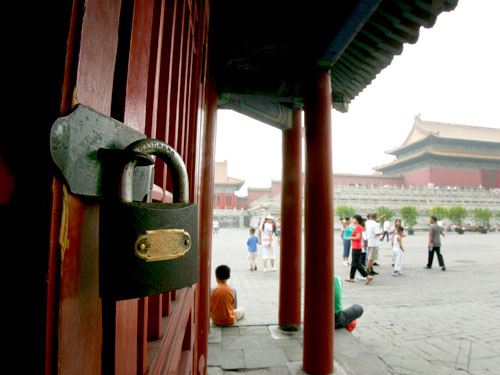 A top Starbucks executive put on a brave face yesterday, saying the group was
trying to do the right thing by closing its controversial coffee shop in
Beijing's Forbidden City. Managers of the former imperial palace wanted all
shops on its grounds to adopt its brand identity, but Eden Woon Yi-teng,
Starbucks' vice-president for China, said the company had declined that option.
"It was a very congenial decision. We respect what they are doing," he said.
Starbucks closed the 20 square metre coffee shop on Friday, ending a seven-year
presence that sparked protests by critics who said it stained the image of a key
historical site. The froth over Starbucks' presence at the 587-year-old
Forbidden City highlighted sensitivity about cultural symbols and unease over an
influx of foreign pop culture.
A top Starbucks executive put on a brave face yesterday, saying the group was
trying to do the right thing by closing its controversial coffee shop in
Beijing's Forbidden City. Managers of the former imperial palace wanted all
shops on its grounds to adopt its brand identity, but Eden Woon Yi-teng,
Starbucks' vice-president for China, said the company had declined that option.
"It was a very congenial decision. We respect what they are doing," he said.
Starbucks closed the 20 square metre coffee shop on Friday, ending a seven-year
presence that sparked protests by critics who said it stained the image of a key
historical site. The froth over Starbucks' presence at the 587-year-old
Forbidden City highlighted sensitivity about cultural symbols and unease over an
influx of foreign pop culture.
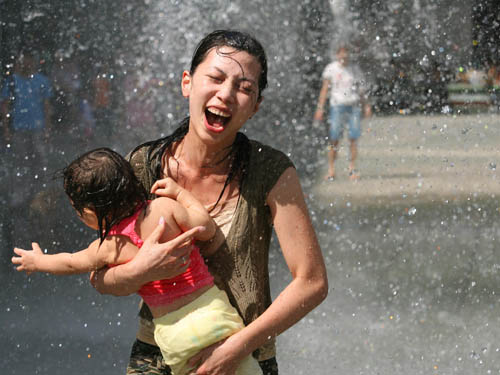 A young mother cools off with her baby yesterday at a
fountain at Citygate, Tung Chung. The Observatory said the mercury reached 34.1
degrees during the afternoon. Temporary heat shelters were opened last night. At
least 65 elderly people fell sick because of the heat and had to be taken to
hospital.
A young mother cools off with her baby yesterday at a
fountain at Citygate, Tung Chung. The Observatory said the mercury reached 34.1
degrees during the afternoon. Temporary heat shelters were opened last night. At
least 65 elderly people fell sick because of the heat and had to be taken to
hospital.
July 16, 2007
 Hong Kong:
The government announced
on Friday that a HK$58.6 billion surplus was registered for the last fiscal
year. Revenue for the 2006-07 financial year ending March 31 amounted to HK$288
billion and expenditure amounted to HK$229.4 billion, a spokesman said. This
resulted in a surplus of HK$58.6 billion, higher than the estimated HK$55.1
billion in the 2007-08 Budget. The territory’s fiscal reserves stood at HK$369.3
billion as at March 31, compared with HK$310.7 billion a year ago. The spokesman
explained that the improved financial position was mainly because the actual
spending for the year was HK$3.6 billion lower than forecast as a result of
expenditure controls. He said the final results for the year were same as the
provisional results published on April 30. Hong Kong registered a deficit
earlier in the decade. It has now returned to surplus on the back of a strong
economic growth. Hong Kong:
The government announced
on Friday that a HK$58.6 billion surplus was registered for the last fiscal
year. Revenue for the 2006-07 financial year ending March 31 amounted to HK$288
billion and expenditure amounted to HK$229.4 billion, a spokesman said. This
resulted in a surplus of HK$58.6 billion, higher than the estimated HK$55.1
billion in the 2007-08 Budget. The territory’s fiscal reserves stood at HK$369.3
billion as at March 31, compared with HK$310.7 billion a year ago. The spokesman
explained that the improved financial position was mainly because the actual
spending for the year was HK$3.6 billion lower than forecast as a result of
expenditure controls. He said the final results for the year were same as the
provisional results published on April 30. Hong Kong registered a deficit
earlier in the decade. It has now returned to surplus on the back of a strong
economic growth.
China Automation Group (0569) made
a huge splash on its trading debut Thursday, with its shares soaring 74 percent
over their initial public offering price, outshining New World Department Store
China (0825).
Four companies from Hong Kong and the mainland joined the
2007 edition of the Fortune Global 500 list, which ranks the world's largest
corporations. Sinopec (0386) and CNPC ranked as the largest Greater China
companies on the annual list. Newcomers to the list were China Minmetals, CNOOC
(0883) and China Ocean Shipping, with Jardine Matheson returning to the list
after a period of absence. More companies from China than any other country
joined the list this year. Sinopec was the top-ranked company from Hong Kong and
China, with its US$131.64 billion (HK$1.03 trillion) in revenues ranking it 17
on the global list. This year marked the first time a Chinese company breached
the top 20. The oil company was followed by CNPC, ranked 24 with US$110.52
billion in revenues, and Beijing-based State Grid, the largest electric power
provider in China, which ranked 29 with US$107.19 billion in revenues. Also
making the high-powered list are ICBC (1398), China Mobile Communications
Corporation, China Life (2628), Bank of China (3988), China Construction Bank
(0939), Guangzhou-based China Southern Power Grid and China Telecommunications.
A total 24 companies from Hong Kong and China made the Global 500 list. "Chinese
banks, led by Industrial and Commercial Bank of China [ranked 170], which
boasted the world's largest public offering in 2006, made a big splash," Fortune
magazine said. "The Agricultural Bank of China [ranked 277] saw its profits go
up nearly fivefold as it cleaned up its balance sheet in preparation for a
public listing." State Grid is the second-biggest employer in the world,
according to Fortune data. With a workforce of 1.504 million, it is second only
to Wal-Mart, which employs 1.9 million people. CNPC ranks as the third-largest
employer, with 1.086 million employees. Several mainland companies on the list
showed strong improvements from the previous year. China Railway Construction
climbed 101 spots to end up at 384, while Agricultural Bank of China climbed 100
spots to 277 and China Railway Engineering climbed 99 spots to 342. China State
Construction, Changchun-based automaker China FAW Group and SAIC also climbed
significantly. According to the Fortune data, Beijing is the fifth-most popular
place in the world for a Global 500 company to have a headquarters. Eighteen
companies on the Global 500 list are based in Beijing, with the capital trailing
Tokyo, Paris, New York and London. Wal-Mart was the largest company on the
Global 500 list, followed by oil giants ExxonMobil, Royal Dutch Shell and BP.
Although most regulators use an indirect approach of
regulating counterparties to rein in hedge funds, most hedge funds are not
transparent enough to allow market discipline to work, according to the Hong
Kong Monetary Authority. "With management fees tied to performance, hedge fund
managers are more inclined to take risks than to abide by market discipline,"
HKMA chief executive Joseph Yam Chi-kwong said in his weekly column Thursday.
"It is also unclear to me whether the current level of transparency in most
hedge funds can really provide sufficient, accurate and timely information for
market discipline to work effectively." Since hedge funds often do not directly
fall under regulatory scrutiny, most regulators address the systemic risks to
financial markets brought by hedge funds by regulating the hedge funds'
counterparties, such as banks and securities firms they deal with. The success
of the approach depends on market discipline and how well the regulated
institutions manage their counterparty risks, Yam noted. "There are good reasons
to doubt the regulated counterparties' ability to impose market discipline on
hedge funds, especially when hedge funds have become an important source of
their revenue," Yam said. "Fierce competition for prime brokerage business is
likely to put pressure on these institutions to compromise, eventually leading
to a relaxation of risk management." The opaqueness of hedge funds can prevent
regulators and the banks that do business with them from detecting concentrated
risks early enough. This fear came to the fore recently when failed US hedge
fund Amaranth Advisors built up highly concentrated positions in the energy
futures markets without other market participants knowing. "Despite all the
inadequacies of the indirect oversight approach, it is in the interest of all
concerned to give it our best shot," he said. "To make this approach more
effective will require hedge funds to be more cooperative in improving their
transparency and following the best codes of conduct and disclosure."
Those hoping to set up professional services in the
mainland should have an enterprising mind-set and a reinvestment approach,
according to Executive Council convener Leung Chun-ying. Speaking at a Hong Kong
Convention and Exhibition Centre forum hosted by 10 local professional bodies
Thursday, Leung said that, with the opening of mainland markets and removal of
service industry trade barriers, companies in the SAR and in the mainland face
fierce competition from giant conglomerates. "The survival of local and mainland
professional companies no longer lies in having basic professional knowledge. We
must also equip ourselves with an enterprising outlook, inspiration, strategies
and fortitude," Leung said. Calling for vigilance in the face of the immense
challenge from multinational services giants, Leung encouraged local
professional firms to enter into various kinds of collaboration or mergers for
their survival. He called this a "historical and strategic subject worth
exploring by the governments of Hong Kong and the mainland, professional bodies
and the various professions themselves." Entrepreneurs should also adopt the old
maxim of investing in profit-making projects rather than just finding jobs for
the work force. "The peaceful rise of China is a historic opportunity," he said.
"Local and mainland professional firms should ride on the rising tide and be
brave and adventurous in facing the future." To iron out cultural differences
and narrow diverging targets between local and mainland professional firms,
Leung - who is executive director of a UK- listed real estate company with a
dozen mainland regional branch offices - called for building a business culture
of reinvesting bonuses and profits into the prime business rather than diverting
funds into secondary businesses such as restaurants and buying properties, or
executive perks. "As for collaboration modes, I suggest taking an innovative
approach as much as possible," Leung said. "The previous mode of business
transferrals between Hong Kong and mainland service companies has achieved
substantive progress. "More recently, there has been a new direction, with some
law firms in the mainland and the territory entering into joint ventures."
Financial Secretary John Tsang Chun-wah said a forum would be held in September
to strengthen the implementation of CEPA and its supplements. Senior mainland
officials will be among the guest speakers.
Two new spots, improved information signage and distinct
balustrades have been introduced in a HK$4 (US$520,000) million facelift for the
Dr Sun Yat-sen Historical Trail to lure more tourists and locals alike to follow
the footsteps of the "Father of the Nation." The 3.3-kilometer trail in Central
and Western District, where Sun studied during his stay in Hong Kong at the turn
of the last century, was set up 11 years ago to present an historical account of
the revolutionary's activities in the territory. It now has 15 historical spots
tracing his activities in Hong Kong - from his dwelling to his school and where
he planned the first uprising against the Qing dynasty in 1911. Two plaques have
been added at Hong Kong University where Sun studied medicine, and at Pak Tsz
Lane, where a political concern group frequented by the young Sun was located.
The HK$4 million upgrade was launched to complement the opening of the new Dr
Sun Yat-sen Museum late last year at Kom Tom Hall - a heritage mansion in the
Mid-Levels. Stephen Chan Chit-kwai, a member of the Central and West District
Council, said many people have trekked the trail since 1996, but many were
disappointed that several of the historical sites have now vanished. Brand-new
ceramic plaques with easy-to-read information and old pictures from Sun's days
were added. Museum curator Ang Yee said that with the addition of red railings
along the trail, it is now much easier to follow than in the past. Also, new
guided tours have been planned to strengthen the links between the trail and the
museum at Kom Tong Hall, where the government has spent HK$91 million on
renovation works. Tourists can join the English and Putonghua guided tours first
at the museum before following the trail. More than 500 people have joined these
tours since early this year. The entire 15-spot tour takes about two hours,
while a condensed version concentrating on Sun's "path of growth" will take only
45 minutes. One featured spot is the former location of the Xing Zong Hui
(Revive China Society). It was a commercial firm on Staunton Street, which Sun
used as a front to plot his first revolutionary attempt in Guangzhou. Now, the
premises has been turned into a Buddhist nunnery. More than 20 black and white
photos of Hong Kong during Sun's time line the wall facing the old revolutionary
headquarters. Looming behind are the former police quarters on Hollywood Road,
which are facing demolition. Apart from three plaques, the rest of the
historical spots are at their original locations.
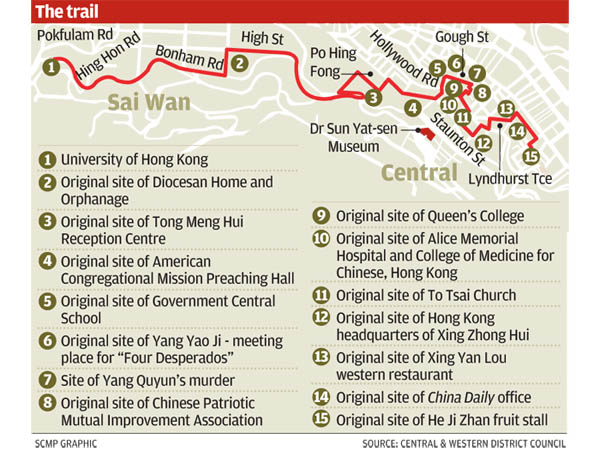 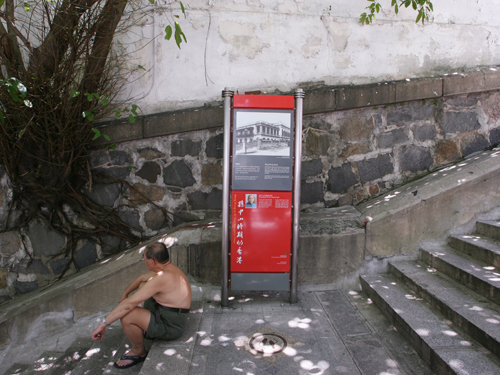 Sun Yat-sen trail reopens with high hopes for tourism -
After a year of work mostly funded by the Tourism Commission, the 3.3km Sun
Yat-sen Historical Trail through Central and Western District has been
renovated. The HK$4 (US$520,000) million renovation began last year to
commemorate the 140th anniversary of the birth of Sun, the revolutionary leader
revered as the father of modern China who died in 1925. It includes the
relocation of three memorial plaques in Gough, Staunton and D'Aguilar streets,
and the addition of two new ones to make the trail more accessible to visitors.
A new plaque at the entrance to the University of Hong Kong in Bonham Road
recalls how Sun, an HKU alumnus, declared that "Hong Kong and the University of
Hong Kong are my intellectual birthplace" when he visited the university in
February 1923. Another, at Pak Tsz Lane, marks the place where the Chinese
Patriotic Mutual Improvement Association was founded in 1892 to discuss
political reforms in China. Twenty new pictures of old streets have also been
put up along Staunton Street to show visitors how the city looked in days gone
by. The trail, built in November 1996, recounts Sun's education and his
religious and political activities during his nine years in Hong Kong. It begins
at HKU's Loke Yew Hall and passes 13 historical sites with 15 information
plaques before ending at D'Aguilar Street. Despite its historical significance,
the trail has been little used. In the past six months, only 100 local residents
and foreign tourists have joined guided tours. But Central and Western District
Council chairman Stephen Chan Chit-kwai said yesterday at the trail's official
relaunch that its actual attendance rate had been underestimated. "We think
there are, in fact, more members of the public or tourists who have walked along
this trail," he said. "We cannot keep track of the exact number if they do not
join our guided tours." He added that the low level of participation may be due
to a lack of publicity and predicted that better promotion would triple or
quadruple the number of people on the tours. "Now, members of the public and
tourists who visit Dr Sun's museum in groups can find the tour service for the
trail on [a form they are given]. It makes access easier for them," Mr Chan
said. "Moreover, this year we have launched a joint promotion with the Tourism
Commission, in which the commission will provide a tour service for tourists to
visit both Dr Sun's museum and the trail."
Sun Yat-sen trail reopens with high hopes for tourism -
After a year of work mostly funded by the Tourism Commission, the 3.3km Sun
Yat-sen Historical Trail through Central and Western District has been
renovated. The HK$4 (US$520,000) million renovation began last year to
commemorate the 140th anniversary of the birth of Sun, the revolutionary leader
revered as the father of modern China who died in 1925. It includes the
relocation of three memorial plaques in Gough, Staunton and D'Aguilar streets,
and the addition of two new ones to make the trail more accessible to visitors.
A new plaque at the entrance to the University of Hong Kong in Bonham Road
recalls how Sun, an HKU alumnus, declared that "Hong Kong and the University of
Hong Kong are my intellectual birthplace" when he visited the university in
February 1923. Another, at Pak Tsz Lane, marks the place where the Chinese
Patriotic Mutual Improvement Association was founded in 1892 to discuss
political reforms in China. Twenty new pictures of old streets have also been
put up along Staunton Street to show visitors how the city looked in days gone
by. The trail, built in November 1996, recounts Sun's education and his
religious and political activities during his nine years in Hong Kong. It begins
at HKU's Loke Yew Hall and passes 13 historical sites with 15 information
plaques before ending at D'Aguilar Street. Despite its historical significance,
the trail has been little used. In the past six months, only 100 local residents
and foreign tourists have joined guided tours. But Central and Western District
Council chairman Stephen Chan Chit-kwai said yesterday at the trail's official
relaunch that its actual attendance rate had been underestimated. "We think
there are, in fact, more members of the public or tourists who have walked along
this trail," he said. "We cannot keep track of the exact number if they do not
join our guided tours." He added that the low level of participation may be due
to a lack of publicity and predicted that better promotion would triple or
quadruple the number of people on the tours. "Now, members of the public and
tourists who visit Dr Sun's museum in groups can find the tour service for the
trail on [a form they are given]. It makes access easier for them," Mr Chan
said. "Moreover, this year we have launched a joint promotion with the Tourism
Commission, in which the commission will provide a tour service for tourists to
visit both Dr Sun's museum and the trail."
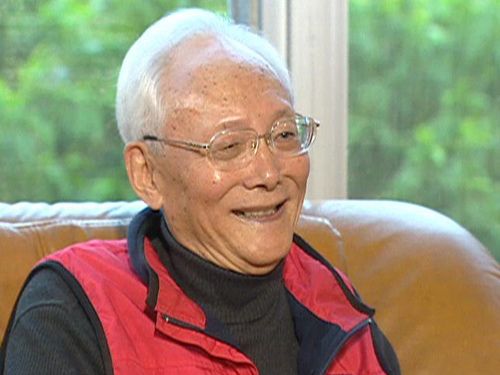 Lu Ping, a retired
mainland official formerly in charge of Hong Kong affairs, appears to have
reversed his harsh verdict on last governor Chris Patten, whom he once called "a
sinner for a thousand years". Mr Lu, speaking on Phoenix Television, praises
Lord Patten as a brilliant and resolute politician. The former director of the
Hong Kong and Macau Office under the State Council also says he appreciates that
Lord Patten's strong approach towards Chinese affairs was because of a change in
British policy, rather than his personal will. Without referring to the
Tiananmen Square crackdown, he says the U-turn in Britain's China policy came
after 1989. "After 1989, Britain's China policy changed from one of co-operative
to one of confrontation," Mr Lu says, citing the lingering row over the
construction of the Chek Lap Kok airport and other related infrastructure
projects. Hong Kong was hit by a confidence crisis after the Tiananmen Square
crackdown. The colonial government decided to boost the economy by investing in
mega-infrastructure projects, including building the Chek Lap Kok international
airport. Beijing at that time had opposed the idea, fearing Hong Kong would
drain its fiscal reserves. The airport project was eventually given approval
after years of discussions between Britain and the mainland. In the television
interview to be broadcast tomorrow, Mr Lu also says part of the problem with the
governance of former chief executive Tung Chee-hwa, Hong Kong's first
post-handover leader, was that he was not good at playing politics. "Mr Tung is
a righteous man. He is a responsible man and he wants to do something for Hong
Kong," Mr Lu says. "But he is not a politician. I have always said, this nice
guy is not good at politics." He says Mr Tung's victory in the 1996 chief
executive election was "a fulfilment of the people's hope", adding that Beijing
had not intervened with the election. Lu Ping, a retired
mainland official formerly in charge of Hong Kong affairs, appears to have
reversed his harsh verdict on last governor Chris Patten, whom he once called "a
sinner for a thousand years". Mr Lu, speaking on Phoenix Television, praises
Lord Patten as a brilliant and resolute politician. The former director of the
Hong Kong and Macau Office under the State Council also says he appreciates that
Lord Patten's strong approach towards Chinese affairs was because of a change in
British policy, rather than his personal will. Without referring to the
Tiananmen Square crackdown, he says the U-turn in Britain's China policy came
after 1989. "After 1989, Britain's China policy changed from one of co-operative
to one of confrontation," Mr Lu says, citing the lingering row over the
construction of the Chek Lap Kok airport and other related infrastructure
projects. Hong Kong was hit by a confidence crisis after the Tiananmen Square
crackdown. The colonial government decided to boost the economy by investing in
mega-infrastructure projects, including building the Chek Lap Kok international
airport. Beijing at that time had opposed the idea, fearing Hong Kong would
drain its fiscal reserves. The airport project was eventually given approval
after years of discussions between Britain and the mainland. In the television
interview to be broadcast tomorrow, Mr Lu also says part of the problem with the
governance of former chief executive Tung Chee-hwa, Hong Kong's first
post-handover leader, was that he was not good at playing politics. "Mr Tung is
a righteous man. He is a responsible man and he wants to do something for Hong
Kong," Mr Lu says. "But he is not a politician. I have always said, this nice
guy is not good at politics." He says Mr Tung's victory in the 1996 chief
executive election was "a fulfilment of the people's hope", adding that Beijing
had not intervened with the election.
Lawmakers have passed a motion urging the government to
improve co-operation with the mainland - especially on issues such as the
environment, air quality, food safety and immigration. The motion calls on the
government to set up permanent and efficient cross-border mechanisms to achieve
these aims. The proposal tabled by Beijing loyalist Tsang Yok-sing was amended
by the Civic Party's Audrey Eu Yuet-mee to address specific issues. But efforts
by pan-democrats to add a call for the issuing of home-return permits to those
denied them, and to urge the central government to develop democracy and the
rule of law were defeated. The Frontier's Emily Lau Wai-hing proposed an
amendment calling on Beijing to issue the home-return permits, and to establish
a "normal working relationship" with the legislature and Hong Kong political
parties. "At present, our council does not have any communication with the
mainland, and even mainland officials coming to Hong Kong wouldn't set foot in
Legco," she said. In response, Secretary for Commerce and Economic Development
Frederick Ma Si-hang said the Hong Kong government was always arranging visits
to the mainland, such as the Security Bureau's trip for legislators to visit the
Western Corridor cross-border route before its opening last week. Moving the
original motion, Mr Tsang, of the Democratic Alliance for the Betterment and
Progress of Hong Kong, said that in the early days of mainland rule following
the handover, some political leaders and Hong Kong officials had seen the "one
country, two systems" formula as threatening intervention by Beijing in the
city's affairs. However, he said the attitude of Hong Kong officials and
residents had changed in the decade since 1997 and cross-border co-operation
should be enhanced.
Fitch Ratings raised its credit rating for Hong Kong to AA
from AA-minus on Friday, praising the territory’s external financial position,
improved public finances, credible currency peg and autonomy from the central
government. Analysts said the move could point to an upgrade in the mainland’s A
sovereign rating soon. “You could also say that the upgrade is linked to rating
agencies becoming more positive about China,” said Jan Lambregts, an economist
at Rabobank International. Hong Kong is a special administrative region of China
and its rating is constrained by China’s lower A rating. Singapore, another
small, developed economy, is rated AAA. Standard & Poor’s already rates Hong
Kong AA and said earlier this year it was well placed for an upgrade if China’s
rating was raised. Moody’s has Hong Kong on review for a possible upgrade from
its Aa3 foreign and local currency government bond rating. The Fitch upgrade
underpinned the local stock market, which had already hit a record high on
Friday morning. “That’s definitely having a positive effect on the market - it’s
the icing on the cake,” said Jackson Wong, an investment manager at Tanrich
Securities. The benchmark Hang Seng Index hit a record 23,239.92 while the
H-share index scaled an all-time high of 13,335.21, fuelled by a record high on
Wall Street and reflecting solid domestic fundamentals. Hong Kong’s resurgent
economy in the past three years has boosted government revenue, returning
government finances to the black after a series of hefty deficits in the years
after the Asian financial crisis from 1997. For the 12 months to March this year
the government had a HK$58.6 billion fiscal surplus. A narrow tax base - only 35
per cent of wage earners pay income tax - still raises concern that government
revenue could fall short again during an economic downturn. However, Fitch said
that even in the extreme scenario of an unexpectedly large fiscal shock, the
government would be able to maintain its low debt ratios through the fiscal year
ending March 2010. Last year the government floated the idea of introducing a
goods and services tax to boost revenue but abandoned the project because of
widespread public opposition. Fitch said this meant the territory needed to
maintain strong fiscal reserves. The economy has expanded by an average 7.6 per
cent annually for the past three years. Economists see growth slowing to 5.5 per
cent this year but they say that would still be strong for a developed economy.
It is benefiting from China, whose economy is growing by more than 10 per cent
annually, creating demand for services in Hong Kong and investment in the stock
market. On Friday Goldman Sachs raised its growth forecast for Hong Kong to 6
per cent for this year and next year from 5.5 per cent and 5.7 per cent
respectively, citing strong consumption underpinned by a buoyant labour market.
The Hong Kong dollar is pegged to the US unit. Market speculation that it could
be allowed to trade more closely with China’s gradually appreciating yuan has
waned this year as officials have repeatedly affirmed the government’s
commitment to keeping the peg. Fitch said that 10 years after Hong Kong’s return
to Chinese rule, there appeared to be no adverse effects so far. The agency said
it initially had concerns about the “one country, two systems” principle after
the transfer of Hong Kong’s sovereignty to China on July 1, 1997. However, it
said the system had yet to be tested by an economic downturn in China. “The
special administrative region’s exposure to the mainland is very high, however,
and any downturn in Chinese trade flows would have significant and immediate
effects on the local economy,” it said.
Chief Executive Donald Tsang Yam-kuen has appointed Anthony Cheung Bing-leung
chairman of the Consumer Council, a government spokesman said on Friday.
 China:
"The trend for Chinese enterprises 'going abroad' has entered a period of rapid
development," said Assistant Minister of Commerce, Chen Jian, said in an online
interview on China's government website (http://www.gov.cn). During the
"eleventh five-year plan" period, China's total investment is expected to reach
US$66 billion. By 2020, the value of foreign investment will reach US$30
billion. To better support Chinese enterprises going abroad, the Ministry of
Commerce implemented measures that would establish overseas trade cooperation
zones by the end of 2005. Supportive policies that cover finance, banking,
insurance, arrival in or departure from a country, and taxes will be executed.
In terms of overseas investment insurance, China Export & Credit Insurance
Corporation (SINOSURE) has set up an overseas investment insurance system. Chen
Jian said that in response to overseas security issues, China has established an
emergency treatment mechanism, led by the Ministry of Foreign Affairs, to handle
overseas emergencies. Furthermore, China will establish an overseas security
services system with a general social plan.
China:
"The trend for Chinese enterprises 'going abroad' has entered a period of rapid
development," said Assistant Minister of Commerce, Chen Jian, said in an online
interview on China's government website (http://www.gov.cn). During the
"eleventh five-year plan" period, China's total investment is expected to reach
US$66 billion. By 2020, the value of foreign investment will reach US$30
billion. To better support Chinese enterprises going abroad, the Ministry of
Commerce implemented measures that would establish overseas trade cooperation
zones by the end of 2005. Supportive policies that cover finance, banking,
insurance, arrival in or departure from a country, and taxes will be executed.
In terms of overseas investment insurance, China Export & Credit Insurance
Corporation (SINOSURE) has set up an overseas investment insurance system. Chen
Jian said that in response to overseas security issues, China has established an
emergency treatment mechanism, led by the Ministry of Foreign Affairs, to handle
overseas emergencies. Furthermore, China will establish an overseas security
services system with a general social plan.
It's exactly the same bottled water
with healthy and energetic-looking pop star Wang Lee-Hom as the endorser. But
the water, under the Wahaha brand name, has hit turbulent times as it is now
part of a bitter dispute over ownership of the well-known brand. French food
giant Groupe Danone SA said yesterday it filed a counterclaim with an arbitrator
in Hangzhou, capital of East China's Zhejiang Province, rejecting statements
made by its Chinese joint venture partner Wahaha Group in a trademark dispute.
Danone's latest legal action comes in response to Wahaha Group's request last
month for arbitration in Hangzhou to seek termination of a 1996 trademark
transfer agreement it signed with joint venture partner Danone. Wahaha alleged
the agreement failed to get approval from China's State trademark office. Danone
and Wahaha have exchanged lawsuits and arbitration claims in three nations in
recent months, with both sides employing teams of lawyers in an increasingly
contentious dispute that has cast a dark cloud over the once-successful
Sino-foreign commercial partnership. "Danone believes the arbitration
application of Wahaha is intended to achieve its ultimate purpose of not
transferring its trademarks by making excuses," Danone legal counsel Randall
Lewis said at a press conference yesterday. He said the actions of Wahaha
violate the 1996 agreement, and deviate from the fundamental principles of good
faith and business ethics. The breach of the joint venture agreement has caused
substantial economic losses to it, he said. Danone said the joint venture paid
50 million yuan in cash to Wahaha for the transfer of the trademark, which was
approved by the Hangzhou government.
The United States Thursday requested
the World Trade Organization (WTO) to establish a dispute settlement panel to
deal with China's so-called industry subsidies. "Although our two rounds of WTO
consultations with China have been constructive, they have not resolved our
concerns about China's apparent use of trade-distorting subsidies that it
pledged to eliminate upon joining the World Trade Organization," said Sean
Spicer, spokesman for the US Trade Representative (USTR). "China has taken a
positive step by repealing one of the subsidy programs we challenged, but much
more needs to be done," he added. The US initiated the dispute over the
prohibited subsidies by requesting WTO consultations with China on February 2,
2007. China's Ministry of Commerce voiced regret on February 3 over the move by
the US side. A spokesman for the ministry said China and the US had actually
kept bilateral contact over the issue all along. Under WTO rules, the
consultation normally lasts two months once it is started. If it fails, a WTO
panel of experts will be formed to handled the dispute. Spicer said Washington
would "continue to prefer a negotiated settlement to this dispute," while
continuing to pursue the WTO process. The WTO Dispute Settlement Body (DSB) will
consider the US request for the establishment of a panel at its next meeting on
July 24, 2007.
China will spend 620 billion yuan (82 billion U.S.
dollars) building subways and urban railways in 15 major cities in the next ten
years to ease traffic jams, according to the Ministry of Construction.
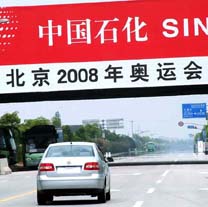 A Sinopec
billboard in Shanghai.Three more mainland companies made them onto the 2007
Fortune Global 500 List, the largest increase among all economies. Sinopec had
the highest ranking among the three. A Sinopec
billboard in Shanghai.Three more mainland companies made them onto the 2007
Fortune Global 500 List, the largest increase among all economies. Sinopec had
the highest ranking among the three.
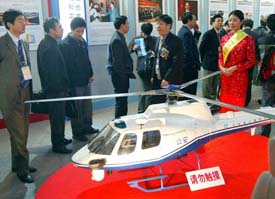 A model of the Zhi-11
helicopter, made by Changhe Aircraft Industries, on display at a Guangzhou
exhibit.
A model of the Zhi-11
helicopter, made by Changhe Aircraft Industries, on display at a Guangzhou
exhibit.
The People’s Bank of China on Friday
said it had issued 101 billion yuan in three-year bills in a special issue at a
yield of 3.6 per cent as the central government ups its battle against excess
liquidity in the system.
July 14 - 15, 2007
 Hong Kong:
Equity markets in Asia
and Europe fell almost across the board Wednesday after Moody's Investors
Service lowered the credit ratings on US$5.2 billion (HK$40.56 billion) worth of
securities backed by US subprime mortgages, just after Standard & Poor's said it
may downgrade US$12 billion of the bonds. Hong Kong:
Equity markets in Asia
and Europe fell almost across the board Wednesday after Moody's Investors
Service lowered the credit ratings on US$5.2 billion (HK$40.56 billion) worth of
securities backed by US subprime mortgages, just after Standard & Poor's said it
may downgrade US$12 billion of the bonds.
The Greater Pearl River Delta
Business Council has called on the central government to provide clear guidance
and lenient arrangements for Hong Kong enterprises in the mainland to convert
into foreign-invested enterprises from enterprises "processing with supplied
materials."
The MTR Corporation (SEHK: 0066) is to extend its Kwun
Tong line from Yau Ma Tei past Ho Man Tin to Whampoa under revised proposals for
the new Sha Tin to Central Link project. The location of a Central South station
planned beneath Lan Kwai Fong may also be changed, a paper prepared by the
Transport and Housing Bureau for the Legislative Council shows. The amendments
were made following a decision by the MTR Corp and the Kowloon-Canton Railway
Corporation. The KCRC, which was selected to build and operate a railway line
linking Sha Tin to Central in June 2002, put forward planning proposals in
February 2004. The rail companies both put forth new proposals under which the
KCRC and MTR Corp's interchange stations will be provided at Diamond Hill, Ho
Man Tin, Exhibition and Admiralty. The paper also shows a proposed Causeway Bay
North station will be scrapped "in view of the possible serious disruption to
traffic in the Causeway Bay area arising from the construction of the station
and the low cost-effectiveness of providing the station under the merge
scenario". It also says "the location of the Central South station should be
revisited" although the reasons for this are not apparent in the paper. The
proposed Exhibition interchange station on Harbour Road will also be relocated
to the public transport interchange site in Wan Chai "to better cope with
development in the area and provide better interchange with the future North
Hong Kong Island Line". Under the original KCRC proposal, automated people
movers were proposed for Whampoa and Tsz Wan Shan to link the areas with the MTR
line. But this idea will be scrapped, at least for Whampoa, which will be
serviced by an extended Kwun Tong line. While the paper does not state clearly
that the Tsz Wan Shan people mover will be scrapped, it says "it is suggested
that alternative options should be explored, taking into account the existing
public transport services". This could come as bad news to residents who have
been calling for an MTR extension to the area for years. The whole scheme will
see an east-west line and a north-south line and a further 10 stations, from Tai
Wai via Ho Man Tin to Central. But further changes are in the pipeline, as the
original population projection for the Kai Tak planning area was 260,000, but
has now dropped to 80,000. This could affect the viability of both the To Kwa
Wan and Ma Tau Wai stations. The government is also still in discussion with the
rail companies over the Wan Chai Development Phase II Review, which could see
further changes to the proposals for the rail line. In 2003, the rail project -
estimated to cost HK$33 billion - was awarded to the KCRC after a bitter battle
with the MTR Corp. At the time, the MTR Corp warned that the Sha Tin to Central
rail link would threaten its market share of cross-harbour services and poach
its passengers.
 China:
The country's top food and drug quality watchdog yesterday announced stricter
rules for approving new medicines. The move came a day after its former chief
Zheng Xiaoyu, who headed the State Food and Drug Administration (SFDA) from 1998
to 2005, was executed after being found guilty of taking bribes to approve
substandard and fake medicines blamed for at least 10 deaths. Effective October
1, the regulation aims to make the drug registration and approval process
transparent, and curb power abuse and corruption, Wu Zhen, deputy chief of the
SFDA, told a news briefing: A collective decision - instead of a single person
or department as was the previous practice - has to be made by a special panel
before the green light is given to a new drug.
China:
The country's top food and drug quality watchdog yesterday announced stricter
rules for approving new medicines. The move came a day after its former chief
Zheng Xiaoyu, who headed the State Food and Drug Administration (SFDA) from 1998
to 2005, was executed after being found guilty of taking bribes to approve
substandard and fake medicines blamed for at least 10 deaths. Effective October
1, the regulation aims to make the drug registration and approval process
transparent, and curb power abuse and corruption, Wu Zhen, deputy chief of the
SFDA, told a news briefing: A collective decision - instead of a single person
or department as was the previous practice - has to be made by a special panel
before the green light is given to a new drug.
China's foreign exchange reserves
increased by $40 billion in June, pushing the total figure to $1.33 trillion,
the central bank said yesterday. It was a 41.6 percent increase year-on-year,
the People's Bank of China said in a statement on its website. The rise could
mainly be a result of capital influx in anticipation of a rising yuan and the
strong growth in foreign trade surplus, said Zhao Xijun, a finance professor at
Renmin University of China.
Chinese aircraft manufacturers
played an important role in the production of the Boeing 787 "Dreamliner". The
first "Dreamliner" aircraft's rudders, fuselage fairing and leading edge of the
vertical tail, were all made in China. At the end of last year, the Harbin
Aircraft Industrial (Group) Company, the HaFei Group, was officially recognized
as the world's sole supplier for Boeing 787 fuselage fairing; and it will take
the responsibility of supplying these products from 2007 to 2021. On February
2nd of this year, HaFei's first Boeing 787 fuselage fairing was delivered to the
Boeing Company. Boeing has also signed a production contract for Boeing 787
composite material rudders, 737 aircraft front boarding gates, and automatic
emergency exits on aircraft wings, with the Chengdu Aircraft Industrial (Group)
Co.LTD.(CAC), of China's Aviation Industry Corporation I (AVIC I). At the end of
last month, the world's first Boeing 787 aircraft rudder was completed by the
CAC and was delivered to the American Boeing company. This rudder is now the
largest civilian aircraft composite material part produced by China. It is 10.7
meters long and 3 meters wide. In addition to China, many other countries
including Japan and Canada are involved in the manufacture of the Boeing 787.
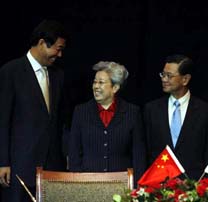 Singapore can expect to conclude a free trade agreement
with China by next year, a Singaporean said after meeting China's Vice Premier
Wu Yi. Commerce Minister Bo Xilai (left),
Vice-Premier Wu Yi (center) and Singapore's Vice-Premier Wong Kan Seng were at a
meeting in Singapore yesterday. China and Singapore have agreed to strengthen
cooperation in several areas.
Singapore can expect to conclude a free trade agreement
with China by next year, a Singaporean said after meeting China's Vice Premier
Wu Yi. Commerce Minister Bo Xilai (left),
Vice-Premier Wu Yi (center) and Singapore's Vice-Premier Wong Kan Seng were at a
meeting in Singapore yesterday. China and Singapore have agreed to strengthen
cooperation in several areas.
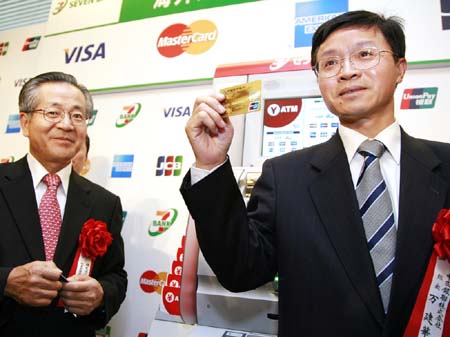 Wan Jianhua (right), president of UnionPay, China's national
bankcard network operator, and Japan's Seven Bank President Takashi Anzai launch
the international cash card compatibility service at Seven Bank's ATMs in Tokyo
yesterday. Foreign cash card users of Visa, MasterCard, American Express, JCB
and UnionPay can now withdraw Japanese yen at Seven Bank ATMs.
Wan Jianhua (right), president of UnionPay, China's national
bankcard network operator, and Japan's Seven Bank President Takashi Anzai launch
the international cash card compatibility service at Seven Bank's ATMs in Tokyo
yesterday. Foreign cash card users of Visa, MasterCard, American Express, JCB
and UnionPay can now withdraw Japanese yen at Seven Bank ATMs.
July 13, 2007
 Hong Kong:
Qingdao, a coastal city
in Shandong province, has emerged as a new target for Hong Kong developers as
they increasingly shift their attention towards second-tier cities given the
surging land prices and lack of urban sites in first-tier cities. Hutchison
Whampoa (SEHK: 0013), Kerry Properties (SEHK: 0683), Hong Kong Construction and
Shui On Group had already built up a presence in the city, said Joe Zou, general
manager of property adviser DTZ's Qingdao office. They first entered the city in
2005, two years after property prices began picking up, Mr Zou said. Compared
with other cities, Qingdao has yet to find great popularity with Hong Kong
developers. However, he expected more foreign players to target the city after
looking at its growing economy. Qingdao and other cities near the Bohai Sea aim
to develop the region as the mainland's third-biggest economic powerhouse, after
the Pearl and Yangtze river deltas. The region also consists of Beijing, Tianjin
in Hebei province and Dalian in Liaoning province. The gross domestic product of
Qingdao, a municipality that covers seven districts with 2.5 million people,
grew 15 per cent last year. Property prices have been rising since 2003, with
average home prices of 4,225 yuan per square metre last year, up 17.23 per cent
from 2005. But prices of luxury flats with sea views were being sold at more
than 30,000 yuan per square metre, Mr Zou said. Most of the buyers were from
nearby cities, he said. Hong Kong:
Qingdao, a coastal city
in Shandong province, has emerged as a new target for Hong Kong developers as
they increasingly shift their attention towards second-tier cities given the
surging land prices and lack of urban sites in first-tier cities. Hutchison
Whampoa (SEHK: 0013), Kerry Properties (SEHK: 0683), Hong Kong Construction and
Shui On Group had already built up a presence in the city, said Joe Zou, general
manager of property adviser DTZ's Qingdao office. They first entered the city in
2005, two years after property prices began picking up, Mr Zou said. Compared
with other cities, Qingdao has yet to find great popularity with Hong Kong
developers. However, he expected more foreign players to target the city after
looking at its growing economy. Qingdao and other cities near the Bohai Sea aim
to develop the region as the mainland's third-biggest economic powerhouse, after
the Pearl and Yangtze river deltas. The region also consists of Beijing, Tianjin
in Hebei province and Dalian in Liaoning province. The gross domestic product of
Qingdao, a municipality that covers seven districts with 2.5 million people,
grew 15 per cent last year. Property prices have been rising since 2003, with
average home prices of 4,225 yuan per square metre last year, up 17.23 per cent
from 2005. But prices of luxury flats with sea views were being sold at more
than 30,000 yuan per square metre, Mr Zou said. Most of the buyers were from
nearby cities, he said.
Shenzhen has put into
effect strict regulations on home ownership by Hong Kong residents and
foreigners in a bid to cool the market, where average prices have surged by more
than 50 percent this year.
 A model presents a creation by
Malaysian designer Bernard Foong during the Hong Kong Fashion Week for
Spring/Summer 2008, July 10, 2007. This show has attracted a record 1,147
exhibitors from 19 countries and regions, said the Hong Kong Trade Development
Council.
A model presents a creation by
Malaysian designer Bernard Foong during the Hong Kong Fashion Week for
Spring/Summer 2008, July 10, 2007. This show has attracted a record 1,147
exhibitors from 19 countries and regions, said the Hong Kong Trade Development
Council.
The
soon-to-be-established China Investment Co, which has been tasked with investing
abroad US$200 billion (HK$1.56 trillion) of China's foreign exchange reserves,
is likely to pour at least US$2.2 billion into Hong Kong's stock market,
according to Citigroup Global Markets.
HKC
(Holdings) (0190), formerly Hong Kong Construction, said it plans to buy a block
of land at the Tianjin Tuanbo Lake project for more than 1billion yuan (HK$1.02
billion) to develop a villa project.
Real estate
consultant Jones Lang LaSalle forecasts that by the end of the year prices in
the luxury residential market will be on a par with 1997 levels, while growth in
the low to mid-tier market will be limited by abundant supply.
Film veteran
Charles Wang Cheung-tze died from cancer in a New York City hospital last
Friday. He was 74. Wang was awarded the Medal of Honour earlier this month for
his valuable contribution to the development of the film and TV industry in Hong
Kong. He received the Professional Achievement Award at the 25th Hong Kong Film
Award in April 2006 as managing director of Salon Films. Over the past four
decades, Wang had provided extensive production logistics to filmmakers from
home and abroad. A memorial service will be held on Sunday afternoon at the
College Chapel of Wang's alma mater, Chung Chi College of the Chinese University
of Hong Kong, in Sha Tin.
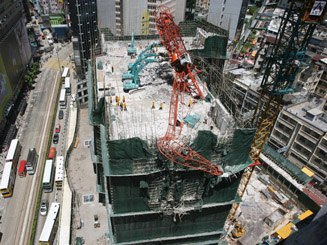 Lack of
precautionary measures and negligence were cited as possible causes for the
collapse of a crane in Causeway Bay yesterday that killed two people and injured
five.
Lack of
precautionary measures and negligence were cited as possible causes for the
collapse of a crane in Causeway Bay yesterday that killed two people and injured
five.
CIA agents saw Hong Kong as window
on Communist Party - CIA agents worked to infiltrate groups in Hong Kong with
connections to the Communist Party, documents released in the US yesterday
reveal. Under the Chaos Program, agents from the Central Intelligence Agency,
FBI and civilians with "extremist credentials" were cultivated and dispatched to
gather intelligence from overseas communist groups. China, Cuba, North Vietnam,
the Soviet Union, North Korea and Arab nations under the Fedayeen were targeted
by the program. The aim was to collect information to link foreign communist
powers to US activists and civilians. Hong Kong is named in the document as an
area of "important operational interest" along with Paris, Stockholm, Algiers,
Dar es Salaam and Mexico. The document dubbed "The Family Jewels" also mentions
the CIA's East Asia division, which was responsible for the "placing of agents
in leftist milieu", suggesting they recruited locals to act as spies. The CIA
describes the Chaos Program's purpose as being to gather information about
extremist groups working in the US at a time when Washington believed many
activists were being influenced by outside powers. Rather than recruiting new
members, the document said efforts were made to use existing contacts. The
report said the program had played an "integral part of collection programs in
China operations". The report on the program is dated May 1973. Audio
surveillance was also conducted on some groups. The information was considered
highly sensitive. Once collected, it bypassed normal channels and was processed
by the Special Operations Group. "Information of particular significance, when
collected, has been disseminated by special memorandum over the signature of the
Director of Central Intelligence to the White House (John Dean and Dr Kissinger)
as well as Attorney General, Secretary of State and Director of the FBI," the
memorandum said. Former deputy to the National People's Congress Choi Wai-hang
said he was not surprised by the revelations. Most people would have assumed US
spies were active in Hong Kong in the 1960s and 1970s, he said. "This [spying]
was quite common at the time. They were trying to get information from
everywhere," said Mr Choi, who was detained for 18 months at Mount Davies camp
in Western during the 1967 riots. The Family Jewels also provides new details
about how the CIA illegally spied on US citizens and tracked down an expert lock
picker for a Watergate conspirator. It also detailed CIA collaboration with the
Mafia for a failed assassination attempt on Cuban President Fidel Castro.
 China:
China said Wednesday it will cut the number of small, loosely regulated food
producers by half as it struggles to salvage its reputation as a safe exporter.
The country's food and drug agency also announced stricter rules for approving
new drugs, a day after its former head was executed for accepting bribes to
approve untested medicine. The measures are part of China's efforts to clarify
regulations, tighten enforcement and clean up corruption. Small-scale food
producers have been accused of unsanitary production conditions, using tainted
or substandard ingredients and failing to register with authorities. In a
mandate issued Tuesday, China's food safety watchdog said small-scale producers
will have to renovate their operations to meet hygiene standards or be shut
down. Many will not survive and their numbers are expected to be halved by 2009,
with all properly certified by 2012, the General Administration of Quality
Supervision, Inspection and Quarantine said on its Web site. The regulations
also target the use of recycled ingredients, unapproved additives, and banned
substances. Additionally, starting in September all food exported from China
will have an inspection and quarantine symbol to guarantee safety, the
administration said. Inspection agencies at all levels need to recognize that
"the process will take a long time and the work is complicated and difficult,"
the notice said.
China:
China said Wednesday it will cut the number of small, loosely regulated food
producers by half as it struggles to salvage its reputation as a safe exporter.
The country's food and drug agency also announced stricter rules for approving
new drugs, a day after its former head was executed for accepting bribes to
approve untested medicine. The measures are part of China's efforts to clarify
regulations, tighten enforcement and clean up corruption. Small-scale food
producers have been accused of unsanitary production conditions, using tainted
or substandard ingredients and failing to register with authorities. In a
mandate issued Tuesday, China's food safety watchdog said small-scale producers
will have to renovate their operations to meet hygiene standards or be shut
down. Many will not survive and their numbers are expected to be halved by 2009,
with all properly certified by 2012, the General Administration of Quality
Supervision, Inspection and Quarantine said on its Web site. The regulations
also target the use of recycled ingredients, unapproved additives, and banned
substances. Additionally, starting in September all food exported from China
will have an inspection and quarantine symbol to guarantee safety, the
administration said. Inspection agencies at all levels need to recognize that
"the process will take a long time and the work is complicated and difficult,"
the notice said.
 Contestants for Miss Tourism of The
Globe 2007 pageant pose on a raft in Hangzhou, East China’s Zhejiang Province,
July 10, 2007. Contestants from more than 100 countries and regions gathered in
China for the finals.
Contestants for Miss Tourism of The
Globe 2007 pageant pose on a raft in Hangzhou, East China’s Zhejiang Province,
July 10, 2007. Contestants from more than 100 countries and regions gathered in
China for the finals.
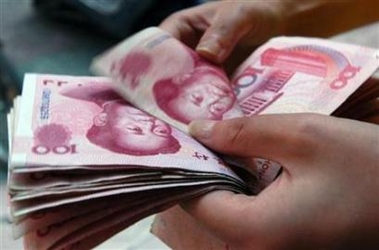 In this file photo a shop assistant checks hundred
yuan bank notes at a shop in Xiangfan, central China's Hubei province, August
19, 2006. China's foreign exchange reserves, the world's largest, swelled to
$1.33 trillion by the end of the first half on the back of massive trade flows
that contributed to an acceleration in money supply growth in June. China's
sizzling economy grew even faster in 2006 than previously reported, the
government said Wednesday, moving it closer to overtaking Germany as the world's
third-largest and possibly adding to fears of overheating. The National Bureau
of Statistics raised its estimate of China's 2006 growth rate from 10.7 percent
to 11.1 percent. It nudged up its estimate of total output by 146.4 billion yuan
($18.8 billion) to 21.1 trillion yuan ($2.705 trillion). The revision brought
China closer to Germany, the world's third-largest economy after the United
States and Japan. Germany's 2006 output was $3 trillion but its 2.5 percent
growth rate was well below China's. The statistics agency routinely issues such
revisions to economic growth rates. But the latest report could receive special
attention from Chinese leaders, who are trying to rein in a boom that they worry
could ignite a financial crisis. Chinese leaders want to maintain fast growth to
reduce poverty but are trying to slow investment in auto manufacturing, real
estate and other areas where supply outstrips demand. They worry that runaway
spending could ignite inflation or leave banks and borrowers with dangerously
high debt levels. In the most recent official forecast, the central bank's
research bureau said last month the economy was expected to expand by 10.8
percent this year. That was in line with projections by the World Bank and other
economists, and would be China's fifth straight year of growth in excess of 10
percent. Wednesday's revision was in line with the opinions of outside
economists, who said the earlier figure seemed too low, suggesting the economy
was slowing despite surging exports and other indicators. The change comes amid
reports of double-digit growth in industrial output, investment and other
economic indicators. China's trade surplus soared to a new monthly high of $26.9
billion in June, the government reported Tuesday. That was despite official
efforts to narrow the ballooning trade gap by repealing rebates of value-added
taxes on exports. The statistics bureau's brief announcement on Wednesday said
the biggest increase in China's estimated output was in secondary industries,
which includes manufacturing, construction and utilities. The exact size of
China's economy is a matter of debate, with foreign analysts saying the small
statistics agency lacks the resources to provide more than a general estimate.
In December 2005, Beijing raised the official size of the economy by nearly 17
percent and retroactively boosted annual growth figures for the previous decade
following the first nationwide census of China's booming service industries such
as restaurants.
In this file photo a shop assistant checks hundred
yuan bank notes at a shop in Xiangfan, central China's Hubei province, August
19, 2006. China's foreign exchange reserves, the world's largest, swelled to
$1.33 trillion by the end of the first half on the back of massive trade flows
that contributed to an acceleration in money supply growth in June. China's
sizzling economy grew even faster in 2006 than previously reported, the
government said Wednesday, moving it closer to overtaking Germany as the world's
third-largest and possibly adding to fears of overheating. The National Bureau
of Statistics raised its estimate of China's 2006 growth rate from 10.7 percent
to 11.1 percent. It nudged up its estimate of total output by 146.4 billion yuan
($18.8 billion) to 21.1 trillion yuan ($2.705 trillion). The revision brought
China closer to Germany, the world's third-largest economy after the United
States and Japan. Germany's 2006 output was $3 trillion but its 2.5 percent
growth rate was well below China's. The statistics agency routinely issues such
revisions to economic growth rates. But the latest report could receive special
attention from Chinese leaders, who are trying to rein in a boom that they worry
could ignite a financial crisis. Chinese leaders want to maintain fast growth to
reduce poverty but are trying to slow investment in auto manufacturing, real
estate and other areas where supply outstrips demand. They worry that runaway
spending could ignite inflation or leave banks and borrowers with dangerously
high debt levels. In the most recent official forecast, the central bank's
research bureau said last month the economy was expected to expand by 10.8
percent this year. That was in line with projections by the World Bank and other
economists, and would be China's fifth straight year of growth in excess of 10
percent. Wednesday's revision was in line with the opinions of outside
economists, who said the earlier figure seemed too low, suggesting the economy
was slowing despite surging exports and other indicators. The change comes amid
reports of double-digit growth in industrial output, investment and other
economic indicators. China's trade surplus soared to a new monthly high of $26.9
billion in June, the government reported Tuesday. That was despite official
efforts to narrow the ballooning trade gap by repealing rebates of value-added
taxes on exports. The statistics bureau's brief announcement on Wednesday said
the biggest increase in China's estimated output was in secondary industries,
which includes manufacturing, construction and utilities. The exact size of
China's economy is a matter of debate, with foreign analysts saying the small
statistics agency lacks the resources to provide more than a general estimate.
In December 2005, Beijing raised the official size of the economy by nearly 17
percent and retroactively boosted annual growth figures for the previous decade
following the first nationwide census of China's booming service industries such
as restaurants.
 A kitten is fed at Duo
Zirong's house in Shanghai July 11, 2007. The power of the Internet has saved
more than 800 cats from being skinned and served up on Chinese dinner tables. A kitten is fed at Duo
Zirong's house in Shanghai July 11, 2007. The power of the Internet has saved
more than 800 cats from being skinned and served up on Chinese dinner tables.
Retail sales of consumer goods in China are expected to
jump by 15.8 percent in 2007, the fastest growth in a decade.
China would allow more big foreign reinsurance firms into
the country, aiming to boost market competition by attracting non-State capital.
Air China Ltd, one of the country's three major airlines,
finalized an agreement to buy 23 Airbus A320 planes, it said Wednesday, part of
an earlier commitment last October by the Chinese government to buy 150 of the
jets. The planes, to be delivered to Air China between January 2009 and December
2012, have a list price of US$1.41 billion (1.03 billion euros), the majority
State-owned airline said in a statement. Air China said the actual purchase
price was lower than the list price. Airbus and US rival Boeing Co usually sell
their planes to airlines at discounts from list prices. "We expect the
transaction to increase operating capacity by 5.88 percent, and to help increase
frequency of flights, departing originally from Chengdu," the company said.
China's other two major airlines are China Southern Airlines Co and China Easter
Airlines Corp. Guangzhou-based China Southern announced late Monday it had
agreed to buy 25 B737-800 planes from Boeing and 20 A320 jets from Airbus worth
a total list price of as much as US$3.7 billion (2.7 billion euros). Airbus is a
unit of European Aeronautic Defense & Space Co.
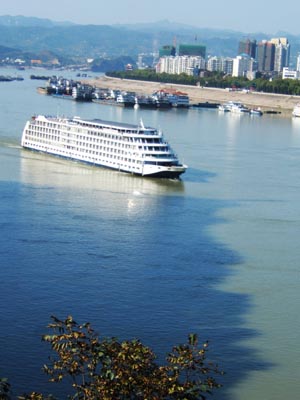 The State Council has approved a national inland waterway and port plan jointly
formulated by the National Reform and Development Commission and the Ministry of
Communications, said Weng Mengyong, Vice Minister of Communications. According
to the plan, China will construct a network connecting superior waterways
composed of the trunks of the Yangtze River, Xijiang River and Beijing-Hangzhou
Grand Canal, the Yangtze Delta Waterway Network, the Pearl River Delta Waterway
Network, as well as 18 other waterways. The superior network, capable of
carrying thousand-ton vessels, has a total length of 19,000 kilometers, 14,300
kilometers or 75 percent of which are third-grade waterways, while the rest
4,800 kilometers or 25 percent are fourth-grade ones. The plan will be
implemented from 2007 to 2020 under two categories, superior waterways and
others. All inland ports will also be categories into either main ports,
regional ports or general ports. Twenty-eight ports of all types will be in the
network, including Chongqing Port, Wuhan Port, Nanchang Port, Wuxi Port, and
Hanzhou Port. When finished, the water network will run through 20 provinces or
regions, connecting 56 cities each with a population of over 500,000 and 27
national-level ports. By 2010, inland waterways will be able to carry 40 percent
more of the current level and the capacity will double by 2020. Shanghai may be
the biggest beneficiary from the plan, as the network will on the one hand boost
communication between China's financial center and other cities, and on the
other, more goods will be traded via Shanghai Port, which will quickly help
Shanghai establish itself as an international shipping center.
The State Council has approved a national inland waterway and port plan jointly
formulated by the National Reform and Development Commission and the Ministry of
Communications, said Weng Mengyong, Vice Minister of Communications. According
to the plan, China will construct a network connecting superior waterways
composed of the trunks of the Yangtze River, Xijiang River and Beijing-Hangzhou
Grand Canal, the Yangtze Delta Waterway Network, the Pearl River Delta Waterway
Network, as well as 18 other waterways. The superior network, capable of
carrying thousand-ton vessels, has a total length of 19,000 kilometers, 14,300
kilometers or 75 percent of which are third-grade waterways, while the rest
4,800 kilometers or 25 percent are fourth-grade ones. The plan will be
implemented from 2007 to 2020 under two categories, superior waterways and
others. All inland ports will also be categories into either main ports,
regional ports or general ports. Twenty-eight ports of all types will be in the
network, including Chongqing Port, Wuhan Port, Nanchang Port, Wuxi Port, and
Hanzhou Port. When finished, the water network will run through 20 provinces or
regions, connecting 56 cities each with a population of over 500,000 and 27
national-level ports. By 2010, inland waterways will be able to carry 40 percent
more of the current level and the capacity will double by 2020. Shanghai may be
the biggest beneficiary from the plan, as the network will on the one hand boost
communication between China's financial center and other cities, and on the
other, more goods will be traded via Shanghai Port, which will quickly help
Shanghai establish itself as an international shipping center.
July 12, 2007
 Hong Kong:
The art world celebrates
its finest - Portrait of the Artist and His Friends by contemporary artist Yue
Minjun was sold by Christie's for five times above the pre-sale estimate. Colin
Sheaf, Chairman of Bonhams Asia, describes Hong Kong as the world's most
exciting and competitive centre for selling classic Chinese art. For fine art
lovers around the world, it's becoming a case of Chinese art at any price.
Prestigious global auction houses Christie's and Sotheby's are reporting record
after record being set at their twice-yearly sales in Hong Kong, and this year a
third contender, British auctioneers Bonhams, has arrived to tap the booming
market. The current explosion of prices for Asian art is a far cry from 10 years
ago, when there was little interest. However, a decade of economic growth in
China has delivered a legion of wealthy collectors seeking to buy art both for
enjoyment and investment. "Nothing in the global art market has been more
dramatic in the past decade than the emergence of new art buyers in Asia," says
Colin Sheaf, Chairman of Bonhams Asia after the February opening of Bonhams Hong
Kong. Anthony Lin, an independent art adviser and former Chairman of Christie's
Asia, agrees. "This is a market that, 10 years ago, nobody believed where it
would be today," he told the Hong Kong Standard. Hong Kong's international
reputation and free port status have helped propel the city as jewel in the
crown of Asia's art scene. Hong Kong has in recent years become a major world
hub for top-end Chinese art, along with London and New York. At its spring sales
in April, Sotheby's sold the 1939 Chinese masterpiece Put Down Your Whip by Xu
Beihong for a world record HK$72 million (US$9,211,680), more than double its
estimated price. In total Sotheby's sold HK$1.05 billion (US$134 million) of art
during its spring sales series in Hong Kong, well above expected. Henry Howard-Sneyd,
Deputy Chairman of Europe and Asia and Managing Director of Sotheby's Asia, said
this result built on "five years of spectacular growth", during which sales had
tripled. Christie's sold a total of HK$1.52 billion (US$195.4 million) during
its five-day spring sales in Hong Kong, a 26.5 per cent increase over last year.
Sale prices included a record of almost HK$20.5 million (US$2.6 million) for
Portrait of the Artist and His Friends by contemporary artist Yue Minjun (born
in 1962), five times above the pre-sale estimate. Christie's moved all of its
regional sales to Hong Kong in 2000. Commenting that this season's sales results
show "yet again the growing strength of the art market in Hong Kong", Edward
Dolman, Chief Executive of Christie's International, said he expects the firm's
Asian art business to keep growing by 15 - 20 per cent each year. Bonhams' first
sales in Hong Kong, held in May, saw more than HK$40 million (US$5.1 million) of
artworks change hands – the highest total Bonhams has ever achieved for a series
of inaugural actions. Asia Chairman Colin Sheaf noted that the market for
Chinese art is "global, resilient (and) hungry for the very finest". He
described Hong Kong as "the world's most exciting and competitive centre" for
selling classic Chinese art. To mark the 10th anniversary since Hong Kong's
return to British rule, Sotheby's auctioned a private collection of
Reunification Art on June 29, with part proceeds going to the Chinese Red Cross.
Kevin Ching, Chief Executive Officer of Sotheby's Asia, said the special auction
acknowledged China's economic ‘great leap forward' in the decade since Handover,
propelling it to the forefront of the international arena. He said that many
Western collectors, together with the newly rich in China, have joined
established buyers from Hong Kong, Taiwan and South East Asia, all contributing
to the development of the Hong Kong art market. "Hong Kong, rather than New York
or London, is in fact the major and leading centre for top end Chinese art,
including paintings, ceramics and works of art," Mr Ching said. "There is no
doubt that Hong Kong's present prosperity as well as the rather free art market
owes a lot to the success of reunification with China and its adherence to the
one country, two systems principle . It is only right that we should celebrate
the 10th anniversary with our auction of reunification art at end June, just
before the July 1 celebration." Hong Kong:
The art world celebrates
its finest - Portrait of the Artist and His Friends by contemporary artist Yue
Minjun was sold by Christie's for five times above the pre-sale estimate. Colin
Sheaf, Chairman of Bonhams Asia, describes Hong Kong as the world's most
exciting and competitive centre for selling classic Chinese art. For fine art
lovers around the world, it's becoming a case of Chinese art at any price.
Prestigious global auction houses Christie's and Sotheby's are reporting record
after record being set at their twice-yearly sales in Hong Kong, and this year a
third contender, British auctioneers Bonhams, has arrived to tap the booming
market. The current explosion of prices for Asian art is a far cry from 10 years
ago, when there was little interest. However, a decade of economic growth in
China has delivered a legion of wealthy collectors seeking to buy art both for
enjoyment and investment. "Nothing in the global art market has been more
dramatic in the past decade than the emergence of new art buyers in Asia," says
Colin Sheaf, Chairman of Bonhams Asia after the February opening of Bonhams Hong
Kong. Anthony Lin, an independent art adviser and former Chairman of Christie's
Asia, agrees. "This is a market that, 10 years ago, nobody believed where it
would be today," he told the Hong Kong Standard. Hong Kong's international
reputation and free port status have helped propel the city as jewel in the
crown of Asia's art scene. Hong Kong has in recent years become a major world
hub for top-end Chinese art, along with London and New York. At its spring sales
in April, Sotheby's sold the 1939 Chinese masterpiece Put Down Your Whip by Xu
Beihong for a world record HK$72 million (US$9,211,680), more than double its
estimated price. In total Sotheby's sold HK$1.05 billion (US$134 million) of art
during its spring sales series in Hong Kong, well above expected. Henry Howard-Sneyd,
Deputy Chairman of Europe and Asia and Managing Director of Sotheby's Asia, said
this result built on "five years of spectacular growth", during which sales had
tripled. Christie's sold a total of HK$1.52 billion (US$195.4 million) during
its five-day spring sales in Hong Kong, a 26.5 per cent increase over last year.
Sale prices included a record of almost HK$20.5 million (US$2.6 million) for
Portrait of the Artist and His Friends by contemporary artist Yue Minjun (born
in 1962), five times above the pre-sale estimate. Christie's moved all of its
regional sales to Hong Kong in 2000. Commenting that this season's sales results
show "yet again the growing strength of the art market in Hong Kong", Edward
Dolman, Chief Executive of Christie's International, said he expects the firm's
Asian art business to keep growing by 15 - 20 per cent each year. Bonhams' first
sales in Hong Kong, held in May, saw more than HK$40 million (US$5.1 million) of
artworks change hands – the highest total Bonhams has ever achieved for a series
of inaugural actions. Asia Chairman Colin Sheaf noted that the market for
Chinese art is "global, resilient (and) hungry for the very finest". He
described Hong Kong as "the world's most exciting and competitive centre" for
selling classic Chinese art. To mark the 10th anniversary since Hong Kong's
return to British rule, Sotheby's auctioned a private collection of
Reunification Art on June 29, with part proceeds going to the Chinese Red Cross.
Kevin Ching, Chief Executive Officer of Sotheby's Asia, said the special auction
acknowledged China's economic ‘great leap forward' in the decade since Handover,
propelling it to the forefront of the international arena. He said that many
Western collectors, together with the newly rich in China, have joined
established buyers from Hong Kong, Taiwan and South East Asia, all contributing
to the development of the Hong Kong art market. "Hong Kong, rather than New York
or London, is in fact the major and leading centre for top end Chinese art,
including paintings, ceramics and works of art," Mr Ching said. "There is no
doubt that Hong Kong's present prosperity as well as the rather free art market
owes a lot to the success of reunification with China and its adherence to the
one country, two systems principle . It is only right that we should celebrate
the 10th anniversary with our auction of reunification art at end June, just
before the July 1 celebration."
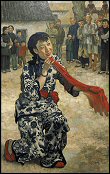 Chinese masterpiece
Put Down Your Whip by Xu Beihong set a new
world record at the Sotheby's spring sales
Chinese masterpiece
Put Down Your Whip by Xu Beihong set a new
world record at the Sotheby's spring sales
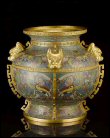 This Imperial cloisonne enamel jar
sold at the Bonhams auction, greatly exceeding its pre-sale estimate This Imperial cloisonne enamel jar
sold at the Bonhams auction, greatly exceeding its pre-sale estimate
China Development Bank (CDB)
announced here Monday the subscription for its 5-billion-renminbi bonds launched
from July 27 was closed with complete success, reflecting strong response from
both retail and institutional investors. Total subscription amount exceeded 14
billion yuan (1.8 billion U.S. dollars), equivalent to near three times of the
total issue size. The issuer has determined to issue 2.5 billion yuan,
respectively, to both retail and institutional tranches. Subscriptions for both
retail and institutional bond offerings were closed on July 6. During the
subscription period, the retail tranche has attracted more than 60,000
applications and the total subscription amount exceeded 7 billion yuan. And the
institutional tranche has also attracted more than 7 billion yuan. Chen Yuan,
governor of CDB, said that the success of the RMB bond issuance in Hong Kong
demonstrated the continuing great confidence of local investors in China's
economic development. At the same time, it also showed the full recognition of
CDB's credit and business performance by the Hong Kong market. He said that the
funds raised from this bond issuance will be used to finance China's fundamental
key infrastructure projects. "The encouraging subscription result of CDB's
renminbi bonds highlights the strong demand of investors in Hong Kong for
renminbi-denominated investment instruments, including high-quality renminbi
bonds," said Joseph Yam, chief executive of the Hong Kong Monetary Authority.
"The success of the first issue of renminbi bonds forms a good basis for the
further development of the renminbi bond market in Hong Kong. It has also opened
up a new channel for financial intermediation between Hong Kong and the
Mainland," he said.
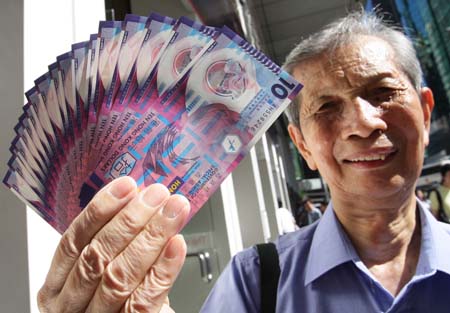 A Hongkonger holds a
fan of the new plastic-covered HK$10 bills which were issued yesterday. The
first ever plastic HK$10 bills were issued in Hong Kong yesterday to great
public excitement. Signed by former Financial Secretary Henry Tang on April 1,
the 50 million plastic HK$10 notes went into circulation yesterday, with Hong
Kong Shanghai Banking Corporation (HSBC) as the distributing agent. Though there
were no limits on the number of bank notes each citizen could exchange, more
than 100 people queued outside an HSBC branch in Mong Kok as early as 6:30 am
yesterday. Some people lauded the new bank notes for their smoothness and
durability. Others remarked that the new bank notes were of interest to
collectors because they had been signed by former Financial Secretary Tang.
Resistant to dust and dirt, the bank notes can be washed in soap and water
without being damaged. The bank notes can also be recycled, making them
environment-friendly. A Hongkonger holds a
fan of the new plastic-covered HK$10 bills which were issued yesterday. The
first ever plastic HK$10 bills were issued in Hong Kong yesterday to great
public excitement. Signed by former Financial Secretary Henry Tang on April 1,
the 50 million plastic HK$10 notes went into circulation yesterday, with Hong
Kong Shanghai Banking Corporation (HSBC) as the distributing agent. Though there
were no limits on the number of bank notes each citizen could exchange, more
than 100 people queued outside an HSBC branch in Mong Kok as early as 6:30 am
yesterday. Some people lauded the new bank notes for their smoothness and
durability. Others remarked that the new bank notes were of interest to
collectors because they had been signed by former Financial Secretary Tang.
Resistant to dust and dirt, the bank notes can be washed in soap and water
without being damaged. The bank notes can also be recycled, making them
environment-friendly.
Lawyers yesterday expressed concern that they would bear
the highest financial risks under the conditional legal aid fund proposed by the
Law Reform Commission. Michael Vidler, a solicitor who has handled many legal
aid cases, said the "no win, no fee" principle adopted in the proposal was
unfair to lawyers. "It's a bit like going along to a doctor and say, `if I get
better I will pay you, if I don't get better I won't pay you'," he said.
However, Law Society president Lester Huang said he supported the conditional
fee system and it should be tried in Hong Kong. He said he was concerned,
however, that under the proposal, lawyers in some cases might not be paid even
after winning. "The defendants in many commercial cases are not insured. As a
result, the lawyers themselves might end up bearing the risk," he said. Mr
Vidler said the proposal seemed to fit in with the government's consistent
attempt to "ask solicitors to do more for no money and to bear the risk". He
cited the case of the criminal legal aid scheme, which paid lawyers hourly rates
that could sometimes be lower than that of a McDonald's worker. "This appears as
though the government is trying to shirk its responsibility [and shift it] onto
solicitors, in particular in the provision of legal services," he said. He said
"no one in their right mind" would opt for conditional fees. "If I want to do
something pro bono, that's my decision, but I am not going to do it on the basis
that if I am going to lose [a case], I am not going to get paid." Mr Vidler
added that the fund would also deter lawyers from working on cases that were
worthwhile cases, but not easy to win. He said Hong Kong should learn from the
"disastrous system" of conditional fees introduced in England. The commission
report released yesterday pointed out that many additional legal disputes had
arisen because of changes in the conditional fee system in England. "The losing
party challenges the conditional fee agreement in the hope of avoiding liability
for costs altogether," it said. "Nevertheless, the fact that the losing party
must pay the success fee [of the winning party], together with the insurance
premium, remains a source of much contention and public policy debate." Mr Huang
also said the government should not treat mediation - which was also encouraged
by the commission as an alternative, less costly approach to resolve civil
dispute - as something free. "The government also needs to put in resources to
support mediation," he said. Law Yuk-kai, director of Hong Kong Human Rights
Monitor, welcomed the idea of a legal aid service run by an independent body,
despite potential problems.
Macau braces for talent crunch - Increased demand for
skilled workers in Macau's fast-expanding gaming industry will drive the
adoption of advanced human resource management practices and technology in the
former Portuguese enclave, according to industry experts. "Macau's human
resources challenge is clear given the developments around new casinos," said
Sean Loiselle, senior director for human capital management (HCM) in the
Asia-Pacific region at enterprise software firm Oracle. "With the number of
gaming tables expected to grow fivefold - from about 2,000 at the beginning of
this year to 10,000 by the end of 2010 - there's going to be a severe shortage
of experienced personnel at every level." That battle for talent is expected to
sharpen the focus of Macau casino operators on HCM systems to boost customer
satisfaction and sustain business growth. "The attraction and retention of
talent has a real impact on a company's performance," said Stella Hou, general
manager for Hong Kong at human resources services firm Hewitt Associates.
"Companies that manage their employees as an asset have lower staff turnover,
which translates into lower recruitment and training costs and, even more
importantly, less disruption to customer relationships." According to Oracle
estimates, every new hire can cost 100 per cent to 250 per cent of the departing
employee's annual salary. The strong demand for skilled staff from casino
operators in Macau has apparently also put other sectors on the island - such as
financial services, professional services and the public sector - under pressure
to adopt comprehensive human capital strategies to retain key personnel. "Human
capital management is a long-term strategic play but the good news is that the
technology available to support talent management - enterprise HCM application
suites and related analytical tools - is now quite sophisticated," Mr Loiselle
said. "Casino operators in Las Vegas have already demonstrated the business
value that can be obtained from HCM technology and the model they have
established is an excellent foundation for the gaming industry in Macau to build
on." Leading hospitality and gaming operators such as Crown Casino and Burswood
Entertainment Complex in Australia are among Asian customers that have gone live
with Oracle-based HCM solutions. Many multinational hi-tech firms - including
Oracle, Microsoft, IBM, Hewlett-Packard and SAP - have been aggressively
marketing tried and tested technologies used largely in the Las Vegas gaming
industry to tap into the estimated US$20 billion to US$30 billion worth of
casino-related projects in Macau. Hong Kong also has difficult human resources
issues similar to the situation in Macau. According to the Hong Kong Institute
of Human Resource Management, the overall job vacancy rate in Hong Kong hit an
average of 3.1 per cent this first quarter, with the financial services sector
posting the highest vacancy rate at 5.62 per cent. "The Hong Kong economy has
grown strongly in the last four years and the war for talent here has
re-emerged," Mr Loiselle said.
 China:
Zheng Xiaoyu, former director of China's State Food and Drug Administration (SFDA),
was executed on Tuesday morning with the approval of the Supreme People's Court.
Zheng, 63, was sentenced to death on May 29 by the Beijing Municipal No. 1
Intermediate People's Court after being found guilty of taking 6.49 million yuan
(about 850,000 U.S. dollars) in bribes and dereliction of duty. Zheng appealed
for leniency in a second hearing of his case on June 12, pleading that the
penalty was "too severe" and asking the court to reconsider the sentence. He
also gave evidence that implicated other officials in the case. The Higher
People's Court of Beijing rejected Zheng's appeal on June 22 and upheld the
death sentence.
China:
Zheng Xiaoyu, former director of China's State Food and Drug Administration (SFDA),
was executed on Tuesday morning with the approval of the Supreme People's Court.
Zheng, 63, was sentenced to death on May 29 by the Beijing Municipal No. 1
Intermediate People's Court after being found guilty of taking 6.49 million yuan
(about 850,000 U.S. dollars) in bribes and dereliction of duty. Zheng appealed
for leniency in a second hearing of his case on June 12, pleading that the
penalty was "too severe" and asking the court to reconsider the sentence. He
also gave evidence that implicated other officials in the case. The Higher
People's Court of Beijing rejected Zheng's appeal on June 22 and upheld the
death sentence.
Passengers and businesses in cities
like Seattle will have access to better travel connections and cheaper shipping
options to China due to an aviation agreement signed Monday between the United
States and China. According to the pact signed by US Secretary of Transportation
Mary Peters and visiting Chinese Minister of Civil Aviation Yang Yuanyuan, the
two countries will more than double commercial passenger departures by 2012 and
allow unlimited cargo flights between the two countries. U.S. Transportation
Department said in a news release the department plans to award a new route to a
U.S. carrier later this year. It is currently accepting proposals from airlines
for new services in 2008 and 2009. The deal also provides Seattle with new
opportunities in its position as "one of the best gateways to the Pacific," said
Peters, who joined Yuanyuan in signing the agreement at the Seattle-Tacoma
International Airport. "Our goal is to make flying from places like Seattle to
China as easy as flying to New York or Boston today," Peters said. "By providing
more and cheaper shipping choices to China, this agreement will make it easier
for U.S. companies to tap into China's enormous market." It is estimated that
the agreement will generate as much as 5 billion U.S. dollars in passenger and
cargo revenues for the airline industry over the next six years, and as much as
8 billion dollars in new economic activity in the United States, Peters said.
China plans to invest 18.7 billion yuan (US$2.46B) in the
next eight years to try to roll back desertification in northwest China's
Xinjiang Uygur Autonomous Region.
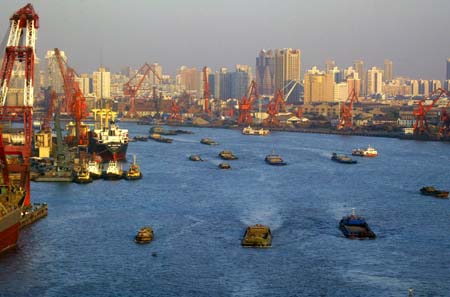 A general view shows the port
alongside Huangpu River in Shanghai. China's trade surplus in June hit a new
high of US$26.91 billion, up 85.5 percent on the same month last year. China's
trade surplus in June hit a new high of US$26.91 billion, up 85.5 percent on the
same month last year, the General Administration of Customs said on Tuesday. The
aggregate surplus for the first half of the year jumped 83 percent to US$112.5
billion, it said. Imports rose 14.2 percent to US$76.36 billion in June but
exports grew 27.1 percent to US$103.27 billion. The growth rate in June's
exports was 1.6 percentage points lower than that in May. China's foreign trade
volume for the first half year totaled US$980.93 billion, up 23.3 percent. A general view shows the port
alongside Huangpu River in Shanghai. China's trade surplus in June hit a new
high of US$26.91 billion, up 85.5 percent on the same month last year. China's
trade surplus in June hit a new high of US$26.91 billion, up 85.5 percent on the
same month last year, the General Administration of Customs said on Tuesday. The
aggregate surplus for the first half of the year jumped 83 percent to US$112.5
billion, it said. Imports rose 14.2 percent to US$76.36 billion in June but
exports grew 27.1 percent to US$103.27 billion. The growth rate in June's
exports was 1.6 percentage points lower than that in May. China's foreign trade
volume for the first half year totaled US$980.93 billion, up 23.3 percent.
 In China, the color of green represents health and vigor.
Then a green life is one that is healthy and pleasant. Both Beijing and Shanghai
have some green venues for people to enjoy their lives free of pollution and
noise. There are hotels with pleasant lodgings in green surroundings and
recreational centers offering cool exercises in the hot summer.
In China, the color of green represents health and vigor.
Then a green life is one that is healthy and pleasant. Both Beijing and Shanghai
have some green venues for people to enjoy their lives free of pollution and
noise. There are hotels with pleasant lodgings in green surroundings and
recreational centers offering cool exercises in the hot summer.
July 11, 2007
 Hong Kong:
CITIC Pacific (0267), a
state- backed conglomerate controlled by billionaire Larry Yung Chi- kin, is
considering spinning off its motor vehicle and food commodity distribution
business for a separate listing. Hong Kong:
CITIC Pacific (0267), a
state- backed conglomerate controlled by billionaire Larry Yung Chi- kin, is
considering spinning off its motor vehicle and food commodity distribution
business for a separate listing.
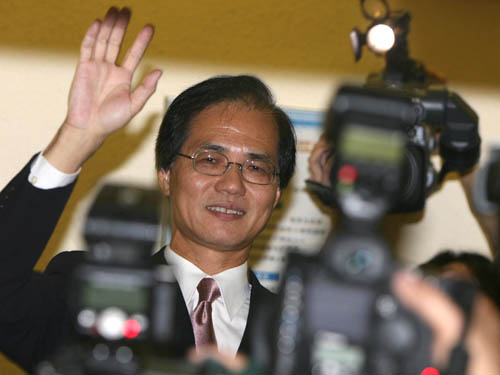 Broadcasting
chief Chu Pui-hing has decided to opt for early retirement in a bid to end the
media glare which has surrounded him since his bizarre flight from cameramen
last Thursday night. Broadcasting
chief Chu Pui-hing has decided to opt for early retirement in a bid to end the
media glare which has surrounded him since his bizarre flight from cameramen
last Thursday night.
Karrie International Holdings
(1050), which makes laser printers, office automation products and casings for
personal computers and servers, said net profit for the year ended March 31
plunged 33 percent to HK$124.93 million, as revenues fell 8 percent to HK$3.32
billion.
The Education Bureau has proposed
raising Secondary Four and Five school fees from HK$5,670 to HK$6,020, and
Secondary Six and Seven fees from HK$9,450 to HK$9,870 for the 2007-2008
academic year.
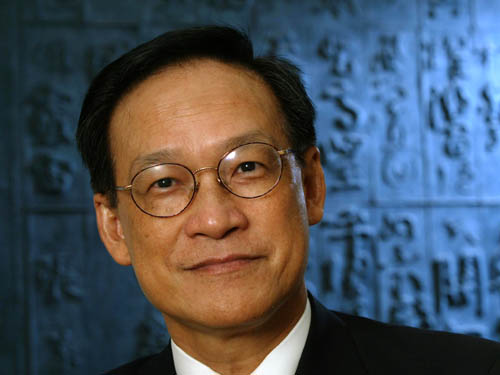 The Law Reform Commission has proposed a new way to
broaden public access to justice, by setting up a separate legal aid fund
covering a wide range of civil lawsuits. The fund it proposes would be
independent of the Legal Aid Department and lawyers would take on the cases on a
"no win, no fee" basis. The ideas represent a retreat from a 2005 proposal by
the commission's subcommittee on conditional fees for an across-the-board "no
win, no fee" system. The subcommittee says the existing Ordinary Legal Aid
Scheme and Supplementary Legal Aid Scheme are too narrow and inflexible to meet
the needs of middle-income people wanting to take court action. It recommends
the government set up a statutory body to administer a self-financed conditional
legal aid fund and extend the Supplementary Legal Aid Scheme by raising
eligibility limits and increasing the types of cases covered. The disposable
assets limit for applicants for supplementary legal aid is HK$439,800. The
commission proposes a limit of HK$2 million for the conditional fund. Responses
to the proposal yesterday were mixed. Some lawyers arguing the subcommittee's
goals could be met simply by broadening the scope of the supplementary scheme.
The commission proposes litigants who win their cases be required to pay into
the fund 15 per cent of the damages they receive. In cases where the litigant
lost, the fund would pay the winning party's legal costs. Lawyers would receive
a success fee in addition to their normal fee when they won a case. They would
not be paid if they lost. The commission acknowledges its 2005 proposal would
not work because it was unlikely litigants would be able to get affordable
insurance to cover the winner's costs in the event they lost a case. Commission
chairman Edward Chen Kwan-yiu said: "The insurance industry [was] sceptical that
insurance could be offered at rates which were commercially viable, without
being prohibitively expensive for the consumer." Professor Chen said the
existing legal aid schemes only covered 70 per cent of the population. "Suppose
that 1 per cent of the remaining 30 per cent of people belong to the wealthy
group. We still have 29 per cent who need but cannot access legal aid. We cannot
forget about them," he said. It proposes the government provide seed money to
get the fund up and running. Professor Chen said the fund could enhance access
to justice since lawyers would assess carefully the merits of a case before
taking it on. He admitted that lawyers consulted about its proposals had
expressed a lot of reservations. Barrister and legislator Audrey Eu Yuet-mee
said yesterday that disputes could easily arise between lawyer and client under
a "no win, no fee" scheme. She said: "The Supplementary Legal Aid Scheme has
been very successful and is making money. I would question the logic of setting
up another fund." Lester Huang, president of the Law Society, believed a "no
win, no fee" scheme would not be very attractive to veteran lawyers. If history
is a guide, the commission's proposals are unlikely to become law any time soon.
Hardly any of its recommendations have been taken up in the past decade.
The Law Reform Commission has proposed a new way to
broaden public access to justice, by setting up a separate legal aid fund
covering a wide range of civil lawsuits. The fund it proposes would be
independent of the Legal Aid Department and lawyers would take on the cases on a
"no win, no fee" basis. The ideas represent a retreat from a 2005 proposal by
the commission's subcommittee on conditional fees for an across-the-board "no
win, no fee" system. The subcommittee says the existing Ordinary Legal Aid
Scheme and Supplementary Legal Aid Scheme are too narrow and inflexible to meet
the needs of middle-income people wanting to take court action. It recommends
the government set up a statutory body to administer a self-financed conditional
legal aid fund and extend the Supplementary Legal Aid Scheme by raising
eligibility limits and increasing the types of cases covered. The disposable
assets limit for applicants for supplementary legal aid is HK$439,800. The
commission proposes a limit of HK$2 million for the conditional fund. Responses
to the proposal yesterday were mixed. Some lawyers arguing the subcommittee's
goals could be met simply by broadening the scope of the supplementary scheme.
The commission proposes litigants who win their cases be required to pay into
the fund 15 per cent of the damages they receive. In cases where the litigant
lost, the fund would pay the winning party's legal costs. Lawyers would receive
a success fee in addition to their normal fee when they won a case. They would
not be paid if they lost. The commission acknowledges its 2005 proposal would
not work because it was unlikely litigants would be able to get affordable
insurance to cover the winner's costs in the event they lost a case. Commission
chairman Edward Chen Kwan-yiu said: "The insurance industry [was] sceptical that
insurance could be offered at rates which were commercially viable, without
being prohibitively expensive for the consumer." Professor Chen said the
existing legal aid schemes only covered 70 per cent of the population. "Suppose
that 1 per cent of the remaining 30 per cent of people belong to the wealthy
group. We still have 29 per cent who need but cannot access legal aid. We cannot
forget about them," he said. It proposes the government provide seed money to
get the fund up and running. Professor Chen said the fund could enhance access
to justice since lawyers would assess carefully the merits of a case before
taking it on. He admitted that lawyers consulted about its proposals had
expressed a lot of reservations. Barrister and legislator Audrey Eu Yuet-mee
said yesterday that disputes could easily arise between lawyer and client under
a "no win, no fee" scheme. She said: "The Supplementary Legal Aid Scheme has
been very successful and is making money. I would question the logic of setting
up another fund." Lester Huang, president of the Law Society, believed a "no
win, no fee" scheme would not be very attractive to veteran lawyers. If history
is a guide, the commission's proposals are unlikely to become law any time soon.
Hardly any of its recommendations have been taken up in the past decade.
Hong Kong Disneyland has opened a showroom in Guangzhou to
lure more mainland visitors to the theme park. The 300-square-metre showroom,
opened in conjunction with Disney's mainland travel agent partner, has
multimedia displays and replicas of the park's attractions. The showroom,
Disney's first in the world, is part of an aggressive marketing drive. About
270,000 promotional video discs will also be distributed nationwide. "You can't
just rely on television or printed advertising," said Josh D'Amaro, the theme
park's vice-president of sales and travel trade marketing. "We have to do things
like online marketing, or video productions. We are going to be a little more
aggressive." Mr D'Amaro said Disney believed the mainland was a very important
market, particularly the southern provinces, where it was easier to get to Hong
Kong. Beijing, Shanghai, Guangzhou and Shenzhen were being targeted as key
cities in Disney's marketing drive. About 5 million people visited the park in
the first 12 months after its opening in September 2005, short of the target
figure of 5.6 million. Wang Jian , of Guangdong China Travel Service, said such
operating pressures had made the park more positive in marketing strategy.
 China:
The Beijing Municipal government has spent nearly 4 billion yuan (roughly 526
million U.S. dollars) to give two of its key 30-year-old-plus metro lines a
facelift prior to next summer's Olympics. Work on No.1 and No.2 subway lines,
which were built in the 1960s, is expected be completed next April, the Beijing
Daily Messenger reported on Sunday. The average waiting time will be reduced to
about 2.5 minutes from current more than three minutes, to cope better with the
huge passenger flows during the Games, the newspaper quoted sources with the
Beijing Subway Co. as saying. A total of 180 new, modern subway cars will
replace old ones on both lines and an extra 84 new ones will be added to Line 2.
Trains pulling the new cars will be able to carry 400 more passengers than
current trains. The new cars will also be wheelchair accessible. "Sample
vehicles will arrive in Beijing at the end of this month," he said. Currently,
Beijing has four lines totaling 114 kilometers, carrying 2.1 million passengers
a day. The city will have nine lines totaling 200 km by 2008, and 19 lines
totaling 561.5 km by 2020.
China:
The Beijing Municipal government has spent nearly 4 billion yuan (roughly 526
million U.S. dollars) to give two of its key 30-year-old-plus metro lines a
facelift prior to next summer's Olympics. Work on No.1 and No.2 subway lines,
which were built in the 1960s, is expected be completed next April, the Beijing
Daily Messenger reported on Sunday. The average waiting time will be reduced to
about 2.5 minutes from current more than three minutes, to cope better with the
huge passenger flows during the Games, the newspaper quoted sources with the
Beijing Subway Co. as saying. A total of 180 new, modern subway cars will
replace old ones on both lines and an extra 84 new ones will be added to Line 2.
Trains pulling the new cars will be able to carry 400 more passengers than
current trains. The new cars will also be wheelchair accessible. "Sample
vehicles will arrive in Beijing at the end of this month," he said. Currently,
Beijing has four lines totaling 114 kilometers, carrying 2.1 million passengers
a day. The city will have nine lines totaling 200 km by 2008, and 19 lines
totaling 561.5 km by 2020.
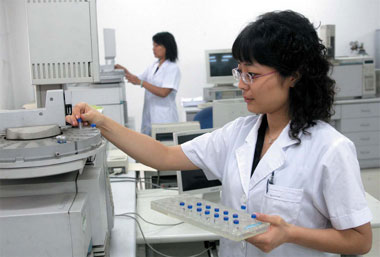 Beijing to ramp up Olympic doping tests - Doping stained the Athens Games. In a
bid to avoid a re-run in 2008, Beijing plans to subject athletes to a level of
scrutiny and testing never before seen at the Olympics. "As announced by the
International Olympic Committee (IOC), the number of doping tests will increase
to 4,500 during the Beijing Games," said Zhao Jian, head of the Anti-Doping
Commission of the Chinese Olympic Committee. "We have now finished training the
bulk of the team," he said. "Our preparations are going ahead smoothly." In
December 2005, the Chinese agency signed a contract with organizing committee
BOCOG to take the role of official drug tester at next year's Games. Most of the
team have worked in the field for about 10 years. Some 200 more staff will be
recruited from local hospitals to plug the gaps. "The heads of all the doping
control centers at the competition venues are very experienced," Zhao told China
Daily. "Meanwhile, those plucked from local hospitals will get to practice at
this year's test events." A further 800 college volunteers will be recruited to
help out, he added. Doping tests have risen steadily in recent years, from 2,800
at the Sydney Games in 2000 to 3,700 in Athens. Between the two Games, the
number of positive results more than doubled. BOCOG is now in discussions with
each of the 28 international sports federations to determine how many doping
tests will be needed for each Olympic sport next year. "The number is usually
decided by the host country based on what it is capable of and the IOC's
approval," Zhao said. "Although the scale of the tests will be a challenge, we
are confident we can manage it." Zhao's confidence is based on China's
anti-doping management system, which won ISO 9001:2000 certification, an
international quality standard, in April 2004. The country's drug-testing
laboratory, which was set up in 1989 for the 1990 Asian Games, has passed the
IOC's level-A examination for 17 straight years. Beijing has almost finished
building a new laboratory to meet demand. Located in the Olympic Sports Center,
at the southern end of the central cluster of Olympic venues, the new lab covers
5,000 sqm and has cost the city over 70 million yuan ($10 million). "Apart from
those for the horses (equestrian events will be staged in Hong Kong), all tests
will be conducted in the new lab," said Zhao. "At its peak, there will be over
200 tests a day," he said These will be overseen by 150 staff. "Most of the
employees will come from affiliated institutions and universities," said Wu
Moutian, head of the Chinese doping-test laboratory. "Half will be on the
payroll and half will be volunteers." According to Wu, besides the current 21
staff, 60 will come from professional drug analysis institutions, 50 will be
medical students from universities and 20 will be foreign experts. "Inviting
foreign experts is international practice. It is a guarantor of impartiality and
transparency," he said. The new lab will be put into use at the end of August
for some of the Olympic warm-up events. Wu said it was too early to predict
whether new drugs would be added to the test list next year. "IOC and the World
Anti-Doping Agency usually announce any new items close to the opening of the
Games so athletes have less chance of escaping detection," he said. Surprising
athletes in this way is not unusual - it happened at the last two Summer Games.
Two months before Sydney got under way, erythropoietin (EPO) tests were first
carried out. Three months before Athens, the same thing happened with human
growth hormone (HGH). EPO, a blood booster that facilitates the delivery of
oxygen, is commonly used to give athletes an advantage in endurance sports like
cycling and marathon running. HGH makes it easier for athletes to strip away fat
and replace it with muscle by boosting the body's natural supplies. With such an
array of threats on offer, and doping becoming ever more elaborate, the new
laboratory will be granted maximum security protection to minimize the risk of
tampering. "According to IOC rules, the Olympic doping test lab should be
secured by armed guards 24 hours a day, while the vehicles responsible for
transporting samples must be accompanied by armed guards," said doping official
Chen Zhiyu. Chen said that despite the strict doping environment, Beijing will
carry out the tests in a manner conducive to making the athletes feel
comfortable rather than victimized. "There are two principles for the Beijing
2008 doping tests: one is not to let any drug taker get way with it, the other
is athlete-oriented, as we aim to offer a good service."
Beijing to ramp up Olympic doping tests - Doping stained the Athens Games. In a
bid to avoid a re-run in 2008, Beijing plans to subject athletes to a level of
scrutiny and testing never before seen at the Olympics. "As announced by the
International Olympic Committee (IOC), the number of doping tests will increase
to 4,500 during the Beijing Games," said Zhao Jian, head of the Anti-Doping
Commission of the Chinese Olympic Committee. "We have now finished training the
bulk of the team," he said. "Our preparations are going ahead smoothly." In
December 2005, the Chinese agency signed a contract with organizing committee
BOCOG to take the role of official drug tester at next year's Games. Most of the
team have worked in the field for about 10 years. Some 200 more staff will be
recruited from local hospitals to plug the gaps. "The heads of all the doping
control centers at the competition venues are very experienced," Zhao told China
Daily. "Meanwhile, those plucked from local hospitals will get to practice at
this year's test events." A further 800 college volunteers will be recruited to
help out, he added. Doping tests have risen steadily in recent years, from 2,800
at the Sydney Games in 2000 to 3,700 in Athens. Between the two Games, the
number of positive results more than doubled. BOCOG is now in discussions with
each of the 28 international sports federations to determine how many doping
tests will be needed for each Olympic sport next year. "The number is usually
decided by the host country based on what it is capable of and the IOC's
approval," Zhao said. "Although the scale of the tests will be a challenge, we
are confident we can manage it." Zhao's confidence is based on China's
anti-doping management system, which won ISO 9001:2000 certification, an
international quality standard, in April 2004. The country's drug-testing
laboratory, which was set up in 1989 for the 1990 Asian Games, has passed the
IOC's level-A examination for 17 straight years. Beijing has almost finished
building a new laboratory to meet demand. Located in the Olympic Sports Center,
at the southern end of the central cluster of Olympic venues, the new lab covers
5,000 sqm and has cost the city over 70 million yuan ($10 million). "Apart from
those for the horses (equestrian events will be staged in Hong Kong), all tests
will be conducted in the new lab," said Zhao. "At its peak, there will be over
200 tests a day," he said These will be overseen by 150 staff. "Most of the
employees will come from affiliated institutions and universities," said Wu
Moutian, head of the Chinese doping-test laboratory. "Half will be on the
payroll and half will be volunteers." According to Wu, besides the current 21
staff, 60 will come from professional drug analysis institutions, 50 will be
medical students from universities and 20 will be foreign experts. "Inviting
foreign experts is international practice. It is a guarantor of impartiality and
transparency," he said. The new lab will be put into use at the end of August
for some of the Olympic warm-up events. Wu said it was too early to predict
whether new drugs would be added to the test list next year. "IOC and the World
Anti-Doping Agency usually announce any new items close to the opening of the
Games so athletes have less chance of escaping detection," he said. Surprising
athletes in this way is not unusual - it happened at the last two Summer Games.
Two months before Sydney got under way, erythropoietin (EPO) tests were first
carried out. Three months before Athens, the same thing happened with human
growth hormone (HGH). EPO, a blood booster that facilitates the delivery of
oxygen, is commonly used to give athletes an advantage in endurance sports like
cycling and marathon running. HGH makes it easier for athletes to strip away fat
and replace it with muscle by boosting the body's natural supplies. With such an
array of threats on offer, and doping becoming ever more elaborate, the new
laboratory will be granted maximum security protection to minimize the risk of
tampering. "According to IOC rules, the Olympic doping test lab should be
secured by armed guards 24 hours a day, while the vehicles responsible for
transporting samples must be accompanied by armed guards," said doping official
Chen Zhiyu. Chen said that despite the strict doping environment, Beijing will
carry out the tests in a manner conducive to making the athletes feel
comfortable rather than victimized. "There are two principles for the Beijing
2008 doping tests: one is not to let any drug taker get way with it, the other
is athlete-oriented, as we aim to offer a good service."
China's biggest professional legal body has urged the
National People's Congress to introduce a new criminal charge for slavery after
revelations last month that children and men were coerced to work in inhuman
conditions in Shanxi's brick kilns without pay. The Constitution and Human
Rights Committee of the government-backed All-China Lawyers' Association sent a
letter to the National People's Congress Standing Committee on June 28, saying
the existing forced-labor charge did not adequately cover the nature and
significance of the culprits' actions. The rights committee said a new charge
with tougher penalties had to be introduced to stamp out modern-day slavery, the
Procuratorial Daily reported yesterday. "We are making this recommendation
because the legal web is not woven tightly enough, and the current criminal law
has no regulations on slavery," the newspaper quoted rights committee member Wu
Ge as saying. Mr Wu could not be reached for comment yesterday. In the report,
Mr Wu said none of the existing criminal legislation covered the crimes in
Shanxi. For example, the forced labour provisions under the Labor Law applied
only to a legally established work unit and therefore left individuals and
illegal kiln owners outside the scope of the legislation. Mr Wu said the
sentences for forced labor charges were too lenient because serious violations
would result in just a maximum of three years' prison, or, in cases where
children were involved, up to seven years behind bars. The charge of trafficking
of women and children also did not entirely fit because most workers trafficked
in Shanxi were male adults. The kidnapping charge also did not apply since no
extortion was involved, Mr Wu said. "[This type of action] is a serious and
vicious violation of human rights, and its threat to society is much more
serious than common illegal detention, intentional harm and forced labour," Mr
Wu said. The arrested suspects - owners of the illegal brick kilns or guards
hired to prevent workers from escaping - are facing charges of illegal detention
and intentional harm. The committee proposed that a new charge should apply in
cases where victims were coerced into work through "violence or threat of
violence, cheating, mental and financial control", and for benchmark sentence
terms to be raised to five years. In serious cases, the sentence should be up to
life imprisonment and the confiscation of property. But the proposal has been
controversial, with some questioning whether it was necessary and rational to
have a new charge under the name of an archaic crime. China University of
Politics and Law professor Wang Shunan said the intention behind the new charge
was good, but people might confuse it with the slavery system of feudal times.
He also said criminal laws should include only crimes that had a long-term and
widespread application. "This is fundamentally a management problem," Professor
Wang said. "We should not rely on criminal law to combat all problems." He said
it was more important that workers were aware of their rights.
July 10, 2007
 Hong Kong:
Ongoing subprime mortgage woes in the United States and recent
senior personnel departures from HSBC Holdings (0005) have kept its share price
stagnant and it will take an earnings surprise to revive the sleeping giant,
analysts say. Hong Kong:
Ongoing subprime mortgage woes in the United States and recent
senior personnel departures from HSBC Holdings (0005) have kept its share price
stagnant and it will take an earnings surprise to revive the sleeping giant,
analysts say.
Macao has seen rise in the number of
imported laborers, local media reported Thursday. The Macao Daily News quoted
government sources as saying that the percentage of imported laborers is
expected to reach 50 percent by 2010. The number of imported laborers stood at
73,460 in May, according to official statistics issued earlier the month. The
region, with a population of 500,000, has a total labor force of 301,000.
 Having tried his hand at both acting and directing, Chinese pop sensation Jay
Chou says he prefers being at the helm of a movie because it gives him more
control. After becoming one of Chinese pop's biggest acts, Chou played a street
car racer in "Initial D," then appeared in famed Chinese director Zhang Yimou's
Chinese historical epic "Curse of the Golden Flower." He has since moved on to
directing and is about to release his first movie. "Secret," scheduled to hit
movie theaters in late July, follows a student played by Chou as he unravels the
mystery behind his love interest's sporadic attendance at school. Chou said in
an interview with Ming Pao Weekly published over the weekend that he prefers
directing to acting. "As an actor, I have to listen to the director, even though
I may not like the way I have to perform. As a director, I'm very clear on what
I want, so I feel more confident," he was quoted as saying. "As an actor you
have to be a very good chess piece for others to play with. I prefer to control
others," Chou reportedly said. The 28-year-old singer-songwriter also said his
interest in movies stemmed from making music videos and that he still feels most
confident composing music.
Having tried his hand at both acting and directing, Chinese pop sensation Jay
Chou says he prefers being at the helm of a movie because it gives him more
control. After becoming one of Chinese pop's biggest acts, Chou played a street
car racer in "Initial D," then appeared in famed Chinese director Zhang Yimou's
Chinese historical epic "Curse of the Golden Flower." He has since moved on to
directing and is about to release his first movie. "Secret," scheduled to hit
movie theaters in late July, follows a student played by Chou as he unravels the
mystery behind his love interest's sporadic attendance at school. Chou said in
an interview with Ming Pao Weekly published over the weekend that he prefers
directing to acting. "As an actor, I have to listen to the director, even though
I may not like the way I have to perform. As a director, I'm very clear on what
I want, so I feel more confident," he was quoted as saying. "As an actor you
have to be a very good chess piece for others to play with. I prefer to control
others," Chou reportedly said. The 28-year-old singer-songwriter also said his
interest in movies stemmed from making music videos and that he still feels most
confident composing music.
Radio
Television Hong Kong's staff union has vowed to back their boss Chu Pui-hing in
fighting for the station's independence despite Chu's "out of character"
behavior last week.
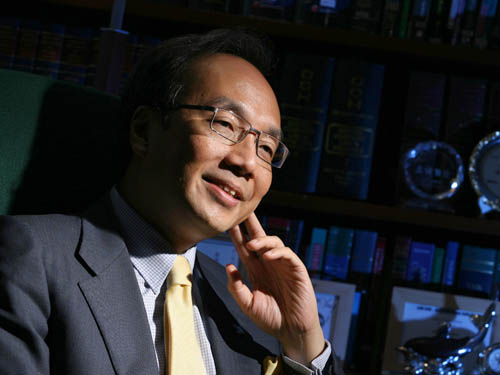 Donald Tsang Yam-kuen was offered an olive branch yesterday by Alan Leong Kah-kit
to open dialogue, just days after the chief executive election challenger
watched Mr Tsang sworn in as the city's leader. Despite their heated rivalry -
on the campaign trail and in sales of their election memoirs - Mr Leong, of the
Civic Party, said the pan-democrats were willing to negotiate with Mr Tsang to
find a universal suffrage proposal acceptable to both sides. "When I shook [Mr
Tsang's] hand after the election on March 25, I told him not to forget about
what the people had entrusted him to do and use that to do good for them and for
Hong Kong," Mr Leong said. "He said: `I shall'. "On July 1, I also wished him
well. I do hope he can lead Hong Kong out of the present difficulties and Hong
Kong will become the Hong Kong the people want." A conciliatory Mr Leong also
called for people to give Mr Tsang time to deliver his election promises. "We
can put behind us all these unnecessary arguments about whether or not we should
have universal suffrage, or whether those who are advocating universal suffrage
do not love the country and misunderstand `one country, two systems'," he said.
"But if he does not live up to his own words and reconsider the administration's
approach to policymaking, the shortcomings will come back to haunt him." Mr
Leong called for dialogue between Mr Tsang and the pan-democrats, saying there
should be fresh interaction between the two sides, especially when the green
paper on constitutional reform is due to be released soon. "[The] universal
suffrage [issue] is draining Hong Kong. I hope after the green paper is
published, we can put our heads together and work out something we can all
accept so these arguments can be put behind us," Mr Leong said. "Both sides
should shoulder responsibility for this polarised situation. Although Donald
Tsang thinks the democratic camp is unchangeable and intentionally opposes him,
some people in the camp also have prejudices. What is most important is for each
side to be able to reflect." Pointing out that Mr Tsang still appeared to be
adopting a divide-and-rule tactic by making friendly gestures towards the
Democratic Party while snubbing the Civic Party, he denied the change of tone
amounted to declaring a ceasefire. "If [Mr Tsang] feels it is meaningful for
interaction, let him propose how to do so. But I have no incentive to beg for an
audience." While some observers said Mr Leong had taken a much lower profile
after the chief executive election, the legislator said he was merely spending
time to write his memoir, Behind the Pocketchief, which went on sale last month.
"I tried to show people the other side of my campaign in the book, which I
consider an important record of Hong Kong's democratic history." Mr Leong was
also finalizing the preparation of his new interactive website,
www.alanleong.com,
which is expected to be operating later this week. "I also hope this website
will be a platform for the public to discuss the reform green paper."
Donald Tsang Yam-kuen was offered an olive branch yesterday by Alan Leong Kah-kit
to open dialogue, just days after the chief executive election challenger
watched Mr Tsang sworn in as the city's leader. Despite their heated rivalry -
on the campaign trail and in sales of their election memoirs - Mr Leong, of the
Civic Party, said the pan-democrats were willing to negotiate with Mr Tsang to
find a universal suffrage proposal acceptable to both sides. "When I shook [Mr
Tsang's] hand after the election on March 25, I told him not to forget about
what the people had entrusted him to do and use that to do good for them and for
Hong Kong," Mr Leong said. "He said: `I shall'. "On July 1, I also wished him
well. I do hope he can lead Hong Kong out of the present difficulties and Hong
Kong will become the Hong Kong the people want." A conciliatory Mr Leong also
called for people to give Mr Tsang time to deliver his election promises. "We
can put behind us all these unnecessary arguments about whether or not we should
have universal suffrage, or whether those who are advocating universal suffrage
do not love the country and misunderstand `one country, two systems'," he said.
"But if he does not live up to his own words and reconsider the administration's
approach to policymaking, the shortcomings will come back to haunt him." Mr
Leong called for dialogue between Mr Tsang and the pan-democrats, saying there
should be fresh interaction between the two sides, especially when the green
paper on constitutional reform is due to be released soon. "[The] universal
suffrage [issue] is draining Hong Kong. I hope after the green paper is
published, we can put our heads together and work out something we can all
accept so these arguments can be put behind us," Mr Leong said. "Both sides
should shoulder responsibility for this polarised situation. Although Donald
Tsang thinks the democratic camp is unchangeable and intentionally opposes him,
some people in the camp also have prejudices. What is most important is for each
side to be able to reflect." Pointing out that Mr Tsang still appeared to be
adopting a divide-and-rule tactic by making friendly gestures towards the
Democratic Party while snubbing the Civic Party, he denied the change of tone
amounted to declaring a ceasefire. "If [Mr Tsang] feels it is meaningful for
interaction, let him propose how to do so. But I have no incentive to beg for an
audience." While some observers said Mr Leong had taken a much lower profile
after the chief executive election, the legislator said he was merely spending
time to write his memoir, Behind the Pocketchief, which went on sale last month.
"I tried to show people the other side of my campaign in the book, which I
consider an important record of Hong Kong's democratic history." Mr Leong was
also finalizing the preparation of his new interactive website,
www.alanleong.com,
which is expected to be operating later this week. "I also hope this website
will be a platform for the public to discuss the reform green paper."
 China:
China's top judiciaries on Sunday issued a document targeting "new forms of
corruption" in an effort to catch up with the tricks of wily, corrupt officials,
following the regulation issued by China's disciplinary watchdog in June. The
document, co-issued by the Supreme People's Court (SPC) and the Supreme People's
Procuratorate (SPP), set a clear definition of new types of bribe-taking
activities. Major new types of bribe-taking activities include illegally
receiving stocks and shares as gifts, buying commodities such as houses or
automobiles at ridiculously low prices from those who ask them for favors,
receiving bribes through gambling or cooperating with others to operate
companies, according to the document. The officials who take advantage of their
posts to make profits for others but receive money or gifts after their tenures,
and who seek profits through family members, relatives or specially-related
persons should also be severely punished as bribe takers, the document said. In
some circumstances, an official may not be the owner of the bribe, but he or she
can still be convicted of bribery because the intention of the briber is clear,
the document read. The document also said people who help officials covertly
secure bribes will be punished as "collaborators"and other people who help in
obtaining bribes are also defined as "collaborators". The Central Commission for
Discipline Inspection (CCDI) of the Communist Party of China issued a regulation
targeting the same forms of official corruption that took effect on May 30. Xia
Zanzhong, deputy secretary of the CCDI said official corruption cases have been
more and more concealed in recent years, while current laws and regulations have
no clear and relevant provisions. Therefore, the newly issued document and the
CCDI regulation were hailed by law experts as "a well-cooperated step of
intra-Party discipline and judicial system" to fight against "more sophisticated
power-for-money crimes". Officials who have traded power for money were urged by
the CCDI to confess their misconduct before the end of June or else they would
face severe punishment when their wrongdoings are discovered. According to
official statistics, 979 officials had confessed their wrongdoings by June 15 in
Central China's Henan Province alone and turned in illicit money of 8.21 million
yuan (1.08 million U.S. dollars). The judicial explanation said "officials who
return the money or gifts they had received in time won't be charged as bribe
taking", however, "it will make no difference to the graft charges if they
return the money or gifts during investigation over themselves or related
people." The document cannot cover all new types of official corruption cases
and courts and procuratorates at all levels should stick to the principle that
any activity of trading power for money should be taken as bribe taking,
according to the SPC and SPP. The CPC has been targeting corruption in certain
commercial areas since 2006. That year, prosecuting organs at all levels filed
and investigated 9,582 commercial bribery cases involving 1.5 billion yuan (195
million U.S. dollars) of illicit money. The commercial bribery cases mainly
occurred in government procurement, medicine trading and real estate project
development. To curb corruption over the long term, the CPC Central Committee
has proposed a three-pronged approach involving education, more efficient
systems and better supervision.
China:
China's top judiciaries on Sunday issued a document targeting "new forms of
corruption" in an effort to catch up with the tricks of wily, corrupt officials,
following the regulation issued by China's disciplinary watchdog in June. The
document, co-issued by the Supreme People's Court (SPC) and the Supreme People's
Procuratorate (SPP), set a clear definition of new types of bribe-taking
activities. Major new types of bribe-taking activities include illegally
receiving stocks and shares as gifts, buying commodities such as houses or
automobiles at ridiculously low prices from those who ask them for favors,
receiving bribes through gambling or cooperating with others to operate
companies, according to the document. The officials who take advantage of their
posts to make profits for others but receive money or gifts after their tenures,
and who seek profits through family members, relatives or specially-related
persons should also be severely punished as bribe takers, the document said. In
some circumstances, an official may not be the owner of the bribe, but he or she
can still be convicted of bribery because the intention of the briber is clear,
the document read. The document also said people who help officials covertly
secure bribes will be punished as "collaborators"and other people who help in
obtaining bribes are also defined as "collaborators". The Central Commission for
Discipline Inspection (CCDI) of the Communist Party of China issued a regulation
targeting the same forms of official corruption that took effect on May 30. Xia
Zanzhong, deputy secretary of the CCDI said official corruption cases have been
more and more concealed in recent years, while current laws and regulations have
no clear and relevant provisions. Therefore, the newly issued document and the
CCDI regulation were hailed by law experts as "a well-cooperated step of
intra-Party discipline and judicial system" to fight against "more sophisticated
power-for-money crimes". Officials who have traded power for money were urged by
the CCDI to confess their misconduct before the end of June or else they would
face severe punishment when their wrongdoings are discovered. According to
official statistics, 979 officials had confessed their wrongdoings by June 15 in
Central China's Henan Province alone and turned in illicit money of 8.21 million
yuan (1.08 million U.S. dollars). The judicial explanation said "officials who
return the money or gifts they had received in time won't be charged as bribe
taking", however, "it will make no difference to the graft charges if they
return the money or gifts during investigation over themselves or related
people." The document cannot cover all new types of official corruption cases
and courts and procuratorates at all levels should stick to the principle that
any activity of trading power for money should be taken as bribe taking,
according to the SPC and SPP. The CPC has been targeting corruption in certain
commercial areas since 2006. That year, prosecuting organs at all levels filed
and investigated 9,582 commercial bribery cases involving 1.5 billion yuan (195
million U.S. dollars) of illicit money. The commercial bribery cases mainly
occurred in government procurement, medicine trading and real estate project
development. To curb corruption over the long term, the CPC Central Committee
has proposed a three-pronged approach involving education, more efficient
systems and better supervision.
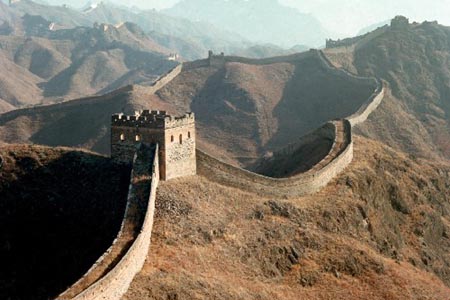 The Great Wall of China was named as
one of the new seven wonders of the world on Saturday in the Portugal’s capital
of Lisbon, July 7, 2007. Brazil’s Statue of Christ Redeemer, Peru’s Machu Picchu,
Mexico’s Chichen Itza pyramid, Jordan’s Petra, the Colosseum in Rome and India’s
Taj Mahal were also chosen as the modern-day seven wonders of the world,
according to a global vote by about 100 million Internet and telephone voters
around the world.
The Great Wall of China was named as
one of the new seven wonders of the world on Saturday in the Portugal’s capital
of Lisbon, July 7, 2007. Brazil’s Statue of Christ Redeemer, Peru’s Machu Picchu,
Mexico’s Chichen Itza pyramid, Jordan’s Petra, the Colosseum in Rome and India’s
Taj Mahal were also chosen as the modern-day seven wonders of the world,
according to a global vote by about 100 million Internet and telephone voters
around the world.
China received 21.53 million
visitors from overseas in the first five months of this year, up 10.1 percent on
the same period last year, according to the country's tourism chief. China
earned 14.8 billion U.S. dollars from the visits, up 13.1 percent, said Shao
Qiwei, head of the National Tourism Administration, at a national work
conference on tourism held on Saturday in Hohhot, capital city of north China's
Inner Mongolia Autonomous Region. China's outbound tourists numbered 16.03
million in the five-month period, up 14 percent. Shao said China planned to earn
37 billion U.S. dollars from 53.6 million visitors for the whole of 2007.
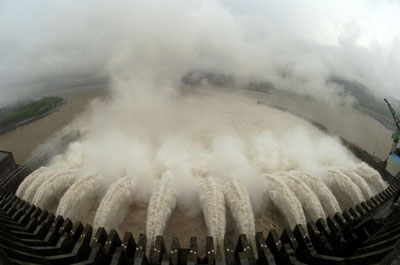 Flood water is discharged through the sluice on the
Three Gorges Dam July 9, 2007. Continuous downpour on the upper reaches of the
Yangtze River has resulted in this year's heaviest flood, with 40,500 cubic
meters of water flowing into the Three Gorges Reservior every second.
Flood water is discharged through the sluice on the
Three Gorges Dam July 9, 2007. Continuous downpour on the upper reaches of the
Yangtze River has resulted in this year's heaviest flood, with 40,500 cubic
meters of water flowing into the Three Gorges Reservior every second.
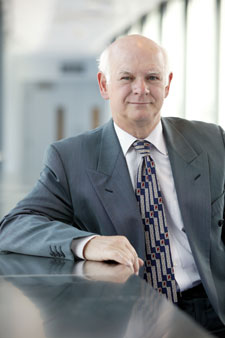 China's financial
reform has been successful in the past four years, said Sir Howard Davies in a
speech on his China tour this week. But there are remaining problems, such as a
high dependency on bank deposits and a small scale of the financial market. The
deeper the reform goes, the more difficult tasks it will face, Davies said.
Davies, director of the London School of Economics and Political Science (LSE),
and former deputy governor of Bank of England, was on a tour of Beijing this
week and made a speech on China's financial reform at the LSE alumni event on
July 2. Davies believes the country's efforts towards reforming the state
commercial banks were successful. He said the public listings by three of the
Big Four banks - the Industrial and Commercial Bank of China, Bank of China and
China Construction Bank - helped them introduce strategic investors, load off
burdens from non-performing loans (NPLs) and upgrade internal management. "The
strategy is correct," Davies said. "In the past, no one hears about Chinese
banks, (but) now they are on top of the world's largest bank list in terms of
assets and competing with first-class global banks." Davies also noted that the
deeper reform goes, the harder missions it will need to accomplish, referring to
the Agriculture Bank of China, the last of the Big Four yet to complete a
reform, with the largest nation-wide network and the highest NPL ratio. China's
securities brokers are much weaker than the banks and there is still a long way
to go in the reform, said Davies. Reshuffling by mergers and acquisitions are
under way, and the China Securities Regulatory Commission (CSRC) is stepping up
efforts in supervision of the industry. "China needs to develop its derivatives
market," Davies said. On China's heated stock market, Davies said the
regulators, especially the China Banking Regulatory Commission (CBRC) and CSRC,
need to be particularly "vigilant" on bank loans entering the stock market. They
must prevent such incidents, Davies said. Asked about how the country may curb
bubbles in the stock market, Davies said in fact there is no proven method to
control such bubbles. All countries are trying their best on a trial-and-error
basis to do so, he said. Improved regulation and supervision is needed. "You
can't legislate or control optimism, after all," Davies said. "The key is to
find out where the holdings are." China has 90 million individual investors now,
30 million of which are new investors that just opened their accounts this year.
"For the country, the most important thing is to ensure these investors are not
hurt. These new retail investors are rather 'amateur' compared with others. For
the large investors including institutions, if they lose, it's regretful. But
that's all, because they are at their own risks. But for the smaller ones, the
most urgent task is to educate to make them beware of the risks." China's financial
reform has been successful in the past four years, said Sir Howard Davies in a
speech on his China tour this week. But there are remaining problems, such as a
high dependency on bank deposits and a small scale of the financial market. The
deeper the reform goes, the more difficult tasks it will face, Davies said.
Davies, director of the London School of Economics and Political Science (LSE),
and former deputy governor of Bank of England, was on a tour of Beijing this
week and made a speech on China's financial reform at the LSE alumni event on
July 2. Davies believes the country's efforts towards reforming the state
commercial banks were successful. He said the public listings by three of the
Big Four banks - the Industrial and Commercial Bank of China, Bank of China and
China Construction Bank - helped them introduce strategic investors, load off
burdens from non-performing loans (NPLs) and upgrade internal management. "The
strategy is correct," Davies said. "In the past, no one hears about Chinese
banks, (but) now they are on top of the world's largest bank list in terms of
assets and competing with first-class global banks." Davies also noted that the
deeper reform goes, the harder missions it will need to accomplish, referring to
the Agriculture Bank of China, the last of the Big Four yet to complete a
reform, with the largest nation-wide network and the highest NPL ratio. China's
securities brokers are much weaker than the banks and there is still a long way
to go in the reform, said Davies. Reshuffling by mergers and acquisitions are
under way, and the China Securities Regulatory Commission (CSRC) is stepping up
efforts in supervision of the industry. "China needs to develop its derivatives
market," Davies said. On China's heated stock market, Davies said the
regulators, especially the China Banking Regulatory Commission (CBRC) and CSRC,
need to be particularly "vigilant" on bank loans entering the stock market. They
must prevent such incidents, Davies said. Asked about how the country may curb
bubbles in the stock market, Davies said in fact there is no proven method to
control such bubbles. All countries are trying their best on a trial-and-error
basis to do so, he said. Improved regulation and supervision is needed. "You
can't legislate or control optimism, after all," Davies said. "The key is to
find out where the holdings are." China has 90 million individual investors now,
30 million of which are new investors that just opened their accounts this year.
"For the country, the most important thing is to ensure these investors are not
hurt. These new retail investors are rather 'amateur' compared with others. For
the large investors including institutions, if they lose, it's regretful. But
that's all, because they are at their own risks. But for the smaller ones, the
most urgent task is to educate to make them beware of the risks."
The central bank is focusing on
maintaining stable prices and controlling domestic liquidity, but monetary
policy alone will not help to directly contain asset bubbles, a senior People's
Bank of China official said in comments published Sunday.
July 9, 2007
 Hong Kong:
The top Hong Kong
official based in the United States was invited to ring NASDAQ's
start-of-trading bell on Monday morning to celebrate the 10th anniversary of
Hong Kong's return to China. Margaret Fong, Hong Kong Commissioner for Economic
and Trade Affairs in the United States, said in her opening speech: "Under the
concept of 'one country, two systems', Hong Kong has continued to thrive as a
free, open and dynamic community." "Over the past 10 years, we have taken
important strides as a major financial, trading and logistics center. The market
capitalization of our stock market has risen five times to 2 trillion U.S.
dollars; our total trade in goods and services has increased by 67 percent to
740 billion dollars; our air cargo volume has doubled to 3.6 million tons and
our port cargo volume is up by 64 percent to 23.5 million TEUs." Fong lauded the
fact that Hong Kong's unwavering commitment to free trade has won it the notable
distinction as the world's freest economy. She said as Hong Kong moves into the
next decade, "we will consolidate our strengths and seek to maintain our
position as the premier financial and trading hub for the Asia-Pacific region."
NASDAQ currently has 17 listed companies from Hong Kong, worth a collective 9.6
billion dollars. Adena Friedman, executive vice president of NASDAQ, co-hosted
the market's opening ceremony. Hong Kong:
The top Hong Kong
official based in the United States was invited to ring NASDAQ's
start-of-trading bell on Monday morning to celebrate the 10th anniversary of
Hong Kong's return to China. Margaret Fong, Hong Kong Commissioner for Economic
and Trade Affairs in the United States, said in her opening speech: "Under the
concept of 'one country, two systems', Hong Kong has continued to thrive as a
free, open and dynamic community." "Over the past 10 years, we have taken
important strides as a major financial, trading and logistics center. The market
capitalization of our stock market has risen five times to 2 trillion U.S.
dollars; our total trade in goods and services has increased by 67 percent to
740 billion dollars; our air cargo volume has doubled to 3.6 million tons and
our port cargo volume is up by 64 percent to 23.5 million TEUs." Fong lauded the
fact that Hong Kong's unwavering commitment to free trade has won it the notable
distinction as the world's freest economy. She said as Hong Kong moves into the
next decade, "we will consolidate our strengths and seek to maintain our
position as the premier financial and trading hub for the Asia-Pacific region."
NASDAQ currently has 17 listed companies from Hong Kong, worth a collective 9.6
billion dollars. Adena Friedman, executive vice president of NASDAQ, co-hosted
the market's opening ceremony.
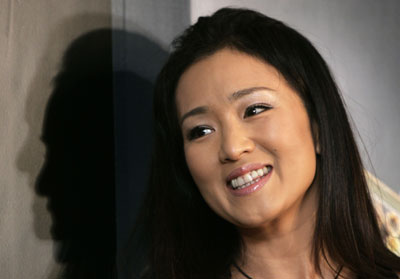 Chinese movie star Gong Li smiles during a ground
breaking ceremony of a real estate project in Hong Kong July 6, 2007.
Chinese movie star Gong Li smiles during a ground
breaking ceremony of a real estate project in Hong Kong July 6, 2007.
 Water is a cool weapon against the
summer heat. Bathing in water and staying beside water can both help cool your
body down. Even simply drinking water can also help you combat the summer heat
and help maintain the body in a nice state, both physically and mentally. So
here come some helpful suggestions on drinking water properly in the summer. Water is a cool weapon against the
summer heat. Bathing in water and staying beside water can both help cool your
body down. Even simply drinking water can also help you combat the summer heat
and help maintain the body in a nice state, both physically and mentally. So
here come some helpful suggestions on drinking water properly in the summer.
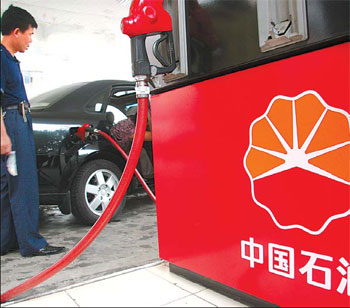 HK firms most
profitable - Wheelock and Company Ltd, a Hong Kong-based investment firm, turned
out to have the highest profit margin among the top 1,000 listed enterprises
from the mainland, Hong Kong and Taiwan, according to the latest issue of
Taiwan-based magazine Global Business. This is the first time the magazine has
released the rankings by clubbing together the mainland, Taiwan and Hong Kong.
PetroChina ranked No 1 in terms of net profit with a figure of 141 billion yuan
in 2006. But the company ranked only 462 in terms of profitability. The
Industrial and Commercial Bank of China, the largest bank on the mainland, was
ranked No 5 in terms of revenue and No 144 in terms of profit margin. Eight
mainland companies, all State-controlled, are among the top-10 largest listed
firms in terms of revenue. Nineteen of the top 20 companies with the highest
profit margin come from Hong Kong. Most of them are property developers and
financial services providers. "Hong Kong has an obvious advantage in services
industries, especially in financial services and real estate. Companies from the
mainland are far behind in terms of profitability despite their large scales,"
said Yu Guoding, director of the magazine's owner, Taiwan-based Cit'e Publishing
Holding Group. "In the long run, mainland companies should develop advantages in
various industries, not merely in energy and resources, but also in sectors such
as real estate and hi-tech," Zhao Xiao, a professor of Beijing Science and
Technology University, said. "Even the largest property developer on the
mainland now commands a market share of less than 1 percent. That explain why
they are not among the most profitable companies on the list," Zhao said.
According to the magazine's statistics, the average annual revenue growth of
Hong Kong enterprises is 36.77 percent, much higher than the 27.17 percent of
mainland companies and 19.33 percent of Taiwanese enterprises. PCCW Limited, the
largest and most comprehensive provider of communications services in Hong Kong,
ranks No 1 in terms of return on equity, followed by Taipei-listed High Tech
Computer Corp and Shanghai-listed Yunnan Chihong Zinc & Germanium Co Ltd. Hong
Kong-based Nan Hai Corp, Taiwan-based WPG Holdings, and the mainland's CITIC
Securities are the top three fastest-growing enterprises among the top 1,000. HK firms most
profitable - Wheelock and Company Ltd, a Hong Kong-based investment firm, turned
out to have the highest profit margin among the top 1,000 listed enterprises
from the mainland, Hong Kong and Taiwan, according to the latest issue of
Taiwan-based magazine Global Business. This is the first time the magazine has
released the rankings by clubbing together the mainland, Taiwan and Hong Kong.
PetroChina ranked No 1 in terms of net profit with a figure of 141 billion yuan
in 2006. But the company ranked only 462 in terms of profitability. The
Industrial and Commercial Bank of China, the largest bank on the mainland, was
ranked No 5 in terms of revenue and No 144 in terms of profit margin. Eight
mainland companies, all State-controlled, are among the top-10 largest listed
firms in terms of revenue. Nineteen of the top 20 companies with the highest
profit margin come from Hong Kong. Most of them are property developers and
financial services providers. "Hong Kong has an obvious advantage in services
industries, especially in financial services and real estate. Companies from the
mainland are far behind in terms of profitability despite their large scales,"
said Yu Guoding, director of the magazine's owner, Taiwan-based Cit'e Publishing
Holding Group. "In the long run, mainland companies should develop advantages in
various industries, not merely in energy and resources, but also in sectors such
as real estate and hi-tech," Zhao Xiao, a professor of Beijing Science and
Technology University, said. "Even the largest property developer on the
mainland now commands a market share of less than 1 percent. That explain why
they are not among the most profitable companies on the list," Zhao said.
According to the magazine's statistics, the average annual revenue growth of
Hong Kong enterprises is 36.77 percent, much higher than the 27.17 percent of
mainland companies and 19.33 percent of Taiwanese enterprises. PCCW Limited, the
largest and most comprehensive provider of communications services in Hong Kong,
ranks No 1 in terms of return on equity, followed by Taipei-listed High Tech
Computer Corp and Shanghai-listed Yunnan Chihong Zinc & Germanium Co Ltd. Hong
Kong-based Nan Hai Corp, Taiwan-based WPG Holdings, and the mainland's CITIC
Securities are the top three fastest-growing enterprises among the top 1,000.
Attacks rattle New World chief - New World Development
chairman Cheng Yu-tung said he had boosted his own personal security following a
series of attacks on shops and buildings run by his group this week. On
Thursday, a car was reversed into the entrance of the group’s headquarters in
Central and another rammed into a five-star hotel which has links to New World.
The day before, 16 mobile-phone shops run by its subsidiary were smeared with
paint. Mr Cheng said, as he arrived at his Central office on Friday, that he had
not received any threats and did not know what motives behind the attacks. “I
have never made any enemies. Police are now investigating the incidents. I
believe they will soon solve the case,” he said. The chairman of the city’s
leading property developer said his staff were assisting police in
investigations. “Of course, security has been stepped up,” the 82-year-old
billionaire added. On Friday, police stepped up patrols around all New
World-related properties, including Mr Cheng’s Repulse Bay home. Metal
barricades were placed at the entrance of the JM Marriot Hotel in Admiralty.
Security guards were deployed at New World mobile-phone outlets. The attacks
were condemned by Security for Secretary Ambrose Lee Siu-kwong. “These people
are challenging the whole community, challenging the government as well as the
police force,” he said. New World Development listed on Hong Kong’s stock
exchange in 1972 and has an asset value of more than HK$117 billion. It has
interests in property, infrastructure, services and telecommunications.
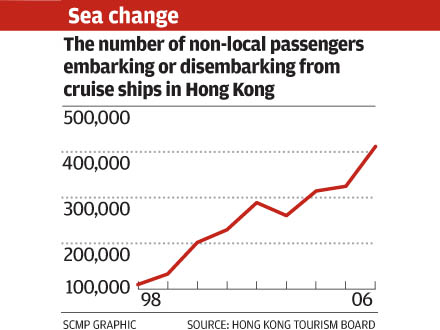 Boosting
Hongkongers' appetite for holidays at sea is the key to growth of the local
cruise business, say industry experts and the head of the newest entrant to the
market, which from next year will operate the biggest liner in Asia from the
city. To stimulate the public's interest, more operators and a greater variety
of cruise options were needed, they said. "It's very important to develop the
local market," said Adam Goldstein, president of Royal Caribbean International.
So far, much of the focus had been on building inbound passenger traffic, he
said. Residents accounted for 1.8 million of 2.15 million cruise passengers
arriving in and leaving Hong Kong in 2005. By early next year, Hong Kong will be
home to three international cruise operators and five passenger ships. Star
Cruises (SEHK: 0678) has the 1,287-passenger Star Pisces, the Wasa Queen with
room for 608 guests, and the SuperStar Aquarius, which has a passenger capacity
of 1,529. Costa Crociere's Costa Allegra can accommodate 800 passengers. Royal
Caribbean's Rhapsody of the Seas will start offering three- to five-night
itineraries from February. It can accommodate 2,000 passengers. At 78,500 tonnes,
the ship will be the largest to cruise Asia. The Queen Elizabeth 2 and the new
Queen Victoria, which will set sail in December, are also expected to visit Hong
Kong next year. How Rhapsody of the Seas performed in the next few years would
largely determine the company's ability to expand the market in Hong Kong, Mr
Goldstein said. Brandon Lau Chin-keung, S.K.Y. Travel's Hong Kong general
manager and a cruise industry veteran, agreed that local demand for cruises
needed stimulating. Adding capacity, as Royal Caribbean was doing, would help
push down prices and boost demand, he said. Still, Mr Lau said he expected
double-digit growth in cruise passengers in Hong Kong each year. Hong Kong
Tourism Board figures show there were 412,000 non-local cruise-passenger
arrivals and departures last year, about four times the number a decade ago.
Most - 71 per cent - were from the mainland. Europe was the next-biggest source
of cruise passengers, with 27,000, followed by the United States with 24,000.
Passenger numbers have been growing steadily since 1998, with the exception of
2003, when the Sars outbreak crippled global tourism. As Hong Kong upgrades its
tourism infrastructure, and the government proceeds with plans to develop a new
cruise terminal - with the aim of having the first of its two berths operational
by 2012 - more cruise operators, ships and itineraries will become available.
"The development of the cruise industry is a chicken-and-egg question,"
Polytechnic University's John Ap said. "The market is both demand-led and
supply-led. But it should be demand-led to be sustainable." Boosting
Hongkongers' appetite for holidays at sea is the key to growth of the local
cruise business, say industry experts and the head of the newest entrant to the
market, which from next year will operate the biggest liner in Asia from the
city. To stimulate the public's interest, more operators and a greater variety
of cruise options were needed, they said. "It's very important to develop the
local market," said Adam Goldstein, president of Royal Caribbean International.
So far, much of the focus had been on building inbound passenger traffic, he
said. Residents accounted for 1.8 million of 2.15 million cruise passengers
arriving in and leaving Hong Kong in 2005. By early next year, Hong Kong will be
home to three international cruise operators and five passenger ships. Star
Cruises (SEHK: 0678) has the 1,287-passenger Star Pisces, the Wasa Queen with
room for 608 guests, and the SuperStar Aquarius, which has a passenger capacity
of 1,529. Costa Crociere's Costa Allegra can accommodate 800 passengers. Royal
Caribbean's Rhapsody of the Seas will start offering three- to five-night
itineraries from February. It can accommodate 2,000 passengers. At 78,500 tonnes,
the ship will be the largest to cruise Asia. The Queen Elizabeth 2 and the new
Queen Victoria, which will set sail in December, are also expected to visit Hong
Kong next year. How Rhapsody of the Seas performed in the next few years would
largely determine the company's ability to expand the market in Hong Kong, Mr
Goldstein said. Brandon Lau Chin-keung, S.K.Y. Travel's Hong Kong general
manager and a cruise industry veteran, agreed that local demand for cruises
needed stimulating. Adding capacity, as Royal Caribbean was doing, would help
push down prices and boost demand, he said. Still, Mr Lau said he expected
double-digit growth in cruise passengers in Hong Kong each year. Hong Kong
Tourism Board figures show there were 412,000 non-local cruise-passenger
arrivals and departures last year, about four times the number a decade ago.
Most - 71 per cent - were from the mainland. Europe was the next-biggest source
of cruise passengers, with 27,000, followed by the United States with 24,000.
Passenger numbers have been growing steadily since 1998, with the exception of
2003, when the Sars outbreak crippled global tourism. As Hong Kong upgrades its
tourism infrastructure, and the government proceeds with plans to develop a new
cruise terminal - with the aim of having the first of its two berths operational
by 2012 - more cruise operators, ships and itineraries will become available.
"The development of the cruise industry is a chicken-and-egg question,"
Polytechnic University's John Ap said. "The market is both demand-led and
supply-led. But it should be demand-led to be sustainable."
In its latest move to save energy, Kowloon Hospital
yesterday unveiled a solar panel system that can produce enough electricity to
power the equivalent of 300 fluorescent light bulbs. The HK$900,000 system
comprises 50 solar photovoltaic panels that have been installed on the roof of
the hospital's rehabilitation building. The system was switched on yesterday,
making Kowloon Hospital the first public hospital to install solar power. Some
fire stations and government offices have already installed solar panels. At
yesterday's switching-on ceremony, the chief executive, Derrick Au Kit-sing,
said the hospital had a responsibility to protect the environment as well as
provide quality medical care. The use of solar panels would allow the hospital
"to change from a relatively passive mode of energy-saving to a more proactive
role of collecting and using solar energy", he said. The hospital admitted its
savings on electricity bills would not be significant. "For a hospital serving
more than 1,000 beds, the solar photovoltaic panels can only supply a limited
amount of electricity, yet this signifies a step forward in building a `green
hospital'," Dr Au said. The solar project was jointly implemented with CLP Power
(SEHK: 0002), which supplies electricity to the hospital. The solar energy will
be saved in a battery, which will be connected to the CLP cable. The hospital
has taken many energy-saving steps over the years. They include setting its air
conditioners to between 23 degrees Celsius and 25.5 degrees, reducing the number
of light fittings in corridors and temporarily suspending the use of some lifts,
a spokeswoman said.
 China:
Two mega-kilowatt
"ultra-supercritical" thermal power generators went into official operation in
east China's Shandong Province on Thursday. Severe pollution created by its
coal-fired power plants has pressed the Chinese government to adopt the new
technology to increase the efficiency of coal burning by reducing emissions and
conserving energy. "Ultra-supercritical" generators use coal-fired boilers to
heat water so that it evaporates, building up steam pressure to a very high
level to maximize power-generating efficiency. Over 70 percent of the equipment
used in the new generating units was developed by China, according to China
Huadian Corp, one of the nation's biggest power giants. The company said the
units performed well during their 168-hour trial operation in Zouxian Power
Plant in Shandong's Zoucheng city, consuming 270 grams of coal per
kilowatt-hour, 70 grams lower than the national average and each capable of
saving 990,000 tons of coal annually. Statistics from the National Development
and Reform Commission show that China has a total installed capacity of 650
million kilowatts, 80 percent of which is generated by thermal power. The
ultra-supercritical thermal power generation is expected to save China 200
million tons of coal and reduce carbon dioxide emissions by 540 million tons a
year. A further 34 sets of ultra-supercritical thermal power generating units
are under construction in the country.
China:
Two mega-kilowatt
"ultra-supercritical" thermal power generators went into official operation in
east China's Shandong Province on Thursday. Severe pollution created by its
coal-fired power plants has pressed the Chinese government to adopt the new
technology to increase the efficiency of coal burning by reducing emissions and
conserving energy. "Ultra-supercritical" generators use coal-fired boilers to
heat water so that it evaporates, building up steam pressure to a very high
level to maximize power-generating efficiency. Over 70 percent of the equipment
used in the new generating units was developed by China, according to China
Huadian Corp, one of the nation's biggest power giants. The company said the
units performed well during their 168-hour trial operation in Zouxian Power
Plant in Shandong's Zoucheng city, consuming 270 grams of coal per
kilowatt-hour, 70 grams lower than the national average and each capable of
saving 990,000 tons of coal annually. Statistics from the National Development
and Reform Commission show that China has a total installed capacity of 650
million kilowatts, 80 percent of which is generated by thermal power. The
ultra-supercritical thermal power generation is expected to save China 200
million tons of coal and reduce carbon dioxide emissions by 540 million tons a
year. A further 34 sets of ultra-supercritical thermal power generating units
are under construction in the country.
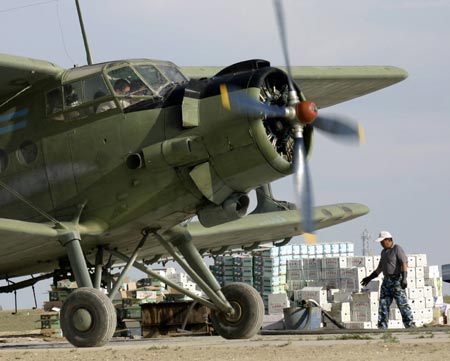 A plane prepares to take off during a mission to spray pesticide to eliminate
mosquito in Beitun District, Northwest China’s Xinjiang Uygur Autonomous Region,
July 5, 2007. Beitun District is located near IrtySh River, a major
mosquito-breeding area in summer.
A plane prepares to take off during a mission to spray pesticide to eliminate
mosquito in Beitun District, Northwest China’s Xinjiang Uygur Autonomous Region,
July 5, 2007. Beitun District is located near IrtySh River, a major
mosquito-breeding area in summer.
All buses and taxis will be LPG-fueled in this southern
city by 2010. "Guangzhou will host the 2010 Asian Games, promoting clean energy
for public vehicles is part of the city's strategy to improve the environment
and to usher in the grand sports event," Xian Weixiong, director of Guangzhou
communications commission, said. He said 85 percent of the city's buses and
taxis, 6,500 and 16,000 respectively, have already converted to LPG. The city
now has the most LPG-fueled vehicles in the world. When the conversion is
completed, it will cut Guangzhou's annual diesel and gasoline consumption by
471,000 tons. Consumption is 2.50 million tons at present. The city will also
continue to find technological ways to lowering the LPG consumption of public
vehicles, Xian said. Guangzhou's target of LPG consumption per 100 km is 62
liters for buses and 12 liters for taxis by the year 2010. Statistics show the
city's buses used 65 liters of LPG per 100 km last year, compared to 83 liters
in 2003. Taxis used 13.2 liters of LPG per 100 km compared to 16.6 liters for
the same period. Total LPG consumption for buses last year was 29.21 million
liters less than 2005, a saving of 100 million yuan ($13.16 million). "Extensive
use of clean energy such as LPG and efforts to lower energy consumption for
public vehicles can only be beneficial to the population and the city," Yang
Weiqiang, an environmental protection researcher with the Guangzhou Academy of
Social Sciences, said. Yang said Guangzhou will be able to cut the emission of
carbon monoxide by 22,000 tons; hydrocarbon, 2,430 tons; nitrogen oxides, 1,779
tons; and particulate matters, 417 tons, when all its buses and taxis become
LPG-fueled.
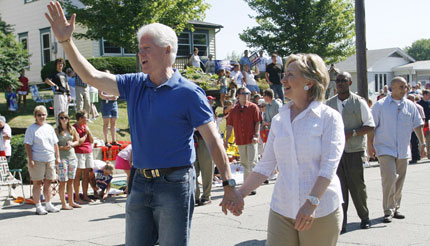 Democratic Presidential candidate
and US Senator Hillary Clinton (D-NY) and her husband, former US President Bill
Clinton, greets supporters during the 4th of July parade in Clear Lake, Iowa,
July 4, 2007. Clinton: Don't fear or ignore a stronger China - WASHINGTON -
Senator Hillary Clinton, a leading Democratic contender for the US presidency,
has called for frank dialogue with China on issues ranging from trade to
currency to human rights and the environment. She believes the next US president
will be forced to face a dramatically empowered China. "We should neither fear a
stronger China nor ignore it. That means engagement and understanding, but also
frank dialogue on issues ranging from trade to currency manipulation to human
rights abuses and the environment," she said in a speech last month at the
Center for a New American Security. Clinton of New York, together with another
Democratic front-runner in the November 2008 presidential race, Senator Barack
Obama of Illinois, have joined a congressional push to punish countries that
undervalue their currencies as legislators seek to turn up the heat over China's
currency. They signed on last week as co-sponsors of bipartisan legislation that
was unveiled on June 13, Senate aides said. The bill's sponsors include Senate
Finance Committee Chairman Max Baucus, a Montana Democrat, and the ranking
Republican, Iowa's Charles Grassley. It would force expedited action against
nations seen as manipulating their currency, such as exclusion from some
contracts and a fast track for new challenges at the World Trade Organization
court. While the proposed measures would apply to any country, the lawmakers
have set their sights on China. Members of Congress say the Bush administration
is doing too little to pressure Beijing to revalue the yuan, which some believe
it undervalues by up to 40 percent to make its exports more competitive. "China
has manipulated its currency for years in order to gain an unfair advantage over
the United States in trade. Unfortunately, the Administration has failed to
effectively challenge or change China's behavior," Obama told Treasury Secretary
Henry Paulson in a letter last month. Clinton, meanwhile, believes the next
president will be forced to face a dramatically empowered China.
Democratic Presidential candidate
and US Senator Hillary Clinton (D-NY) and her husband, former US President Bill
Clinton, greets supporters during the 4th of July parade in Clear Lake, Iowa,
July 4, 2007. Clinton: Don't fear or ignore a stronger China - WASHINGTON -
Senator Hillary Clinton, a leading Democratic contender for the US presidency,
has called for frank dialogue with China on issues ranging from trade to
currency to human rights and the environment. She believes the next US president
will be forced to face a dramatically empowered China. "We should neither fear a
stronger China nor ignore it. That means engagement and understanding, but also
frank dialogue on issues ranging from trade to currency manipulation to human
rights abuses and the environment," she said in a speech last month at the
Center for a New American Security. Clinton of New York, together with another
Democratic front-runner in the November 2008 presidential race, Senator Barack
Obama of Illinois, have joined a congressional push to punish countries that
undervalue their currencies as legislators seek to turn up the heat over China's
currency. They signed on last week as co-sponsors of bipartisan legislation that
was unveiled on June 13, Senate aides said. The bill's sponsors include Senate
Finance Committee Chairman Max Baucus, a Montana Democrat, and the ranking
Republican, Iowa's Charles Grassley. It would force expedited action against
nations seen as manipulating their currency, such as exclusion from some
contracts and a fast track for new challenges at the World Trade Organization
court. While the proposed measures would apply to any country, the lawmakers
have set their sights on China. Members of Congress say the Bush administration
is doing too little to pressure Beijing to revalue the yuan, which some believe
it undervalues by up to 40 percent to make its exports more competitive. "China
has manipulated its currency for years in order to gain an unfair advantage over
the United States in trade. Unfortunately, the Administration has failed to
effectively challenge or change China's behavior," Obama told Treasury Secretary
Henry Paulson in a letter last month. Clinton, meanwhile, believes the next
president will be forced to face a dramatically empowered China.
A Web TV service run jointly by
Shanghai Media Group (SMG) and China’s largest fixed-line company, China
Telecom, is expected to reach around 1 million households by year-end, a senior
executive said on Thursday.
July 7- 8, 2007
 Hong Kong:
The Legislative
Council's financial affairs panel voiced concerns Thursday that a substantial
number of retail investors are not prepared for the new electronic disclosure
system introduced by Hong Kong Exchanges and Clearing (0388). Hong Kong:
The Legislative
Council's financial affairs panel voiced concerns Thursday that a substantial
number of retail investors are not prepared for the new electronic disclosure
system introduced by Hong Kong Exchanges and Clearing (0388).
China's bond market has promising
potential for development, but the prospects for Hong Kong's bond market remain
in doubt, financial experts attending the Asia Pacific Capital Markets Congress
said Thursday.
Perpetrators have stepped up
attacks on properties of the New World Group, prompting the government's
security chief to denounce them as a direct challenge to the authority of the
government, the police and the people of Hong Kong.
Hong Kong University has lost out
to Peking University in the race to land the top performer in the national
college entrance examination despite offering her a HK$560,000 scholarship.
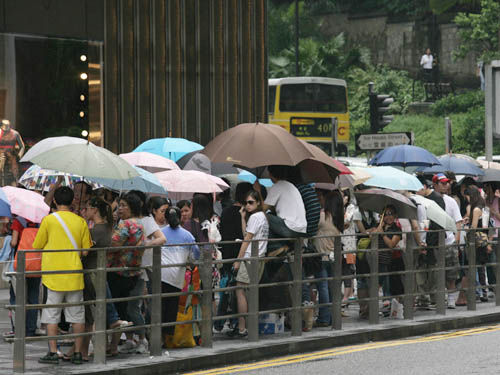 "Green"
shoppers went crazy yesterday, with hundreds queuing through the afternoon and
night to buy the latest designer item to hit town, the "I'm Not a Plastic Bag"
bag, which goes on sale today. The canvas bags, by London designer Anya
Hindmarch, sold out last month when launched in Britain and the US at £5 (HK$80)
and US$15 each, and buyers are keen not to miss out when it goes on sale here.
They are being sold in Hong Kong for HK$120, but the same bags with different
colored lettering have been sold for 10 times this amount on auction websites.
Despite yesterday's rain, shopper Cheung Kong (SEHK: 0001)-wing arrived at the
upmarket food mart ThreeSixty in the Landmark centre, one of five shops selling
the bag, at 10am. The other outlets are Anya Hindmarch's shops at Ocean
Terminal, IFC, Harvey Nichols and Lee Gardens. "I'm here for the bags, one for
my wife and one for my sister," he said. Mr Cheung did not want to be
photographed as he had taken a day off work to join the queue. Some shoppers
were angry at having to queue as they had signed up to buy the bags. "The
security guards explained that the registration was to avoid people cutting into
the queues, but it doesn't make sense that after registering we still need to be
here," said shopper Sindy Yeung. Ms Yeung had planned to buy the bag today but
when she saw buyers had begun queueing at the ThreeSixty in Central, she got in
line. "It's absolutely uncivilised to make us all wait here on the street like
that," she said. "They can't treat us like trash. I'm an Anya VIP customer but I
was not in town when they sent me a VIP pre-order, that's why I'm here."
ThreeSixty's management asked people in the queue to register to buy the bag and
closed the queue after about 180 people had joined, but more joined throughout
the night. "Green"
shoppers went crazy yesterday, with hundreds queuing through the afternoon and
night to buy the latest designer item to hit town, the "I'm Not a Plastic Bag"
bag, which goes on sale today. The canvas bags, by London designer Anya
Hindmarch, sold out last month when launched in Britain and the US at £5 (HK$80)
and US$15 each, and buyers are keen not to miss out when it goes on sale here.
They are being sold in Hong Kong for HK$120, but the same bags with different
colored lettering have been sold for 10 times this amount on auction websites.
Despite yesterday's rain, shopper Cheung Kong (SEHK: 0001)-wing arrived at the
upmarket food mart ThreeSixty in the Landmark centre, one of five shops selling
the bag, at 10am. The other outlets are Anya Hindmarch's shops at Ocean
Terminal, IFC, Harvey Nichols and Lee Gardens. "I'm here for the bags, one for
my wife and one for my sister," he said. Mr Cheung did not want to be
photographed as he had taken a day off work to join the queue. Some shoppers
were angry at having to queue as they had signed up to buy the bags. "The
security guards explained that the registration was to avoid people cutting into
the queues, but it doesn't make sense that after registering we still need to be
here," said shopper Sindy Yeung. Ms Yeung had planned to buy the bag today but
when she saw buyers had begun queueing at the ThreeSixty in Central, she got in
line. "It's absolutely uncivilised to make us all wait here on the street like
that," she said. "They can't treat us like trash. I'm an Anya VIP customer but I
was not in town when they sent me a VIP pre-order, that's why I'm here."
ThreeSixty's management asked people in the queue to register to buy the bag and
closed the queue after about 180 people had joined, but more joined throughout
the night.
A senior fire services officer yesterday was fined
HK$600,000 for misconduct. Hong Kong East divisional commander Tung Tung-san,
48, had been in charge of implementing a US$56 million technology project for
the Fire Services Department. Deputy District Court Judge David Thomas said Tung
had not performed his civil duty to avoid potential conflicts of interest when
arranging matters pertaining to the contract. The judge also said he had not
declared his relationship with his sister and daughter because he knew there
would clearly be a conflict interest. Tung was convicted on two out of four
counts of misconduct in public office. Two counts were dismissed on Wednesday.
He was found guilty of failing to disclose his sibling relationship with Ronny
Tung Mei-yi when he hired her public relations company, MediAdvertising (HK), to
organize a contract-signing ceremony at Felix Restaurant at The Peninsula hotel
to mark the launch of a technology upgrade. The event cost HK$487,264. Tung was
also convicted of failing to disclose that his daughter, Karen Tung Hoi-ka,
worked at Singapore Engineering Software (SES), which worked on the technology
project, in the summer of 2004.
 China:
China''s trade surplus will top 100
billion U.S. dollars in the first half of the year, up 60 percent on the same
period of last year, an analyst with the General Administration of Customs told
Xinhua. Huang Guohua, a senior statistical analyst with the administration,
predicted that the June trade volume and trade surplus figures would exceed May
because of a surge in exports spurred by the latest tax policy change. Huang
said the total exports and imports in the first half would be close to one
trillion U.S. dollars. Manufacturers have been rushing to export as much as
possible before the deadline after the government announced on June 19 it would
cut or eliminate export tax rebates for 2,831 commodities starting July 1. The
new policy, which covers more than a third of the total number of items listed
on customs tax regulations, was seen as the toughest measure so far to combat
overheated export growth and ease frictions between China and its trade
partners. The latest export-tightening move -- which imposed extra export
tariffs and cut import duties as of June 1 -- has created an export boom and
lifted May''s trade surplus by 22.45 billion U.S. dollars, up 73 percent on the
corresponding period of last year.
China:
China''s trade surplus will top 100
billion U.S. dollars in the first half of the year, up 60 percent on the same
period of last year, an analyst with the General Administration of Customs told
Xinhua. Huang Guohua, a senior statistical analyst with the administration,
predicted that the June trade volume and trade surplus figures would exceed May
because of a surge in exports spurred by the latest tax policy change. Huang
said the total exports and imports in the first half would be close to one
trillion U.S. dollars. Manufacturers have been rushing to export as much as
possible before the deadline after the government announced on June 19 it would
cut or eliminate export tax rebates for 2,831 commodities starting July 1. The
new policy, which covers more than a third of the total number of items listed
on customs tax regulations, was seen as the toughest measure so far to combat
overheated export growth and ease frictions between China and its trade
partners. The latest export-tightening move -- which imposed extra export
tariffs and cut import duties as of June 1 -- has created an export boom and
lifted May''s trade surplus by 22.45 billion U.S. dollars, up 73 percent on the
corresponding period of last year.
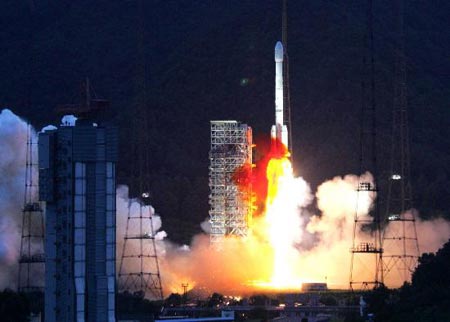 "Chinasat 6B", a
French-made communications satellite, rocketed into space from Xichang Satellite
Launch Center in southwest China's Sichuan Province on Thursday. The satellite
was lifted by a Chinese Long March-3B carrier rocket which blasted off at 8:08
p.m. (Beijing Time) Thursday. It was the 101st launch mission for the Long March
series of carrier rockets. The satellite separated from the rocket 26 minutes
after lift-off, entering its preset orbit. "Chinasat 6B", manufactured by
France's Alcatel Alenia Space, has a designed lifespan of 15 years. Fitted with
38 transponders, the satellite is expected to improve telecommunications
transmission for Asia, the Pacific and Oceania. China on June 1 launched
"SinoSat-3", a communications satellite for radio and television broadcasting,
with a Long March-3A carrier rocket, the 100th flight of the Long March series. "Chinasat 6B", a
French-made communications satellite, rocketed into space from Xichang Satellite
Launch Center in southwest China's Sichuan Province on Thursday. The satellite
was lifted by a Chinese Long March-3B carrier rocket which blasted off at 8:08
p.m. (Beijing Time) Thursday. It was the 101st launch mission for the Long March
series of carrier rockets. The satellite separated from the rocket 26 minutes
after lift-off, entering its preset orbit. "Chinasat 6B", manufactured by
France's Alcatel Alenia Space, has a designed lifespan of 15 years. Fitted with
38 transponders, the satellite is expected to improve telecommunications
transmission for Asia, the Pacific and Oceania. China on June 1 launched
"SinoSat-3", a communications satellite for radio and television broadcasting,
with a Long March-3A carrier rocket, the 100th flight of the Long March series.
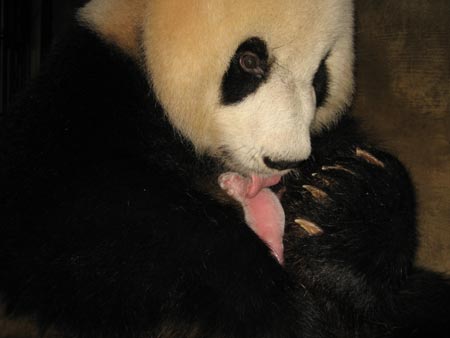 Eight-year-old panda Shu Qing gave staff at the Research Base for Giant Panda
Breeding in Chengdu a pleasant surprise - she gave birth to twins. It brought
the total number of pandas at the base to 62. At 12:59 pm yesterday, Shu Qing,
who had been pregnant for 122 days, gave birth to a male cub 11 cm long and
weighing 146.5 g. At 18:26 pm, she gave birth to a female panda of the same
size, but weighing 129 g.
Eight-year-old panda Shu Qing gave staff at the Research Base for Giant Panda
Breeding in Chengdu a pleasant surprise - she gave birth to twins. It brought
the total number of pandas at the base to 62. At 12:59 pm yesterday, Shu Qing,
who had been pregnant for 122 days, gave birth to a male cub 11 cm long and
weighing 146.5 g. At 18:26 pm, she gave birth to a female panda of the same
size, but weighing 129 g.
 Houston Rockets
star Yao Ming(L), "Diving Queen" Guo Jingjing(R), top table tennis player Wang
Liqin,second right,and volleyball player Zhao Ruirui attend Beijing 2008 Olympic
torchbearers selection promotion sponsored by Coca Cola July 3rd in Beijing.
Houston Rockets
star Yao Ming(L), "Diving Queen" Guo Jingjing(R), top table tennis player Wang
Liqin,second right,and volleyball player Zhao Ruirui attend Beijing 2008 Olympic
torchbearers selection promotion sponsored by Coca Cola July 3rd in Beijing.
Single-child
families in booming Guangzhou are being encouraged to have a second child to
counter the social and economic problems of a rapidly aging population, state
media said Thursday.
Birthday
revelers and high school students celebrating the end of exams were among 25
people killed in a thunderous explosion that destroyed a karaoke bar in
northeast China, state media and witnesses said Thursday.
July 6, 2007
 Hong Kong:
Moving on track for the
proposed restructuring of New Delhi Railway Station into a world-class facility,
the Indian Railway Ministry has awarded the contract for preparing the
masterplan and feasibility report to Hong Kong-based British firm Terry Farrells
and Partners, national daily, The Indian Express, reported here Thursday. The
move comes roughly a fortnight after the Prime Minister's Committee on
Infrastructure (CoI) approved the modernization plan, which envisages the
creation of a world-class railway station ahead of 2010 Commonwealth Games.
Among firms in the fray were Hok International Ltd and Aedas Ltd (from Hong
Kong), Arip Ville (France), Von Gerkan Marg and Partners (Germany) and the
Railways'own RITES. Terry Farrells and Partners has earlier worked on Hong
Kong's Kowloon station, London's South Kensington station, Sydney's Parramatta
rail link and an integrated transportation center at Korea's Incheon airport
among others. The firm is now expected to draw up an urban design that ensures
improved passenger services, superior train operation and maintenance
facilities, new community space for the public, better mobility for road
transport, modern office space and high quality residential accommodation for
railway staff at selected stations. Hong Kong:
Moving on track for the
proposed restructuring of New Delhi Railway Station into a world-class facility,
the Indian Railway Ministry has awarded the contract for preparing the
masterplan and feasibility report to Hong Kong-based British firm Terry Farrells
and Partners, national daily, The Indian Express, reported here Thursday. The
move comes roughly a fortnight after the Prime Minister's Committee on
Infrastructure (CoI) approved the modernization plan, which envisages the
creation of a world-class railway station ahead of 2010 Commonwealth Games.
Among firms in the fray were Hok International Ltd and Aedas Ltd (from Hong
Kong), Arip Ville (France), Von Gerkan Marg and Partners (Germany) and the
Railways'own RITES. Terry Farrells and Partners has earlier worked on Hong
Kong's Kowloon station, London's South Kensington station, Sydney's Parramatta
rail link and an integrated transportation center at Korea's Incheon airport
among others. The firm is now expected to draw up an urban design that ensures
improved passenger services, superior train operation and maintenance
facilities, new community space for the public, better mobility for road
transport, modern office space and high quality residential accommodation for
railway staff at selected stations.
The gross revenues of Macao's 26
casinos saw a year-on-year rise of 47.2 percent in the first half of the year,
local media reported Thursday. The Macao Post Daily quoted government sources as
saying that however, the gaming receipts in June dropped 23 percent over May.
Some local analysts due the month-to-month receipts decrease to "the less
flexible" granting of individual travel permits by the Chinese mainland
authorities. The mainland authorities recently tightened the travel
authorization in an effort to fight illegal labor and the influx of illegal
capital. Many vex that the tightening will affect Macao 's gaming profit as
well. Some argue that June was "a traditionally weak month" for the gaming
industry, as the casino's gross receipts month-to-month dropped 9.5 percent in
June last year.
Green paper ‘will address universal
suffrage concerns’ - The issue of a universal suffrage time table would not be
swept aside in the government’s soon-to-published green paper on universal
suffrage, Chief Executive Donald Tsang Yam-kuen said on Thursday. But he doubted
if the Legislative Council would endorse its implementation in 2012. The chief
executive was speaking in his first question-and-answer session since he had
been sworn in for a new five-year term on Sunday. In a brief opening speech, Mr
Tsang said his administration would govern with professionalism, pragmatism and
commitment. He pledged to go beyond mere consultation to engage the public in
policy formulation. "Government officials should ‘go into the mass’. The
community should also collect views and reflect to the Government in a
systematic manner,” he said.Mr Tsang also said any future model of universal
suffrage adopted in Hong Kong would be internationally acceptable. The chief
executive said the public would have an opportunity to fully participate in
universal suffrage when it was introduced. He told Legco he did not want to
argue about the final points of it at present. Frontier legislator Lee Cheuk-yan
said government should have an in-depth consultation on the matter. Mr Tsang has
promised to resolve the issue of universal suffrage by 2012. He was re-elected
as chief executive on March 25 for a further five years - his new term started
on July 1. On July 1, tens of thousands of Hongkongers took to the streets
demanding full democracy. Prominent marchers leading the protest were Cardinal
Joseph Zen Ze-kiun, veteran Democrat Martin Lee Chu-ming and Next Media (SEHK:
0282) chairman and Apple Daily founder Jimmy Lai Chee-ying. Former chief
secretary Anson Chan Fang On-sang also participated.
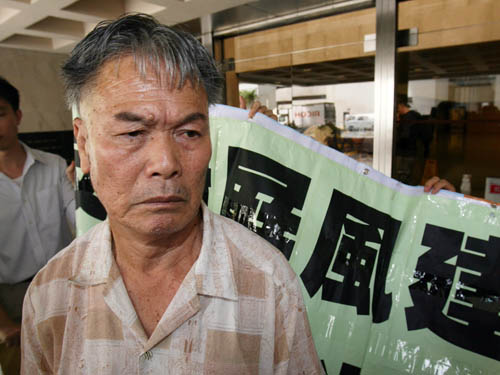 Residents in West Kowloon say they will continue to fight against the erection
of a massive, wall-like building on the waterfront, even though their
application for a judicial review was dismissed yesterday. Mr Justice Anselmo
Reyes in the Court of First Instance dismissed an application by pensioner Ng
Ngau-chai to review a decision by the Town Planning Board and the Planning
Department to zone a parcel of waterfront land in Tai Kok Tsui as residential
with no height restriction. Commenting after the judgment was read to Mr Ng, Au
Yeung Chi-shing, a resident of the area and a member of the Harbourview Planning
and Environmental Concern Group, said the case had been a first test for the
movement to stop wall-like developments.
Residents in West Kowloon say they will continue to fight against the erection
of a massive, wall-like building on the waterfront, even though their
application for a judicial review was dismissed yesterday. Mr Justice Anselmo
Reyes in the Court of First Instance dismissed an application by pensioner Ng
Ngau-chai to review a decision by the Town Planning Board and the Planning
Department to zone a parcel of waterfront land in Tai Kok Tsui as residential
with no height restriction. Commenting after the judgment was read to Mr Ng, Au
Yeung Chi-shing, a resident of the area and a member of the Harbourview Planning
and Environmental Concern Group, said the case had been a first test for the
movement to stop wall-like developments.
 China:
China will continue to improve the
yuan exchange rate formation mechanism in a self-initiated, controllable and
gradual way, a joint statement from the third EU-China Economic and Financial
Dialogue said on Wednesday. Wrapping up its one-day meeting with the European
Union (EU), China said in the statement that in view of the current economic
situation, the Chinese government will continue to implement appropriate
macroeconomic policies including a prudent fiscal policy as well as a prudent
and moderately tight monetary policy, deepening structural reforms and speeding
up the transformation of economic growth patterns so as to maintain sustainable
growth momentum. Both EU and Chinese participants expressed positive views about
the world economy.
China:
China will continue to improve the
yuan exchange rate formation mechanism in a self-initiated, controllable and
gradual way, a joint statement from the third EU-China Economic and Financial
Dialogue said on Wednesday. Wrapping up its one-day meeting with the European
Union (EU), China said in the statement that in view of the current economic
situation, the Chinese government will continue to implement appropriate
macroeconomic policies including a prudent fiscal policy as well as a prudent
and moderately tight monetary policy, deepening structural reforms and speeding
up the transformation of economic growth patterns so as to maintain sustainable
growth momentum. Both EU and Chinese participants expressed positive views about
the world economy.
Chinese beverage giant Wahaha Group
on Tuesday confirmed its plan to sue three executives of Danone, Wahaha''s
French joint venture partner. "If Danone do not sue the three directors, Wahaha
will do it," said Liu Xiangwen, lawyer of Wahaha, at a press conference in
Hangzhou, capital of east China''s Zhejiang Province. Zong Qinghou, chairman of
Wahaha Group, said he would sue for atotal of one million yuan (131,000 U.S.
dollars). Emmanuel Faber, who recently replaced Zong Qinghou as chief of Danone
and Wahaha''s 39 joint ventures, Qin Pang, China director for Danone Asia and
Francois Caquelin, a financial director, are the targets of Wahaha''s lawsuits.
Liu claimed that the three men were hired by more than 20 counterpart firms of
Wahaha-Danone and carried out a series of investment, marketing and management
projects for the firms, whichare competitors of the joint-venture in the
beverage industry. "Their employment in these competitive companies is against
China''s corporate law ... and their actions have damaged the interests of the
joint ventures and the interest of Wahaha''s shareholders," Liu said. Danone''s
purchase of three drinks companies - Robust, Shenzhen Yili and Shanghai
Jianguanghe - also violated Danone and Wahaha''s non-competition agreements, the
lawyer added.
China is the most attractive
destination for foreign investment, according to a survey conducted by leading
global professional services firm Ernst & Young. Between February and March
2007, the survey asked 809 managers from various industries in European,
American and Asian firms about their investment preferences. Almost half - 48
percent - of international investors cited China as one of their top three
preferred business locations in 2007, up from 41 percent in the 2006 survey.
They said they were drawn to China for its low labor costs, more competitive
rates and higher productivity. The country's infrastructure, quality of research
and development, workforce education and political stability were cited as major
advantages. However, the survey revealed that China, while topping the rankings
for its favorable labor costs, still lags behind in quality of workforce - only
4 percent of those surveyed said it is the most attractive country in terms of
labor skills. In addition, only 4 percent of respondents said China is the most
attractive economy in terms of R&D availability and quality, as opposed to 43
percent for Europe and 27 percent for North America. The survey ranked
investment preferences on the basis of market and access, labor and
productivity, fiscal, legal, environmental and regional issues. The United
States was found to be the second-most attractive country, finding favor with 33
percent of the respondents. India's popularity appears to be increasing fast.
While 11 percent of investors cited it among their top three preferences in
2004, it has risen to 26 percent in 2007. Aside from India and China, the other
two "BRIC" countries of Brazil and Russia feature much less prominently in terms
of investor interest. Despite Russia's abundant energy supplies, internal
political uncertainties seem to deter investors. Similarly for Brazil, the
considerable efforts by the government to secure macroeconomic stability have
failed to convince corporate decision-makers.
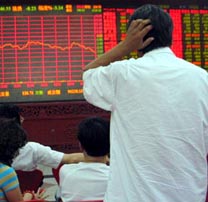 Chinese stocks nosedived five
percent on Thursday as more investors stayed away from the market, which has
been highly volatile in the past month.
Chinese stocks nosedived five
percent on Thursday as more investors stayed away from the market, which has
been highly volatile in the past month.
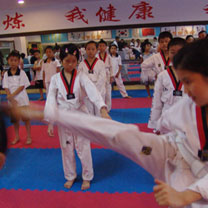 A girl splits as other children look on during a during a taekwondo
training class in Yongchuan, Southwest China's Chongqing Municipality July 5,
2007. Students rushed to martial arts or taekwondo classes to keep fit during
their summer vacation.
A girl splits as other children look on during a during a taekwondo
training class in Yongchuan, Southwest China's Chongqing Municipality July 5,
2007. Students rushed to martial arts or taekwondo classes to keep fit during
their summer vacation.
The first Made-in-China Chrysler
cars, built by local partner Chery Automobile Co., could reach the United States
or Europe within 30 months, as Chinese rivals race to penetrate the big auto
markets.
A trial management measure on
qualified domestic institutional investors' (QDII) overseas investment in
securities took effect today, China Securities News reported. Regulators will
start receiving and approving new QDII investment schemes from domestic fund
management companies and securities companies as of today. Currently, QDII
investment products are difficult to sell because they are less attractive than
funds, which performed better in the first half of this year. Statistics show
that from January to June this year, the average net worth of equity funds and
index funds increased by more than 60 percent, far higher than the returns on
some investment products under the QDII scheme. More investors still believe the
bullish stock market will continue and they are not very willing to invest in
overseas markets, with exchange rate risks that must be taken into account.
Insiders said that although some fund companies want to dive into the QDII
business, there may not be a massive launch of QDII products in the near future
due to risks of overseas markets being uncontrollable and most fund companies
having no experience in overseas markets. Currently, QDIIs are allowed to invest
in stocks, options, mutual funds and derivatives in markets whose regulators
have signed memorandums of understanding with the China Securities Regulatory
Commission. It's helpful to dilute risks by investing money in these markets and
products with little association with the A-share market, insiders said.
July 5, 2007
 Hong Kong:
Hong Kong's success over
the past10 years shows that Hong Kong people are fully capable of managing Hong
Kong well and sustaining its growth, said Chinese President Hu Jintao on Sunday.
At the gathering marking the 10th anniversary of Hong Kong's return to China and
the inauguration of the third-term government of the Hong Kong Special
Administrative Region (HKSAR), Hu said that during the past decade, Hong Kong
has maintained its capitalist system and way of life and fully exercised
executive, legislative and independent judicial power, including the power
official adjudication as mandated by the Basic Law. The people of Hong Kong have
enjoyed extensive democratic rights and freedom. The principles of "Hong Kong
people administering Hong Kong" and a high degree of autonomy have been turned
into a living reality, Hu said. During the past decade, the two chief
executives, Tung Chee Hwa and Donald Tsang, with the full support of the central
government and the mainland, led the HKSAR government and people in meeting such
grave challenges as the Asian financial crisis and severe acute respiratory
syndrome (SARS), Hu said. "They upheld the overall stability of Hong Kong,
revitalized Hong Kong's economy, and Hong Kong has made great progress in all
fields of endeavors," said Hu. Hong Kong's exchanges and cooperation and
particularly its business ties with the mainland have grown increasingly closer.
With stronger support from the mainland, Hong Kong serves as an important window
and bridge for China's economic, scientific, technological and cultural
exchanges with the rest of the world, Hu said. "Through their dedicated efforts,
the people in Hong Kong have both promoted the development of Hong Kong and
contributed their share to China's modernization drive," Hu said. Hong Kong has
steadily expanded its relations with other parts of the world. It has remained a
free port and an international financial, trade and shipping center, said the
president. Hong Kong has been consistently rated as the most open and free economy and one of the most dynamic regions with the best business environment in
the world. "Hong Kong, an international metropolis is thriving as never before,"
Hu added. Hong Kong:
Hong Kong's success over
the past10 years shows that Hong Kong people are fully capable of managing Hong
Kong well and sustaining its growth, said Chinese President Hu Jintao on Sunday.
At the gathering marking the 10th anniversary of Hong Kong's return to China and
the inauguration of the third-term government of the Hong Kong Special
Administrative Region (HKSAR), Hu said that during the past decade, Hong Kong
has maintained its capitalist system and way of life and fully exercised
executive, legislative and independent judicial power, including the power
official adjudication as mandated by the Basic Law. The people of Hong Kong have
enjoyed extensive democratic rights and freedom. The principles of "Hong Kong
people administering Hong Kong" and a high degree of autonomy have been turned
into a living reality, Hu said. During the past decade, the two chief
executives, Tung Chee Hwa and Donald Tsang, with the full support of the central
government and the mainland, led the HKSAR government and people in meeting such
grave challenges as the Asian financial crisis and severe acute respiratory
syndrome (SARS), Hu said. "They upheld the overall stability of Hong Kong,
revitalized Hong Kong's economy, and Hong Kong has made great progress in all
fields of endeavors," said Hu. Hong Kong's exchanges and cooperation and
particularly its business ties with the mainland have grown increasingly closer.
With stronger support from the mainland, Hong Kong serves as an important window
and bridge for China's economic, scientific, technological and cultural
exchanges with the rest of the world, Hu said. "Through their dedicated efforts,
the people in Hong Kong have both promoted the development of Hong Kong and
contributed their share to China's modernization drive," Hu said. Hong Kong has
steadily expanded its relations with other parts of the world. It has remained a
free port and an international financial, trade and shipping center, said the
president. Hong Kong has been consistently rated as the most open and free economy and one of the most dynamic regions with the best business environment in
the world. "Hong Kong, an international metropolis is thriving as never before,"
Hu added.
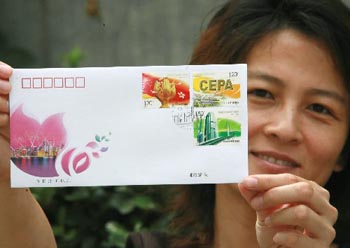 The first stamp, titled
"celebration", is designed to show the successful practice of "one country, two
systems" in Hong Kong. Pictures of China's national flag, Hong Kong's regional
flag and Bauhinia are printed on it. A set of three special stamps on the 10th
anniversary of Hong Kong's return to China was issued on Sunday in Shenzhen,
south China's Guangdong Province. The first stamp, titled
"celebration", is designed to show the successful practice of "one country, two
systems" in Hong Kong. Pictures of China's national flag, Hong Kong's regional
flag and Bauhinia are printed on it. A set of three special stamps on the 10th
anniversary of Hong Kong's return to China was issued on Sunday in Shenzhen,
south China's Guangdong Province.
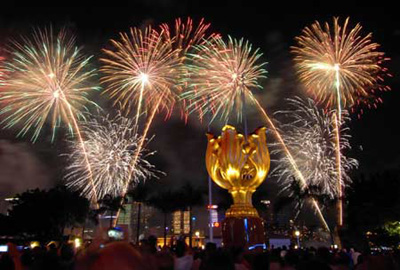 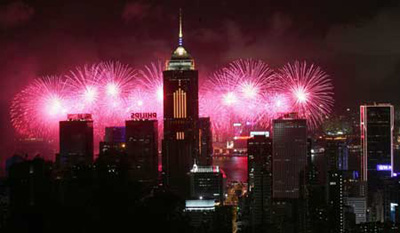 Fireworks light up the sky during celebrations marking the 10th anniversary of
Hong Kong's return to the motherland at the Victoria Harbor in Hong Kong, south
China, on July 1, 2007. A 16 million HK dollar fireworks display to mark the
10th anniversary of Hong Kong's return to the motherland and the establishment
of the Hong Kong Special Administrative Region (HKSAR) pushed the city's
celebration activities to another climax here Sunday night.
Fireworks light up the sky during celebrations marking the 10th anniversary of
Hong Kong's return to the motherland at the Victoria Harbor in Hong Kong, south
China, on July 1, 2007. A 16 million HK dollar fireworks display to mark the
10th anniversary of Hong Kong's return to the motherland and the establishment
of the Hong Kong Special Administrative Region (HKSAR) pushed the city's
celebration activities to another climax here Sunday night.
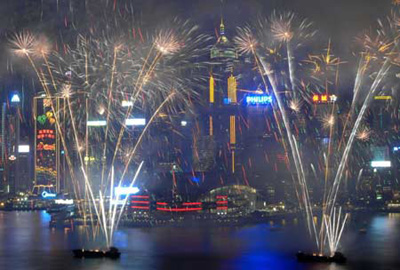 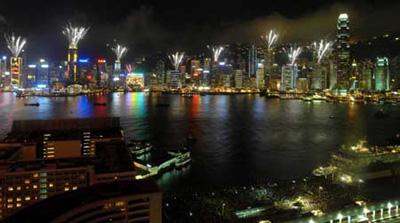 Fireworks light up the sky during celebrations marking the 10th anniversary of
Hong Kong's return to the motherland at the Victoria Harbor in Hong Kong, south
China, on July 1, 2007.
Fireworks light up the sky during celebrations marking the 10th anniversary of
Hong Kong's return to the motherland at the Victoria Harbor in Hong Kong, south
China, on July 1, 2007.
A survey in Hong Kong shows public satisfaction with the
People's Liberation Army's Hong Kong Garrison rising each year. CCTV reporter Xu
Zhaoqun visited the garrison to find out how the PLA soldiers carry out their
mission and get along with the locals. The Hong Kong Garrison is the PLA's only
unit with land, naval and air forces. But what really makes them special is that
they are a symbol of the Chinese government's resuming the exercise of
sovereignty over Hong Kong. And they are also a firm guarantee for the long term
stability and prosperity of the SAR. The troops abide by both the national laws
and the local laws and regulations. The garrison has become a window for the
locals to understand the PLA. General Wang jitang, commander, PLA HK Garrision,
said, "Over the past ten years, we've consistently turned out elite and
well-mannered troops. They are playing a irreplaceable role as a defender of
Hong Kong." In accordance with the Basic Law, the PLA Hong Kong Garrison does
not interfere with the affairs of the SAR government. It maintains an effective
and friendly working relation with the local government. These soldiers of the
People's Liberation Army defend the people of one of the world's freest
economies. Many here weren't sure what to expect when the troops first came ten
years ago. So how do they get along now? Let's go to the public day at the PLA
Garrison. Since the Return, the Hong Kong Garrison has held fourteen public
days. A great deal of unnecessary mystery is dispelled when the locals visit
these military venues. The public days, which the British troops never held,
seem quite useful to narrow the gap between civilians and soldiers. Ten years
ago, the deployment of an army subordinate to a socialist system was a concern
for the Hong Kong people. Ten years later, when they handle the soldiers'
weapons (children playing with the guns and posed to shoot in the picture) they
have already accepted the troops as part of their lives. The garrison is also
active in community work. Just as in the Mainland, the soldiers plant trees and
donate blood to help the society they serve.
Industrial and Commercial Bank of
China (1398), the mainland's largest commercial lender, has raised 4.45 billion
yuan (HK$4.56 billion) for its first qualified domestic institutional investor
scheme product that targets overseas equities and related assets.
A scramble for free gifts in which
three people were hurt and a heavy downpour before the last race that curtailed
an end- of-season carnival failed to wipe the smiles off the faces of Jockey
Club officials who announced the most successful racing season in a decade.
The London Hong Kong Dragon Boat
Festival — which attracted more than 5,000 people to London Docklands overnight
(HK time) — featured a series of events commemorating the Hong Kong handover in
Britain. The festival was organized by the London Chinatown Lions Club and the
London Chinatown Chinese Association and sponsored by the Hong Kong Economic and
Trade Office (HKETO). It was the first event in Britain held to celebrate the
10th anniversary of the establishment of the Hong Kong Special Administrative
Region (HKSAR). Director-General of the Hong Kong Economic and Trade Office
London Sarah Wu Po-chu said the event was important to London’s Chinese
community. “To hold this year’s dragon boat festival as part of our celebration
of the 10th anniversary means a lot to us. Dragon Boat racing is emblematic of
the strength, energy and competitiveness for which Hong Kong is renowned.” Ms Wu
said that Hong Kong has overcome major challenges since the handover in 1997.
These included the Asian financial crisis, avian flu, and severe acute
respiratory syndrome (Sars). “Yet, Hong Kong continues to thrive and prosper as
Asia’s world city, a centre for financial and professional services, trade,
shipping and tourism,’’ she added.
 China:
Chinese President Hu Jintao
appointed a new ambassador to the United Nations Office in Geneva on Monday. Li
Baodong was appointed as permanent representative and ambassador to the
Permanent Mission of the People's Republic of China to the United Nations Office
in Geneva and Other International Organizations in Switzerland. Li replaced his
predecessor Sha Zukang who became a UN under-secretary-general for Economic and
Social Affairs on June 22.
China:
Chinese President Hu Jintao
appointed a new ambassador to the United Nations Office in Geneva on Monday. Li
Baodong was appointed as permanent representative and ambassador to the
Permanent Mission of the People's Republic of China to the United Nations Office
in Geneva and Other International Organizations in Switzerland. Li replaced his
predecessor Sha Zukang who became a UN under-secretary-general for Economic and
Social Affairs on June 22.
 The Qinghai-Tibet
Railway, fully opened one year ago, has operated smoothly and steadily for four
seasons on stable lines and trustworthy equipment. The Qinghai-Tibet
Railway, fully opened one year ago, has operated smoothly and steadily for four
seasons on stable lines and trustworthy equipment.
Migrant workers attacked by mobs in Guangdong - One
migrant worker is fighting for survival, two are missing, and six remain in
serious situation in the hospital, after armed gangsters in Guangdong Province
beat up about 300 migrant workers who had gone on strike to demand unpaid
salaries on Friday, the Chongqing Morning Post reported. The Beijing-based China
News Service reported on Monday that four suspects were detained by police. The
migrants, most of whom are from Southwest China's Chongqing Municipality and
Sichuan Province, were working at a construction site for a hydropower station
on the Dongjiang River in Dongyuan county, in South China's Guangdong Province.
A worker lies on the ground after he was beaten by gangsters during a strike to
demand unpaid salaries in Dongyuan County, Heyuan City, South China's Guangdong
Province, June 29, 2007.[Chongqing Morning Post] The workers, who have not been
paid for four months, went on strike on Friday, which led to the descent by more
than 200 thugs, according to the newspaper. "The first batch of about 50
gangsters came with spades in their hands, and the second batch had axes, steel
pipes and sabres, and there were more behind them," the newspaper quoted Liu
Gangqing, one of the migrant workers, as saying. "They didn't stop lashing out
at us even when the police arrived," said another migrant worker Li Chuanbing.
Chrysler Group and China's Chery Automobile Co. will
finalize a groundbreaking alliance on Wednesday in Beijing that could result in
the first Chinese-made vehicles being exported to the US market.
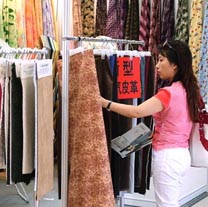 A visitor
chooses fabrics in a textile exhibition in Shanghai June 26, 2007. The tax
rebate cut will help textile industry shift it focus to value-added exports from
low-priced and low value-added goods. A visitor
chooses fabrics in a textile exhibition in Shanghai June 26, 2007. The tax
rebate cut will help textile industry shift it focus to value-added exports from
low-priced and low value-added goods.
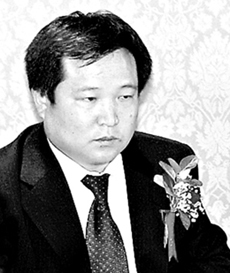 Chinese
entrepreneur confirms German airport purchase - Pang Yuliang, an entrepreneur
from Central China's Henan Province and chairman of LinkGlobal Logistics Co,
said yesterday he would officially acquire the Parchim Airport in northern
Germany at a cost of 1 billion yuan (US$130 million) on July 5, making himself
the first Chinese to buy a European airport. Pang and the German unit will go
through the takeover procedure in Germany on July 5, according to Pang. He
declined to reveal any detail about the purchasing fund source, but noted he had
submitted an application to the Ministry of Commerce for the acquisition. Pang
beat 10 other global competitors, including FedEx, Hamburg Airport and Emirates
Airline, in an international tender. According to the deal, LinkGlobal has 100
percent property rights to Parchim Airport located in Schwerin, near Hamburg,
and its facilities, as well as permanent ownership of land in an economic
cooperation zone affiliated to the airport. The purchase will help Pang further
expand the logistics network of LinkGlobal. It has a network covering more than
200 cities in China and about 90 countries worldwide. The governments of Henan
Province and Zhengzhou City as well as the authority of Zhengzhou Xinzheng
International Airport have signed an agreement with Pang's company to set up a
Zhengzhou-based aviation logistics company. The company will operate a cargo
transport business between China and Germany, and Pang's company will hold a
majority stake. Chinese
entrepreneur confirms German airport purchase - Pang Yuliang, an entrepreneur
from Central China's Henan Province and chairman of LinkGlobal Logistics Co,
said yesterday he would officially acquire the Parchim Airport in northern
Germany at a cost of 1 billion yuan (US$130 million) on July 5, making himself
the first Chinese to buy a European airport. Pang and the German unit will go
through the takeover procedure in Germany on July 5, according to Pang. He
declined to reveal any detail about the purchasing fund source, but noted he had
submitted an application to the Ministry of Commerce for the acquisition. Pang
beat 10 other global competitors, including FedEx, Hamburg Airport and Emirates
Airline, in an international tender. According to the deal, LinkGlobal has 100
percent property rights to Parchim Airport located in Schwerin, near Hamburg,
and its facilities, as well as permanent ownership of land in an economic
cooperation zone affiliated to the airport. The purchase will help Pang further
expand the logistics network of LinkGlobal. It has a network covering more than
200 cities in China and about 90 countries worldwide. The governments of Henan
Province and Zhengzhou City as well as the authority of Zhengzhou Xinzheng
International Airport have signed an agreement with Pang's company to set up a
Zhengzhou-based aviation logistics company. The company will operate a cargo
transport business between China and Germany, and Pang's company will hold a
majority stake.
 Shanghai teenager
Qian Zhijun who was catapulted to celebrity status with a photo of his chubby
face, is now likely to land a leading role in a Hollywood thriller. Shanghai teenager
Qian Zhijun who was catapulted to celebrity status with a photo of his chubby
face, is now likely to land a leading role in a Hollywood thriller.
 How many parents
tell folk stories to their children before bedtime? Certainly not as many as
decades ago. One possible reason may be that parents today know fewer folk tales
than their fathers and grandfathers. Many also think these tales are
superstitious and want to keep their children away from such "silly talk". How many parents
tell folk stories to their children before bedtime? Certainly not as many as
decades ago. One possible reason may be that parents today know fewer folk tales
than their fathers and grandfathers. Many also think these tales are
superstitious and want to keep their children away from such "silly talk".
Beijing officials will withdraw one million cars from the
city's streets next month in a trial run as plans are drawn up to reduce
pollution levels for next year's Olympics. Pollution has been a worry for the
International Olympic Committee (IOC) as China's economic boom has fuelled
increased energy consumption. "Concerns (over pollution) within the IOC
executive board were eased," IOC director of communications Giselle Davies told
reporters on Monday after receiving a progress report from Beijing organisers
earlier in the day. "They have a plan from August 7-20 this year: one million
cars will be off the road." She said organizers would trial several plans this
year that are designed to prepare the city for the Olympics. "Obviously the test
events provide an excellent opportunity to try out contingency measures that may
be used if necessary at the Games," said Davies, who is in Guatemala City for
Wednesday's announcement of the host venue for the 2014 Winter Olympics.
Organisers have also said Beijing authorities would replace about 50,000 old
taxis and 10,000 buses by the end of the year as well as renovate 16,000
coal-burning factories. China has slowed, but not reversed, a rising tide of
pollution from frenetic industrialization, the national environment agency said
last month in the face of increasing public anger over foul air and water. The
country has promised to cut emissions of major pollutants by 10 percent between
2006 and 2010 but failed last year to meet the annual target.
Chinese "Prison Break" to start shooting in Sept - The
Chinese version of the TV drama "Prison Break" will start shooting this
September, the producer Zonbo Media announced on Sunday. "The new series has no
connection with the Fox show, except for sharing the same name," the Yangtse
Evening News quoted an official from the Zonbo Media Group, Mr. Lin Yi, as
saying. The group also told the newspaper that it had applied for registration
for the trademark "Prison Break" in China. Early reports in April said that the
Zonbo Media had - for 1.2 million US dollars - bought the rights to adapt the
drama from Fox Broadcasting, who later denied the news. Lin Yi explained that
they contacted both the US headquarters and the Chinese branch of Fox for
possible cooperation, but didn't reach any agreement. "They demand a price
higher than our budget allows," he said. Lin Yi also revealed that a podcast
version will shoot at the same time, with the 30-episode TV series. The actors
have not yet been cast.
July 4, 2007
 Hong Kong:
Great concept, successful
practice - On July 1 a full decade ago, China resumed its exercise of
sovereignty over Hong Kong, which had returned to the motherland after
undergoing a century of vicissitudes, and the Hong Kong Special Administrative
Region (HKSAR) of the People's Republic of China was formerly established. This
represented a great victory in the annals of the Chinese nation. In the early
1980s, late senior leader Deng Xiaoping, with the wisdom and boldness of a great
statesman, set forth the great concept of "One Country, Two Systems" and opened
up a feasible path for resolving the Hong Kong issue left over by history by
means of peaceful negotiations. The third-generation collective leadership with
Jiang Zemin at the core appropriately handled various challenges and complicated
problems it had encountered around Hong Kong's return to the motherland,
ensuring the smooth transition of Hong Kong and effecting its smooth transfer,
and contributed historically in implementing the great concept. And the Party
Central Committee with Hu Jintao as the general secretary, is pragmatic and
takes up specific matters, goes on innovation and pioneering, and further
enriches both the theory and practice of the "One Country, Two Systems" concept.
In the past 10 years, the central government has unswervingly carried out the
"One country, Two Systems" concept, "Hong Kong people administering Hong Kong"
and "having a high degree of autonomy", done things in strict compliance with
the Basic Law of the SAR., and given an all-out support to the HKSAR chief
executive and government in their governance according to law. Meanwhile, the
HKSAR government has led people from all walks of life in working hard and
constantly strove even in adversity, tiding over difficulties and challenged
wrought by the Asian Financial Crisis of 1997, unfavorable changes inflicted
from the outer economic environment and the outbreak of severe acute respiratory
syndrome (SARS) occurred in Spring 2003, and maintained prosperity and
stability. In Hong Kong today, its economy grows, people's life continues to
improve, and society, full of vigor and vitality, has shown a sound momentum for
active development. Practice has eloquently proven that the "One Country, Two
Systems" concept is workable. After its return to Chinese sovereignty, Hong Kong
is under China's unified sovereignty, and its people administer Hong Kong with a
"higher degree of autonomy" in line with the Basic Law of the HKSAR. Hong Kong's
socio-economic system has not changed and laws remain basically the same. Hong
Kong has continued to be a free port and its status as an international center
of banking, trade and shipping has remained unchanged and the city has been
cited as one of the most open economic entities and most viable regions
globally. In a short span of a decade, numerous global conferences have been
convened in Hong Kong, including a World Bank annual conference; the Fortune
Global Forum 2001 held in Hong Kong which not only put it in spotlight but also
put in a huge fortune in ticket revenue; the Six Ministerial Meeting of the
World Trade Organization (WTO) held in 2005; ITU (the International
Telecommunication Union) Telecom World 2006, the unofficial Olympics of the
telecommunications industry, officially opened in Hong Kong Asia world Expo,
etc. The series of these major international activities have fully indicated the
recognition and confidence of the global community in the development and
progress Hong Kong had scored after its return. In the wake of its return, Hong
Kong has increasingly kept in close touch with the interior area. On the one
hand, it serves as a bridge between the interior and the global market and a
window for import of capital, technology and managerial experience. On the other
hand, it has attained still more opportunities for development and an untiring
motive force drawn from the fast development of the interior area. Since it
inception a decade ago, HKSAR has forged cooperative mechanism with neighboring
Guangdong province, Shanghai and Beijing and Pan-Pearl River Delta Region, and
its exchanges and cooperation with China's interior area have kept deepening and
strengthening. The Chinese mainland and Hong Kong Close Economic Partnership
Arrangement (commonly known as CEPA) which was reached on June 30, 2003,
signified a brand new era for economic and trade cooperation between the
interior area and Hong Kong, whose trade had grown from 1.1 trillion HK dollars
in 1997 to 2.3 trillion HK dollars last year. Hong Kong compatriots and people
in the interior areas have become more and more aware that Hong Kong and the
interior can mutually complementary, take on each other's advantages and make
common development under the "One Country, Two Systems" concept. Setting itself
against a backdrop of the great motherland and facing up the outside world, Hong
Kong should seize opportunities, surge outwardly and charge valiantly ahead as
it has unique regional advantages with special endowments from the nature and
available rare opportunities for still greater successes. At present, seeking
development, stability and harmony has become the common aspiration of the
central government and the entire Chinese people as well as the common interests
of the masses of Hong Kongers. People from all walks of life in Hong Kong
society should get united around the banner of loving the motherland and loving
Hong Kong, seek the common ground while reserving differences, and make
concerted efforts to overcome difficulties. So Hong Kong is sure to have a
splendid tomorrow by tapping the wisdom of all social strata and gathering the
strength of the whole society. Hong Kong:
Great concept, successful
practice - On July 1 a full decade ago, China resumed its exercise of
sovereignty over Hong Kong, which had returned to the motherland after
undergoing a century of vicissitudes, and the Hong Kong Special Administrative
Region (HKSAR) of the People's Republic of China was formerly established. This
represented a great victory in the annals of the Chinese nation. In the early
1980s, late senior leader Deng Xiaoping, with the wisdom and boldness of a great
statesman, set forth the great concept of "One Country, Two Systems" and opened
up a feasible path for resolving the Hong Kong issue left over by history by
means of peaceful negotiations. The third-generation collective leadership with
Jiang Zemin at the core appropriately handled various challenges and complicated
problems it had encountered around Hong Kong's return to the motherland,
ensuring the smooth transition of Hong Kong and effecting its smooth transfer,
and contributed historically in implementing the great concept. And the Party
Central Committee with Hu Jintao as the general secretary, is pragmatic and
takes up specific matters, goes on innovation and pioneering, and further
enriches both the theory and practice of the "One Country, Two Systems" concept.
In the past 10 years, the central government has unswervingly carried out the
"One country, Two Systems" concept, "Hong Kong people administering Hong Kong"
and "having a high degree of autonomy", done things in strict compliance with
the Basic Law of the SAR., and given an all-out support to the HKSAR chief
executive and government in their governance according to law. Meanwhile, the
HKSAR government has led people from all walks of life in working hard and
constantly strove even in adversity, tiding over difficulties and challenged
wrought by the Asian Financial Crisis of 1997, unfavorable changes inflicted
from the outer economic environment and the outbreak of severe acute respiratory
syndrome (SARS) occurred in Spring 2003, and maintained prosperity and
stability. In Hong Kong today, its economy grows, people's life continues to
improve, and society, full of vigor and vitality, has shown a sound momentum for
active development. Practice has eloquently proven that the "One Country, Two
Systems" concept is workable. After its return to Chinese sovereignty, Hong Kong
is under China's unified sovereignty, and its people administer Hong Kong with a
"higher degree of autonomy" in line with the Basic Law of the HKSAR. Hong Kong's
socio-economic system has not changed and laws remain basically the same. Hong
Kong has continued to be a free port and its status as an international center
of banking, trade and shipping has remained unchanged and the city has been
cited as one of the most open economic entities and most viable regions
globally. In a short span of a decade, numerous global conferences have been
convened in Hong Kong, including a World Bank annual conference; the Fortune
Global Forum 2001 held in Hong Kong which not only put it in spotlight but also
put in a huge fortune in ticket revenue; the Six Ministerial Meeting of the
World Trade Organization (WTO) held in 2005; ITU (the International
Telecommunication Union) Telecom World 2006, the unofficial Olympics of the
telecommunications industry, officially opened in Hong Kong Asia world Expo,
etc. The series of these major international activities have fully indicated the
recognition and confidence of the global community in the development and
progress Hong Kong had scored after its return. In the wake of its return, Hong
Kong has increasingly kept in close touch with the interior area. On the one
hand, it serves as a bridge between the interior and the global market and a
window for import of capital, technology and managerial experience. On the other
hand, it has attained still more opportunities for development and an untiring
motive force drawn from the fast development of the interior area. Since it
inception a decade ago, HKSAR has forged cooperative mechanism with neighboring
Guangdong province, Shanghai and Beijing and Pan-Pearl River Delta Region, and
its exchanges and cooperation with China's interior area have kept deepening and
strengthening. The Chinese mainland and Hong Kong Close Economic Partnership
Arrangement (commonly known as CEPA) which was reached on June 30, 2003,
signified a brand new era for economic and trade cooperation between the
interior area and Hong Kong, whose trade had grown from 1.1 trillion HK dollars
in 1997 to 2.3 trillion HK dollars last year. Hong Kong compatriots and people
in the interior areas have become more and more aware that Hong Kong and the
interior can mutually complementary, take on each other's advantages and make
common development under the "One Country, Two Systems" concept. Setting itself
against a backdrop of the great motherland and facing up the outside world, Hong
Kong should seize opportunities, surge outwardly and charge valiantly ahead as
it has unique regional advantages with special endowments from the nature and
available rare opportunities for still greater successes. At present, seeking
development, stability and harmony has become the common aspiration of the
central government and the entire Chinese people as well as the common interests
of the masses of Hong Kongers. People from all walks of life in Hong Kong
society should get united around the banner of loving the motherland and loving
Hong Kong, seek the common ground while reserving differences, and make
concerted efforts to overcome difficulties. So Hong Kong is sure to have a
splendid tomorrow by tapping the wisdom of all social strata and gathering the
strength of the whole society.
  Hong Kong Leaders and Basic Law
Hong Kong Leaders and Basic Law
  HK School of Creative Media, Entertainment
and Tech Industries
HK School of Creative Media, Entertainment
and Tech Industries
  Top China's Students Attend HK Universities
Top China's Students Attend HK Universities
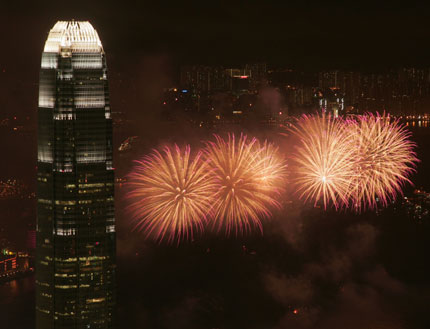 Fireworks in Hong Kong light up the sky during
celebrations marking the 10th anniversary of the former colony's return to China
July 1, 2007.
Fireworks in Hong Kong light up the sky during
celebrations marking the 10th anniversary of the former colony's return to China
July 1, 2007.
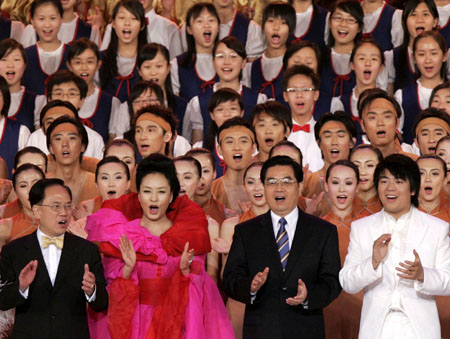 Chinese President Hu Jintao (1st row, 2nd R) and Hong Kong Chief Executive
Donald Tsang (1st row, L) sing with performers and guests during the Grand
Variety Show in Hong Kong June 30, 2007. The show is part of a series of events
celebrating the 10th anniversary of Hong Kong's handover to China.
Chinese President Hu Jintao (1st row, 2nd R) and Hong Kong Chief Executive
Donald Tsang (1st row, L) sing with performers and guests during the Grand
Variety Show in Hong Kong June 30, 2007. The show is part of a series of events
celebrating the 10th anniversary of Hong Kong's handover to China.
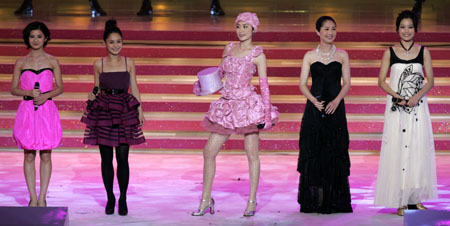 (From L) Hong Kong singers Charlene Choi, Gillian Chung, Kelly Chan, Miriam
Yeung and Joey Yung perform during the Grand Variety Show in Hong Kong June 30,
2007. The show is part of a series of events celebrating the 10th anniversary of
Hong Kong's handover to China.
(From L) Hong Kong singers Charlene Choi, Gillian Chung, Kelly Chan, Miriam
Yeung and Joey Yung perform during the Grand Variety Show in Hong Kong June 30,
2007. The show is part of a series of events celebrating the 10th anniversary of
Hong Kong's handover to China.
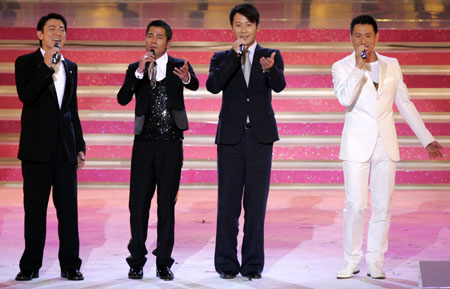 (From L) Hong Kong singer Andy Lau, Aaron Kwok, Leon Lai and Jackie Cheung
perform during the Grand Variety Show in Hong Kong June 30, 2007. The show is
part of a series of events celebrating the 10th anniversary of Hong Kong's
handover to China.
(From L) Hong Kong singer Andy Lau, Aaron Kwok, Leon Lai and Jackie Cheung
perform during the Grand Variety Show in Hong Kong June 30, 2007. The show is
part of a series of events celebrating the 10th anniversary of Hong Kong's
handover to China.
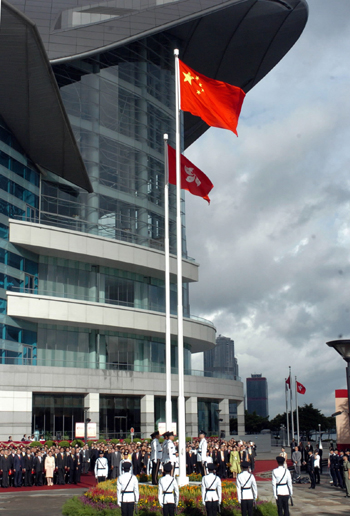 Hong Kong officials and citizens watch the
flag-raising ceremony in Hong Kong on the morning of July 1, 2007, the tenth
anniversary of Hong Kong's handover to the motherland.
Hong Kong officials and citizens watch the
flag-raising ceremony in Hong Kong on the morning of July 1, 2007, the tenth
anniversary of Hong Kong's handover to the motherland.
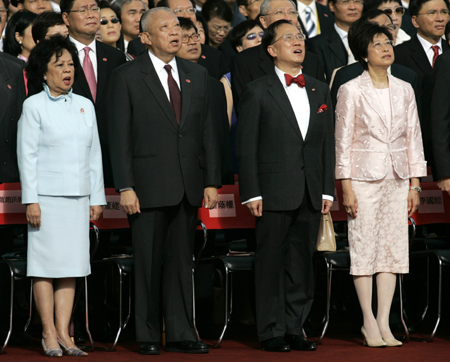 Hong Kong Chief Executive Donald
Tsang (2nd R), former chief executive Tung Chee-hwa (2nd L) and their wives
Selina Tsang (R) and Betty Tung sing the national anthem as they attend a
flag-raising ceremony in Hong Kong July 1, 2007, the day marking the 10th
anniversary of Hong Kong's handover to China.
Hong Kong Chief Executive Donald
Tsang (2nd R), former chief executive Tung Chee-hwa (2nd L) and their wives
Selina Tsang (R) and Betty Tung sing the national anthem as they attend a
flag-raising ceremony in Hong Kong July 1, 2007, the day marking the 10th
anniversary of Hong Kong's handover to China.
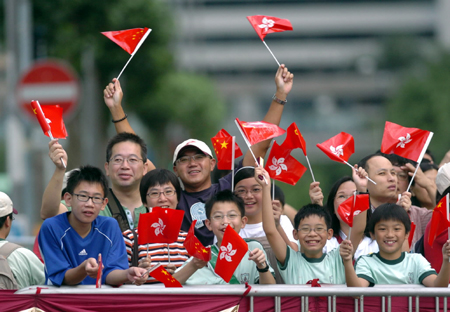 Hong Kong citizens wave flags of China and the Hong
Kong Administrative Region as they watch the flag-raising ceremony in Hong Kong
on the morning of July 1, 2007, the tenth anniversary of Hong Kong's handover to
China.
Hong Kong citizens wave flags of China and the Hong
Kong Administrative Region as they watch the flag-raising ceremony in Hong Kong
on the morning of July 1, 2007, the tenth anniversary of Hong Kong's handover to
China.
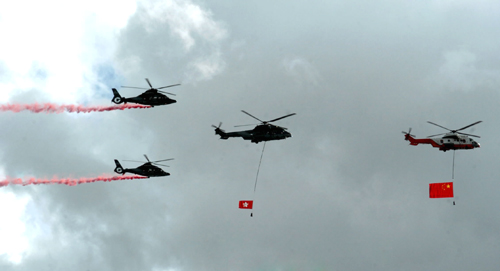 Helicopters carrying flags of China
and the Hong Kong Administrative Region fly over the flag-raising ceremony in
Hong Kong on the morning of July 1, 2007, the tenth anniversary of Hong Kong's
handover to China.
Helicopters carrying flags of China
and the Hong Kong Administrative Region fly over the flag-raising ceremony in
Hong Kong on the morning of July 1, 2007, the tenth anniversary of Hong Kong's
handover to China.
HK becomes world's 2nd largest IPO
market - The Hong Kong initial public offering (IPO) market, with HK$333.2
billion (US$42.64 billion) raised last year, now ranks second in the world after
London and followed by New York. Hong Kong has attracted over 300 mainland
enterprises to list there since 1993, raising US$200 billion worth funds. Henry
Tang, financial secretary of the government of the Hong Kong Special
Administrative Region, said turnover of H-shares in the first five months of
this year reached HK$5 trillion, exceeding the turnover for the entire 2005. A
plus H index to be launched soon Hong Kong targets foreign listings Donald Tsang
supports cross-border trading HK remains strong in int'l investment in 2006.
Ronald Arculli, chairman of Hong Kong Exchanges and Clearing Limited, said the
city provides a broad platform for mainland companies, not only with sufficient
funds, but also with world-class financial management, information disclosure
and enterprise management expertise. Bank of China set a world record by raising
US$11.2 billion, the biggest IPO in six years. The success of Bank of China was
a great encouragement to Hong Kong, said Arculli, because in the past few years,
large State-owned enterprises could only raised enough money by simultaneously
going public in Hong Kong and New York, but now they can do it in Hong Kong
alone. Tu Guangshao, vice chairman of the China Securities Regulatory
Commission, said with the signing of the Closer Economic Partnership Arrangement
(CEPA), the securities industries in the mainland and Hong Kong are more closely
related and more expertise is being shared. He added that Hong Kong is an
excellent springboard for mainland companies to go to the world and undergo
international scrutiny. More will be achieved as China expands the scope of the
qualified domestic institutional investors (QDII) program and more companies go
public in both the mainland and Hong Kong, Tu added.
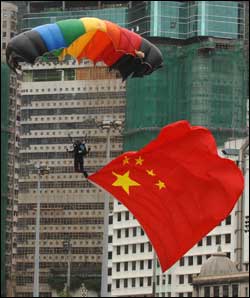 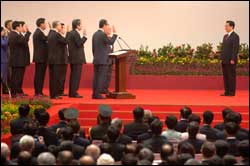 President Hu Jintao stressed Sunday the essence of "one
country, two systems" is to uphold the power vested with the central government.
In a speech marking the swearing- in of the third-term government of Hong Kong,
Hu told the 2,000 dignitaries "one country, two systems" could not be separated
from each other. "The one country means that we must uphold the power vested in
the central government," Hu said. "Two systems means that we should ensure the
high degree of autonomy of the Hong Kong SAR and support the chief executive and
the SAR government in exercising government power as mandated by law. "Only when
these two points are fully observed, can the strength of the `one country, two
systems' policy be brought into play to the real benefit of the Hong Kong
people." Hu's statement was the second reminder in less than a month that Hong
Kong does not have any residual power. The first came from China's second-
ranked Politburo member Wu Bangguo during a Basic Law seminar on June 6. Hu said
guardians of the Basic Law "had repeatedly warned against any challenges to
undermine the power of central government." "Without `one country' there will be
no `two systems.' One country and two systems cannot be separated from each
other. "Still less should they be set against each other." He said the Basic
Law's provisions on Hong Kong's political structure were in accordance with the
actual conditions of the territory and its legal status. "Only when we adhere to
these stipulations, the democratic development will be able to progress in a
gradual manner," Hu said. The president's speech echoed some of the grave
concerns of some Beijing leaders and mainland legal experts who, over the years,
have criticized the inconsistencies over the implementation of the Basic Law. Hu
called for full territory-wide and national compliance with the Basic Law
without any picking and choosing. "The executive, legislature and judicial
branches and social organizations in the Hong Kong SAR, the central government,
government departments and organizations at all levels and in all areas in the
mainland, and Hong Kong residents and people in the mainland must all observe
the Basic Law," Hu said. "The vast majority of Hong Kong people love the
motherland and Hong Kong," he said. "Hong Kong people from all walks of life
should close ranks and make every effort to advance their well-being and China's
interests. And they should resolutely oppose any attempts to undermine these
interests." A Beijing source told The Standard the main aim of Hu's three-day
visit was to make clear the powers of the central government under `one country,
two systems' and to warn against any move to challenge and distort the Basic
Law. Friday, Hu also spelled out the importance of a people-based government
through family visits and gatherings. At a gathering with 200 dignitaries
Saturday, Hu highlighted the urgency of nationalistic education for the next
generation in order to build a patriotic Hong Kong community. He also called for
caution over democratic development and for the government and the people to
keep in line with the constitutional stipulations.
President Hu Jintao stressed Sunday the essence of "one
country, two systems" is to uphold the power vested with the central government.
In a speech marking the swearing- in of the third-term government of Hong Kong,
Hu told the 2,000 dignitaries "one country, two systems" could not be separated
from each other. "The one country means that we must uphold the power vested in
the central government," Hu said. "Two systems means that we should ensure the
high degree of autonomy of the Hong Kong SAR and support the chief executive and
the SAR government in exercising government power as mandated by law. "Only when
these two points are fully observed, can the strength of the `one country, two
systems' policy be brought into play to the real benefit of the Hong Kong
people." Hu's statement was the second reminder in less than a month that Hong
Kong does not have any residual power. The first came from China's second-
ranked Politburo member Wu Bangguo during a Basic Law seminar on June 6. Hu said
guardians of the Basic Law "had repeatedly warned against any challenges to
undermine the power of central government." "Without `one country' there will be
no `two systems.' One country and two systems cannot be separated from each
other. "Still less should they be set against each other." He said the Basic
Law's provisions on Hong Kong's political structure were in accordance with the
actual conditions of the territory and its legal status. "Only when we adhere to
these stipulations, the democratic development will be able to progress in a
gradual manner," Hu said. The president's speech echoed some of the grave
concerns of some Beijing leaders and mainland legal experts who, over the years,
have criticized the inconsistencies over the implementation of the Basic Law. Hu
called for full territory-wide and national compliance with the Basic Law
without any picking and choosing. "The executive, legislature and judicial
branches and social organizations in the Hong Kong SAR, the central government,
government departments and organizations at all levels and in all areas in the
mainland, and Hong Kong residents and people in the mainland must all observe
the Basic Law," Hu said. "The vast majority of Hong Kong people love the
motherland and Hong Kong," he said. "Hong Kong people from all walks of life
should close ranks and make every effort to advance their well-being and China's
interests. And they should resolutely oppose any attempts to undermine these
interests." A Beijing source told The Standard the main aim of Hu's three-day
visit was to make clear the powers of the central government under `one country,
two systems' and to warn against any move to challenge and distort the Basic
Law. Friday, Hu also spelled out the importance of a people-based government
through family visits and gatherings. At a gathering with 200 dignitaries
Saturday, Hu highlighted the urgency of nationalistic education for the next
generation in order to build a patriotic Hong Kong community. He also called for
caution over democratic development and for the government and the people to
keep in line with the constitutional stipulations.
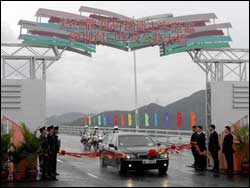 Hong Kong
celebrated the 10th anniversary of its return to the motherland with the opening
of the fourth vehicular boundary crossing - the Shenzhen Bay Bridge and Port.
Also known as the Shenzhen Western Corridor, it is expected to relieve traffic
and passenger congestion at the other border crossings. "It is a project
carrying with it significant meaning," state council member Tang Jiaxuan said at
the opening ceremony attended by President Hu Jintao. "It can best represent the
superiority of `one country, two systems."' To officially open the bridge, Hu's
car drove through a ceremonial red ribbon strung across the boundary between
Hong Kong and Shenzhen - though it was still some distance from the port area
where immigration and customs formalities are processed. On leaving the Hong
Kong end of the customs building, Hu stopped to chat with a woman customs
officer who was obviously not briefed beforehand and who was stumped by his
questions as to the bridge's vehicular and passenger capacity and how long it
would take to process each passenger. Hong Kong Chief Executive Donald Tsang
Yam-kuen had to come to her rescue and tell the president that, when fully
operational, the port would deal with around 30,000 passengers daily. Shenzhen
Bay Bridge and Port is the result of five years of cooperation between the
authorities in Hong Kong and Shenzhen, Tsang said at the opening ceremony. "The
two sides overcame a lot of hurdles over the five years, while the spirit of
`one family' has been well elaborated." In the new boundary crossing, Hong
Kong's immigration and customs facilities are located alongside those of the
mainland under a special arrangement. Coach passengers will only have to get on
and off once instead of twice when going through clearance procedures. In the
passenger terminal building, there are 24 e-channels, of which 12 are two-way
and can handle the passenger flow with greater flexibility. Of the 26 customs
counters, 16 are two-way. It takes only seven minutes to travel from Shenzhen
Bay Port to Yuen Long, while the time taken to get to Kwai Chung container
terminal is 30 minutes. The 5.5-kilometer six-lane carriageway cost HK$3.3
billion to build. The Hong Kong section, which is 3.5km long, cost HK$2.3
billion. Lane changeover facilities are provided near the Shenzhen Bay Port,
where drivers change from the left side of the road on the Hong Kong end to the
right side needed for Shenzhen. According to Highways Department project manager
Chow Ying-shun, the annual operation and maintenance costs will be around HK$30
million to HK$40 million. The average time for cargo clearance previously was
around 40 seconds. Now, with the "one-stop service," it will take less than 30
seconds, according to immigration divisional commander Ho Siu-hung. He added
that, in 2016, the expected daily flow would be about 42,000 passengers and
89,000 vehicles. The corridor was opened to the public at 6pm Sunday, though
there were long queues waiting to board the first busses to travel across the
border. Hong Kong's three other land boundary crossings are at Lok Ma Chau, Man
Kam To and Sha Tau Kok. Hong Kong
celebrated the 10th anniversary of its return to the motherland with the opening
of the fourth vehicular boundary crossing - the Shenzhen Bay Bridge and Port.
Also known as the Shenzhen Western Corridor, it is expected to relieve traffic
and passenger congestion at the other border crossings. "It is a project
carrying with it significant meaning," state council member Tang Jiaxuan said at
the opening ceremony attended by President Hu Jintao. "It can best represent the
superiority of `one country, two systems."' To officially open the bridge, Hu's
car drove through a ceremonial red ribbon strung across the boundary between
Hong Kong and Shenzhen - though it was still some distance from the port area
where immigration and customs formalities are processed. On leaving the Hong
Kong end of the customs building, Hu stopped to chat with a woman customs
officer who was obviously not briefed beforehand and who was stumped by his
questions as to the bridge's vehicular and passenger capacity and how long it
would take to process each passenger. Hong Kong Chief Executive Donald Tsang
Yam-kuen had to come to her rescue and tell the president that, when fully
operational, the port would deal with around 30,000 passengers daily. Shenzhen
Bay Bridge and Port is the result of five years of cooperation between the
authorities in Hong Kong and Shenzhen, Tsang said at the opening ceremony. "The
two sides overcame a lot of hurdles over the five years, while the spirit of
`one family' has been well elaborated." In the new boundary crossing, Hong
Kong's immigration and customs facilities are located alongside those of the
mainland under a special arrangement. Coach passengers will only have to get on
and off once instead of twice when going through clearance procedures. In the
passenger terminal building, there are 24 e-channels, of which 12 are two-way
and can handle the passenger flow with greater flexibility. Of the 26 customs
counters, 16 are two-way. It takes only seven minutes to travel from Shenzhen
Bay Port to Yuen Long, while the time taken to get to Kwai Chung container
terminal is 30 minutes. The 5.5-kilometer six-lane carriageway cost HK$3.3
billion to build. The Hong Kong section, which is 3.5km long, cost HK$2.3
billion. Lane changeover facilities are provided near the Shenzhen Bay Port,
where drivers change from the left side of the road on the Hong Kong end to the
right side needed for Shenzhen. According to Highways Department project manager
Chow Ying-shun, the annual operation and maintenance costs will be around HK$30
million to HK$40 million. The average time for cargo clearance previously was
around 40 seconds. Now, with the "one-stop service," it will take less than 30
seconds, according to immigration divisional commander Ho Siu-hung. He added
that, in 2016, the expected daily flow would be about 42,000 passengers and
89,000 vehicles. The corridor was opened to the public at 6pm Sunday, though
there were long queues waiting to board the first busses to travel across the
border. Hong Kong's three other land boundary crossings are at Lok Ma Chau, Man
Kam To and Sha Tau Kok.
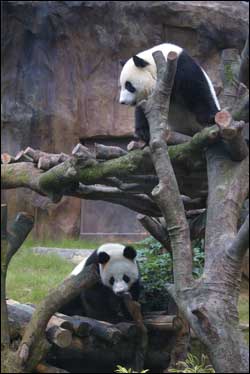 Big crowds, big
smiles, big pandas. The two cute giant pandas, Ying Ying and Le Le, met the
public and attracted thousands who queued up to see them at Ocean Park. When the
door of the pair's new home opened at 9.30am, at least 4,000 people were already
lining up. The official opening ceremony for the two pandas - a gift from the
central government to celebrate the 10th anniversary of reunification with the
mainland - was held Sunday morning. Among those at the ceremony were Ocean Park
chairman Allan Zeman and the park's conservation ambassador Andy Lau Tak-Wah,
who tapped musical triangles as a signal to call Ying Ying and Le Le into the
Giant Panda Habitat. They slowly emerged into the habitat to see a media army
surrounding the viewing grounds. Big crowds, big
smiles, big pandas. The two cute giant pandas, Ying Ying and Le Le, met the
public and attracted thousands who queued up to see them at Ocean Park. When the
door of the pair's new home opened at 9.30am, at least 4,000 people were already
lining up. The official opening ceremony for the two pandas - a gift from the
central government to celebrate the 10th anniversary of reunification with the
mainland - was held Sunday morning. Among those at the ceremony were Ocean Park
chairman Allan Zeman and the park's conservation ambassador Andy Lau Tak-Wah,
who tapped musical triangles as a signal to call Ying Ying and Le Le into the
Giant Panda Habitat. They slowly emerged into the habitat to see a media army
surrounding the viewing grounds.
Edward Yang, the Cannes-winning
Taiwanese engineer-turned- director known for his realistic portrayals of modern
Taiwan, has died from complications from colon cancer, a film industry
consultant said Sunday. Yang was 59.
 China:
American Airlines (AA) Beijing
Office announced Sunday it would file an application to the U.S. and Chinese
regulators for opening a new nonstop route between Chicago and Beijing on March
25, 2009. If the application gets approved, AA will fly the route seven days a
week between Chicago O'Hare International Airport and Beijing Capital
International Airport with its 245-seat Boeing 777 aircraft in three-class
configuration. Gerard Arpey, AA's Chairman and CEO said the application was
brought forward based on the company's evaluation on China's economic and
financial prospects in 2009 and the route would add to services available
between the two cities. Via the Chicago hub, the new route would provide
connections between Beijing and 73 cities in 29 states of the United States,
Arpey said, adding that passengers in China would be able to benefit from the
code-share relationship between AA and China Eastern Airlines to fly to other
Chinese cities from Beijing. "Having carefully looked at the current competitive
landscape and the growth patterns in traffic, we believe that expanding China
service from our Chicago gateway will provide the greatest public benefits in
this round of new service opportunities," said the chairman.
China:
American Airlines (AA) Beijing
Office announced Sunday it would file an application to the U.S. and Chinese
regulators for opening a new nonstop route between Chicago and Beijing on March
25, 2009. If the application gets approved, AA will fly the route seven days a
week between Chicago O'Hare International Airport and Beijing Capital
International Airport with its 245-seat Boeing 777 aircraft in three-class
configuration. Gerard Arpey, AA's Chairman and CEO said the application was
brought forward based on the company's evaluation on China's economic and
financial prospects in 2009 and the route would add to services available
between the two cities. Via the Chicago hub, the new route would provide
connections between Beijing and 73 cities in 29 states of the United States,
Arpey said, adding that passengers in China would be able to benefit from the
code-share relationship between AA and China Eastern Airlines to fly to other
Chinese cities from Beijing. "Having carefully looked at the current competitive
landscape and the growth patterns in traffic, we believe that expanding China
service from our Chicago gateway will provide the greatest public benefits in
this round of new service opportunities," said the chairman.
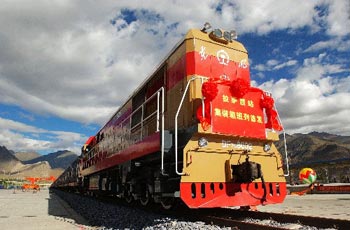 The
first container freight train starts off from the Lhasa west station in Lhasa,
capital of the southwest China's Tibet Autonomous Region on July 1, 2007.
Qinghai-Tibet Railway, began operation a year ago on July 1, is witnessing its
first anniversary of its opening. The railway had transported 1.3 million
passengers and 650,000 tons of goods in or out of Tibet by May 31 this year,
according to Qinghai-Tibet Railway Company. The
first container freight train starts off from the Lhasa west station in Lhasa,
capital of the southwest China's Tibet Autonomous Region on July 1, 2007.
Qinghai-Tibet Railway, began operation a year ago on July 1, is witnessing its
first anniversary of its opening. The railway had transported 1.3 million
passengers and 650,000 tons of goods in or out of Tibet by May 31 this year,
according to Qinghai-Tibet Railway Company.
Chinese tourists have become the driving force behind fast
tourism growth in Asia and the Pacific Region, according to sources at an
international conference on travel trends.
With the Olympics as a launch pad,
China is expected to replace France as the world's top tourism destination by
2014, according to experts.
 A Chinese actress'
role in combat against AIDS - On the screen, she is a brave policewoman or a
miserable widow, while in reality, she has other identities: Good Will
Ambassador of the Ministry of Health on HIV/AIDS and member of the Leadership
Council of the Global Coalition on Women and AIDS (GCWA). Jiang Wenli, famous
Chinese actress who has starred many prime-time TV series, will attend the
meeting of the GCWA and the International Women's Summit slated for early July
in Nairobi, Kenya and have site visits there. Jiang previously attended similar
meetings in Thailand and Britain. "From the exchanges, we can learn each other's
experience in the fight against AIDS," she said. Jiang started her job as a Good
Will Ambassador in 2003 together with several other singers and actors. A Chinese actress'
role in combat against AIDS - On the screen, she is a brave policewoman or a
miserable widow, while in reality, she has other identities: Good Will
Ambassador of the Ministry of Health on HIV/AIDS and member of the Leadership
Council of the Global Coalition on Women and AIDS (GCWA). Jiang Wenli, famous
Chinese actress who has starred many prime-time TV series, will attend the
meeting of the GCWA and the International Women's Summit slated for early July
in Nairobi, Kenya and have site visits there. Jiang previously attended similar
meetings in Thailand and Britain. "From the exchanges, we can learn each other's
experience in the fight against AIDS," she said. Jiang started her job as a Good
Will Ambassador in 2003 together with several other singers and actors.
Bookings far exceed supply as first phase of ticket sales
closes - The first phase of ticket sales for the 2008 Olympic Games has come to
a close with more than 700,000 people booking over 4.9 million tickets,
officials said on Sunday. "By 24:00 last night, we have received more than
700,000 orders, " said Rong Jun, director of the Beijing 2008 Ticketing Center.
"More orders are expected to come in the next few days as some are delivered by
mail," he added. According to Rong, of the 700,000 orders, about 90 per cent
were over the Internet, with the rest through Bank of China branches or by mail.
Though bookings far exceeded the supply volume of 2.7 million tickets for the
first phase from April 15 to June 30, it doesn't mean all are sold out, said
Rong. "Orders are relatively centralized," he explained. "Some hot events such
as the opening and closing ceremonies are over-subscribed, while a few other
events are a little unpopular."
Central Huijin Investment, the
mainland government's investment arm, will be folded into the new agency that
was created to manage part of the nation's US$1.2 trillion (HK$9.36 trillion)
foreign reserves, a central bank official said over the weekend.
July 3, 2007
 Hong Kong:
United States CIA agents
saw Hong Kong as window on Communist Party - CIA agents worked to infiltrate
groups in Hong Kong with connections to the Communist Party, documents released
in the US yesterday reveal. Under the Chaos Program, agents from the Central
Intelligence Agency, FBI and civilians with "extremist credentials" were
cultivated and despatched to gather intelligence from overseas communist groups.
China, Cuba, North Vietnam, the Soviet Union, North Korea and Arab nations under
the Fedayeen were targeted by the program. The aim was to collect information to
link foreign communist powers to US activists and civilians. Hong Kong is named
in the document as an area of "important operational interest" along with Paris,
Stockholm, Algiers, Dar es Salaam and Mexico. The document dubbed "The Family
Jewels" also mentions the CIA's East Asia division, which was responsible for
the "placing of agents in leftist milieu", suggesting they recruited locals to
act as spies. The CIA describes the Chaos Program's purpose as being to gather
information about extremist groups working in the US at a time when Washington
believed many activists were being influenced by outside powers. Rather than
recruiting new members, the document said efforts were made to use existing
contacts. The report said the programme had played an "integral part of
collection programs in China operations". The report on the programme is dated
May 1973. Audio surveillance was also conducted on some groups. The information
was considered highly sensitive. Once collected, it bypassed normal channels and
was processed by the Special Operations Group. "Information of particular
significance, when collected, has been disseminated by special memorandum over
the signature of the Director of Central Intelligence to the White House (John
Dean and Dr Kissinger) as well as Attorney General, Secretary of State and
Director of the FBI," the memorandum said. Former deputy to the National
People's Congress Choi Wai-hang said he was not surprised by the revelations.
Most people would have assumed US spies were active in Hong Kong in the 1960s
and 1970s, he said. "This [spying] was quite common at the time. They were
trying to get information from everywhere," said Mr Choi, who was detained for
18 months at Mount Davies camp in Western during the 1967 riots. The Family
Jewels also provides new details about how the CIA illegally spied on US
citizens and tracked down an expert lock picker for a Watergate conspirator. It
also detailed CIA collaboration with the Mafia for a failed assassination
attempt on Cuban President Fidel Castro. Hong Kong:
United States CIA agents
saw Hong Kong as window on Communist Party - CIA agents worked to infiltrate
groups in Hong Kong with connections to the Communist Party, documents released
in the US yesterday reveal. Under the Chaos Program, agents from the Central
Intelligence Agency, FBI and civilians with "extremist credentials" were
cultivated and despatched to gather intelligence from overseas communist groups.
China, Cuba, North Vietnam, the Soviet Union, North Korea and Arab nations under
the Fedayeen were targeted by the program. The aim was to collect information to
link foreign communist powers to US activists and civilians. Hong Kong is named
in the document as an area of "important operational interest" along with Paris,
Stockholm, Algiers, Dar es Salaam and Mexico. The document dubbed "The Family
Jewels" also mentions the CIA's East Asia division, which was responsible for
the "placing of agents in leftist milieu", suggesting they recruited locals to
act as spies. The CIA describes the Chaos Program's purpose as being to gather
information about extremist groups working in the US at a time when Washington
believed many activists were being influenced by outside powers. Rather than
recruiting new members, the document said efforts were made to use existing
contacts. The report said the programme had played an "integral part of
collection programs in China operations". The report on the programme is dated
May 1973. Audio surveillance was also conducted on some groups. The information
was considered highly sensitive. Once collected, it bypassed normal channels and
was processed by the Special Operations Group. "Information of particular
significance, when collected, has been disseminated by special memorandum over
the signature of the Director of Central Intelligence to the White House (John
Dean and Dr Kissinger) as well as Attorney General, Secretary of State and
Director of the FBI," the memorandum said. Former deputy to the National
People's Congress Choi Wai-hang said he was not surprised by the revelations.
Most people would have assumed US spies were active in Hong Kong in the 1960s
and 1970s, he said. "This [spying] was quite common at the time. They were
trying to get information from everywhere," said Mr Choi, who was detained for
18 months at Mount Davies camp in Western during the 1967 riots. The Family
Jewels also provides new details about how the CIA illegally spied on US
citizens and tracked down an expert lock picker for a Watergate conspirator. It
also detailed CIA collaboration with the Mafia for a failed assassination
attempt on Cuban President Fidel Castro.
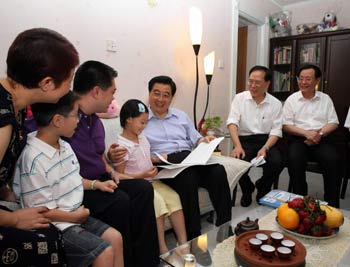 Chinese President
Hu Jintao (C) chats with a Hong Kong family in a Hong Kong residential garden on
June 29, 2007. It's an unforgettable day for 10-year-old Hong Kong boy Chiu Lam
Ho, who is at the same age of the Hong Kong Special Administrative Region
(HKSAR), as he played the piano for Chinese President Hu Jintao who visited his
family in Ma On Shan on Friday. Chinese President Hu Jintao on Saturday morning
reviewed troops of the Chinese People's Liberation Army (PLA) Garrison in the
Hong Kong Special Administrative Region (HKSAR) at the Stonecutters Island (Ngong
Shuen Chau) Naval Base. Chinese President Hu Jintao viewed the Hong Kong Sports
Institute and chatted with elite Hong Kong athletes who are training for the
2008 Beijing Olympics on Friday afternoon. Chinese President
Hu Jintao (C) chats with a Hong Kong family in a Hong Kong residential garden on
June 29, 2007. It's an unforgettable day for 10-year-old Hong Kong boy Chiu Lam
Ho, who is at the same age of the Hong Kong Special Administrative Region
(HKSAR), as he played the piano for Chinese President Hu Jintao who visited his
family in Ma On Shan on Friday. Chinese President Hu Jintao on Saturday morning
reviewed troops of the Chinese People's Liberation Army (PLA) Garrison in the
Hong Kong Special Administrative Region (HKSAR) at the Stonecutters Island (Ngong
Shuen Chau) Naval Base. Chinese President Hu Jintao viewed the Hong Kong Sports
Institute and chatted with elite Hong Kong athletes who are training for the
2008 Beijing Olympics on Friday afternoon.
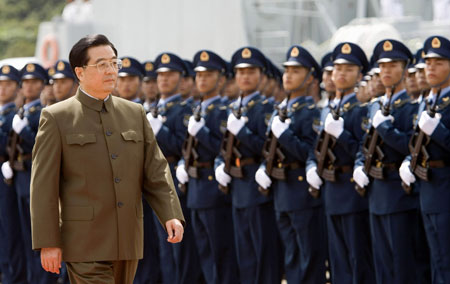 President Hu Jintao inspects troops
of the People's Liberation Army (PLA) stationed in Hong Kong June 30, 2007. Hu,
along with a delegation of senior central government officials, is in Hong Kong
for a three-day visit to celebrate the 10th anniversary of Hong Kong's handover
to Chinese rule.
President Hu Jintao inspects troops
of the People's Liberation Army (PLA) stationed in Hong Kong June 30, 2007. Hu,
along with a delegation of senior central government officials, is in Hong Kong
for a three-day visit to celebrate the 10th anniversary of Hong Kong's handover
to Chinese rule.
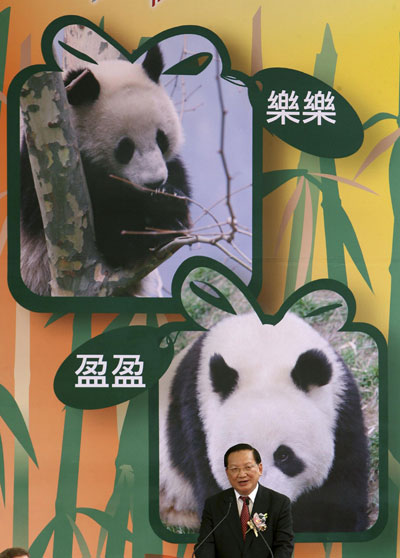 State Councilor Tang Jiaxuan
speaks during the giant pandas gift presentation ceremony at Ocean Park in Hong
Kong June 30, 2007. The two giant pandas are the latest gifts from the central
government to Hong Kong to celebrate the 10th anniversary of the territory's
handover to Chinese rule.
State Councilor Tang Jiaxuan
speaks during the giant pandas gift presentation ceremony at Ocean Park in Hong
Kong June 30, 2007. The two giant pandas are the latest gifts from the central
government to Hong Kong to celebrate the 10th anniversary of the territory's
handover to Chinese rule.
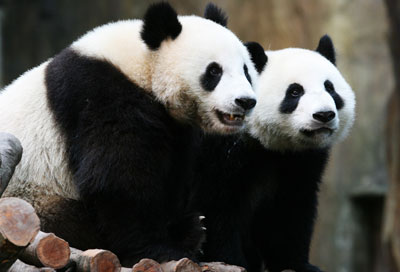 Giant pandas Ying Ying and Lok
Lok sit inside the new giant panda habitat at the Hong Kong Ocean Park June 30,
2007.
Giant pandas Ying Ying and Lok
Lok sit inside the new giant panda habitat at the Hong Kong Ocean Park June 30,
2007.
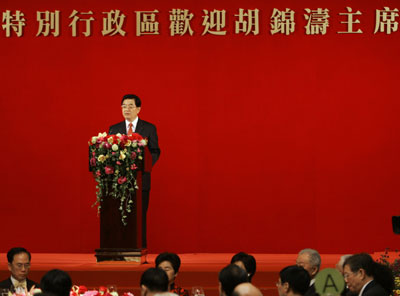 President Hu Jintao speaks during the
welcome dinner in Hong Kong June 30 2007 - The concept of "one country, two
systems" guarantees the prosperity and stability of Hong Kong, and will prove
more successful in the future, said Chinese President Hu Jintao in Hong Kong on
Saturday. Delivering a speech at the welcoming dinner hosted by the government
of the Hong Kong Special Administrative Region (HKSAR), Hu said the success of
Hong Kong since its return bears full testimony to the immense vitality of the
concept of "one country, two systems." It demonstrates that the scientific
concept of "one country, two systems" put forward by Deng Xiaoping is not only
the best solution to resolving the issue of Hong Kong, one left over by history,
but also the best institutional arrangement that guarantees Hong Kong's
long-term prosperity and stability after its return to the motherland, Hu said.
The arrangement of "one country, two systems" enables Hong Kong to maintain its
strength and receive stronger support from the mainland. It enables Hong Kong
and the mainland to complement each other and achieve common development, Hu
said. He said that "one country, two systems" is a good policy for Hong Kong,
for the whole country, for international investors and for prosperity in the
region. "We have no doubt that in the course of its implementation, the 'one
country, two systems' policy will prove even more successful and popular," Hu
said. President Hu Jintao speaks during the
welcome dinner in Hong Kong June 30 2007 - The concept of "one country, two
systems" guarantees the prosperity and stability of Hong Kong, and will prove
more successful in the future, said Chinese President Hu Jintao in Hong Kong on
Saturday. Delivering a speech at the welcoming dinner hosted by the government
of the Hong Kong Special Administrative Region (HKSAR), Hu said the success of
Hong Kong since its return bears full testimony to the immense vitality of the
concept of "one country, two systems." It demonstrates that the scientific
concept of "one country, two systems" put forward by Deng Xiaoping is not only
the best solution to resolving the issue of Hong Kong, one left over by history,
but also the best institutional arrangement that guarantees Hong Kong's
long-term prosperity and stability after its return to the motherland, Hu said.
The arrangement of "one country, two systems" enables Hong Kong to maintain its
strength and receive stronger support from the mainland. It enables Hong Kong
and the mainland to complement each other and achieve common development, Hu
said. He said that "one country, two systems" is a good policy for Hong Kong,
for the whole country, for international investors and for prosperity in the
region. "We have no doubt that in the course of its implementation, the 'one
country, two systems' policy will prove even more successful and popular," Hu
said.
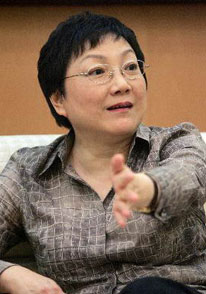 Deng Rong: Father
would be proud - It is the 10th anniversary of Hong Kong's return to the
motherland this year, but it also marks a decade after the passing of China's
late leader Deng Xiaoping. His youngest daughter, Deng Rong, recalled his father
around the years of Hong Kong's handover during an interview and said her father
would be proud of today's Hong Kong, the China News Service (CNS) reported on
Sunday. According to his daughter, Deng -- the architect behind "One country,
Two systems" --established an especially close relationship with the former
British colony his whole life. "When my father first traveled through Hong Kong
on his way to France on a work-study program in 1920, he was a 16 year-old from
the north of Sichuan in southwest China," Deng Rong recalled. "And during the
revolution years, he passed by Hong Kong several times. But since the founding
of New China, he found no chance to go there." On the issue of Hong Kong, Deng
focused a lot of time and energy into finding a solution, and came up with the
"One country, Two systems". During negotiations with the British government,
Deng was so unexpectedly 'stubborn' to his counterparts that he wouldn't yield
about their requests related to China's sovereignty over Hong Kong. The handover
in 1997 was a great event in China's history and it was inseparable with Deng's
contributions. "Father read much on Hong Kong to solve the issue and got to know
all related political, economic, military, social, legal, geopolitical and
diplomatic factors about it through various channels. He read news from foreign
agencies and subscribed to many Hong Kong newspapers to get as much information
as he could." "Father would be proud of today's Hong Kong!" "It was an
unfinished aspiration of him to step onto the land of Hong Kong after the
handover," Deng Rong's voice choked when talking about his father's wish. During
Deng's second trip to Shenzhen in 1992, he looked over to Hong Kong and told his
friends he wished to "walk on our own land" after 1997. It was a relaxed visit
compared with a previous trip in 1984 when Shenzhen was only a village starting
to open up. His speeches during this famous southern tour then stepped up
China's reform process. "Over the past 10 years, the mainland witnessed fast
economic growth and developed a much closer relationship with Hong Kong," said
Deng Rong. Before Hong Kong's return to Chinese rule in 1997, many residents on
the territory had a negative attitude towards the political and social systems
on the mainland. They also had a low degree of identity with the motherland,
Deng said. "There have been great achievements these 10 years. We're proud of
Hong Kong and of our motherland too," Deng Rong smiled. "If father were still
living, he would feel the same!" Though he himself didn't realize his last wish,
his family helped him carry through the dream. "During China's reform and
opening up, Hong Kong has played an important role, not just after the handover,
but throughout the whole process. That's also why the special economic zone was
put in Shenzhen - to draw on Hong Kong's strengths." "I love Hong Kong" "My
family and I wish Hong Kong a more successful future and wish all the residents
there a happier and healthier life!" exclaimed Deng Rong. Deng Rong: Father
would be proud - It is the 10th anniversary of Hong Kong's return to the
motherland this year, but it also marks a decade after the passing of China's
late leader Deng Xiaoping. His youngest daughter, Deng Rong, recalled his father
around the years of Hong Kong's handover during an interview and said her father
would be proud of today's Hong Kong, the China News Service (CNS) reported on
Sunday. According to his daughter, Deng -- the architect behind "One country,
Two systems" --established an especially close relationship with the former
British colony his whole life. "When my father first traveled through Hong Kong
on his way to France on a work-study program in 1920, he was a 16 year-old from
the north of Sichuan in southwest China," Deng Rong recalled. "And during the
revolution years, he passed by Hong Kong several times. But since the founding
of New China, he found no chance to go there." On the issue of Hong Kong, Deng
focused a lot of time and energy into finding a solution, and came up with the
"One country, Two systems". During negotiations with the British government,
Deng was so unexpectedly 'stubborn' to his counterparts that he wouldn't yield
about their requests related to China's sovereignty over Hong Kong. The handover
in 1997 was a great event in China's history and it was inseparable with Deng's
contributions. "Father read much on Hong Kong to solve the issue and got to know
all related political, economic, military, social, legal, geopolitical and
diplomatic factors about it through various channels. He read news from foreign
agencies and subscribed to many Hong Kong newspapers to get as much information
as he could." "Father would be proud of today's Hong Kong!" "It was an
unfinished aspiration of him to step onto the land of Hong Kong after the
handover," Deng Rong's voice choked when talking about his father's wish. During
Deng's second trip to Shenzhen in 1992, he looked over to Hong Kong and told his
friends he wished to "walk on our own land" after 1997. It was a relaxed visit
compared with a previous trip in 1984 when Shenzhen was only a village starting
to open up. His speeches during this famous southern tour then stepped up
China's reform process. "Over the past 10 years, the mainland witnessed fast
economic growth and developed a much closer relationship with Hong Kong," said
Deng Rong. Before Hong Kong's return to Chinese rule in 1997, many residents on
the territory had a negative attitude towards the political and social systems
on the mainland. They also had a low degree of identity with the motherland,
Deng said. "There have been great achievements these 10 years. We're proud of
Hong Kong and of our motherland too," Deng Rong smiled. "If father were still
living, he would feel the same!" Though he himself didn't realize his last wish,
his family helped him carry through the dream. "During China's reform and
opening up, Hong Kong has played an important role, not just after the handover,
but throughout the whole process. That's also why the special economic zone was
put in Shenzhen - to draw on Hong Kong's strengths." "I love Hong Kong" "My
family and I wish Hong Kong a more successful future and wish all the residents
there a happier and healthier life!" exclaimed Deng Rong.
 Hong Kong star
Karen Mok here on Thursday participated in celebrations for the 10th anniversary
of HK's return to the motherland. She said before HK's return to the motherland
in 1997, Hong Kong stars only paid attention to the local market. However, they
have more chances to cooperate with their counterparts in the Chinese mainland
in the past 10 years, which could help boost their career. "Mr. Cinema", a film
Mok took part in, reflects the event and is showing in Hong Kong and the
mainland. Mok said she is also in Malaysia to promote 2007 Hong Kong Shopping
Festival, which will be held from June 30 to August 31. To promote the event,
the 37-year-old star also introduced her experience of shopping in Hong Kong.
"Hong Kong itself is a huge shopping mall. Tourist can see the shopping mall as
soon as they get off the plane," she said. Mok said she loves shopping in Hong
Kong's Central, which has the biggest shopping mall in Hong Kong. She also likes
shopping in Ladies' Street, which is distinctive from other shopping malls. Mok
said shoes are her favorite. She would buy seven to eight pairs of shoes when
there was a discount, so she had hundreds of pairs of shoes. She suggested that
tourists have minds and impulsion when shopping in Hong Kong. During the
festival, "Le Le" and "Ying Ying", the panda couple given as gifts by China's
Central Government for the 10th anniversary, will show in Hong Kong's Ocean
Park, she said. Hong Kong star
Karen Mok here on Thursday participated in celebrations for the 10th anniversary
of HK's return to the motherland. She said before HK's return to the motherland
in 1997, Hong Kong stars only paid attention to the local market. However, they
have more chances to cooperate with their counterparts in the Chinese mainland
in the past 10 years, which could help boost their career. "Mr. Cinema", a film
Mok took part in, reflects the event and is showing in Hong Kong and the
mainland. Mok said she is also in Malaysia to promote 2007 Hong Kong Shopping
Festival, which will be held from June 30 to August 31. To promote the event,
the 37-year-old star also introduced her experience of shopping in Hong Kong.
"Hong Kong itself is a huge shopping mall. Tourist can see the shopping mall as
soon as they get off the plane," she said. Mok said she loves shopping in Hong
Kong's Central, which has the biggest shopping mall in Hong Kong. She also likes
shopping in Ladies' Street, which is distinctive from other shopping malls. Mok
said shoes are her favorite. She would buy seven to eight pairs of shoes when
there was a discount, so she had hundreds of pairs of shoes. She suggested that
tourists have minds and impulsion when shopping in Hong Kong. During the
festival, "Le Le" and "Ying Ying", the panda couple given as gifts by China's
Central Government for the 10th anniversary, will show in Hong Kong's Ocean
Park, she said.
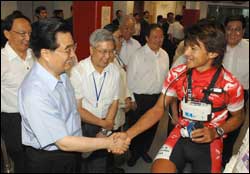 Dedication,
sincerity and warmth were the impressions President Hu Jintao left with the 25
athletes he met Friday at the Hong Kong Sports Institute in Wu Kai Sha. While
there, the state leader played ping-pong with a wonderkid and encouraged
athletes to fight for gold at next year's Beijing Olympics. At his first stop
after arriving in Hong Kong for a three-day visit to celebrate the 10th
anniversary of the SAR, Hu - dressed in a blue short-sleeved shirt and black
trousers - took up a paddle and played five rounds with 13-year-old Kenneth Chiu
Chung-hei. Looking dedicated throughout the light-hearted match, the 65-year-old
president exerted a bit more energy to win the last set after dropping the first
four. Hu then autographed the paddles of Chiu and 15-year-old table-tennis
player Lee Ho-ching, who has won medals representing Hong Kong in an
international youth competition. Chief Executive Donald Tsang Yam-kuen, among an
enormous group of delegates on hand to cheer for China's No1, had a ping-pong
ball slip through his hand as he attempted to catch one flying toward him. Dedication,
sincerity and warmth were the impressions President Hu Jintao left with the 25
athletes he met Friday at the Hong Kong Sports Institute in Wu Kai Sha. While
there, the state leader played ping-pong with a wonderkid and encouraged
athletes to fight for gold at next year's Beijing Olympics. At his first stop
after arriving in Hong Kong for a three-day visit to celebrate the 10th
anniversary of the SAR, Hu - dressed in a blue short-sleeved shirt and black
trousers - took up a paddle and played five rounds with 13-year-old Kenneth Chiu
Chung-hei. Looking dedicated throughout the light-hearted match, the 65-year-old
president exerted a bit more energy to win the last set after dropping the first
four. Hu then autographed the paddles of Chiu and 15-year-old table-tennis
player Lee Ho-ching, who has won medals representing Hong Kong in an
international youth competition. Chief Executive Donald Tsang Yam-kuen, among an
enormous group of delegates on hand to cheer for China's No1, had a ping-pong
ball slip through his hand as he attempted to catch one flying toward him.
 China:
U.S. aviation giant Boeing on Friday announced agreements
with Chinese suppliers for the production of commercial aircraft parts and
components, including the first firm contracts with Chinese suppliers to build
parts for the Boeing 747-8 Intercontinental Passenger and Freighter aircraft.
China:
U.S. aviation giant Boeing on Friday announced agreements
with Chinese suppliers for the production of commercial aircraft parts and
components, including the first firm contracts with Chinese suppliers to build
parts for the Boeing 747-8 Intercontinental Passenger and Freighter aircraft.
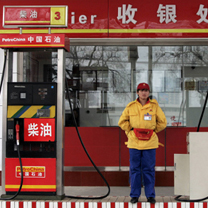 A Chinese attendant
waits for customers at a PetroChina petrol station in Beijing. PetroChina has
hired UBS Securities Co to help arrange its A share public offering in Shanghai
this year, according to sources close to the deal. A Chinese attendant
waits for customers at a PetroChina petrol station in Beijing. PetroChina has
hired UBS Securities Co to help arrange its A share public offering in Shanghai
this year, according to sources close to the deal.
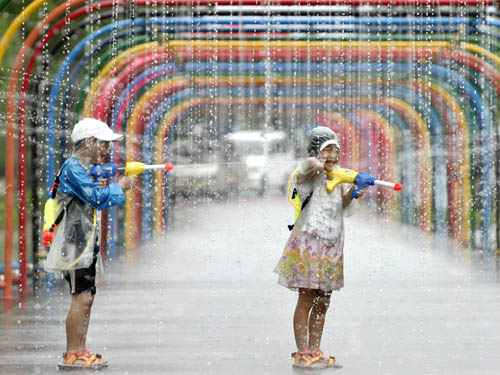 Children play with water
pistols at the Oriental Green Boat water theme park in
Shanghai
Children play with water
pistols at the Oriental Green Boat water theme park in
Shanghai .
The park specially caters to teenagers with after-school activities. Shanghai
looks set to be hot and wet for the weekend and most of next week as summer rain
settles over the region. Temperatures will be around 30 degrees Celsius .
The park specially caters to teenagers with after-school activities. Shanghai
looks set to be hot and wet for the weekend and most of next week as summer rain
settles over the region. Temperatures will be around 30 degrees Celsius
July 1-2, 2007
 Hong Kong:
New China and Hong Kong economic agreement signed - The Chinese central
government and the government of the Hong Kong Special Administrative Region
(HKSAR) signed in Hong Kong Friday Supplement IV to the Mainland and Hong Kong
Closer Economic Partnership Arrangement (CEPA), aiming to further open the
mainland market to Hong Kong. The agreement was signed by Henry Tang, secretary
of Finance of HKSAR government, and Vice Minister of Commerce Liao Xiaoqi,
witnessed by HKSAR Chief Executive Donald Tsang and Minister of Commerce Bo
Xilai. Hong Kong:
New China and Hong Kong economic agreement signed - The Chinese central
government and the government of the Hong Kong Special Administrative Region
(HKSAR) signed in Hong Kong Friday Supplement IV to the Mainland and Hong Kong
Closer Economic Partnership Arrangement (CEPA), aiming to further open the
mainland market to Hong Kong. The agreement was signed by Henry Tang, secretary
of Finance of HKSAR government, and Vice Minister of Commerce Liao Xiaoqi,
witnessed by HKSAR Chief Executive Donald Tsang and Minister of Commerce Bo
Xilai.
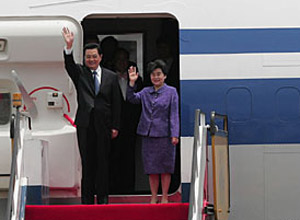 Chinese President Hu Jintao (L)
and his wife Liu Yongqing arrive at Hong Kong International Airport on June 29,
2007. Hu is here to attend the celebrations marking the 10th anniversary of Hong
Kong's return to China and the inauguration of the third-term government of the
Hong Kong Special Administrative Region (HKSAR). Chinese President Hu Jintao
arrived in Hong Kong by special plane at 11:32 a.m. Friday to attend the
celebrations marking the 10th anniversary of Hong Kong's return to China. Chinese President Hu Jintao (L)
and his wife Liu Yongqing arrive at Hong Kong International Airport on June 29,
2007. Hu is here to attend the celebrations marking the 10th anniversary of Hong
Kong's return to China and the inauguration of the third-term government of the
Hong Kong Special Administrative Region (HKSAR). Chinese President Hu Jintao
arrived in Hong Kong by special plane at 11:32 a.m. Friday to attend the
celebrations marking the 10th anniversary of Hong Kong's return to China.
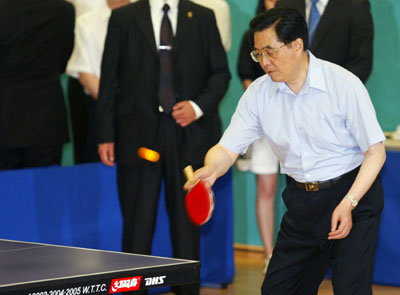 Chinese President Hu Jintao plays table tennis with
a young local player during a visit at a camp site in Hong Kong June 29, 2007.
Hu is on a three-day visit to Hong Kong for celebrating the 10th anniversary of
Hong Kong's return to the motherland.
Chinese President Hu Jintao plays table tennis with
a young local player during a visit at a camp site in Hong Kong June 29, 2007.
Hu is on a three-day visit to Hong Kong for celebrating the 10th anniversary of
Hong Kong's return to the motherland.
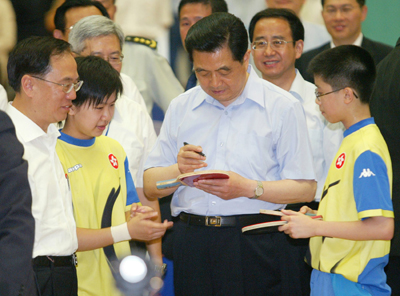 Chinese President Hu Jintao (C)
signs autographs for young local players during a visit at a camp site in Hong
Kong June 29, 2007. Hu is on a three-day visit to Hong Kong for celebrating the
10th anniversary of Hong Kong's return to the motherland.
Chinese President Hu Jintao (C)
signs autographs for young local players during a visit at a camp site in Hong
Kong June 29, 2007. Hu is on a three-day visit to Hong Kong for celebrating the
10th anniversary of Hong Kong's return to the motherland.
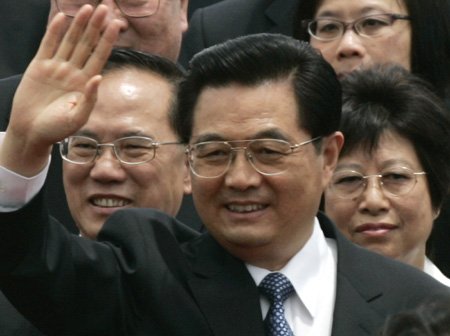 Chinese President Hu Jintao(C) waves upon his
arrival following by Hong Kong's chief executive Donald Tsang(L) and his wife
Selina at the Hong Kong International Airport in Hong Kong June 29, 2007. Hu is
on a three-day visit to Hong Kong for celebrating the 10th anniversary of Hong
Kong's handover to China.
Chinese President Hu Jintao(C) waves upon his
arrival following by Hong Kong's chief executive Donald Tsang(L) and his wife
Selina at the Hong Kong International Airport in Hong Kong June 29, 2007. Hu is
on a three-day visit to Hong Kong for celebrating the 10th anniversary of Hong
Kong's handover to China.
Shanghai and HK: Strength in synergy
- Discovering that size does matter, stock exchanges around the world are
rushing to establish alliances and partnerships with one another that could lead
to outright mergers and acquisitions. The London Stock Exchange recently
announced it has bought Italy's Borsa Italiana SpA for 1.63 billion euros. Weeks
before that, Tokyo Stock Exchange said it has bought a 4.99 percent stake in
Singapore Exchange Ltd to enhance cooperation on derivatives business between
the two bourses. This cooperation between two Asian bourses has given a renewed
impetus to the idea of creating a link between the Hong Kong stock exchange (HKSE)
and the Shanghai and Shenzhen exchanges as many mainland companies are listed on
both bourses. Economists and analysts say stock exchanges are being prompted to
look for partners by rising trading costs, fierce competition in wooing
companies to list, fast-growing derivative products and the ballooning turnover
of hedge funds. "International stock exchanges are in a hurry to expand their
businesses to vie for the limited capital market resources," said Sun Lijian, a
professor with Fudan University. "Stock exchanges are seeking cooperation in
different areas to provide differential services to clients, and avoid the
fierce competition with sub-market leaders," he added. For example, the Tokyo
Stock Exchange is beginning to focus on the derivative market instead of
providing the traditional capital settlement service, which is Hong Kong's main
strength. Asked if similar possibilities of merger and acquisition exists
between Hong Kong and Shanghai stock exchanges, Zhou Wenyao, the admin president
of HKSE, told Security Times that there is no such possibility at the moment
because the renminbi is not freely convertible and the mainland stock exchange
has not been listed. "Besides, the restriction of capital account has not been
totally eased," said Sun. But the benefits from a merger of two bourses, if it
ever happens, are enormous. Joseph Yam, chief executive of the Hong Kong
Monetary Authority (HKMA), said in his recent report: "It's clear, at least to
me, that there would be big advantages if the two markets were linked: overall
liquidity would be increased, price discovery would be made more efficient,
market discipline would be promoted, and it would be easier for market players,
intermediaries and the authorities to manage risks." The mainland is now the
fourth-largest economy in the world in terms of gross domestic product, the
third-largest trading nation, and the largest holder of foreign reserves. "The
creation of a channel between the two markets will allow them to function as one
and enjoy the benefits of one, much larger market," he said. Shanghai Stock
Exchange (SSE) now ranks ninth in the world in terms of total market value and
seventh by total turnover, according to statistics from the World Federation of
Exchanges. In the past six months alone, the market capitalization in SSE has
increased 99 percent to 14.2 trillion yuan, while the daily turnover is up 455
percent to 133 billion yuan. Meanwhile, the average daily turnover at HKSE was
as high as HK$33.9 billion in 2006, up 85 percent from the year before. Its net
profit was up 88 percent to HK$2.519 billion.
Park Lane
Hotel in Causeway Bay has been put up for private sale with an asking price of
about HK$9 billion, sources told Sing Tao Daily, the sister newspaper of The
Standard.
The number of
millionaires in Hong Kong rose by 12.2 percent last year, with more than 86,000
people estimated to have at least US$1 million (HK$7.8 million) in financial
assets, a wealth report has found.
 The Spice Girls, who burst on to the music scene with "girl
power" and attitude in the 1990s, have reunited for a world tour that will
include a Hong Kong date in January.
The Spice Girls, who burst on to the music scene with "girl
power" and attitude in the 1990s, have reunited for a world tour that will
include a Hong Kong date in January.
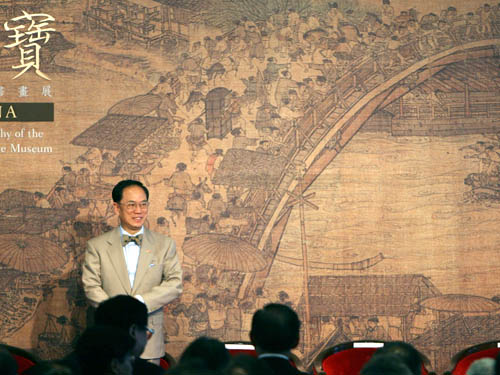 Chief Executive Donald Tsang Yam-kuen at the opening of
the "Pride of China: Masterpieces of Chinese Paintings and Calligraphy"
exhibition at the Hong Kong Museum of Art. Thirty-two artworks, some more than
1,000 years old, have been shipped from the Palace Museum in Beijing to mark the
10th anniversary of the handover. The exhibition runs until July 22. It is the
highest-level exhibition of paintings ever staged by the Palace Museum outside
the mainland.
Chief Executive Donald Tsang Yam-kuen at the opening of
the "Pride of China: Masterpieces of Chinese Paintings and Calligraphy"
exhibition at the Hong Kong Museum of Art. Thirty-two artworks, some more than
1,000 years old, have been shipped from the Palace Museum in Beijing to mark the
10th anniversary of the handover. The exhibition runs until July 22. It is the
highest-level exhibition of paintings ever staged by the Palace Museum outside
the mainland.
 China:
An export processing zone (EPZ)
designed to accommodate the 2.5-billion-dollar chip plant proposed by U.S.
computer chip giant Intel Corp. in northeast China's port city Dalian officially
went into operation Thursday.
China:
An export processing zone (EPZ)
designed to accommodate the 2.5-billion-dollar chip plant proposed by U.S.
computer chip giant Intel Corp. in northeast China's port city Dalian officially
went into operation Thursday.
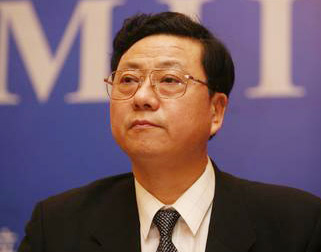 Yang Liangsong,
president of the China Economic Herald - Oil reserve director named, The body
intended to manage the strategic oil reserve took a step closer to reality
yesterday with the announcement that a director had been slated to run it, an
industry source said. Yang Liangsong, president of the China Economic Herald, a
newspaper run by the National Development and Reform Commission (NDRC), will
take the reins, according to the source from the NDRC's energy bureau. Though
the appointment has not been announced officially, Yang is the man for the job,
the source said. And a source at the newspaper said it was already an "open
secret" that Yang would assume the post. "It is true," the source said. "We have
known about this since last week." Yang, a native of Central China's Hubei
Province, worked for the State Development Planning Commission, the predecessor
of the NDRC, before being named president of the newspaper in the 1990s. China,
as the world's second largest oil consumer, has already kicked off work on its
first four strategic oil reserve bases and is busying selecting a second batch.
Yang Liangsong,
president of the China Economic Herald - Oil reserve director named, The body
intended to manage the strategic oil reserve took a step closer to reality
yesterday with the announcement that a director had been slated to run it, an
industry source said. Yang Liangsong, president of the China Economic Herald, a
newspaper run by the National Development and Reform Commission (NDRC), will
take the reins, according to the source from the NDRC's energy bureau. Though
the appointment has not been announced officially, Yang is the man for the job,
the source said. And a source at the newspaper said it was already an "open
secret" that Yang would assume the post. "It is true," the source said. "We have
known about this since last week." Yang, a native of Central China's Hubei
Province, worked for the State Development Planning Commission, the predecessor
of the NDRC, before being named president of the newspaper in the 1990s. China,
as the world's second largest oil consumer, has already kicked off work on its
first four strategic oil reserve bases and is busying selecting a second batch.
 China's Yi Jianlian, the first international player taken
in the 2007 NBA Draft, said he was surprised by being selected with the sixth
pick of the first round by the Milwaukee Bucks on Thursday.
China's Yi Jianlian, the first international player taken
in the 2007 NBA Draft, said he was surprised by being selected with the sixth
pick of the first round by the Milwaukee Bucks on Thursday.
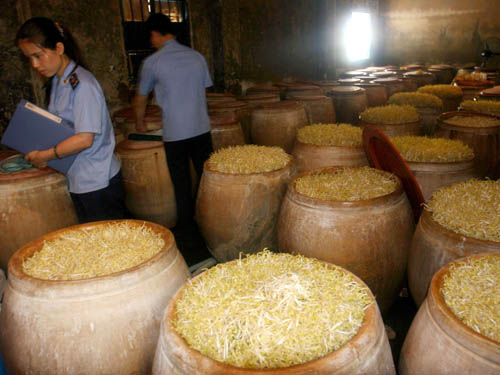 The mainland yesterday defended its food safety standards and guaranteed the
quality of its exports, in rare public comments aimed at addressing rising
international concern over its products. Ministry of Commerce spokesman Wang
Xinpei said the mainland had "paid great attention" to the issue, especially
with regard to food products, because of health concerns. "China has taken all
measures to ensure its products are in line with international practices and
safety standards and the quality of food imported from China is guaranteed," Mr
Wang said. His remarks were Beijing's most direct reaction so far to rising
international pressure following a raft of safety concerns this year, beginning
with the death of animals in the US due to contaminated pet food.
The mainland yesterday defended its food safety standards and guaranteed the
quality of its exports, in rare public comments aimed at addressing rising
international concern over its products. Ministry of Commerce spokesman Wang
Xinpei said the mainland had "paid great attention" to the issue, especially
with regard to food products, because of health concerns. "China has taken all
measures to ensure its products are in line with international practices and
safety standards and the quality of food imported from China is guaranteed," Mr
Wang said. His remarks were Beijing's most direct reaction so far to rising
international pressure following a raft of safety concerns this year, beginning
with the death of animals in the US due to contaminated pet food.

*News information are obtained via various
sources deemed reliable, but not guaranteed

|
![]()
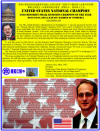 USA Small Business Administration (SBA)
Selected Johnson Choi/HKCHcc
2008 United States
National Champion
USA Small Business Administration (SBA)
Selected Johnson Choi/HKCHcc
2008 United States
National Champion![]()
![]() and follow us
on
and follow us
on
![]()

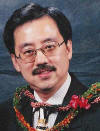
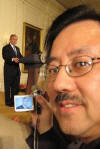
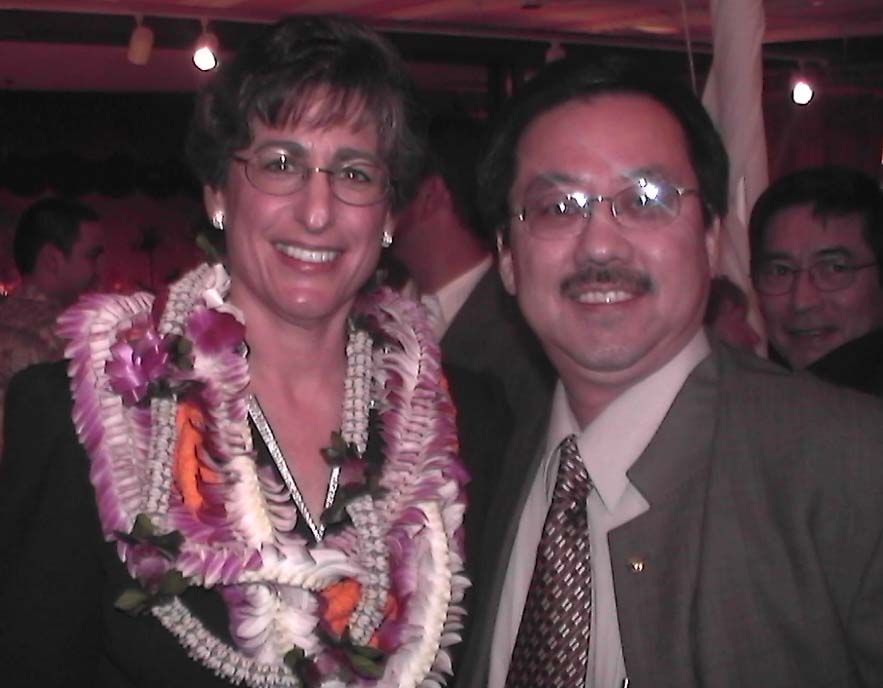
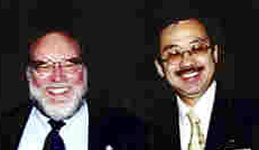
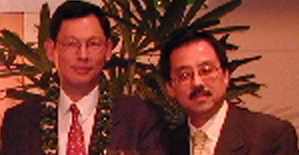
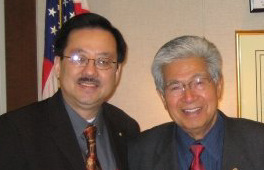


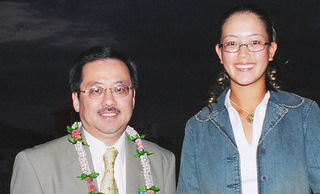
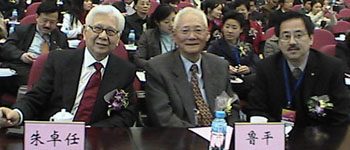
















 The uniforms
may have been hot and the boots heavy, but the first intake of girls to complete
a two-week military training course with the PLA had nothing but praise for the
experience. "Quite a lot of the students suffered heatstroke during training.
Some fainted when we marched, practised martial arts and went hiking. But none
of us gave up and we insisted on completing the course," said Law Shuk-yu, one
of the 50 girls who took part in the summer camp. The girls were among about 200
secondary school students who graduated yesterday from the gruelling third
annual Military Summer Camp for Hong Kong Youth with the PLA's local garrison.
Although this year's camp was the first to include girls, the students were
undaunted by the experience, and all managed to adjust to the tough training and
strict discipline in a day or two. It was the heat that posed the biggest
challenge during their 15-day stay at the People's Liberation Army barracks in
San Wai, Fanling. Demonstrating the skills they had learned over the two weeks
and sitting through yesterday's hours-long graduation ceremony under the fierce
sun was the last challenge before leaving the camp. "The long-sleeved uniform
and heavy leather boots are really killing us. It's made us wonder how the
officers stand it. They are very tough!" said Shuk-yu, a Form Three student at
Kiangsu-Chekiang College. "Though it's tough, I will sign up for the camp again
if I have the chance. I learned a lot from the training. I used to be a loner,
but now realise the importance of team spirit." The Form Three and Form Four
students who took part in the camp were nominated by their principals and
screened by the Education and Manpower Bureau. Apart from the tough military
drills, discipline, use of weapons and defence theory, the students also had to
attend lessons on Chinese history, China's development and on how the PLA
operates. The course, which was originally proposed by Betty Tung Chiu
Hung-ping, wife of former chief executive Tung Chee-hwa, also included first
aid.
The uniforms
may have been hot and the boots heavy, but the first intake of girls to complete
a two-week military training course with the PLA had nothing but praise for the
experience. "Quite a lot of the students suffered heatstroke during training.
Some fainted when we marched, practised martial arts and went hiking. But none
of us gave up and we insisted on completing the course," said Law Shuk-yu, one
of the 50 girls who took part in the summer camp. The girls were among about 200
secondary school students who graduated yesterday from the gruelling third
annual Military Summer Camp for Hong Kong Youth with the PLA's local garrison.
Although this year's camp was the first to include girls, the students were
undaunted by the experience, and all managed to adjust to the tough training and
strict discipline in a day or two. It was the heat that posed the biggest
challenge during their 15-day stay at the People's Liberation Army barracks in
San Wai, Fanling. Demonstrating the skills they had learned over the two weeks
and sitting through yesterday's hours-long graduation ceremony under the fierce
sun was the last challenge before leaving the camp. "The long-sleeved uniform
and heavy leather boots are really killing us. It's made us wonder how the
officers stand it. They are very tough!" said Shuk-yu, a Form Three student at
Kiangsu-Chekiang College. "Though it's tough, I will sign up for the camp again
if I have the chance. I learned a lot from the training. I used to be a loner,
but now realise the importance of team spirit." The Form Three and Form Four
students who took part in the camp were nominated by their principals and
screened by the Education and Manpower Bureau. Apart from the tough military
drills, discipline, use of weapons and defence theory, the students also had to
attend lessons on Chinese history, China's development and on how the PLA
operates. The course, which was originally proposed by Betty Tung Chiu
Hung-ping, wife of former chief executive Tung Chee-hwa, also included first
aid.  The number of unmarried Hong Kong women living on their
own has jumped 43.8 per cent in five years because of the trend among local men
to marry mainlanders, according to a University of Hong Kong statistician. The
results of the 2006 census, released yesterday, showed that 182,648 women were
living alone, compared with 127,001 in 2001 and 103,938 in 1996. The number of
lone men has increased just 14.1 per cent, to 185,005, since 2001. University of
Hong Kong statistician Paul Yip Siu-fai said the increasingly large number of
Hong Kong men marrying mainlanders had fuelled the imbalance between single men
and women. "The imbalance is likely to grow further in the near future," he
said. Last year, about 28,000 Hong Kong men married mainland women, an increase
of more than 80 per cent on 2001. But only about 6,500 Hong Kong women married
across the border last year. Another reason for the increasing number of lone
women is that they are becoming more independent and better educated, according
to Dr Yip. "Many women can support themselves financially and feel less need to
get married," he said. Another factor is the changing gender ratio. A decade
ago, the sexes were equal in number; now there are only 961 men for every 1,000
women. The number of single mothers has risen 27.8 per cent to 57,613 since
2001, while the number of single fathers has grown 9.8 per cent to 14,713. "The
growing divorce rate will cause serious social ills, such as behavioural
problems among the children of single parents," Dr Yip said. There were 65,626
births in the city last year, up 36 per cent from 2001. Part of the increase was
due to mainlanders giving birth in the city. One in every four babies born in
the city last year had mainland parents. The Senior Citizen Home Safety
Association, which provides personal emergency services to elderly people who
live alone, said the government should improve medical services in the face of
the increasing number of people living alone. "Regardless of the gender, the
number of people living alone has increased in the past years. It is vital for
the government to provide better medical service for them as the population of
Hong Kong is ageing," the association's executive director, Ma Kam-wah, said. Mr
Ma said a change of mentality had boosted the number of elderly women living
alone: "Most elderly people, especially mothers, prefer living alone rather than
staying with their married children as they believe the family relationship will
be better if they don't live under the same roof."
The number of unmarried Hong Kong women living on their
own has jumped 43.8 per cent in five years because of the trend among local men
to marry mainlanders, according to a University of Hong Kong statistician. The
results of the 2006 census, released yesterday, showed that 182,648 women were
living alone, compared with 127,001 in 2001 and 103,938 in 1996. The number of
lone men has increased just 14.1 per cent, to 185,005, since 2001. University of
Hong Kong statistician Paul Yip Siu-fai said the increasingly large number of
Hong Kong men marrying mainlanders had fuelled the imbalance between single men
and women. "The imbalance is likely to grow further in the near future," he
said. Last year, about 28,000 Hong Kong men married mainland women, an increase
of more than 80 per cent on 2001. But only about 6,500 Hong Kong women married
across the border last year. Another reason for the increasing number of lone
women is that they are becoming more independent and better educated, according
to Dr Yip. "Many women can support themselves financially and feel less need to
get married," he said. Another factor is the changing gender ratio. A decade
ago, the sexes were equal in number; now there are only 961 men for every 1,000
women. The number of single mothers has risen 27.8 per cent to 57,613 since
2001, while the number of single fathers has grown 9.8 per cent to 14,713. "The
growing divorce rate will cause serious social ills, such as behavioural
problems among the children of single parents," Dr Yip said. There were 65,626
births in the city last year, up 36 per cent from 2001. Part of the increase was
due to mainlanders giving birth in the city. One in every four babies born in
the city last year had mainland parents. The Senior Citizen Home Safety
Association, which provides personal emergency services to elderly people who
live alone, said the government should improve medical services in the face of
the increasing number of people living alone. "Regardless of the gender, the
number of people living alone has increased in the past years. It is vital for
the government to provide better medical service for them as the population of
Hong Kong is ageing," the association's executive director, Ma Kam-wah, said. Mr
Ma said a change of mentality had boosted the number of elderly women living
alone: "Most elderly people, especially mothers, prefer living alone rather than
staying with their married children as they believe the family relationship will
be better if they don't live under the same roof." It's not quite
Venice or Cannes, but Twins member Charlene Choi Cheuk-yin made a bit of a mark
on the international film festival scene last week. The Canto-idol was voted
best actress at this year's 11th annual Puchon International Fantastic Film
Festival in South Korea for her performance in Oxide Pang Chun's new spooker,
Diary. Choi plays a psychotic woman searching for her boyfriend. "When I was
told about the news, I was shocked and I called a lot of people to check if it
was for real," Choi said. The Puchon festival focuses on genre works of a love,
fantasy and adventure nature, far more audience oriented than other more
high-minded artistic showcases. Choi said her success was a result of lessons
with her Simply Actors co-star Jim Chim Sui-man. "I really want to say thank you
to my teacher, 'Jim Sir'. He helped me improve on my acting a lot." Now, if we
can just find her a voice coach for singing.
It's not quite
Venice or Cannes, but Twins member Charlene Choi Cheuk-yin made a bit of a mark
on the international film festival scene last week. The Canto-idol was voted
best actress at this year's 11th annual Puchon International Fantastic Film
Festival in South Korea for her performance in Oxide Pang Chun's new spooker,
Diary. Choi plays a psychotic woman searching for her boyfriend. "When I was
told about the news, I was shocked and I called a lot of people to check if it
was for real," Choi said. The Puchon festival focuses on genre works of a love,
fantasy and adventure nature, far more audience oriented than other more
high-minded artistic showcases. Choi said her success was a result of lessons
with her Simply Actors co-star Jim Chim Sui-man. "I really want to say thank you
to my teacher, 'Jim Sir'. He helped me improve on my acting a lot." Now, if we
can just find her a voice coach for singing. China:
U.S. Treasury Secretary Henry Paulson arrived in Xining, capital of northwest
China's Qinghai Province Sunday evening, kicking off his "environmental tour" in
the country. Paulson's tour in Qinghai, home to China's largest salt water lake
Qinghai Lake, includes visiting local environmental protection programs. He will
also visit some rural households in the remote province on the Qinghai-Tibet
Plateau, dubbed the "roof of the world". As special representative of the U.S.
President, Paulson will visit China from July 29 to Aug. 1 to exchange views on
the process of the U.S.-China Strategic Economic Dialogue, China's Foreign
Ministry spokesman Liu Jianchao announced on Thursday. Collaborating on energy
and environmental challenges is one of the key focuses of the U.S.-China
Strategic Economic Dialogue (SED) launched by U.S. President George W. Bush and
Chinese President Hu Jintao last year, which was established to provide a
focused and effective framework for addressing issues of mutual concern. Before
flying to Xining, Paulson had made a brief stopover in Beijing on Sunday
afternoon. He will return to Beijing on Tuesday. President Hu Jintao will meet
with him and Vice Premier Wu Yi will hold talks with him as Hu's special
representative. This is Paulson's second visit to China this year, following his
short tour in March.
China:
U.S. Treasury Secretary Henry Paulson arrived in Xining, capital of northwest
China's Qinghai Province Sunday evening, kicking off his "environmental tour" in
the country. Paulson's tour in Qinghai, home to China's largest salt water lake
Qinghai Lake, includes visiting local environmental protection programs. He will
also visit some rural households in the remote province on the Qinghai-Tibet
Plateau, dubbed the "roof of the world". As special representative of the U.S.
President, Paulson will visit China from July 29 to Aug. 1 to exchange views on
the process of the U.S.-China Strategic Economic Dialogue, China's Foreign
Ministry spokesman Liu Jianchao announced on Thursday. Collaborating on energy
and environmental challenges is one of the key focuses of the U.S.-China
Strategic Economic Dialogue (SED) launched by U.S. President George W. Bush and
Chinese President Hu Jintao last year, which was established to provide a
focused and effective framework for addressing issues of mutual concern. Before
flying to Xining, Paulson had made a brief stopover in Beijing on Sunday
afternoon. He will return to Beijing on Tuesday. President Hu Jintao will meet
with him and Vice Premier Wu Yi will hold talks with him as Hu's special
representative. This is Paulson's second visit to China this year, following his
short tour in March.  Photo taken on July
28, 2007 shows Chinese President Hu Jintao (front, center) chats with an elder
woman in a residential community of Hangzhou, capital of east China’s Zhejiang
Province, during his inspection tour in the province. Hu Jintao has urged
officials to keep cleanhanded and devote themselves to the construction of a
harmonious and all-around better-off society. Hu, also general secretary of the
Central Committee of the Communist Party of China (CPC), made the remarks during
an inspection tour in east China’s Zhejiang Province from Saturday to Sunday.
Photo taken on July
28, 2007 shows Chinese President Hu Jintao (front, center) chats with an elder
woman in a residential community of Hangzhou, capital of east China’s Zhejiang
Province, during his inspection tour in the province. Hu Jintao has urged
officials to keep cleanhanded and devote themselves to the construction of a
harmonious and all-around better-off society. Hu, also general secretary of the
Central Committee of the Communist Party of China (CPC), made the remarks during
an inspection tour in east China’s Zhejiang Province from Saturday to Sunday. Children enjoy
the cool from water fountains in Shanghai's People's Square Sunday night. The
temperature reached 39.6 celsius on Sunday, July 29, 2007, a record high for the
city in the past 63 years.
Children enjoy
the cool from water fountains in Shanghai's People's Square Sunday night. The
temperature reached 39.6 celsius on Sunday, July 29, 2007, a record high for the
city in the past 63 years. A boy is attracted by
large screen flat-panel TV sets in a supermarket in Beijing. China's LCD TV
output reached 6.34 million sets in the 1st half, up 65.4% on the previous year.
A boy is attracted by
large screen flat-panel TV sets in a supermarket in Beijing. China's LCD TV
output reached 6.34 million sets in the 1st half, up 65.4% on the previous year. For months, US
lawmakers have been warning Treasury Secretary Henry Paulson their patience was
wearing thin as his dialogue with Beijing failed to produce breakthroughs on
currency revaluation and other disputes. This week, as Paulson meets with
mainland leaders, he faces new pressure in Congress, where proposed measures
might punish Beijing for manipulating its currency. "The problem is there is
very little [Paulson] can do in the immediate future that will make Congress
happy," said Andy Rothman, a China strategist for investment bank CLSA. Paulson
will discuss with President Hu Jintao and Vice Premier Wu Yi, the lead mainland
negotiator in the Sino- US "strategic economic dialogue," progress in the talks
that was launched last year to resolve China's swelling trade surplus and other
issues. But Paulson's real target audience is as much Congress as Beijing.
"Paulson is going to be hoping to come back from the current trip with private
whisperings and confidences that he can share with members of Congress so as to
discourage drastic action," said Sherman Katz, a former trade lawyer and
researcher at the Carnegie Endowment for International Peace in Washington.
Paulson has appealed for patience, saying the dialogue launched in December
needs time to produce results on key fronts such as yuan controls, product
piracy, barriers to foreign entry into its financial industries and trade.
Beijing has begun easing currency controls and reining in its trade surplus.
Yet, the United States and other countries that have seen trade deficits with
the mainland soar are demanding swifter action. Last week, over Paulson's
objections, a Senate panel approved a bill mandating the US Treasury identify
and punish "currency manipulators." Another proposal would tighten the legal
definition of currency manipulation to target China. Beijing says the yuan will
eventually be freely traded. But it says abrupt changes would hurt its
underdeveloped banking industry and cause financial turmoil. China revalued the
yuan by 2.1 percent against the US dollar in July 2005 and allowed it to
appreciate by 7.2 percent since then. Last week the yuan traded at 7.6 to the
greenback. Analysts expect the yuan to rise by an average of 5 percent annually
over the next few years - yet critics demand more. On Sunday, Paulson visited
Qinghai Lake in the far west to highlight environmental challenges amid the
country's breakneck growth. Paulson's stature as a former Goldman Sachs head and
personal lobbying of Congress have bought him time, analysts say. But China's
supercharged economic performance has fueled arguments that it can afford to
move faster. China grew by 11.9 percent last quarter - the fastest quarterly
rise since 1995 - and its trade surplus jumped by 85 percent last month to
US$26.9 billion (HK$209.82 billion). Beijing's international standing has been
hurt by a string of product safety complaints about exports ranging from toxic
toothpaste to faulty tires, says Katz. He added: "It contributes to a sense that
... [Beijing] may be a government that has a lot to learn about acting as a
responsible citizen in the global economy."
For months, US
lawmakers have been warning Treasury Secretary Henry Paulson their patience was
wearing thin as his dialogue with Beijing failed to produce breakthroughs on
currency revaluation and other disputes. This week, as Paulson meets with
mainland leaders, he faces new pressure in Congress, where proposed measures
might punish Beijing for manipulating its currency. "The problem is there is
very little [Paulson] can do in the immediate future that will make Congress
happy," said Andy Rothman, a China strategist for investment bank CLSA. Paulson
will discuss with President Hu Jintao and Vice Premier Wu Yi, the lead mainland
negotiator in the Sino- US "strategic economic dialogue," progress in the talks
that was launched last year to resolve China's swelling trade surplus and other
issues. But Paulson's real target audience is as much Congress as Beijing.
"Paulson is going to be hoping to come back from the current trip with private
whisperings and confidences that he can share with members of Congress so as to
discourage drastic action," said Sherman Katz, a former trade lawyer and
researcher at the Carnegie Endowment for International Peace in Washington.
Paulson has appealed for patience, saying the dialogue launched in December
needs time to produce results on key fronts such as yuan controls, product
piracy, barriers to foreign entry into its financial industries and trade.
Beijing has begun easing currency controls and reining in its trade surplus.
Yet, the United States and other countries that have seen trade deficits with
the mainland soar are demanding swifter action. Last week, over Paulson's
objections, a Senate panel approved a bill mandating the US Treasury identify
and punish "currency manipulators." Another proposal would tighten the legal
definition of currency manipulation to target China. Beijing says the yuan will
eventually be freely traded. But it says abrupt changes would hurt its
underdeveloped banking industry and cause financial turmoil. China revalued the
yuan by 2.1 percent against the US dollar in July 2005 and allowed it to
appreciate by 7.2 percent since then. Last week the yuan traded at 7.6 to the
greenback. Analysts expect the yuan to rise by an average of 5 percent annually
over the next few years - yet critics demand more. On Sunday, Paulson visited
Qinghai Lake in the far west to highlight environmental challenges amid the
country's breakneck growth. Paulson's stature as a former Goldman Sachs head and
personal lobbying of Congress have bought him time, analysts say. But China's
supercharged economic performance has fueled arguments that it can afford to
move faster. China grew by 11.9 percent last quarter - the fastest quarterly
rise since 1995 - and its trade surplus jumped by 85 percent last month to
US$26.9 billion (HK$209.82 billion). Beijing's international standing has been
hurt by a string of product safety complaints about exports ranging from toxic
toothpaste to faulty tires, says Katz. He added: "It contributes to a sense that
... [Beijing] may be a government that has a lot to learn about acting as a
responsible citizen in the global economy." Shanghai villas
see strong demand, Limited supply and steady inflow of expatriate staff underpin
high-end rental market. A steady inflow of expatriates and limited fresh supply
due to land policies will underpin continued strong demand for Shanghai's
upmarket villas, analysts say. The latest data from property consultants shows
Shanghai's villa residential market has taken in stride various control measures
introduced since 2005 to cool the mainland's overheated property market. The
average monthly rent fetched by villas reached US$21.50 per square metre in the
first half of the year, up 6.5 per cent from the same period last year,
according to statistics from Colliers International. The overall vacancy rate
was 10.6 per cent, compared with 15.9 per cent last year. In the villa district
of Changning, the vacancy rate was unchanged, while in Minhang, vacancies fell
12 percentage points to 6.7 per cent. And although 13.6 per cent of Pudong
district's luxury villas remained vacant, the vacancy rate was down 6.9
percentage points from the same period last year, the figures showed. The
gradual opening of the mainland financial sector and growing domestic consumer
demand had lured foreign banks and retail giants to expand aggressively in the
mainland, analysts said. Official data showed that by the end of April, Shanghai
was home to 57,000 registered expatriates - 11.8 per cent up from the previous
year. Larry Hu, head of residential consultancy at Knight Frank Shanghai, said
he was optimistic about the outlook for the villa market. "A quarter of the
expatriates living in Shanghai rent luxury homes with monthly rents ranging from
US$3,000 to US$10,000," said Mr Hu, who added that expatriates accounted for
more than 90 per cent of the total luxury residential leasing market in
Shanghai. Meanwhile, in a move to cap the supply of upmarket villas, the
Ministry of Land and Resources and the National Development and Reform
Commission jointly reiterated this month a policy to end new land approvals for
villa developments. Lina Wong, managing director for East China at Colliers
International, said the measures would boost the villa market. "The rising
number of expatriates and the future limited new supply will help the outlook
for the villa leasing market," she said.
Shanghai villas
see strong demand, Limited supply and steady inflow of expatriate staff underpin
high-end rental market. A steady inflow of expatriates and limited fresh supply
due to land policies will underpin continued strong demand for Shanghai's
upmarket villas, analysts say. The latest data from property consultants shows
Shanghai's villa residential market has taken in stride various control measures
introduced since 2005 to cool the mainland's overheated property market. The
average monthly rent fetched by villas reached US$21.50 per square metre in the
first half of the year, up 6.5 per cent from the same period last year,
according to statistics from Colliers International. The overall vacancy rate
was 10.6 per cent, compared with 15.9 per cent last year. In the villa district
of Changning, the vacancy rate was unchanged, while in Minhang, vacancies fell
12 percentage points to 6.7 per cent. And although 13.6 per cent of Pudong
district's luxury villas remained vacant, the vacancy rate was down 6.9
percentage points from the same period last year, the figures showed. The
gradual opening of the mainland financial sector and growing domestic consumer
demand had lured foreign banks and retail giants to expand aggressively in the
mainland, analysts said. Official data showed that by the end of April, Shanghai
was home to 57,000 registered expatriates - 11.8 per cent up from the previous
year. Larry Hu, head of residential consultancy at Knight Frank Shanghai, said
he was optimistic about the outlook for the villa market. "A quarter of the
expatriates living in Shanghai rent luxury homes with monthly rents ranging from
US$3,000 to US$10,000," said Mr Hu, who added that expatriates accounted for
more than 90 per cent of the total luxury residential leasing market in
Shanghai. Meanwhile, in a move to cap the supply of upmarket villas, the
Ministry of Land and Resources and the National Development and Reform
Commission jointly reiterated this month a policy to end new land approvals for
villa developments. Lina Wong, managing director for East China at Colliers
International, said the measures would boost the villa market. "The rising
number of expatriates and the future limited new supply will help the outlook
for the villa leasing market," she said. The Exchange Fund earned
investment income of HK$47 billion in the first six months of the year, a 53
percent jump over the same period a year ago, thanks largely to the hot equities
market. The Hong Kong Treasury's share of the take is HK$13.3 billion. Figures
released yesterday by the Hong Kong Monetary Authority show the Exchange Fund
gained a total of HK$15.1 billion from Hong Kong equities, an increase of 41
percent over the previous year; HK$12.3 billion from bond returns, up 193
percent; HK$12.1 billion from gains on other equities, a surge of 246 percent;
and HK$7.5 billion from foreign exchange gains, a decline of 39 percent from
HK$12.3 billion. "The outlook for Hong Kong's equity market for the second half
will be quite volatile, but bullish," said Billy Mak, associate professor in the
department of finance and decision sciences at Hong Kong Baptist University. The
positive outlook, he added, stems from expectations that corporate earning
performances will be strong amid robust economic growth. The drop in the
Exchange Fund's exchange valuation gain was attributed to the weak US dollar.
Mak said the fund is already investing a sizable portion of foreign currency
reserves in US dollar assets for the purpose of safeguarding the Hong Kong
dollar currency peg. "So the weakening US dollar will definitely affect that
portion," he said. However, this does not mean the Hong Kong dollar should
de-peg from the greenback, said Nicholas Kwan Ka- ming, Asia regional head of
research for Standard Chartered Bank. "The purpose of the Exchange Fund lies in
maintaining monetary stability, and should not be [judged] solely by how much
investment return it is generating," Kwan said. "Exchange gain represents a
small portion of the total investment income of the fund. It can shift the
investment portfolio to make up for the potential loss." Commenting on the
Exchange Fund results, HKMA chief executive Joseph Yam Chi-kwong said despite
continued global economic growth so far in 2007, financial markets have
experienced sharp volatility. He noted the global stock market correction in
late February and early March and the rise in long-term bond yields in May and
June as concerns. "It is nevertheless encouraging that, notwithstanding these
sharp and unexpected market movements, the Exchange Fund has been able to earn
an investment income of HK$47 billion in the first half of the year," Yam said
in a statement published on the HKMA website. He cautioned that sustainability
of the recent stock market rally and investor optimism should not be taken for
granted because uncertainties over global economic strength and interest-rate
movements will continue to cloud the investment outlook in the equity, bond and
currency markets. In his weekly blog "Viewpoint," published on the HKMA website,
Yam also said the issue of the carry trade should be watched. But he believes
the chances of a financial crisis recurring are slim. The Exchange Fund's total
asset value stood at HK$1.257 trillion as of June 30, up by 13.66 percent from
the HK$1.105 trillion a year ago.
The Exchange Fund earned
investment income of HK$47 billion in the first six months of the year, a 53
percent jump over the same period a year ago, thanks largely to the hot equities
market. The Hong Kong Treasury's share of the take is HK$13.3 billion. Figures
released yesterday by the Hong Kong Monetary Authority show the Exchange Fund
gained a total of HK$15.1 billion from Hong Kong equities, an increase of 41
percent over the previous year; HK$12.3 billion from bond returns, up 193
percent; HK$12.1 billion from gains on other equities, a surge of 246 percent;
and HK$7.5 billion from foreign exchange gains, a decline of 39 percent from
HK$12.3 billion. "The outlook for Hong Kong's equity market for the second half
will be quite volatile, but bullish," said Billy Mak, associate professor in the
department of finance and decision sciences at Hong Kong Baptist University. The
positive outlook, he added, stems from expectations that corporate earning
performances will be strong amid robust economic growth. The drop in the
Exchange Fund's exchange valuation gain was attributed to the weak US dollar.
Mak said the fund is already investing a sizable portion of foreign currency
reserves in US dollar assets for the purpose of safeguarding the Hong Kong
dollar currency peg. "So the weakening US dollar will definitely affect that
portion," he said. However, this does not mean the Hong Kong dollar should
de-peg from the greenback, said Nicholas Kwan Ka- ming, Asia regional head of
research for Standard Chartered Bank. "The purpose of the Exchange Fund lies in
maintaining monetary stability, and should not be [judged] solely by how much
investment return it is generating," Kwan said. "Exchange gain represents a
small portion of the total investment income of the fund. It can shift the
investment portfolio to make up for the potential loss." Commenting on the
Exchange Fund results, HKMA chief executive Joseph Yam Chi-kwong said despite
continued global economic growth so far in 2007, financial markets have
experienced sharp volatility. He noted the global stock market correction in
late February and early March and the rise in long-term bond yields in May and
June as concerns. "It is nevertheless encouraging that, notwithstanding these
sharp and unexpected market movements, the Exchange Fund has been able to earn
an investment income of HK$47 billion in the first half of the year," Yam said
in a statement published on the HKMA website. He cautioned that sustainability
of the recent stock market rally and investor optimism should not be taken for
granted because uncertainties over global economic strength and interest-rate
movements will continue to cloud the investment outlook in the equity, bond and
currency markets. In his weekly blog "Viewpoint," published on the HKMA website,
Yam also said the issue of the carry trade should be watched. But he believes
the chances of a financial crisis recurring are slim. The Exchange Fund's total
asset value stood at HK$1.257 trillion as of June 30, up by 13.66 percent from
the HK$1.105 trillion a year ago.  Undeterred by the
market plunge yesterday, shares of high-speed steel maker Tiangong International
(0826) soared on their trading debut, advancing 81.76 percent above the offer
price. Tiangong hit a high of HK$12.10 before pulling back to close at HK$11.56,
up from the offer price of HK$6.36, with HK$1.28 billion worth of shares traded.
The Jiangsu-based company became the fourth best-performing new listing on the
Hong Kong main board. China Communications Services (0552) was the third-highest
gainer on debut, rising 85 percent; China High Speed Transmission (0658) surged
97.7 percent, ranking second; while Beijing Enterprises Holdings (0392) gained
the most, rocketing 222 percent on its May 1997 debut. "Tiangong's performance
was above market expectations of 25 percent," said Cherrie Yan, analyst at
Phillip Securities. The Hang Seng Index retreated from a record high to close
down 0.6 percent yesterday.
Undeterred by the
market plunge yesterday, shares of high-speed steel maker Tiangong International
(0826) soared on their trading debut, advancing 81.76 percent above the offer
price. Tiangong hit a high of HK$12.10 before pulling back to close at HK$11.56,
up from the offer price of HK$6.36, with HK$1.28 billion worth of shares traded.
The Jiangsu-based company became the fourth best-performing new listing on the
Hong Kong main board. China Communications Services (0552) was the third-highest
gainer on debut, rising 85 percent; China High Speed Transmission (0658) surged
97.7 percent, ranking second; while Beijing Enterprises Holdings (0392) gained
the most, rocketing 222 percent on its May 1997 debut. "Tiangong's performance
was above market expectations of 25 percent," said Cherrie Yan, analyst at
Phillip Securities. The Hang Seng Index retreated from a record high to close
down 0.6 percent yesterday.
 Police have arrested
eight people over a HK$5 million internet scam that made use of international
e-auction platform eBay to cheat would-be buyers all over the world. It is
believed more than 10,000 people have been swindled through fraudulent
transactions and police are still trying to ascertain the actual number of
victims. The suspects - five men and three women aged between 18 and 47 - were
detained in raids that began across the territory early yesterday. They are
alleged to have been involved in a well- organized e-auction fraud syndicate
that was smashed following intensive investigations with the help of eBay, which
is based in the United States. Senior Superintendent Man Chi- hung of the
Commercial Crime Bureau's technology crime division said most of the
transactions involved electronic products such as MP3 players and computer
memory cards.
Police have arrested
eight people over a HK$5 million internet scam that made use of international
e-auction platform eBay to cheat would-be buyers all over the world. It is
believed more than 10,000 people have been swindled through fraudulent
transactions and police are still trying to ascertain the actual number of
victims. The suspects - five men and three women aged between 18 and 47 - were
detained in raids that began across the territory early yesterday. They are
alleged to have been involved in a well- organized e-auction fraud syndicate
that was smashed following intensive investigations with the help of eBay, which
is based in the United States. Senior Superintendent Man Chi- hung of the
Commercial Crime Bureau's technology crime division said most of the
transactions involved electronic products such as MP3 players and computer
memory cards.  Executive councillor Cheng
Yiu-tong said yesterday he expects Beijing to give the go-ahead to a proposal
that reportedly will allow up to two million Shenzhen residents easy access to
the SAR. The non-official Exco member, who is also a local NPC deputy and the
president of the Federation of Trade Unions, would not say if such a proposal
would be included in Chief Executive Donald Tsang Yam-kuen's policy address in
October. "But I think there will be little problem [in getting Beijing's
approval]," Cheng said. If approved, he said there would probably be a three-day
time limit on such visits. Cheng chairs the Hong Kong-China Relation Strategic
Development Research Fund, which advocated such an idea in one of its research
studies. According to a Ming Pao report published Wednesday, the proposal would
only affect Shenzhen residents with household records rather than the special
economic zone's entire population of more than eight million. Le Zheng, director
of the Shenzhen Academy of Social Sciences, estimated the scheme would attract
an extra 10,000 to 20,000 Shenzhen residents per day to the territory on one-day
trips.
Executive councillor Cheng
Yiu-tong said yesterday he expects Beijing to give the go-ahead to a proposal
that reportedly will allow up to two million Shenzhen residents easy access to
the SAR. The non-official Exco member, who is also a local NPC deputy and the
president of the Federation of Trade Unions, would not say if such a proposal
would be included in Chief Executive Donald Tsang Yam-kuen's policy address in
October. "But I think there will be little problem [in getting Beijing's
approval]," Cheng said. If approved, he said there would probably be a three-day
time limit on such visits. Cheng chairs the Hong Kong-China Relation Strategic
Development Research Fund, which advocated such an idea in one of its research
studies. According to a Ming Pao report published Wednesday, the proposal would
only affect Shenzhen residents with household records rather than the special
economic zone's entire population of more than eight million. Le Zheng, director
of the Shenzhen Academy of Social Sciences, estimated the scheme would attract
an extra 10,000 to 20,000 Shenzhen residents per day to the territory on one-day
trips. China needs to improve the quality of
its exports to win a better international reputation, Premier Wen Jiabao said
during a meeting on Friday that set out punishments for food and drug firms that
violate standards. "Product quality relates to our people's interest, the
survival and development of our enterprises and the image of our nation," Wen
told the meeting on export quality. It was crucial to win over the international
market with good-quality exports, Wen added. Chinese exports of everything from
fish to toys, pet food to toothpaste, have been found in recent months to be
mislabeled, unsafe or dangerously contaminated, creating an international
backlash. Wen's remarks were reported on state radio and TV. "We will not avoid
problems, but we protest against untrue reports that tell only part of the
story, and trade protectionism and discrimination," Wen was quoted as saying.
Food safety scandals are a regular topic in the Chinese media, but the nation
lacks a basic food safety law and the ability to enforce its food and drug
safety regulations at home or for exports. Its imports are generally carefully
scrutinized. The head of the State Food and Drug Administration was executed
last month, after being found guilty of accepting bribes to approve drugs. "It
is a timely, urgent and important job and also a long-term and enduring task for
us to fully improve the quality of Chinese products," Wen said. China would
raise the threshold for products relating to human health and safety so as to
prevent problematic exports from leaving the country, he said. The authorities
would also check every stage of production, including raw materials, additives
and intermediate products, so as to make the "made in China" brand a symbol for
goods with great quality, Wen said. Producers of food, drugs and other
agricultural goods that violate the food safety rules would face fines of up to
100,000 yuan ($13,220), have operation certificates or export permits cancelled
or even risk arrest, according to regulations carried on the central government
Web site
China needs to improve the quality of
its exports to win a better international reputation, Premier Wen Jiabao said
during a meeting on Friday that set out punishments for food and drug firms that
violate standards. "Product quality relates to our people's interest, the
survival and development of our enterprises and the image of our nation," Wen
told the meeting on export quality. It was crucial to win over the international
market with good-quality exports, Wen added. Chinese exports of everything from
fish to toys, pet food to toothpaste, have been found in recent months to be
mislabeled, unsafe or dangerously contaminated, creating an international
backlash. Wen's remarks were reported on state radio and TV. "We will not avoid
problems, but we protest against untrue reports that tell only part of the
story, and trade protectionism and discrimination," Wen was quoted as saying.
Food safety scandals are a regular topic in the Chinese media, but the nation
lacks a basic food safety law and the ability to enforce its food and drug
safety regulations at home or for exports. Its imports are generally carefully
scrutinized. The head of the State Food and Drug Administration was executed
last month, after being found guilty of accepting bribes to approve drugs. "It
is a timely, urgent and important job and also a long-term and enduring task for
us to fully improve the quality of Chinese products," Wen said. China would
raise the threshold for products relating to human health and safety so as to
prevent problematic exports from leaving the country, he said. The authorities
would also check every stage of production, including raw materials, additives
and intermediate products, so as to make the "made in China" brand a symbol for
goods with great quality, Wen said. Producers of food, drugs and other
agricultural goods that violate the food safety rules would face fines of up to
100,000 yuan ($13,220), have operation certificates or export permits cancelled
or even risk arrest, according to regulations carried on the central government
Web site  Chinese Premier Wen Jiabao said on
Friday that China would strengthen exchanges and cooperation with other
countries to cope with the issue of food safety "in a responsible way" at a
national work meeting in Beijing. The following are measures the Chinese
government has taken since China''s food quality was called into question both
locally and globally. (1) China and the United States will hold a
vice-ministerial-level talk on food security in August and the two sides will
sign a memorandum of understanding on food safety by the end of this year to
enable the two countries to resolve food safety issues more effectively. (2) The
U.S. Health and Human Services officials will visit China at the end of July to
exchange views with Chinese officials on the U.S. detention of four categories
of aquatic products (catfish, basa and dace, shrimp and eel) that were alleged
to contain banned substances. (3) China pledged on July 25 to provide regular
and detailed information about potentially dangerous exports from China based on
European complaints during the visit of Meglena Kuneva, the European
commissioner for consumer protection. (4) China has established bilateral
mechanisms and multi-lateral mechanisms on food safety with its trade partners
including the United States, the European Union, Japan and the Republic of
Korea.
Chinese Premier Wen Jiabao said on
Friday that China would strengthen exchanges and cooperation with other
countries to cope with the issue of food safety "in a responsible way" at a
national work meeting in Beijing. The following are measures the Chinese
government has taken since China''s food quality was called into question both
locally and globally. (1) China and the United States will hold a
vice-ministerial-level talk on food security in August and the two sides will
sign a memorandum of understanding on food safety by the end of this year to
enable the two countries to resolve food safety issues more effectively. (2) The
U.S. Health and Human Services officials will visit China at the end of July to
exchange views with Chinese officials on the U.S. detention of four categories
of aquatic products (catfish, basa and dace, shrimp and eel) that were alleged
to contain banned substances. (3) China pledged on July 25 to provide regular
and detailed information about potentially dangerous exports from China based on
European complaints during the visit of Meglena Kuneva, the European
commissioner for consumer protection. (4) China has established bilateral
mechanisms and multi-lateral mechanisms on food safety with its trade partners
including the United States, the European Union, Japan and the Republic of
Korea. A visitor at Experience Israel, a consumer goods event in Beijing, checks
Israeli wine. Israeli producer hope their high-end products can attract China's
affluent consumers.
A visitor at Experience Israel, a consumer goods event in Beijing, checks
Israeli wine. Israeli producer hope their high-end products can attract China's
affluent consumers. Summer is particularly hot in big
cities. To help city dwellers keep cool through this difficult period, here are
some tips to rescue them from the heat. Summer is particularly hot in big
cities. According to the ancient lunar calendar, the last 10 days of July are
the hottest days in the year. To help city dwellers keep cool through this
difficult period, here are some tips to rescue you from the heat. With the right
liquids, right clothes, right diet and good habits, people can ease through the
hash period of the year without too much difficulty.
Summer is particularly hot in big
cities. To help city dwellers keep cool through this difficult period, here are
some tips to rescue them from the heat. Summer is particularly hot in big
cities. According to the ancient lunar calendar, the last 10 days of July are
the hottest days in the year. To help city dwellers keep cool through this
difficult period, here are some tips to rescue you from the heat. With the right
liquids, right clothes, right diet and good habits, people can ease through the
hash period of the year without too much difficulty. Confrontation over
Darfur 'will lead us nowhere' - It's like sitting around a dinner table:
Westerners use forks and knives, Chinese prefer chopsticks, and Arabs and
Indians their hands. The mediums may be different, the purpose is the same. Why
should all of us have to use forks and knives? You should not force others to
use the medium you like. The same applies to the negotiation table. The solution
to a problem is more important than the means employed. Coercion and
confrontation "will lead us nowhere". This is how China's special envoy to
Darfur Liu Guijin describes the Darfur issue. "China insists on using influence
without interference, and we know respect for all the parties is vital to
finding a solution," Liu said in an interview with China Daily. "If the
situation in Darfur gets out of control or if it gets too late before a solution
is found, it will hurt the interest of not only the people in Darfur, but also
the international community." But to find a fair solution, "you have to learn
how to deal with the Sudanese government" because no peacekeeping operation can
be smooth without its support, Liu said. The international community should not
forget that it is a "legitimate government that deserves respect". "We sit
together to solve the problem and restore peace in Darfur, not to punish one
side in favor of another." China has been trying to find a solution agreeable to
all the parties. It has been trying to alleviate the suffering of the people,
too. It sent a team of agriculture experts to Sudan last month to study the
possibility of setting up an agriculture technology demonstration center. "Such
help targets the right cause of the conflict - poverty." China has already given
$10 million in humanitarian aid and promised to offer more. China has used its
ties with Sudan to build infrastructure such as schools, hospitals and water
projects. But their relations have been politicized by a section of the media
and some NGOs and politicians, Liu said.
Confrontation over
Darfur 'will lead us nowhere' - It's like sitting around a dinner table:
Westerners use forks and knives, Chinese prefer chopsticks, and Arabs and
Indians their hands. The mediums may be different, the purpose is the same. Why
should all of us have to use forks and knives? You should not force others to
use the medium you like. The same applies to the negotiation table. The solution
to a problem is more important than the means employed. Coercion and
confrontation "will lead us nowhere". This is how China's special envoy to
Darfur Liu Guijin describes the Darfur issue. "China insists on using influence
without interference, and we know respect for all the parties is vital to
finding a solution," Liu said in an interview with China Daily. "If the
situation in Darfur gets out of control or if it gets too late before a solution
is found, it will hurt the interest of not only the people in Darfur, but also
the international community." But to find a fair solution, "you have to learn
how to deal with the Sudanese government" because no peacekeeping operation can
be smooth without its support, Liu said. The international community should not
forget that it is a "legitimate government that deserves respect". "We sit
together to solve the problem and restore peace in Darfur, not to punish one
side in favor of another." China has been trying to find a solution agreeable to
all the parties. It has been trying to alleviate the suffering of the people,
too. It sent a team of agriculture experts to Sudan last month to study the
possibility of setting up an agriculture technology demonstration center. "Such
help targets the right cause of the conflict - poverty." China has already given
$10 million in humanitarian aid and promised to offer more. China has used its
ties with Sudan to build infrastructure such as schools, hospitals and water
projects. But their relations have been politicized by a section of the media
and some NGOs and politicians, Liu said.  Hong Kong has been
ranked as the world's eighth most fashionable city in a latest survey by Global
Language Monitor. China News Service Thursday quoted HK's Wen Wei Po newspaper
as saying, also listed as one of the world's most fashionable cities is
Shanghai, eastern China's financial hub, taking the fourteenth place on the top
25 list. The California-based Global Language Monitor says the rise of Shanghai
in the list indicates that a Chinese mainland city has for the first time broken
into the big names. New York was elected as the top fashion city for the fourth
consecutive year. Rome came second and Paris took the third place. Asian cities
on the list also include Tokyo, in the 6th place, Singapore in the 10th and
Bangkok in the 17th. Global Language Monitor, a non-profit organization, is in
charge of documenting, analyzing and tracking trends in language, especially in
English. The American company also conducts fashion surveys.
Hong Kong has been
ranked as the world's eighth most fashionable city in a latest survey by Global
Language Monitor. China News Service Thursday quoted HK's Wen Wei Po newspaper
as saying, also listed as one of the world's most fashionable cities is
Shanghai, eastern China's financial hub, taking the fourteenth place on the top
25 list. The California-based Global Language Monitor says the rise of Shanghai
in the list indicates that a Chinese mainland city has for the first time broken
into the big names. New York was elected as the top fashion city for the fourth
consecutive year. Rome came second and Paris took the third place. Asian cities
on the list also include Tokyo, in the 6th place, Singapore in the 10th and
Bangkok in the 17th. Global Language Monitor, a non-profit organization, is in
charge of documenting, analyzing and tracking trends in language, especially in
English. The American company also conducts fashion surveys. The heatwave has
continued to take its toll, with two deaths and more than a dozen people falling
ill in the past few days, and the temperature soaring to a record high on
southern Hong Kong Island. A dole recipient taking part in outdoor community
work collapsed with suspected heatstroke yesterday, bringing to 13 the number of
people who have been overcome by the heat since Monday. Two people - an outdoor
worker and a teenager playing football - died on Monday and at least eight
people were taken ill. Another five people fell sick on Tuesday. According to
the Hong Kong Observatory, the temperature hit a record high of 38 degrees
Celsius at Repulse Bay on Hong Kong Island yesterday, while temperatures of
above 36 degrees Celsius were recorded in parts of northern New Territories. The
highest temperature on record was 36.1 degrees, which was registered on August
19, 1900, and August 18, 1990. The very hot weather warning was issued on
Tuesday afternoon and remained in force yesterday.
The heatwave has
continued to take its toll, with two deaths and more than a dozen people falling
ill in the past few days, and the temperature soaring to a record high on
southern Hong Kong Island. A dole recipient taking part in outdoor community
work collapsed with suspected heatstroke yesterday, bringing to 13 the number of
people who have been overcome by the heat since Monday. Two people - an outdoor
worker and a teenager playing football - died on Monday and at least eight
people were taken ill. Another five people fell sick on Tuesday. According to
the Hong Kong Observatory, the temperature hit a record high of 38 degrees
Celsius at Repulse Bay on Hong Kong Island yesterday, while temperatures of
above 36 degrees Celsius were recorded in parts of northern New Territories. The
highest temperature on record was 36.1 degrees, which was registered on August
19, 1900, and August 18, 1990. The very hot weather warning was issued on
Tuesday afternoon and remained in force yesterday. 
 A newborn panda cub sleeps in an incubator at Chengdu Research Base of Giant
Panda Breeding in Chengdu, southwest China's Sichuan province July 26, 2007.
A newborn panda cub sleeps in an incubator at Chengdu Research Base of Giant
Panda Breeding in Chengdu, southwest China's Sichuan province July 26, 2007.
 Andy Lau Tak-wah has
signed on to star in a remake of the movie that inspired the 1986 John Woo
gangster classic A Better Tomorrow, a spokeswoman for Lau and the film's
director said. Lau, one of Chinese cinema's biggest stars, has agreed to appear
in the movie called Ying Hong Boon Sik in Cantonese, spokeswoman Alice Tam said
yesterday. He will play a mobster who is betrayed by a close friend, director
Stephen Fung Tak-lun said. Ying Hong Boon Sik is a remake of a 1967 movie by the
same name, Fung said. The 1967 movie inspired A Better Tomorrow, the
Woo-directed action thriller that made Chow Yun-fat's trench-coat wearing,
gun-toting gangster character an icon. It was not immediately clear who is
funding Fung's movie and when he will start shooting. Spokeswoman Emily Wong at
Hong Kong movie company Media Asia, which said earlier it was in talks with Fung
about investing in the movie, said the company was not involved in the project
any more. Fung grabbed headlines recently when Hollywood producer Andrew
Tennenbaum bought the remake rights to the Hong Kong director's comedy Enter The
Phoenix. Tennenbaum produced The Bourne Identity, The Bourne Supremacy and the
upcoming The Bourne Ultimatum. Lau's credits include the kung fu movie House of
Flying Daggers and the crime thriller Infernal Affairs, which was remade by
Martin Scorsese as The Departed. Lau has shot two Chinese historical epics
recently - Three Kingdoms: Resurrection of the Dragon and The Warlords. Lau, who
also sings, is scheduled to launch a concert tour in China this year.
Andy Lau Tak-wah has
signed on to star in a remake of the movie that inspired the 1986 John Woo
gangster classic A Better Tomorrow, a spokeswoman for Lau and the film's
director said. Lau, one of Chinese cinema's biggest stars, has agreed to appear
in the movie called Ying Hong Boon Sik in Cantonese, spokeswoman Alice Tam said
yesterday. He will play a mobster who is betrayed by a close friend, director
Stephen Fung Tak-lun said. Ying Hong Boon Sik is a remake of a 1967 movie by the
same name, Fung said. The 1967 movie inspired A Better Tomorrow, the
Woo-directed action thriller that made Chow Yun-fat's trench-coat wearing,
gun-toting gangster character an icon. It was not immediately clear who is
funding Fung's movie and when he will start shooting. Spokeswoman Emily Wong at
Hong Kong movie company Media Asia, which said earlier it was in talks with Fung
about investing in the movie, said the company was not involved in the project
any more. Fung grabbed headlines recently when Hollywood producer Andrew
Tennenbaum bought the remake rights to the Hong Kong director's comedy Enter The
Phoenix. Tennenbaum produced The Bourne Identity, The Bourne Supremacy and the
upcoming The Bourne Ultimatum. Lau's credits include the kung fu movie House of
Flying Daggers and the crime thriller Infernal Affairs, which was remade by
Martin Scorsese as The Departed. Lau has shot two Chinese historical epics
recently - Three Kingdoms: Resurrection of the Dragon and The Warlords. Lau, who
also sings, is scheduled to launch a concert tour in China this year. Police may use
force if they are attacked when government workers dismantle Queen's Pier,
possibly before the end of this month, Development Secretary Carrie Lam Cheng
Yuet-ngor warned yesterday. "I pledge that we will not use violence to cordon
off the pier area," she told a Legislative Council panel. "It is not the usual
way we do things." But she added an attack would prompt different tactics. Mrs
Lam said the government was still open to options as to where to rebuild the
54-year-old pier. Mrs Lam, who promised to meet the activists on Sunday in a
public forum, said the government would clear the pier area to avoid further
delays in the Central reclamation project.
Police may use
force if they are attacked when government workers dismantle Queen's Pier,
possibly before the end of this month, Development Secretary Carrie Lam Cheng
Yuet-ngor warned yesterday. "I pledge that we will not use violence to cordon
off the pier area," she told a Legislative Council panel. "It is not the usual
way we do things." But she added an attack would prompt different tactics. Mrs
Lam said the government was still open to options as to where to rebuild the
54-year-old pier. Mrs Lam, who promised to meet the activists on Sunday in a
public forum, said the government would clear the pier area to avoid further
delays in the Central reclamation project. 
 Australian actress still to work with HK director - A
much-anticipated project involving Nicole Kidman and Wong Kar-wai is still
alive, but it is not easy co-ordinating the schedules of the Oscar-winning
actress and Hong Kong director, Kidman’s publicist said on Wednesday. “I can
tell you that they still continue to discuss making the movie together. I
believe it is a matter of both of their schedules, not just Ms Kidman’s,” the
publicist, Catherine Olim, said in an e-mail to AP. Charlotte Yu, a spokesman
for Wong’s production company, Jettone Films, said she did not know the latest
status of the film, tentatively called Lady from Shanghai. Little is known about
the film, and its story has not been made public. Wong was quoted as saying in
May 2005 he had started preparing for the film. A film consultant told AP in
February 2006 that the project was being delayed to 2007 because Wong had not
found a strong male lead. But there are no signs that Wong will start shooting
this year. His English debut, My Blueberry Nights, is scheduled to be released
in November and Wong will likely be tied up with promoting that film until then.
Wong, who was born in Shanghai and moved to the territory at the age of five, is
a Hong Kong icon. He has international reputation for art-house films with
mood-setting visuals and melancholy soundtracks. He has attracted a strong
following among the Hollywood elite despite making mostly Chinese-language
films. His breakthrough film was 1994’sChungking Express in which the tagline
“If my memory of her has an expiration date, let it be 10,000 years...” became a
classical quote for lovers. Happy Together won him the best director title in
the Cannes Festival in 1997. Wong is known for not using detailed scripts for
his films. Many of his films feature famous Hong Kong stars including Maggie
Cheung Man-yuk, Tony Leung Chiu-wai and Faye Wong. Japanese star Takuya Kimura
played a part in the 2004 film 2046.Kidman has been quoted as referring to Wong
as “God”. Other Americans have similar views. Director Sofia Coppola praised
Wong in her Oscar acceptance speech in 2004. Quentin Tarantino lists Wong’s 1994
Chungking Express as one of his favourite films. My Blueberry Nights, the
opening film in this year’s Cannes Festival, features a distinguished cast
including Jude Law, Natalie Portman, Rachel Weisz and Grammy-winning singer
Norah Jones in her film debut. Kidman, the Hawaiian-born Australian actress, won
best actress Oscar for The Hours in 2002. She was most recently seen in Fur: An
Imaginary Portrait of Diane Arbus.
Australian actress still to work with HK director - A
much-anticipated project involving Nicole Kidman and Wong Kar-wai is still
alive, but it is not easy co-ordinating the schedules of the Oscar-winning
actress and Hong Kong director, Kidman’s publicist said on Wednesday. “I can
tell you that they still continue to discuss making the movie together. I
believe it is a matter of both of their schedules, not just Ms Kidman’s,” the
publicist, Catherine Olim, said in an e-mail to AP. Charlotte Yu, a spokesman
for Wong’s production company, Jettone Films, said she did not know the latest
status of the film, tentatively called Lady from Shanghai. Little is known about
the film, and its story has not been made public. Wong was quoted as saying in
May 2005 he had started preparing for the film. A film consultant told AP in
February 2006 that the project was being delayed to 2007 because Wong had not
found a strong male lead. But there are no signs that Wong will start shooting
this year. His English debut, My Blueberry Nights, is scheduled to be released
in November and Wong will likely be tied up with promoting that film until then.
Wong, who was born in Shanghai and moved to the territory at the age of five, is
a Hong Kong icon. He has international reputation for art-house films with
mood-setting visuals and melancholy soundtracks. He has attracted a strong
following among the Hollywood elite despite making mostly Chinese-language
films. His breakthrough film was 1994’sChungking Express in which the tagline
“If my memory of her has an expiration date, let it be 10,000 years...” became a
classical quote for lovers. Happy Together won him the best director title in
the Cannes Festival in 1997. Wong is known for not using detailed scripts for
his films. Many of his films feature famous Hong Kong stars including Maggie
Cheung Man-yuk, Tony Leung Chiu-wai and Faye Wong. Japanese star Takuya Kimura
played a part in the 2004 film 2046.Kidman has been quoted as referring to Wong
as “God”. Other Americans have similar views. Director Sofia Coppola praised
Wong in her Oscar acceptance speech in 2004. Quentin Tarantino lists Wong’s 1994
Chungking Express as one of his favourite films. My Blueberry Nights, the
opening film in this year’s Cannes Festival, features a distinguished cast
including Jude Law, Natalie Portman, Rachel Weisz and Grammy-winning singer
Norah Jones in her film debut. Kidman, the Hawaiian-born Australian actress, won
best actress Oscar for The Hours in 2002. She was most recently seen in Fur: An
Imaginary Portrait of Diane Arbus.
 Hong Kong and United States
customs officers will conduct a series of joint factory observation visits in
Hong Kong from August 10. Head of trade controls for the Hong Kong Customs and
Excise Department, Cheung Sai-yan, said on Wednesday the visits were part of a
policy of co-operation between Hong Kong and US customs. Mr Cheung said they
were needed to ensure legitimate textiles and clothing trade continues, as well
as to combat illegal trans-shipment of textiles and clothing products. “The
joint visits will keep the US updated on the manufacture of textiles and
clothing products in Hong Kong and the implementation of Hong Kong’s origin
control programme for textiles and clothing exports,” he said. Mr Cheung said
the visits would facilitate a better understanding by the US Customs authorities
of the effectiveness of Hong Kong’s origin control system. They would also
ensure that textiles and clothing exports claiming to be products of Hong Kong
are genuinely manufactured in Hong Kong, he added. “This will also be conducive
to the legitimate textiles trade especially at a time when restrictive measures
are still in place against certain textile exports from other economies in the
region,” Mr Cheung said. The joint visiting teams, comprising Hong Kong and US
Customs officers, will inspect only textile factories which have given prior
consent. “Joint visit team members will not undertake any enforcement activities
during the visits. Enforcement activities, if necessary, will be undertaken by
Hong Kong Customs officers independently and separately from the visits,” Mr
Cheung said. The visits will not disrupt the production and operation of
factories. The visits, starting from August 10, will last for about two weeks.
Detailed arrangements about the visits have been announced by the Trade and
Industry Department separately through a Notice to Exporters and Certificate of
Origin Circular.
Hong Kong and United States
customs officers will conduct a series of joint factory observation visits in
Hong Kong from August 10. Head of trade controls for the Hong Kong Customs and
Excise Department, Cheung Sai-yan, said on Wednesday the visits were part of a
policy of co-operation between Hong Kong and US customs. Mr Cheung said they
were needed to ensure legitimate textiles and clothing trade continues, as well
as to combat illegal trans-shipment of textiles and clothing products. “The
joint visits will keep the US updated on the manufacture of textiles and
clothing products in Hong Kong and the implementation of Hong Kong’s origin
control programme for textiles and clothing exports,” he said. Mr Cheung said
the visits would facilitate a better understanding by the US Customs authorities
of the effectiveness of Hong Kong’s origin control system. They would also
ensure that textiles and clothing exports claiming to be products of Hong Kong
are genuinely manufactured in Hong Kong, he added. “This will also be conducive
to the legitimate textiles trade especially at a time when restrictive measures
are still in place against certain textile exports from other economies in the
region,” Mr Cheung said. The joint visiting teams, comprising Hong Kong and US
Customs officers, will inspect only textile factories which have given prior
consent. “Joint visit team members will not undertake any enforcement activities
during the visits. Enforcement activities, if necessary, will be undertaken by
Hong Kong Customs officers independently and separately from the visits,” Mr
Cheung said. The visits will not disrupt the production and operation of
factories. The visits, starting from August 10, will last for about two weeks.
Detailed arrangements about the visits have been announced by the Trade and
Industry Department separately through a Notice to Exporters and Certificate of
Origin Circular. Xi'an Aircraft Company (XAC), a
subsidiary of China Aviation Industry Corporation I (AVIC I), yesterday made its
first delivery of an Airbus A319 wing box - making the country Airbus' only wing
box manufacturer outside Europe. The wing box, or the main body of the wing and
among the toughest structural parts of an aircraft, is valued $1.75 million per
set. It will be dispatched to the Airbus assembly plant in Broughton in the UK.
"Airbus has ordered 250 sets of wing boxes from our company. We expect to make
two sets this year. Production will pick up to four sets per month by the end of
2009, and then to six sets per month in 2010," Tang Jun, vice-president of XAC,
told China Daily. Airbus plans to increase its subcontract volume in China from
the current $60 million to $120 million by 2010, about 50 percent of which will
be contributed by the overall wing program, according to company sources.
Yesterday's delivery signals important progress in China's aircraft
manufacturing industry, Tang said. The A319 wing box is the largest and most
complicated Airbus aircraft component a Chinese aviation manufacturer has ever
made. The wing box is the third phase of the long-term technological partnership
between Airbus and China's aviation industry, which started eight years ago. The
first two phases covered technology transfer of wing leading edge track ribs,
and wing leading edge and trailing edge packages. The delivery "reaffirms
Airbus' commitment to a meaningful partnership with China," said Laurence
Barron, Airbus China president. According to Tang, XAC and Airbus are in talks
on more wing-related technology transfer. China expects to obtain the rest of
the wing-related contracts from Airbus by 2009, said Yang Chunsheng, a senior
executive with China National Aero-Technology Import & Export Corporation. If
that comes true, he said, "Xi'an will be able to directly provide Airbus wings
to the future A320 assembly line in Tianjin." Airbus and Chinese partners
officially signed an agreement last month to open the assembly line there to
produce the European aircraft manufacturer's A320 jets. The plant is expected to
deliver its first aircraft in early 2009, Airbus said. The assembly line will be
able to produce four A320s a month by 2011 and a total of about 300 A320 planes
by 2016, the company said.
Xi'an Aircraft Company (XAC), a
subsidiary of China Aviation Industry Corporation I (AVIC I), yesterday made its
first delivery of an Airbus A319 wing box - making the country Airbus' only wing
box manufacturer outside Europe. The wing box, or the main body of the wing and
among the toughest structural parts of an aircraft, is valued $1.75 million per
set. It will be dispatched to the Airbus assembly plant in Broughton in the UK.
"Airbus has ordered 250 sets of wing boxes from our company. We expect to make
two sets this year. Production will pick up to four sets per month by the end of
2009, and then to six sets per month in 2010," Tang Jun, vice-president of XAC,
told China Daily. Airbus plans to increase its subcontract volume in China from
the current $60 million to $120 million by 2010, about 50 percent of which will
be contributed by the overall wing program, according to company sources.
Yesterday's delivery signals important progress in China's aircraft
manufacturing industry, Tang said. The A319 wing box is the largest and most
complicated Airbus aircraft component a Chinese aviation manufacturer has ever
made. The wing box is the third phase of the long-term technological partnership
between Airbus and China's aviation industry, which started eight years ago. The
first two phases covered technology transfer of wing leading edge track ribs,
and wing leading edge and trailing edge packages. The delivery "reaffirms
Airbus' commitment to a meaningful partnership with China," said Laurence
Barron, Airbus China president. According to Tang, XAC and Airbus are in talks
on more wing-related technology transfer. China expects to obtain the rest of
the wing-related contracts from Airbus by 2009, said Yang Chunsheng, a senior
executive with China National Aero-Technology Import & Export Corporation. If
that comes true, he said, "Xi'an will be able to directly provide Airbus wings
to the future A320 assembly line in Tianjin." Airbus and Chinese partners
officially signed an agreement last month to open the assembly line there to
produce the European aircraft manufacturer's A320 jets. The plant is expected to
deliver its first aircraft in early 2009, Airbus said. The assembly line will be
able to produce four A320s a month by 2011 and a total of about 300 A320 planes
by 2016, the company said.

 The outside of the Tianjin Olympic Center Stadium. After
over 1,000 days of construction, the stadium is now on its way toward
inauguration.
The outside of the Tianjin Olympic Center Stadium. After
over 1,000 days of construction, the stadium is now on its way toward
inauguration. Guided missile destroyer Guangzhou. Two Chinese naval vessels left Hainan on
Tuesday for an 87-day tour that will take them to Russia, Britain, Spain and
France. Two Chinese naval vessels left Sanya, Hainan, on Tuesday for an 87-day
tour that will take them to Russia, Britain, Spain and France. The guided
missile destroyer Guangzhou and the supply ship Weishanhu are under the command
of Major General Su Zhiqian, deputy commander of the South China Sea Fleet of
the Chinese Navy. The Guangzhou -- 155 meters long, 16 meters wide and with a
displacement of 5,850 tons -- is said to be one of China's newest naval vessels.
The two ships will travel more than 23,000 nautical miles, stopping in Russia's
Saint Petersburg, Britain's Portsmouth, Spain's Cadiz, and France's Toulon in
succession. More than 500 soldiers and officers are on board the vessels. They
will join activities for the Year of China in Saint Petersburg and hold joint
rescue exercises with the British, Spanish and French navies.
Guided missile destroyer Guangzhou. Two Chinese naval vessels left Hainan on
Tuesday for an 87-day tour that will take them to Russia, Britain, Spain and
France. Two Chinese naval vessels left Sanya, Hainan, on Tuesday for an 87-day
tour that will take them to Russia, Britain, Spain and France. The guided
missile destroyer Guangzhou and the supply ship Weishanhu are under the command
of Major General Su Zhiqian, deputy commander of the South China Sea Fleet of
the Chinese Navy. The Guangzhou -- 155 meters long, 16 meters wide and with a
displacement of 5,850 tons -- is said to be one of China's newest naval vessels.
The two ships will travel more than 23,000 nautical miles, stopping in Russia's
Saint Petersburg, Britain's Portsmouth, Spain's Cadiz, and France's Toulon in
succession. More than 500 soldiers and officers are on board the vessels. They
will join activities for the Year of China in Saint Petersburg and hold joint
rescue exercises with the British, Spanish and French navies.

 Ion network - 3i is a
leading private equity business with a history of 62 years. Established in 1945
with funding from the Bank of England, UK clearing banks and the City, seasoned
entrepreneur William Piercy (later Lord Piercy) was appointed to manage the
initial fund. 3i Group listed in London in 1994 and remains the only FTSE 100
Private Equity business, with five different asset classes and $14.3 billion
under management. The company has invested over $250 million in many well-known
Chinese companies, such as: Focus Media, Chinas largest multi-channel
advertising media company; D.Phone, one of China's earliest mobile phone
retailers; PCD, established by Ports CEO, a high-end department store; and Inner
Mongolia Little Sheep Catering Chain Co, China's leading retail hotpot
restaurant chain. 3i is currently invested in more than 500 businesses
worldwide. At least 60 of these businesses operate in Asia, of which more than
35 are in China. Lily Jin was voted the best venture capitalist in 2006 by
Forbes for her investments in Mengniu Dairy and Suntech Power.
Ion network - 3i is a
leading private equity business with a history of 62 years. Established in 1945
with funding from the Bank of England, UK clearing banks and the City, seasoned
entrepreneur William Piercy (later Lord Piercy) was appointed to manage the
initial fund. 3i Group listed in London in 1994 and remains the only FTSE 100
Private Equity business, with five different asset classes and $14.3 billion
under management. The company has invested over $250 million in many well-known
Chinese companies, such as: Focus Media, Chinas largest multi-channel
advertising media company; D.Phone, one of China's earliest mobile phone
retailers; PCD, established by Ports CEO, a high-end department store; and Inner
Mongolia Little Sheep Catering Chain Co, China's leading retail hotpot
restaurant chain. 3i is currently invested in more than 500 businesses
worldwide. At least 60 of these businesses operate in Asia, of which more than
35 are in China. Lily Jin was voted the best venture capitalist in 2006 by
Forbes for her investments in Mengniu Dairy and Suntech Power. Art of
investment - Profile of Li Jianguang - 2000: Vice-President and Partner of IDGVC;
1999: Assistant General Manager, Tintic Trust & Investment; 1994: Manager,
Crosby Group, Beijing Representative Office; 1987: Research Fellow, Chinese
Academy of Social Sciences; 1987: Graduated from Peking University, Economics
Department. IDG Technology Venture Investment (IDGVC Partners) is one of the
most prestigious venture capital firms in China. Since it was first established
in 1992 with offices in Beijing, Shanghai, Guangzhou, Boston and the Silicon
Valley, the organization has invested in a group of unknown start-ups in the
country that later became big names - like Baidu, Focus Media, Sohu, Tencent,
EachNet, Dangdang and Ctrip. One of the earliest US venture capital firms to
enter the Chinese market, IDGVC Partners invests in early to growth-stage
companies and is focused on hi-tech sectors like the Internet,
telecommunications, wireless communications, digital media, IC (integrated
circuit) and life science. It manages over $800 million in capital and has an
investment portfolio of 100 start-up companies, 30 of which have completed
public offerings or successful mergers. Earlier this month, IDG Partners
announced it had successfully raised $510 million in investment for its
IDG-Accel China Fund II in just 45 days. On the eve of the company's new round
of investing, Li Jianguang, vice-president and partner of IDGVC Partners, sat
down with China Business Weekly reporter Wang Xing to talk about the art of
investment.
Art of
investment - Profile of Li Jianguang - 2000: Vice-President and Partner of IDGVC;
1999: Assistant General Manager, Tintic Trust & Investment; 1994: Manager,
Crosby Group, Beijing Representative Office; 1987: Research Fellow, Chinese
Academy of Social Sciences; 1987: Graduated from Peking University, Economics
Department. IDG Technology Venture Investment (IDGVC Partners) is one of the
most prestigious venture capital firms in China. Since it was first established
in 1992 with offices in Beijing, Shanghai, Guangzhou, Boston and the Silicon
Valley, the organization has invested in a group of unknown start-ups in the
country that later became big names - like Baidu, Focus Media, Sohu, Tencent,
EachNet, Dangdang and Ctrip. One of the earliest US venture capital firms to
enter the Chinese market, IDGVC Partners invests in early to growth-stage
companies and is focused on hi-tech sectors like the Internet,
telecommunications, wireless communications, digital media, IC (integrated
circuit) and life science. It manages over $800 million in capital and has an
investment portfolio of 100 start-up companies, 30 of which have completed
public offerings or successful mergers. Earlier this month, IDG Partners
announced it had successfully raised $510 million in investment for its
IDG-Accel China Fund II in just 45 days. On the eve of the company's new round
of investing, Li Jianguang, vice-president and partner of IDGVC Partners, sat
down with China Business Weekly reporter Wang Xing to talk about the art of
investment.
 The Hong Kong
director whose movie inspired Oscar-winner The Departed plans to make his
television debut with a Chinese- language kung fu series based on a comic book.
Andrew Lau Wai-keung said in an interview with the Chinese news website Sina.com
that he hopes the series, called A Bi Jian in Chinese, will also spawn a movie
and an online game. Footage of the interview was posted on Sina.com yesterday.
Lau said he wants to give TV a try because it does not have the same time
constraints as a movie. "After making a movie, maybe you weren't able to shoot
many of your ideas, because a movie is only 1 or two hours long, but TV gives
you space to film a lot of things." Lau rose to fame after making the 2002 crime
thriller Infernal Affairs, which was remade by Martin Scorsese as The Departed,
starring Leonardo DiCaprio, Jack Nicholson and Matt Damon. It won the Best
Picture Oscar at the 2007 Academy Awards. Lau has since shot the Hollywood movie
The Flock, starring Richard Gere and Claire Danes. Lau said he plans to devote
the same resources to his TV show as a movie, including computer special
effects. "I want to put elements from movies into TV to raise the quality of
TV," he said. The director did not say how many episodes his new series will
comprise or how much it will cost. He also did not give a shooting schedule or
say if anyone had commissioned the show. Calls to Lau's office seeking more
detail on the project went unanswered. Sina.com said he visited Beijing recently
to cast for the show.
The Hong Kong
director whose movie inspired Oscar-winner The Departed plans to make his
television debut with a Chinese- language kung fu series based on a comic book.
Andrew Lau Wai-keung said in an interview with the Chinese news website Sina.com
that he hopes the series, called A Bi Jian in Chinese, will also spawn a movie
and an online game. Footage of the interview was posted on Sina.com yesterday.
Lau said he wants to give TV a try because it does not have the same time
constraints as a movie. "After making a movie, maybe you weren't able to shoot
many of your ideas, because a movie is only 1 or two hours long, but TV gives
you space to film a lot of things." Lau rose to fame after making the 2002 crime
thriller Infernal Affairs, which was remade by Martin Scorsese as The Departed,
starring Leonardo DiCaprio, Jack Nicholson and Matt Damon. It won the Best
Picture Oscar at the 2007 Academy Awards. Lau has since shot the Hollywood movie
The Flock, starring Richard Gere and Claire Danes. Lau said he plans to devote
the same resources to his TV show as a movie, including computer special
effects. "I want to put elements from movies into TV to raise the quality of
TV," he said. The director did not say how many episodes his new series will
comprise or how much it will cost. He also did not give a shooting schedule or
say if anyone had commissioned the show. Calls to Lau's office seeking more
detail on the project went unanswered. Sina.com said he visited Beijing recently
to cast for the show. Former chief
secretary Anson Chan Fang On-sang said yesterday she was very disappointed with
the government green paper on the ways to achieve universal suffrage, as it
seemed to be "a recipe of confusion and procrastination". Mrs Chan said remarks
by Chief Secretary Henry Tang Ying-yen, who said the public's opinions "would
only be a reference point, instead of the determining factor in the
consultation", did not match those of Chief Executive Donald Tsang Yam-kuen
during his election campaign.
Former chief
secretary Anson Chan Fang On-sang said yesterday she was very disappointed with
the government green paper on the ways to achieve universal suffrage, as it
seemed to be "a recipe of confusion and procrastination". Mrs Chan said remarks
by Chief Secretary Henry Tang Ying-yen, who said the public's opinions "would
only be a reference point, instead of the determining factor in the
consultation", did not match those of Chief Executive Donald Tsang Yam-kuen
during his election campaign. Sex, a centuries-old taboo considered by most of Chinese, is creating a buzz in
this conservative country. Claims that approximately 25 percent of Chinese
adults had multiple sex partners in 2006 by Pan Suiming, director of Institute
of Sexuality and Gender at Renmin University of China, has prompted society to
open debate over whether China has become morally corrupted. Pan said having
multiple sex partners is partially indicative of a sexual revolution, during an
interview with Life Times on July 6. Touching the surface of a topic the whole
nation is trying to avoid, the sexl scholar believes the Chinese are getting
closer to an open and transparent attitude toward sex. Pan's shocking claims
were part of his survey Chinese's sexual behaviors and relations: 2000-2006 of
6,010 Chinese aged between 18-61. The sex survey asks about premarital sex and
homosexuality, both of which are on the rise on the back of the country's
double-digit economic growth. The practice of having sex with more than one
other person gained a momentum in the last few years. Its rate occurrence
advanced to 25.3 percent in 2006, from 16.9 percent in 2000, a seven percent
increase from the same period last year. The figure was six percent in the
1980s, a time when China launched its reform and began opening up its economy to
the rest of the world. Pan's findings are unpopular, as many believe the
sharp-rise in people having more than one sexual partner indicates the country
is on the verge of falling from morality. "Loyalty to marriage is an enduring
theme of society and has a deep place in people's souls. His findings cannot
change that fact," a netizen, only identified by his nickname Xiao.Xiao.Xiao
wrote on the popular qq.com. But the expert defied public opinions, arguing the
results of his survey marked a progress in people's attitude toward sex. His
findings indicate women, usually passive in sex, are becoming more active in the
bedroom. "The exodus of women from rural areas to urban cities has contributed
to the changes in women," explained Pan. He added that the improvement in
women's education is helping them get rid of the conventional stereotype that
women are for bearing and raising offspring for men. "The longing for of love
and happiness has led to changes in women's attitudes toward sex," said Pan.
"And easy access to abortions and birth control have also had a great impact on
women." Of course, a sex revolution isn't just about a variety of spiced-up
sexual activities. "A harmonious society must include sex, which is no longer a
revolution but a part of our lives," said Pan.
Sex, a centuries-old taboo considered by most of Chinese, is creating a buzz in
this conservative country. Claims that approximately 25 percent of Chinese
adults had multiple sex partners in 2006 by Pan Suiming, director of Institute
of Sexuality and Gender at Renmin University of China, has prompted society to
open debate over whether China has become morally corrupted. Pan said having
multiple sex partners is partially indicative of a sexual revolution, during an
interview with Life Times on July 6. Touching the surface of a topic the whole
nation is trying to avoid, the sexl scholar believes the Chinese are getting
closer to an open and transparent attitude toward sex. Pan's shocking claims
were part of his survey Chinese's sexual behaviors and relations: 2000-2006 of
6,010 Chinese aged between 18-61. The sex survey asks about premarital sex and
homosexuality, both of which are on the rise on the back of the country's
double-digit economic growth. The practice of having sex with more than one
other person gained a momentum in the last few years. Its rate occurrence
advanced to 25.3 percent in 2006, from 16.9 percent in 2000, a seven percent
increase from the same period last year. The figure was six percent in the
1980s, a time when China launched its reform and began opening up its economy to
the rest of the world. Pan's findings are unpopular, as many believe the
sharp-rise in people having more than one sexual partner indicates the country
is on the verge of falling from morality. "Loyalty to marriage is an enduring
theme of society and has a deep place in people's souls. His findings cannot
change that fact," a netizen, only identified by his nickname Xiao.Xiao.Xiao
wrote on the popular qq.com. But the expert defied public opinions, arguing the
results of his survey marked a progress in people's attitude toward sex. His
findings indicate women, usually passive in sex, are becoming more active in the
bedroom. "The exodus of women from rural areas to urban cities has contributed
to the changes in women," explained Pan. He added that the improvement in
women's education is helping them get rid of the conventional stereotype that
women are for bearing and raising offspring for men. "The longing for of love
and happiness has led to changes in women's attitudes toward sex," said Pan.
"And easy access to abortions and birth control have also had a great impact on
women." Of course, a sex revolution isn't just about a variety of spiced-up
sexual activities. "A harmonious society must include sex, which is no longer a
revolution but a part of our lives," said Pan. China
Development Bank's Shanghai branch. The bank dramatically increased its
international profile by announcing that it will buy up to 5% in London-based
Barclays.
China
Development Bank's Shanghai branch. The bank dramatically increased its
international profile by announcing that it will buy up to 5% in London-based
Barclays. A traditional Chinese
medicine store in Shanghai. Some drugmakers are raising funds overseas to bring
companies up to modern pharmaceutical industry standards. China Shenghuo
Pharmaceutical Holdings Inc, the first traditional Chinese medicine (TCM) maker
on the American Stock Exchange, plans to raise as much as $300 million in the
coming years to build a large, modern pharmaceutical company producing
traditional herbal medicine. The company specializes in panax notoginseng, the
Latin name for a root that is used to treat wounds, bleeding and even internal
blood disorders. Shenghuo aims to raise $10-20 million from additional share
sales later this quarter to fund growth for the medium-sized company based in
Kunming, Southwest China's Yunnan Province, an area that boasts rich herbal
medicine resources. As the Chinese pharmaceutical industry is expected to
consolidate and companies realize the importance of innovation and
brand-building, private firms with plans for expansion have turned to overseas
investors for funds. "This is such a huge industry, we could not be successful
without more investment," said Lan Guihua, chairman and CEO of Shenghuo.
Shenghuo floated its stock in June through a backdoor listing using a share
exchange program with a United States firm by selling 2.6486 million shares
priced at $3.5. In March, Tongjitang Technology, a company in neighboring
Guizhou, became the first TCM maker to list on the New York Stock Exchange, when
it raised $120 million. Guo Yunpei, deputy chief editor of China Medicine News,
said the situation in China is similar to the pharmaceutical industry in the US
at one time, when there were over 3,000 drugmakers - yet after intense
consolidation, there are now only about 500.
A traditional Chinese
medicine store in Shanghai. Some drugmakers are raising funds overseas to bring
companies up to modern pharmaceutical industry standards. China Shenghuo
Pharmaceutical Holdings Inc, the first traditional Chinese medicine (TCM) maker
on the American Stock Exchange, plans to raise as much as $300 million in the
coming years to build a large, modern pharmaceutical company producing
traditional herbal medicine. The company specializes in panax notoginseng, the
Latin name for a root that is used to treat wounds, bleeding and even internal
blood disorders. Shenghuo aims to raise $10-20 million from additional share
sales later this quarter to fund growth for the medium-sized company based in
Kunming, Southwest China's Yunnan Province, an area that boasts rich herbal
medicine resources. As the Chinese pharmaceutical industry is expected to
consolidate and companies realize the importance of innovation and
brand-building, private firms with plans for expansion have turned to overseas
investors for funds. "This is such a huge industry, we could not be successful
without more investment," said Lan Guihua, chairman and CEO of Shenghuo.
Shenghuo floated its stock in June through a backdoor listing using a share
exchange program with a United States firm by selling 2.6486 million shares
priced at $3.5. In March, Tongjitang Technology, a company in neighboring
Guizhou, became the first TCM maker to list on the New York Stock Exchange, when
it raised $120 million. Guo Yunpei, deputy chief editor of China Medicine News,
said the situation in China is similar to the pharmaceutical industry in the US
at one time, when there were over 3,000 drugmakers - yet after intense
consolidation, there are now only about 500. The European Union has urged China to
be more vigilant about product safety, particularly when it comes to toys, and
to provide more information about the measures it takes against manufacturers of
fake or shoddy exports. EU Consumer Commissioner Meglena Kuneva yesterday made
the request during talks in Beijing with Li Changjiang, head of China's product
safety watchdog, the General Administration for Quality Supervision, Inspection
and Quarantine. Kuneva encouraged China to make greater efforts to improve its
market surveillance to prevent dangerous products ending up in the EU and to
help improve China's reputation as an exporter. "There is an improvement, but
also it's equally valid that there is need of more step up of the reforms on the
market and on the market surveillance," Kuneva said. Last year, 924 products -
from unsafe lighters to wobbly strollers to short- circuiting kettles - were
identified as too dangerous to be sold in the 27 European Union nations, plus
Iceland, Liechtenstein and Norway.
The European Union has urged China to
be more vigilant about product safety, particularly when it comes to toys, and
to provide more information about the measures it takes against manufacturers of
fake or shoddy exports. EU Consumer Commissioner Meglena Kuneva yesterday made
the request during talks in Beijing with Li Changjiang, head of China's product
safety watchdog, the General Administration for Quality Supervision, Inspection
and Quarantine. Kuneva encouraged China to make greater efforts to improve its
market surveillance to prevent dangerous products ending up in the EU and to
help improve China's reputation as an exporter. "There is an improvement, but
also it's equally valid that there is need of more step up of the reforms on the
market and on the market surveillance," Kuneva said. Last year, 924 products -
from unsafe lighters to wobbly strollers to short- circuiting kettles - were
identified as too dangerous to be sold in the 27 European Union nations, plus
Iceland, Liechtenstein and Norway. Miss Hong Kong 2007
Kayi Cheung (C) poses with first runner-up Grace Wong (L) and second runner-up
Lorretta Chow after winning the annual beauty contest in Hong Kong July 21,
2007.
Miss Hong Kong 2007
Kayi Cheung (C) poses with first runner-up Grace Wong (L) and second runner-up
Lorretta Chow after winning the annual beauty contest in Hong Kong July 21,
2007. Residents walk past a
branch of Industrial and Commercial Bank of China (Asia) in Central, a business
district in Hong Kong October 27, 2006. In a fresh sign of China's financial
strength, a leap in the shares of Industrial & Commercial Bank of China on
Monday made it the world's biggest bank by market capitalization, overtaking US
giant Citigroup. ICBC's Shanghai-listed A shares surged 2.68 percent to 5.75
yuan, giving it a market capitalization of $254 billion, according to Reuters
calculations. That exceeded the $251 billion capitalization of Citigroup,
previously the world's biggest bank, when its shares closed at $50.73 in New
York on Friday. HSBC Holdings was in third place with $215 billion. Shares in
ICBC, which listed in Shanghai and Hong Kong last October, have gained 15
percent this month on the back of a rally in China's booming stock market as
well as strong growth in the bank's own earnings. Weakness in Citigroup's share
price, and appreciation of the yuan against the dollar have also shifted market
values in favor of ICBC. But some analysts believe ICBC's ballooning
capitalization may also be a sign of a dangerously overheated Shanghai stock
market as speculating Chinese investors pour money into shares. ICBC, a
state-controlled behemoth which is trying to modernize a creaky branch network
operating almost entirely inside China, reported income of $24 billion last
year. Citigroup, one of the world's most sophisticated financial institutions
with operations around the globe, reported income almost four times as large, at
$90 billion. ICBC's share price on Monday valued it at 28 times analysts'
forecasts for its earnings per share in 2007, far above 11 times for Citigroup
and an average of 16 times for major global banks, according to Reuters
Estimates.
Residents walk past a
branch of Industrial and Commercial Bank of China (Asia) in Central, a business
district in Hong Kong October 27, 2006. In a fresh sign of China's financial
strength, a leap in the shares of Industrial & Commercial Bank of China on
Monday made it the world's biggest bank by market capitalization, overtaking US
giant Citigroup. ICBC's Shanghai-listed A shares surged 2.68 percent to 5.75
yuan, giving it a market capitalization of $254 billion, according to Reuters
calculations. That exceeded the $251 billion capitalization of Citigroup,
previously the world's biggest bank, when its shares closed at $50.73 in New
York on Friday. HSBC Holdings was in third place with $215 billion. Shares in
ICBC, which listed in Shanghai and Hong Kong last October, have gained 15
percent this month on the back of a rally in China's booming stock market as
well as strong growth in the bank's own earnings. Weakness in Citigroup's share
price, and appreciation of the yuan against the dollar have also shifted market
values in favor of ICBC. But some analysts believe ICBC's ballooning
capitalization may also be a sign of a dangerously overheated Shanghai stock
market as speculating Chinese investors pour money into shares. ICBC, a
state-controlled behemoth which is trying to modernize a creaky branch network
operating almost entirely inside China, reported income of $24 billion last
year. Citigroup, one of the world's most sophisticated financial institutions
with operations around the globe, reported income almost four times as large, at
$90 billion. ICBC's share price on Monday valued it at 28 times analysts'
forecasts for its earnings per share in 2007, far above 11 times for Citigroup
and an average of 16 times for major global banks, according to Reuters
Estimates. The mainland will
become a key global player in the private equity industry in terms of
institutional investors and market participants in 10 years, said Peter Lee,
executive director of NIF SMBC Ventures Asia, a venture capital firm. "We are
seeing a very rapid development in the private equity industry in Asia,
especially in China," said Lee, who is also a member of the financial reporting
and corporate governance committee at CPA Australia. According to Lee, the
committed capital - total pledged to a private equity fund - by the end of the
first half in China was about US$4.33 billion (HK$33.77 billion), representing a
220 percent increase over the same period last year. Lee described it as an
"unprecedented," increase. In comparison, the combined committed capital in
India and Australia - the other two major markets for private equity - during
the same period was US$3.2 billion, Lee said. Lee said the private equity
industry in the mainland would grow at a robust pace over the next three to five
years. While the private equity industry in the mainland has been historically
dominated by foreign players, domestic firms are increasingly becoming active
and institutional investors are recognizing private equity as a major asset
class, Lee said. "That would boost the activities and awareness of the private
equity market, and is a positive development for the private equity industry in
China." Lee does not see the emergence of domestic private equity funds as a
threat to foreign private equity funds operating in the mainland.
The mainland will
become a key global player in the private equity industry in terms of
institutional investors and market participants in 10 years, said Peter Lee,
executive director of NIF SMBC Ventures Asia, a venture capital firm. "We are
seeing a very rapid development in the private equity industry in Asia,
especially in China," said Lee, who is also a member of the financial reporting
and corporate governance committee at CPA Australia. According to Lee, the
committed capital - total pledged to a private equity fund - by the end of the
first half in China was about US$4.33 billion (HK$33.77 billion), representing a
220 percent increase over the same period last year. Lee described it as an
"unprecedented," increase. In comparison, the combined committed capital in
India and Australia - the other two major markets for private equity - during
the same period was US$3.2 billion, Lee said. Lee said the private equity
industry in the mainland would grow at a robust pace over the next three to five
years. While the private equity industry in the mainland has been historically
dominated by foreign players, domestic firms are increasingly becoming active
and institutional investors are recognizing private equity as a major asset
class, Lee said. "That would boost the activities and awareness of the private
equity market, and is a positive development for the private equity industry in
China." Lee does not see the emergence of domestic private equity funds as a
threat to foreign private equity funds operating in the mainland.  Beef traders have
failed to reach a consensus on boycotting cattle sales after the supply of live
cattle dropped by about one-fourth yesterday. The threat of a boycott had
emerged after Ng Fung Hong - the city's sole supplier of live cattle from the
mainland - raised the wholesale price of live cattle Saturday. A fresh meat
coalition complained that only 90 head of cattle were to be offered for sale
yesterday, compared with the daily average of 120. About 20 buyers staged a
protest and threatened to boycott the sale at the Sheung Shui abattoir when they
knew the supply had been cut. They talked to representatives of Ng Fung Hong and
decided to allocate cattle among buyers to solve the shortage problem after a
two-hour meeting. A buyer later told reporters Ng Fung Hong had explained the
decrease in supply was due to a traffic accident, but the buyers were not
satisfied with the explanation.
Beef traders have
failed to reach a consensus on boycotting cattle sales after the supply of live
cattle dropped by about one-fourth yesterday. The threat of a boycott had
emerged after Ng Fung Hong - the city's sole supplier of live cattle from the
mainland - raised the wholesale price of live cattle Saturday. A fresh meat
coalition complained that only 90 head of cattle were to be offered for sale
yesterday, compared with the daily average of 120. About 20 buyers staged a
protest and threatened to boycott the sale at the Sheung Shui abattoir when they
knew the supply had been cut. They talked to representatives of Ng Fung Hong and
decided to allocate cattle among buyers to solve the shortage problem after a
two-hour meeting. A buyer later told reporters Ng Fung Hong had explained the
decrease in supply was due to a traffic accident, but the buyers were not
satisfied with the explanation. Local politicians
yesterday cut their ties to pieces and vowed to dress down this summer as they
called on the government to take climate change seriously. Their protest came as
green activists staged a parade in Causeway Bay to raise awareness of global
warming. They attacked senior government officials who continued to dress
formally at public functions, even though they promoted a dress-down code for
the civil service as a way of saving on energy bills. "Senior officials are just
paying lip service to the dress-down call. They themselves defy the idea," said
Fan Kwok-wai, a Sai Kung district councillor, who is also a member of the
Democratic Party. The councillor was among nine other politicians from Tai Po
and Tseung Kwan O to protest at government headquarters yesterday, a day before
"major heat", the hottest day in the Chinese lunar calendar. They handed a
petition letter to a government representative before shredding their ties in a
symbolic protest.
Local politicians
yesterday cut their ties to pieces and vowed to dress down this summer as they
called on the government to take climate change seriously. Their protest came as
green activists staged a parade in Causeway Bay to raise awareness of global
warming. They attacked senior government officials who continued to dress
formally at public functions, even though they promoted a dress-down code for
the civil service as a way of saving on energy bills. "Senior officials are just
paying lip service to the dress-down call. They themselves defy the idea," said
Fan Kwok-wai, a Sai Kung district councillor, who is also a member of the
Democratic Party. The councillor was among nine other politicians from Tai Po
and Tseung Kwan O to protest at government headquarters yesterday, a day before
"major heat", the hottest day in the Chinese lunar calendar. They handed a
petition letter to a government representative before shredding their ties in a
symbolic protest. Chinese President Hu
Jintao visits the southwest municipality of Chongqing over the weekend to
inspire locals to fight the flood and summon up the confidence in rebuilding
homes.
Chinese President Hu
Jintao visits the southwest municipality of Chongqing over the weekend to
inspire locals to fight the flood and summon up the confidence in rebuilding
homes. Hong Kong
students salute the Chinese national flag during an early morning flag-raising
ceremony at Tiananmen Square in Beijing July 20, 20007. More than 1,700
secondary school and university students from the Special Administrative Region
are in the Chinese capital to participate in a summer program as part of the
celebrations marking the 10th anniversary of Hong Kong’s return to the
motherland.
Hong Kong
students salute the Chinese national flag during an early morning flag-raising
ceremony at Tiananmen Square in Beijing July 20, 20007. More than 1,700
secondary school and university students from the Special Administrative Region
are in the Chinese capital to participate in a summer program as part of the
celebrations marking the 10th anniversary of Hong Kong’s return to the
motherland. Hong
Kong students and a teacher pose for a photo after an early morning flag-raising
ceremony at Tiananmen Square in Beijing July 20, 20007. More than 1,700
secondary school and university students from the Special Administrative Region
are in the Chinese capital to participate in a summer program as part of the
celebrations marking the 10th anniversary of Hong Kong’s return to the
motherland.
Hong
Kong students and a teacher pose for a photo after an early morning flag-raising
ceremony at Tiananmen Square in Beijing July 20, 20007. More than 1,700
secondary school and university students from the Special Administrative Region
are in the Chinese capital to participate in a summer program as part of the
celebrations marking the 10th anniversary of Hong Kong’s return to the
motherland. Printed circuit board
manufacturing giant Kingboard Chemical Holdings (0148) plans to invest 1.6
billion yuan (HK$1.65 billion) in a new coal-based chemical project in Shanxi
province as the company aggressively expands its upstream chemical business. The
project located in Luliang, Shanxi province, includes coal mining and
coke/methanol production. It will be jointly operated by Kingboard and Tengyang
Coal and Chemical, a domestically owned cement maker. Shenzhen-based Kingboard
will own 60 percent of the coal mining operations and 80 percent of the coke/
methanol production facilities.
Printed circuit board
manufacturing giant Kingboard Chemical Holdings (0148) plans to invest 1.6
billion yuan (HK$1.65 billion) in a new coal-based chemical project in Shanxi
province as the company aggressively expands its upstream chemical business. The
project located in Luliang, Shanxi province, includes coal mining and
coke/methanol production. It will be jointly operated by Kingboard and Tengyang
Coal and Chemical, a domestically owned cement maker. Shenzhen-based Kingboard
will own 60 percent of the coal mining operations and 80 percent of the coke/
methanol production facilities.

 Five days after filming began on Chen Kaige's "Mei Lanfang"
biopic, a supplementary press conference was held on Thursday to welcome its
most anticipated cast members: Leon Lai and Zhang Ziyi. Both stars were absent
from a commencement ceremony held on July 14 in Beijing. Leon Lai, who is also a
Cantopop singer, will play the late Peking opera master Mei Lanfang. He is
reportedly busy polishing his opera skills, sparing time from another film in
production which is directed by Hong Kong's Ching Siu-tung. Zhang Ziyi will play
Mei Lanfang's fellow singer, Meng Xiaodong. She was recently spotted in the Sun
Valley Resort in the United States with her billionaire boyfriend Vivi Nevo.
There is still no exact date revealed for the two actors' joining the cast.
Other leading cast members, including Chen Hong, Gillian Chung and Japanese
actor Masanobu Ando, were all at the press conference and explained their role
in the film. Mei Baojiu, Mei Lanfang's youngest son and a prominent Peking opera
singer himself, also showed up expressing his thanks and confidence in the
production team. The film is due out next year.
Five days after filming began on Chen Kaige's "Mei Lanfang"
biopic, a supplementary press conference was held on Thursday to welcome its
most anticipated cast members: Leon Lai and Zhang Ziyi. Both stars were absent
from a commencement ceremony held on July 14 in Beijing. Leon Lai, who is also a
Cantopop singer, will play the late Peking opera master Mei Lanfang. He is
reportedly busy polishing his opera skills, sparing time from another film in
production which is directed by Hong Kong's Ching Siu-tung. Zhang Ziyi will play
Mei Lanfang's fellow singer, Meng Xiaodong. She was recently spotted in the Sun
Valley Resort in the United States with her billionaire boyfriend Vivi Nevo.
There is still no exact date revealed for the two actors' joining the cast.
Other leading cast members, including Chen Hong, Gillian Chung and Japanese
actor Masanobu Ando, were all at the press conference and explained their role
in the film. Mei Baojiu, Mei Lanfang's youngest son and a prominent Peking opera
singer himself, also showed up expressing his thanks and confidence in the
production team. The film is due out next year. Four giant pandas from
the Fuzhou Giant Panda Research Center are caged before they are moved to a
cooler spot on a mountain in Fuzhou, South China’s Fujian Province, July 19,
2007. Fuzhou has been gripped by hot weather, with temperatures reaching 39
degrees Celsius.
Four giant pandas from
the Fuzhou Giant Panda Research Center are caged before they are moved to a
cooler spot on a mountain in Fuzhou, South China’s Fujian Province, July 19,
2007. Fuzhou has been gripped by hot weather, with temperatures reaching 39
degrees Celsius. Chinese Premier Wen
Jiabao is in the focus of a hot topic among Chinese Internet users after a news
photo of him visiting flood-affected regions was released online. In the
seemingly ordinary photo taken on July 13 in which Wen shakes hands with a local
resident who lost his home in the flood, netizens discovered that the Premier is
holding his own umbrella. A web-user posted the photo of the umbrella-wielding
Premier along with several other pictures in which official-looking figures had
people holding umbrellas for them. One official was delivering a speech while a
young girl held the umbrella for him. The contrast between the set of pictures
was so dramatic that the posting attracted hundreds of comments from web-users
within hours. They were eager to express their happiness of seeing the Premier
in plain clothes and decried the bureaucracy that happens at the local level,
saying senior political figures are serving ordinary people. As one of the top
leaders in the world's most populous nation, Premier Wen is widely admired by
the Chinese as he's concerned about ordinary citizens, especially the poor.
People think highly of him because he isn't concerned about material things for
himself.
Chinese Premier Wen
Jiabao is in the focus of a hot topic among Chinese Internet users after a news
photo of him visiting flood-affected regions was released online. In the
seemingly ordinary photo taken on July 13 in which Wen shakes hands with a local
resident who lost his home in the flood, netizens discovered that the Premier is
holding his own umbrella. A web-user posted the photo of the umbrella-wielding
Premier along with several other pictures in which official-looking figures had
people holding umbrellas for them. One official was delivering a speech while a
young girl held the umbrella for him. The contrast between the set of pictures
was so dramatic that the posting attracted hundreds of comments from web-users
within hours. They were eager to express their happiness of seeing the Premier
in plain clothes and decried the bureaucracy that happens at the local level,
saying senior political figures are serving ordinary people. As one of the top
leaders in the world's most populous nation, Premier Wen is widely admired by
the Chinese as he's concerned about ordinary citizens, especially the poor.
People think highly of him because he isn't concerned about material things for
himself. Chen Tong (C)
editor in chief with sina.com, Netease's chief operation officer Dong
Ruibao(L),and General Manager Sun Huaizhong with qq.com attend the joint news
conference held in Beijing July 19, 2007. Leading Chinese portals sina.com,
Netease (163.com), and qq.com announced yesterday a joint "Olympic Coverage
Alliance," with the aim of providing more elaborate and timely Internet coverage
of the 2008 Olympic Games in Beijing. "It is the first daring attempt to
integrate Chinese network resources and forge an interactive platform to spread
abroad Olympic spirit," said a joint announcement released later. The
announcement said the three companies will create multi-dimensional coverage of
the Games through high-tech offerings like news round-up, blogs, online
community resources, e-mail, and information services. The newly-established
alliance, however, was strongly criticized by big rival Internet company
sohu.com, also the Olympic official sponsor, which claims the Olympic Alliance
doesn't have any authorization to report on the field. "I wouldn't like to judge
any an individual or his company in public, but it is not true that what the
company you mentioned said that it owns a so-called 'preferential treatment' in
news coverage by then," Chen Tong, editor in chief of sina.com told media. "That
website is none other than an Olympic sponsor who was required to construct and
maintain the Beijing Olympic Committee (BOCOG) official website," Chen said. "So
far, there hasn't been any Chinese website media company that's gotten a news
report certificate for the Games." Chen added that the site tom.com may join the
alliance in the near future, and welcomed the participation of other online
media outlets. Early this month, BOCOG media service chief Sun Weijia clarified
there will be most likely new media, or online media companies reporting on the
Beijing Games, but he also stressed that the International Olympic Committee
(IOC) has the final word, and may allocate small quotas to new media outlets
based on their capacity and international status. The Alexa Company of defining
the website ranking measurement has listed the three websites in the alliance
among the top 20 portals websites in the world. They've grasped considerable
profits and market share. Nielsen/Netratings, a global company measuring online
audiences, said when the Olympic Games have been in session, more than 90
percent of Chinese netizens have turned to the web as their primary resource for
information, with weekly online times as high 15 hours, more than total period
of time spent on telecasts and paper media.
Chen Tong (C)
editor in chief with sina.com, Netease's chief operation officer Dong
Ruibao(L),and General Manager Sun Huaizhong with qq.com attend the joint news
conference held in Beijing July 19, 2007. Leading Chinese portals sina.com,
Netease (163.com), and qq.com announced yesterday a joint "Olympic Coverage
Alliance," with the aim of providing more elaborate and timely Internet coverage
of the 2008 Olympic Games in Beijing. "It is the first daring attempt to
integrate Chinese network resources and forge an interactive platform to spread
abroad Olympic spirit," said a joint announcement released later. The
announcement said the three companies will create multi-dimensional coverage of
the Games through high-tech offerings like news round-up, blogs, online
community resources, e-mail, and information services. The newly-established
alliance, however, was strongly criticized by big rival Internet company
sohu.com, also the Olympic official sponsor, which claims the Olympic Alliance
doesn't have any authorization to report on the field. "I wouldn't like to judge
any an individual or his company in public, but it is not true that what the
company you mentioned said that it owns a so-called 'preferential treatment' in
news coverage by then," Chen Tong, editor in chief of sina.com told media. "That
website is none other than an Olympic sponsor who was required to construct and
maintain the Beijing Olympic Committee (BOCOG) official website," Chen said. "So
far, there hasn't been any Chinese website media company that's gotten a news
report certificate for the Games." Chen added that the site tom.com may join the
alliance in the near future, and welcomed the participation of other online
media outlets. Early this month, BOCOG media service chief Sun Weijia clarified
there will be most likely new media, or online media companies reporting on the
Beijing Games, but he also stressed that the International Olympic Committee
(IOC) has the final word, and may allocate small quotas to new media outlets
based on their capacity and international status. The Alexa Company of defining
the website ranking measurement has listed the three websites in the alliance
among the top 20 portals websites in the world. They've grasped considerable
profits and market share. Nielsen/Netratings, a global company measuring online
audiences, said when the Olympic Games have been in session, more than 90
percent of Chinese netizens have turned to the web as their primary resource for
information, with weekly online times as high 15 hours, more than total period
of time spent on telecasts and paper media. A
Standard Chartered Bank outlet in Shanghai. The bank yesterday opened an
operation center in Tianjin's Binhai New Area in order to solidify its
back-office operations in China and support its rapid business growth in the
country.
A
Standard Chartered Bank outlet in Shanghai. The bank yesterday opened an
operation center in Tianjin's Binhai New Area in order to solidify its
back-office operations in China and support its rapid business growth in the
country. The US Securities and Exchange Commission may take action
soon to prosecute parties involved in the insider trading of Dow Jones shares
before news of the US$5 billion (HK$39 billion) takeover bid of the media giant
by Rupert Murdoch's News Corp first surfaced, a source said yesterday. Prominent
Hong Kong banker David Li Kwok-po may need to respond if the US regulator
decides to act, the source said. "I have not heard of [a possible prosecution].
I am not aware of the situation," said Li, chairman of Bank of East Asia (0023)
and a member of the Dow Jones board. He declined further comment when contacted
last night, but may comment on the case as early as today, a BEA spokesman said.
The possible prosecution will proceed as a civil case rather than a criminal
matter, said the source. The New York Times reported on May 10 that Li would be
questioned by the SEC over the possible leaking of confidential information on
the media buyout. He was linked to the case due to his close business
relationship with Michael Leung Kai-hung, father of Charlotte Wong Leung Ka-on,
who together with her husband Wong Kan-king are accused of insider trading. The
Hong Kong couple had reaped a profit of US$8.2 million from trading a total of
415,000 Dow Jones shares between April 13 and May 4. There have been suggestions
that Li may be involved in the case as the company secretary of Dow Jones had
informed Li of the takeover bid on April 13 New York time. On April 14 in Hong
Kong - which is 12 hours ahead of New York - Li and Michael Leung both flew on
the same flight from Hong Kong to Beijing. On April 13 New York time, Wong
Kan-king paid US$2.6 million to snap up 74,400 Dow Jones shares at US$34.85
apiece.
The US Securities and Exchange Commission may take action
soon to prosecute parties involved in the insider trading of Dow Jones shares
before news of the US$5 billion (HK$39 billion) takeover bid of the media giant
by Rupert Murdoch's News Corp first surfaced, a source said yesterday. Prominent
Hong Kong banker David Li Kwok-po may need to respond if the US regulator
decides to act, the source said. "I have not heard of [a possible prosecution].
I am not aware of the situation," said Li, chairman of Bank of East Asia (0023)
and a member of the Dow Jones board. He declined further comment when contacted
last night, but may comment on the case as early as today, a BEA spokesman said.
The possible prosecution will proceed as a civil case rather than a criminal
matter, said the source. The New York Times reported on May 10 that Li would be
questioned by the SEC over the possible leaking of confidential information on
the media buyout. He was linked to the case due to his close business
relationship with Michael Leung Kai-hung, father of Charlotte Wong Leung Ka-on,
who together with her husband Wong Kan-king are accused of insider trading. The
Hong Kong couple had reaped a profit of US$8.2 million from trading a total of
415,000 Dow Jones shares between April 13 and May 4. There have been suggestions
that Li may be involved in the case as the company secretary of Dow Jones had
informed Li of the takeover bid on April 13 New York time. On April 14 in Hong
Kong - which is 12 hours ahead of New York - Li and Michael Leung both flew on
the same flight from Hong Kong to Beijing. On April 13 New York time, Wong
Kan-king paid US$2.6 million to snap up 74,400 Dow Jones shares at US$34.85
apiece.


 People wishing to get a last glimpse of Queen's Pier in its original form should
do so before the end of this month when it will be dismantled and stored at the
government's explosives depot on Lantau Island, legislators were told yesterday.
The pier will be reassembled in an unspecified area, but not before 2010,
according to a Development Bureau paper to be discussed by the Legislative
Council's lands and works panel next Tuesday.
People wishing to get a last glimpse of Queen's Pier in its original form should
do so before the end of this month when it will be dismantled and stored at the
government's explosives depot on Lantau Island, legislators were told yesterday.
The pier will be reassembled in an unspecified area, but not before 2010,
according to a Development Bureau paper to be discussed by the Legislative
Council's lands and works panel next Tuesday. A staff member from
Beijing's weather modification practice base stands next to a two-pipe canon
used for rain reduction and cloud dispersion during a media presentation in
Beijing July 19, 2007.
A staff member from
Beijing's weather modification practice base stands next to a two-pipe canon
used for rain reduction and cloud dispersion during a media presentation in
Beijing July 19, 2007. Chinese
actress-turned-director Xu Jinglei poses for a photo after an interview in
Beijing, in this June 1, 2005 file photo. Chinese actress-turned-director Xu
Jinglei became the world's most widely read blogger this month when her blog
logged 100 million page views within about 600 days, the Beijing News said on
Thursday. And Xu, who has a reputation for a high intellect and integrity, has
done it without writing about sex or providing a catalogue of kiss-and-tell
stories -- but focusing on her work and day-to-day life. The 100 millionth hit
occurred on July 12, according to www.sina.com.cn, a popular Chinese Web site
which provides blog services to many Chinese entertainers, including Xu who
started hers in October 2005 and published a book of her blogged articles in
March 2006. The 33-year-old blogger has invited 20 fans, selected from online
submissions, to her party to celebrate her latest success. Xu won international
acclaim when she won the best director award for "Letter From An Unknown Woman"
at the 2004 San Sebastian International Film Festival in Spain. Leading blog
search engine Technorati has said Xu's blog recorded last year the most incoming
links of any on the Internet. Huang Ke, an analyst with Sina, told Reuters Xu's
Web site has had 2 million more hits since July 12 breakthrough. Writer Han Han,
ranked second by Sina, will soon exceed the 100 million mark too, the analyst
added.
Chinese
actress-turned-director Xu Jinglei poses for a photo after an interview in
Beijing, in this June 1, 2005 file photo. Chinese actress-turned-director Xu
Jinglei became the world's most widely read blogger this month when her blog
logged 100 million page views within about 600 days, the Beijing News said on
Thursday. And Xu, who has a reputation for a high intellect and integrity, has
done it without writing about sex or providing a catalogue of kiss-and-tell
stories -- but focusing on her work and day-to-day life. The 100 millionth hit
occurred on July 12, according to www.sina.com.cn, a popular Chinese Web site
which provides blog services to many Chinese entertainers, including Xu who
started hers in October 2005 and published a book of her blogged articles in
March 2006. The 33-year-old blogger has invited 20 fans, selected from online
submissions, to her party to celebrate her latest success. Xu won international
acclaim when she won the best director award for "Letter From An Unknown Woman"
at the 2004 San Sebastian International Film Festival in Spain. Leading blog
search engine Technorati has said Xu's blog recorded last year the most incoming
links of any on the Internet. Huang Ke, an analyst with Sina, told Reuters Xu's
Web site has had 2 million more hits since July 12 breakthrough. Writer Han Han,
ranked second by Sina, will soon exceed the 100 million mark too, the analyst
added. HSBC (0005) has expressed
interest in taking control of controversy-laden Korea Exchange Bank from US
private equity fund Lone Star in a deal that could cost at least US$5 billion
(HK$39 billion), according to a media report. HSBC has contacted Lone Star about
a potential deal to take a controlling stake in South Korea's fourth-largest
lender, London's Daily Telegraph reported, citing people familiar with the
situation. "I think, in general, it should be positive for HSBC's development,"
said an analyst at an Asian investment bank. "HSBC has been lately trying to
expand further in emerging markets, and this transaction is in line with that
strategy," he said. A deal with Lone Star would make sense, he said, since Lone
Star is not primarily a bank operator. "It's really a nonperforming loan
investor." Lone Star acquired a 50.5 percent stake in KEB for US$1.2 billion in
2003, when lenders in South Korea were reeling from the corporate collapses that
followed the Asian financial crisis. HSBC's expression of interest is said to be
"extremely preliminary," the Daily Telegraph said, citing sources.
HSBC (0005) has expressed
interest in taking control of controversy-laden Korea Exchange Bank from US
private equity fund Lone Star in a deal that could cost at least US$5 billion
(HK$39 billion), according to a media report. HSBC has contacted Lone Star about
a potential deal to take a controlling stake in South Korea's fourth-largest
lender, London's Daily Telegraph reported, citing people familiar with the
situation. "I think, in general, it should be positive for HSBC's development,"
said an analyst at an Asian investment bank. "HSBC has been lately trying to
expand further in emerging markets, and this transaction is in line with that
strategy," he said. A deal with Lone Star would make sense, he said, since Lone
Star is not primarily a bank operator. "It's really a nonperforming loan
investor." Lone Star acquired a 50.5 percent stake in KEB for US$1.2 billion in
2003, when lenders in South Korea were reeling from the corporate collapses that
followed the Asian financial crisis. HSBC's expression of interest is said to be
"extremely preliminary," the Daily Telegraph said, citing sources.
 Legislative Council
president Rita Fan Hsu Lai-tai has announced she will not run for the Legco
elections next year. She also denied reports she has been approached to join the
Standing Committee of the National People's Congress. "After a long and very
serious consideration, I have decided not to participate in the coming
Legislative Council election in 2008," Fan said yesterday. "I have decided to
step down from the presidency because, by the end of July 2008, I will have been
the president for 11 years ... I think we should have a new person with a
different style as the president." Fan, 61, who has served in Legco for 20
years, became the territory's first Legco president following the handover in
1997. She was also the first woman to take up the post. Educated at the
University of Hong Kong, Fan has been recognized for her efforts in both the
private and public sectors. She has served as Hong Kong deputy in the 10th
National People's Congress of the People's Republic of China and from 1989 to
1992 served as an executive councilor under British rule. She refused to comment
on whether her move is related to her possible candidacy for the NPC Standing
Committee, which she said was a rumor. "No one has ever contacted me to be a
member of the standing committee," Fan said. "It is absolutely too early to
think about [running for NPC membership]. Maybe in a few months I will think
about it but I haven't started thinking about it." The directly elected
legislator for the Hong Kong Island constituency in 2004 also said she had
decided not to run as she could not convince one of her key campaign aides at
the last election to help her again. "I chose to announce my decision a year
before the election as I want to let other people who are interested in standing
for the HK Island constituency next year that they do not need to consider Rita
Fan in their campaign strategies," Fan explained. She said she has already
notified the two possible candidates for the next president - Legco's House
Committee chairwoman Miriam Lau Kin-yee of the Liberal Party and the former
security chief Regina Ip Lau Suk-yee - of her decision. "They are both very
competent and capable women," Fan said. "I fully support them to run for the
Legco election next year." Lau said Fan's stepping down was regrettable but that
she respected Fan's decision. When asked whether she would run for the next
Legco presidency, Lau said it was a post for which she had some experience as
she acted in that capacity when Fan was not available. However, Lau emphasized
it was premature to say whether she will be a candidate. Ip also said she had
not made up her mind whether or not to run for the HK Island constituency but
she was confident she could win the backing of some of Fan's supporters as they
shared similar characteristics. We went to the same school. We are both working
wives and widows. We are both hard working," Ip said. Ip added the major
difference between them was her three decades of experience as a civil servant
and she felt this would give her a better feel for the government's policies.
Democrat Yeung Sum said Fan's decisions as a president were mainly fair though
there were occasions when the democrats did not agree with her judgment. "There
is always room for improvement, but by and large I think she has been accepted
as having held an acceptable equilibrium on most occasions," Civic Party
lawmaker Alan Leong Kah- kit said, noting Fan's move not to run was both
understandable and respectable. Widely known for her conservative political
views and reserved manner, Fan was once compared with Jiang Qing or Madame Mao,
the fourth wife of Mao Zedong, earlier in her career. However, medical sector
lawmaker Kwok Ka-ki said the comparison was unfair to Fan, who was entirely
different from the image or persona she projected to the public.
Legislative Council
president Rita Fan Hsu Lai-tai has announced she will not run for the Legco
elections next year. She also denied reports she has been approached to join the
Standing Committee of the National People's Congress. "After a long and very
serious consideration, I have decided not to participate in the coming
Legislative Council election in 2008," Fan said yesterday. "I have decided to
step down from the presidency because, by the end of July 2008, I will have been
the president for 11 years ... I think we should have a new person with a
different style as the president." Fan, 61, who has served in Legco for 20
years, became the territory's first Legco president following the handover in
1997. She was also the first woman to take up the post. Educated at the
University of Hong Kong, Fan has been recognized for her efforts in both the
private and public sectors. She has served as Hong Kong deputy in the 10th
National People's Congress of the People's Republic of China and from 1989 to
1992 served as an executive councilor under British rule. She refused to comment
on whether her move is related to her possible candidacy for the NPC Standing
Committee, which she said was a rumor. "No one has ever contacted me to be a
member of the standing committee," Fan said. "It is absolutely too early to
think about [running for NPC membership]. Maybe in a few months I will think
about it but I haven't started thinking about it." The directly elected
legislator for the Hong Kong Island constituency in 2004 also said she had
decided not to run as she could not convince one of her key campaign aides at
the last election to help her again. "I chose to announce my decision a year
before the election as I want to let other people who are interested in standing
for the HK Island constituency next year that they do not need to consider Rita
Fan in their campaign strategies," Fan explained. She said she has already
notified the two possible candidates for the next president - Legco's House
Committee chairwoman Miriam Lau Kin-yee of the Liberal Party and the former
security chief Regina Ip Lau Suk-yee - of her decision. "They are both very
competent and capable women," Fan said. "I fully support them to run for the
Legco election next year." Lau said Fan's stepping down was regrettable but that
she respected Fan's decision. When asked whether she would run for the next
Legco presidency, Lau said it was a post for which she had some experience as
she acted in that capacity when Fan was not available. However, Lau emphasized
it was premature to say whether she will be a candidate. Ip also said she had
not made up her mind whether or not to run for the HK Island constituency but
she was confident she could win the backing of some of Fan's supporters as they
shared similar characteristics. We went to the same school. We are both working
wives and widows. We are both hard working," Ip said. Ip added the major
difference between them was her three decades of experience as a civil servant
and she felt this would give her a better feel for the government's policies.
Democrat Yeung Sum said Fan's decisions as a president were mainly fair though
there were occasions when the democrats did not agree with her judgment. "There
is always room for improvement, but by and large I think she has been accepted
as having held an acceptable equilibrium on most occasions," Civic Party
lawmaker Alan Leong Kah- kit said, noting Fan's move not to run was both
understandable and respectable. Widely known for her conservative political
views and reserved manner, Fan was once compared with Jiang Qing or Madame Mao,
the fourth wife of Mao Zedong, earlier in her career. However, medical sector
lawmaker Kwok Ka-ki said the comparison was unfair to Fan, who was entirely
different from the image or persona she projected to the public.  Jackie Chan
Kong-sang has signed on for what media described as a drama portraying the lives
of Chinese immigrants in Tokyo's bustling Shinjuku district scheduled to start
shooting in November, Chan's spokesman said yesterday. Solon So confirmed Chan's
involvement in the Derek Yee Tung-sing movie whose Chinese title translates as
Shinjuku Incident, but declined to give details about Chan's role or the plot.
According to The Beijing News newspaper, Shinjuku Incident is about Chinese
immigrants in Shinjuku, one of Tokyo's most crowded shopping and entertainment
districts. The report quoted Hong Kong director Yee as saying Chan's role will
be more drama than action. "A few years ago the audience couldn't accept Jackie
Chan as an actor. But he has matured and the timing is right," Yee reportedly
said. Chan mentioned the new movie in an interview last year. He would not
describe the story but said then it is based on a true story and that it would
be shot in Japan. So said Chan's production company, JCE Movies, has invested in
Shinjuku Incident, but did not provide further details. A spokeswoman for JCE,
Kitty Leung, said the film is scheduled to start shooting in November. The movie
does not have an English title yet. Chan is currently shooting The Forbidden
Kingdom, a Hollywood kung fu movie co-starring Jet Li. The Beijing News said
Shinjuku Incident will also feature Ken Watanabe from The Last Samurai and Hong
Kong actor Daniel Wu Yin-cho. JCE spokeswoman Leung declined to reveal the cast.
Contact information for Watanabe's publicist was not immediately available.
Calls to director Yee's office went unanswered.
Jackie Chan
Kong-sang has signed on for what media described as a drama portraying the lives
of Chinese immigrants in Tokyo's bustling Shinjuku district scheduled to start
shooting in November, Chan's spokesman said yesterday. Solon So confirmed Chan's
involvement in the Derek Yee Tung-sing movie whose Chinese title translates as
Shinjuku Incident, but declined to give details about Chan's role or the plot.
According to The Beijing News newspaper, Shinjuku Incident is about Chinese
immigrants in Shinjuku, one of Tokyo's most crowded shopping and entertainment
districts. The report quoted Hong Kong director Yee as saying Chan's role will
be more drama than action. "A few years ago the audience couldn't accept Jackie
Chan as an actor. But he has matured and the timing is right," Yee reportedly
said. Chan mentioned the new movie in an interview last year. He would not
describe the story but said then it is based on a true story and that it would
be shot in Japan. So said Chan's production company, JCE Movies, has invested in
Shinjuku Incident, but did not provide further details. A spokeswoman for JCE,
Kitty Leung, said the film is scheduled to start shooting in November. The movie
does not have an English title yet. Chan is currently shooting The Forbidden
Kingdom, a Hollywood kung fu movie co-starring Jet Li. The Beijing News said
Shinjuku Incident will also feature Ken Watanabe from The Last Samurai and Hong
Kong actor Daniel Wu Yin-cho. JCE spokeswoman Leung declined to reveal the cast.
Contact information for Watanabe's publicist was not immediately available.
Calls to director Yee's office went unanswered. The towering, arch-shaped design known as The Door has
been chosen from four contenders for the Hong Kong government's new headquarters
on the harbourfront at Tamar - though it may not have been the option most
popular with the public. The government yesterday announced a selection panel
had picked the proposal by a Gammon-Hip Hing joint venture, but did not make
public the preferences expressed online and by visitors to an exhibition of
models of the designs. It would not say whether the public's opinions would be
revealed later. The choice was generally welcomed by professionals, but critics
said keeping secret the views of the 13,000 people who filled in comment cards
on the designs flew in the face of Chief Executive Donald Tsang Yam-kuen's
pledge of greater engagement with the public on decision-making. A contract to
build the headquarters, a building for the Chief Executive's Office and
Executive Council, a new chamber for the Legislative Council and a building for
lawmakers and the Legco secretariat will be awarded this year. Work is expected
to be completed by 2010. The four proposals were given scores by the selection
panel; 60 per cent of the score for each was for quality and 40 per cent for
cost. Sources close to bidders said the winning bid's price was at the top end
of the budget, which is HK$5.2 billion. The government said a letter of intent
had been issued to the winning bidder but that this did not mean it would get
the contract. The selection panel would need to reach a decision about that,
which would depend on Gammon-Hip Hing getting the approval of the Town Planning
Board. Planning permission is needed since under its plan, part of the
Legislative Council building encroaches on an area designated for open space.
The developers must apply to the board for rezoning of that part of the site.
They must also meet the tender requirement of keeping 2 hectares of open space
at the Admiralty site, formerly a British naval dockyard. "Whether the board
will approve the application depends on the accessibility of the open space [in
the company's design]," Chinese University architecture professor and planning
board member Bernard Lim Wan-fung said. "For example, will it be open to the
public 24 hours? Will we be able to walk directly to the waterfront?" He said
the chosen proposal was the best of the four because it provided better air flow
and was a more elegant design. Professor Lim urged the government to publish the
public's views on the four proposals and the scores the panel, headed by the
chief secretary, awarded them. Albert Lai Kwong-tak, chairman of the Hong Kong
People's Council for Sustainable Development, agreed. "If the government does
not announce the public's opinions ... it will be detrimental to public
enthusiasm [for the project]," he said. Vincent Ng Wing-shun, former
vice-president of the Hong Kong Institute of Architects, said the winning design
integrated the complex into the open space. "It's just like the government is
embracing the public, it's welcoming," he said. Other architects, who declined
to be named, likened it to the new CCTV headquarters in Beijing, also in the
form of an arch, while others said the distance between offices in the two sides
of the arch might hinder communication among staff. Gammon Construction chief
executive Thomas Ho On-sing said it was too early to comment.
The towering, arch-shaped design known as The Door has
been chosen from four contenders for the Hong Kong government's new headquarters
on the harbourfront at Tamar - though it may not have been the option most
popular with the public. The government yesterday announced a selection panel
had picked the proposal by a Gammon-Hip Hing joint venture, but did not make
public the preferences expressed online and by visitors to an exhibition of
models of the designs. It would not say whether the public's opinions would be
revealed later. The choice was generally welcomed by professionals, but critics
said keeping secret the views of the 13,000 people who filled in comment cards
on the designs flew in the face of Chief Executive Donald Tsang Yam-kuen's
pledge of greater engagement with the public on decision-making. A contract to
build the headquarters, a building for the Chief Executive's Office and
Executive Council, a new chamber for the Legislative Council and a building for
lawmakers and the Legco secretariat will be awarded this year. Work is expected
to be completed by 2010. The four proposals were given scores by the selection
panel; 60 per cent of the score for each was for quality and 40 per cent for
cost. Sources close to bidders said the winning bid's price was at the top end
of the budget, which is HK$5.2 billion. The government said a letter of intent
had been issued to the winning bidder but that this did not mean it would get
the contract. The selection panel would need to reach a decision about that,
which would depend on Gammon-Hip Hing getting the approval of the Town Planning
Board. Planning permission is needed since under its plan, part of the
Legislative Council building encroaches on an area designated for open space.
The developers must apply to the board for rezoning of that part of the site.
They must also meet the tender requirement of keeping 2 hectares of open space
at the Admiralty site, formerly a British naval dockyard. "Whether the board
will approve the application depends on the accessibility of the open space [in
the company's design]," Chinese University architecture professor and planning
board member Bernard Lim Wan-fung said. "For example, will it be open to the
public 24 hours? Will we be able to walk directly to the waterfront?" He said
the chosen proposal was the best of the four because it provided better air flow
and was a more elegant design. Professor Lim urged the government to publish the
public's views on the four proposals and the scores the panel, headed by the
chief secretary, awarded them. Albert Lai Kwong-tak, chairman of the Hong Kong
People's Council for Sustainable Development, agreed. "If the government does
not announce the public's opinions ... it will be detrimental to public
enthusiasm [for the project]," he said. Vincent Ng Wing-shun, former
vice-president of the Hong Kong Institute of Architects, said the winning design
integrated the complex into the open space. "It's just like the government is
embracing the public, it's welcoming," he said. Other architects, who declined
to be named, likened it to the new CCTV headquarters in Beijing, also in the
form of an arch, while others said the distance between offices in the two sides
of the arch might hinder communication among staff. Gammon Construction chief
executive Thomas Ho On-sing said it was too early to comment. The most popular
proposal on political reform will have to gather two-thirds support from
legislators and Beijing's approval, Chief Secretary Henry Tang Ying-yen reminded
people in his first public appearance to promote the green paper. Speaking to
the Federation of Trade Unions yesterday, Mr Tang said he noticed that polls
were already taking place to gather public opinions on the paper's options.
"When an ideal proposal has come out, we shall ask whether it can obtain
two-thirds support in the Legislative Council, and whether it can obtain the
consent of the central government," he said. "It must also abide by the
framework set in the Basic Law." FTU president Cheng Yiu-tong said members had
expressed concern over the proposal to apply universal suffrage in 2012 and end
functional constituency seats in Legco. "Some have questioned if these will
breach the principles of `gradual and orderly progress' and `balanced
participation'," he said after the meeting with more than 100 workers.
Constitutional affairs chief Stephen Lam Sui-lung and labour chief Matthew
Cheung Kin-chung accompanied the chief secretary. "The arrangements were made to
demonstrate the team spirit in the administration and we will continue to work
like a team," Mr Tang said. He did not rule out having four ministers appear at
meetings to promote the green paper. Meanwhile, the pan-democratic camp had yet
to reach a consensus on details of the campaign to push for universal suffrage
in 2012, but said a "model answer" to the options suggested in the green paper
would be given soon. "The model answer will follow the format of the green paper
to help the public to understand it," Democratic Party lawmaker Yeung Sum said.
National People's Congress Standing Committee member Tsang Hin-chi said that "no
matter a quicker pace or a slower pace [to attain universal suffrage], we must
follow the rules as stated in the Basic Law".
The most popular
proposal on political reform will have to gather two-thirds support from
legislators and Beijing's approval, Chief Secretary Henry Tang Ying-yen reminded
people in his first public appearance to promote the green paper. Speaking to
the Federation of Trade Unions yesterday, Mr Tang said he noticed that polls
were already taking place to gather public opinions on the paper's options.
"When an ideal proposal has come out, we shall ask whether it can obtain
two-thirds support in the Legislative Council, and whether it can obtain the
consent of the central government," he said. "It must also abide by the
framework set in the Basic Law." FTU president Cheng Yiu-tong said members had
expressed concern over the proposal to apply universal suffrage in 2012 and end
functional constituency seats in Legco. "Some have questioned if these will
breach the principles of `gradual and orderly progress' and `balanced
participation'," he said after the meeting with more than 100 workers.
Constitutional affairs chief Stephen Lam Sui-lung and labour chief Matthew
Cheung Kin-chung accompanied the chief secretary. "The arrangements were made to
demonstrate the team spirit in the administration and we will continue to work
like a team," Mr Tang said. He did not rule out having four ministers appear at
meetings to promote the green paper. Meanwhile, the pan-democratic camp had yet
to reach a consensus on details of the campaign to push for universal suffrage
in 2012, but said a "model answer" to the options suggested in the green paper
would be given soon. "The model answer will follow the format of the green paper
to help the public to understand it," Democratic Party lawmaker Yeung Sum said.
National People's Congress Standing Committee member Tsang Hin-chi said that "no
matter a quicker pace or a slower pace [to attain universal suffrage], we must
follow the rules as stated in the Basic Law". Chinese President Hu Jintao (L-3), who
is also the Honorary Director of the Red Cross Society of China, poses with five
Chinese nurses who won this year’s Florence Nightingale Medal for a group photo
after presenting the medals to them in Beijing, July 17, 2007. The Florence
Nightingale Medal is the Red Cross Movement’s highest international distinction
award for the nursing profession.
Chinese President Hu Jintao (L-3), who
is also the Honorary Director of the Red Cross Society of China, poses with five
Chinese nurses who won this year’s Florence Nightingale Medal for a group photo
after presenting the medals to them in Beijing, July 17, 2007. The Florence
Nightingale Medal is the Red Cross Movement’s highest international distinction
award for the nursing profession. Popular TV host Yang Lan grabbed the top spot; Taiwanese singer Yi Nengjing was
second and 42-year-old media scholar Yu Dan finished third. It is not a race
among women celebrities throughout China, but the results of a nationwide survey
of China's 50 most beautiful women. Even deceased actress Chen Xiaoxu, who made
a name for herself as Lin Daiyu in the dramatic TV series "A Dream of Red
Mansion", came in at fourth in the list. The results were released based on
votes by Internet users and judges' recommendations. As many as 539,073 Internet
users cast their votes via their mobile phones choosing from about 100
candidates, including 2005 Super Girl Li Yuchun, 2006 Super Girl Shang Wenjie,
and actress Zhao Wei. The eagerly awaited finale led to furor when Li Yuchun,
who reached stardom after winning the national singing contest "Super Voice
Girls" in 2005, failed to gain a position on the beauty list. Originally, Li was
voted to be the most beautiful woman, followed by Shang and Zhao in the primary
election. But their names didn't appear when the final results were announced.
"There must be some shady decision-making behind the selection," Li's fans
complained, citing reasons that third place Yu stood at 55 in the primary
selection.
Popular TV host Yang Lan grabbed the top spot; Taiwanese singer Yi Nengjing was
second and 42-year-old media scholar Yu Dan finished third. It is not a race
among women celebrities throughout China, but the results of a nationwide survey
of China's 50 most beautiful women. Even deceased actress Chen Xiaoxu, who made
a name for herself as Lin Daiyu in the dramatic TV series "A Dream of Red
Mansion", came in at fourth in the list. The results were released based on
votes by Internet users and judges' recommendations. As many as 539,073 Internet
users cast their votes via their mobile phones choosing from about 100
candidates, including 2005 Super Girl Li Yuchun, 2006 Super Girl Shang Wenjie,
and actress Zhao Wei. The eagerly awaited finale led to furor when Li Yuchun,
who reached stardom after winning the national singing contest "Super Voice
Girls" in 2005, failed to gain a position on the beauty list. Originally, Li was
voted to be the most beautiful woman, followed by Shang and Zhao in the primary
election. But their names didn't appear when the final results were announced.
"There must be some shady decision-making behind the selection," Li's fans
complained, citing reasons that third place Yu stood at 55 in the primary
selection.  China's NBA star center Yao Ming walks with his Huston Rockets' conditioning
coach before a training session with his national teammates in Beijing July 17,
2007. The team is preparing for the upcoming Stankovic Continental Champions
Cup.
China's NBA star center Yao Ming walks with his Huston Rockets' conditioning
coach before a training session with his national teammates in Beijing July 17,
2007. The team is preparing for the upcoming Stankovic Continental Champions
Cup.

 China should continue to strengthen its
macro tightening measures to deal with the country's soaring trade surplus and
credit and investment growth, a committee under the mainland's parliament said
yesterday. "The trend of economic growth going from relatively rapid to
overheating is becoming more evident," Xinhua News Agency cited the financial
and economic affairs committee of the National People's Congress as saying. The
committee had consulted with regulatory bodies, including the central bank and
the top planning agency, before reaching its conclusion. It also said China
continues to face increasing inflationary pressures, driven by rapidly
escalating food and property prices. The statement came ahead of tomorrow's
release of economic data, including second-quarter gross domestic product growth
and June's consumer price index figures. Meanwhile, Glenn Maguire, Asia- Pacific
chief economist at Societe Generale, said that while China's economy is rapidly
accelerating, it cannot be categorized as overheating. Anti-China sentiment and
calls for protectionist measures in the United States, are more cause for
concern for the Chinese economy than overheating, Maguire said. He added that
calls for punitive tariffs against Chinese goods in the United States will
further intensify due to the soaring trade imbalance, with China's surplus
possibly hitting US$300 billion (HK$2.34 trillion) by the end of 2007.
China should continue to strengthen its
macro tightening measures to deal with the country's soaring trade surplus and
credit and investment growth, a committee under the mainland's parliament said
yesterday. "The trend of economic growth going from relatively rapid to
overheating is becoming more evident," Xinhua News Agency cited the financial
and economic affairs committee of the National People's Congress as saying. The
committee had consulted with regulatory bodies, including the central bank and
the top planning agency, before reaching its conclusion. It also said China
continues to face increasing inflationary pressures, driven by rapidly
escalating food and property prices. The statement came ahead of tomorrow's
release of economic data, including second-quarter gross domestic product growth
and June's consumer price index figures. Meanwhile, Glenn Maguire, Asia- Pacific
chief economist at Societe Generale, said that while China's economy is rapidly
accelerating, it cannot be categorized as overheating. Anti-China sentiment and
calls for protectionist measures in the United States, are more cause for
concern for the Chinese economy than overheating, Maguire said. He added that
calls for punitive tariffs against Chinese goods in the United States will
further intensify due to the soaring trade imbalance, with China's surplus
possibly hitting US$300 billion (HK$2.34 trillion) by the end of 2007. The Organization for Economic
Cooperation and Development warned yesterday that China's breakneck economic
growth was wreaking severe damage on the environment and said Beijing's efforts
to date to curb pollution had been insufficient. "Rapid economic development,
industrialization and urbanization have generated severe and growing pressures
on the environment resulting in significant damage to human health and depletion
of natural resources," said OECD Secretary General Angel Gurria in an
introduction to a report on China's environmental performance. He said "air
pollution levels in some cities are among the worst in the world, one-third of
water courses are severely polluted and illnesses and injuries are associated
with poor environmental and occupational conditions." China is also the world's
second- largest producer of greenhouse gases and is still the largest producer
and consumer of ozone-depleting substances, the report said. While authorities
have introduced some regulatory and economic measures, "these efforts have not
been sufficient to keep pace with environmental pressures and challenges
generated by the very rapid growth of the economy," the OECD said. The report,
which includes 51 policy recommendations, said energy consumption per unit of
economic output was about 20 percent higher than the OECD average. It also said
large-scale transfers of water from southern to northern China need to keep up
with growing demand.
The Organization for Economic
Cooperation and Development warned yesterday that China's breakneck economic
growth was wreaking severe damage on the environment and said Beijing's efforts
to date to curb pollution had been insufficient. "Rapid economic development,
industrialization and urbanization have generated severe and growing pressures
on the environment resulting in significant damage to human health and depletion
of natural resources," said OECD Secretary General Angel Gurria in an
introduction to a report on China's environmental performance. He said "air
pollution levels in some cities are among the worst in the world, one-third of
water courses are severely polluted and illnesses and injuries are associated
with poor environmental and occupational conditions." China is also the world's
second- largest producer of greenhouse gases and is still the largest producer
and consumer of ozone-depleting substances, the report said. While authorities
have introduced some regulatory and economic measures, "these efforts have not
been sufficient to keep pace with environmental pressures and challenges
generated by the very rapid growth of the economy," the OECD said. The report,
which includes 51 policy recommendations, said energy consumption per unit of
economic output was about 20 percent higher than the OECD average. It also said
large-scale transfers of water from southern to northern China need to keep up
with growing demand.  American husband and wife team David and Linda Ting were both working for Gucci
in New York when they first had the idea to bring high-end global brands to
Asia, via Hong Kong. Their company, Globalluxe Limited, was formed in 2001, with
US designer label Kate Spade as its first customer. As exclusive distributors
for the brand in Asia, Globalluxe has now opened 11 Kate Spade boutiques in
eight countries, and added US fashion brand Diane von Furstenberg (DVF) and
Italy's prestigious golf wear label Chervo to its stable.
American husband and wife team David and Linda Ting were both working for Gucci
in New York when they first had the idea to bring high-end global brands to
Asia, via Hong Kong. Their company, Globalluxe Limited, was formed in 2001, with
US designer label Kate Spade as its first customer. As exclusive distributors
for the brand in Asia, Globalluxe has now opened 11 Kate Spade boutiques in
eight countries, and added US fashion brand Diane von Furstenberg (DVF) and
Italy's prestigious golf wear label Chervo to its stable.  Actor Xia Yu,
winner of Best Actor Award in 1994 Venice International Film Festival, and Hong
Kong multi-talented star Gigi Leung will go together in a new film "Bangzi,
Laohu, Ji",or "Bat, Tiger and Chicken." The film has started shooting in eastern
Chinese city of Hangzhou on Monday, targeting on this year's New Year's Eve
market. Director Wang Guangli said he would make the film "a large and
complicated guessing game" as well as a romantic love story. In the film, Xia
Yu, who plays the part of a fire balloon administrator, will fall in love with
Gigi Leung on a fire balloon. "We prepared a 25-meter diameter balloon.
Generally speaking, this kind of fire balloon is hard to control," the director
said. They plans to hold the floating balloon with a rope, like flying a kite.
This is the second time Xia Yu and Gigi Leung cooperated on the silver screen.
Seven years ago, they co-stared "My Brothers and Sisters", playing a brother and
a sister.
Actor Xia Yu,
winner of Best Actor Award in 1994 Venice International Film Festival, and Hong
Kong multi-talented star Gigi Leung will go together in a new film "Bangzi,
Laohu, Ji",or "Bat, Tiger and Chicken." The film has started shooting in eastern
Chinese city of Hangzhou on Monday, targeting on this year's New Year's Eve
market. Director Wang Guangli said he would make the film "a large and
complicated guessing game" as well as a romantic love story. In the film, Xia
Yu, who plays the part of a fire balloon administrator, will fall in love with
Gigi Leung on a fire balloon. "We prepared a 25-meter diameter balloon.
Generally speaking, this kind of fire balloon is hard to control," the director
said. They plans to hold the floating balloon with a rope, like flying a kite.
This is the second time Xia Yu and Gigi Leung cooperated on the silver screen.
Seven years ago, they co-stared "My Brothers and Sisters", playing a brother and
a sister. Hong Kong's population
will reach 8.57 million in 30 years' time, when up to one in four people will be
aged over 65 and the gender imbalance will get worse, according to projections
by the Census and Statistics Department. The department predicts the number of
males will fall from last year's 912 per 1,000 females to 709 per 1,000 females
by 2036. However, the estimated population still falls short of Chief Executive
Donald Tsang Yam-kuen's long-term target of 10 million. The SAR's population
stood at 6.86 million in the middle of last year. Commissioner of Census and
Statistics Fung Hing-wang said yesterday Hong Kong should come closer to Tsang's
target by putting in more effort. "Ten years after 2036, the population will be
about nine million, assuming the growth rate stays the same," he said. "If the
fertility rate were to increase from 0.9 percent in 2016 to 1.2 percent, like in
Japan or Singapore, which are similar economically and socially to Hong Kong, it
will add a further 600,000 to 700,000 to the population," he said. Of the 1.7
million growth in the overall population as projected over the next three
decades, only 491,000 will come from "natural increase," or the excess of births
over deaths, while 1.2 million will come through the influx of immigrants,
mainly one-way permit holders from the mainland. In an interview with The
Financial Times last month, Tsang said Hong Kong should aim for a population of
10 million over the long term to keep up with the likes of New York and London
as a global financial center. The projections highlighted three demographic
trends - the slowing of the territory's population growth, an aging population
and a declining male- to-female ratio. Fung said the rising trend of babies
being born to mainland women whose husbands are not Hong Kong permanent
residents will have a positive effect on the aging population. The number of
births is projected to remain at between 69,000 and 75,000 annually.
Hong Kong's population
will reach 8.57 million in 30 years' time, when up to one in four people will be
aged over 65 and the gender imbalance will get worse, according to projections
by the Census and Statistics Department. The department predicts the number of
males will fall from last year's 912 per 1,000 females to 709 per 1,000 females
by 2036. However, the estimated population still falls short of Chief Executive
Donald Tsang Yam-kuen's long-term target of 10 million. The SAR's population
stood at 6.86 million in the middle of last year. Commissioner of Census and
Statistics Fung Hing-wang said yesterday Hong Kong should come closer to Tsang's
target by putting in more effort. "Ten years after 2036, the population will be
about nine million, assuming the growth rate stays the same," he said. "If the
fertility rate were to increase from 0.9 percent in 2016 to 1.2 percent, like in
Japan or Singapore, which are similar economically and socially to Hong Kong, it
will add a further 600,000 to 700,000 to the population," he said. Of the 1.7
million growth in the overall population as projected over the next three
decades, only 491,000 will come from "natural increase," or the excess of births
over deaths, while 1.2 million will come through the influx of immigrants,
mainly one-way permit holders from the mainland. In an interview with The
Financial Times last month, Tsang said Hong Kong should aim for a population of
10 million over the long term to keep up with the likes of New York and London
as a global financial center. The projections highlighted three demographic
trends - the slowing of the territory's population growth, an aging population
and a declining male- to-female ratio. Fung said the rising trend of babies
being born to mainland women whose husbands are not Hong Kong permanent
residents will have a positive effect on the aging population. The number of
births is projected to remain at between 69,000 and 75,000 annually. Wheel of Fortune
for China's Amusement Parks - Report from the China Amusement Machines and
Facilities Exhibition 2007, Beijing - Amusement park equipment manufacturing has
expanded steadily on the Chinese mainland over recent years to top Rmb5 billion
annually. While meeting domestic demand, amusement park equipment is also
exported to overseas markets. To attract more customers, some theme parks on the
Mainland are stepping up investment.
Wheel of Fortune
for China's Amusement Parks - Report from the China Amusement Machines and
Facilities Exhibition 2007, Beijing - Amusement park equipment manufacturing has
expanded steadily on the Chinese mainland over recent years to top Rmb5 billion
annually. While meeting domestic demand, amusement park equipment is also
exported to overseas markets. To attract more customers, some theme parks on the
Mainland are stepping up investment. A shopper passes
a Coca-Cola stand at a Shanghai supermarket. The world's largest beverage maker
yesterday said it would pour $80 million to set up a new research center and a
new headquarters in China.
A shopper passes
a Coca-Cola stand at a Shanghai supermarket. The world's largest beverage maker
yesterday said it would pour $80 million to set up a new research center and a
new headquarters in China. Summer is the perfect
season to crack open some beer. This bubbling alcoholic beverage doesn't just
help people cool down from the heat, but is also good for the body.
Nutritionists say beer is rich in silicon which is good for healthy bones. For
all the benefits beer brings, here we bring you some nice places in Beijing and
Shanghai to get a cold one or two.
Summer is the perfect
season to crack open some beer. This bubbling alcoholic beverage doesn't just
help people cool down from the heat, but is also good for the body.
Nutritionists say beer is rich in silicon which is good for healthy bones. For
all the benefits beer brings, here we bring you some nice places in Beijing and
Shanghai to get a cold one or two. About 500 medical staff and nurses at public hospitals
took to the streets yesterday to demand higher pay. Protesters waved placards
and shouted "equal pay for equal work" in sweltering heat outside the main
entrance to the government headquarters in Central. The staff - mainly nurses,
physiotherapists and psychiatrists from 18 nursing unions - said they wanted pay
levels restored to pre-2000 levels. The Hospital Authority changed the pay scale
and cut wage packages for new doctors and nurses in 2000 after the economic
downturn.
About 500 medical staff and nurses at public hospitals
took to the streets yesterday to demand higher pay. Protesters waved placards
and shouted "equal pay for equal work" in sweltering heat outside the main
entrance to the government headquarters in Central. The staff - mainly nurses,
physiotherapists and psychiatrists from 18 nursing unions - said they wanted pay
levels restored to pre-2000 levels. The Hospital Authority changed the pay scale
and cut wage packages for new doctors and nurses in 2000 after the economic
downturn.  First place winner Bao Qingling (C) from
China, second place winner Kristina Weber (L) from Germany and third place
winner Nila Kudlyk from Ukraine pose for photos during the Miss Deaf World 2007
held in Prague, capital of Czech, July 14, 2007. Nineteen contestants from
nineteen countries took part in the Miss Deaf World 2007 held in Prague.
First place winner Bao Qingling (C) from
China, second place winner Kristina Weber (L) from Germany and third place
winner Nila Kudlyk from Ukraine pose for photos during the Miss Deaf World 2007
held in Prague, capital of Czech, July 14, 2007. Nineteen contestants from
nineteen countries took part in the Miss Deaf World 2007 held in Prague. Huang Qi, who lives
in a village in Mengwa flood diversion area in Anhui Province, gets around in a
small wooden boat on July 15, 2007. The area was inundated when water was
released from a reservoir on the Huaihe River.
Huang Qi, who lives
in a village in Mengwa flood diversion area in Anhui Province, gets around in a
small wooden boat on July 15, 2007. The area was inundated when water was
released from a reservoir on the Huaihe River. A Geely car is
exhibited at an auto expo in Shanghai April 28. Home-grown auto brands,
encouraged by robust sales, are seeking to expand their overseas presence and
shed their image as low-grade vehicle producers.
A Geely car is
exhibited at an auto expo in Shanghai April 28. Home-grown auto brands,
encouraged by robust sales, are seeking to expand their overseas presence and
shed their image as low-grade vehicle producers. A top Starbucks executive put on a brave face yesterday, saying the group was
trying to do the right thing by closing its controversial coffee shop in
Beijing's Forbidden City. Managers of the former imperial palace wanted all
shops on its grounds to adopt its brand identity, but Eden Woon Yi-teng,
Starbucks' vice-president for China, said the company had declined that option.
"It was a very congenial decision. We respect what they are doing," he said.
Starbucks closed the 20 square metre coffee shop on Friday, ending a seven-year
presence that sparked protests by critics who said it stained the image of a key
historical site. The froth over Starbucks' presence at the 587-year-old
Forbidden City highlighted sensitivity about cultural symbols and unease over an
influx of foreign pop culture.
A top Starbucks executive put on a brave face yesterday, saying the group was
trying to do the right thing by closing its controversial coffee shop in
Beijing's Forbidden City. Managers of the former imperial palace wanted all
shops on its grounds to adopt its brand identity, but Eden Woon Yi-teng,
Starbucks' vice-president for China, said the company had declined that option.
"It was a very congenial decision. We respect what they are doing," he said.
Starbucks closed the 20 square metre coffee shop on Friday, ending a seven-year
presence that sparked protests by critics who said it stained the image of a key
historical site. The froth over Starbucks' presence at the 587-year-old
Forbidden City highlighted sensitivity about cultural symbols and unease over an
influx of foreign pop culture.

 Sun Yat-sen trail reopens with high hopes for tourism -
After a year of work mostly funded by the Tourism Commission, the 3.3km Sun
Yat-sen Historical Trail through Central and Western District has been
renovated. The HK$4 (US$520,000) million renovation began last year to
commemorate the 140th anniversary of the birth of Sun, the revolutionary leader
revered as the father of modern China who died in 1925. It includes the
relocation of three memorial plaques in Gough, Staunton and D'Aguilar streets,
and the addition of two new ones to make the trail more accessible to visitors.
A new plaque at the entrance to the University of Hong Kong in Bonham Road
recalls how Sun, an HKU alumnus, declared that "Hong Kong and the University of
Hong Kong are my intellectual birthplace" when he visited the university in
February 1923. Another, at Pak Tsz Lane, marks the place where the Chinese
Patriotic Mutual Improvement Association was founded in 1892 to discuss
political reforms in China. Twenty new pictures of old streets have also been
put up along Staunton Street to show visitors how the city looked in days gone
by. The trail, built in November 1996, recounts Sun's education and his
religious and political activities during his nine years in Hong Kong. It begins
at HKU's Loke Yew Hall and passes 13 historical sites with 15 information
plaques before ending at D'Aguilar Street. Despite its historical significance,
the trail has been little used. In the past six months, only 100 local residents
and foreign tourists have joined guided tours. But Central and Western District
Council chairman Stephen Chan Chit-kwai said yesterday at the trail's official
relaunch that its actual attendance rate had been underestimated. "We think
there are, in fact, more members of the public or tourists who have walked along
this trail," he said. "We cannot keep track of the exact number if they do not
join our guided tours." He added that the low level of participation may be due
to a lack of publicity and predicted that better promotion would triple or
quadruple the number of people on the tours. "Now, members of the public and
tourists who visit Dr Sun's museum in groups can find the tour service for the
trail on [a form they are given]. It makes access easier for them," Mr Chan
said. "Moreover, this year we have launched a joint promotion with the Tourism
Commission, in which the commission will provide a tour service for tourists to
visit both Dr Sun's museum and the trail."
Sun Yat-sen trail reopens with high hopes for tourism -
After a year of work mostly funded by the Tourism Commission, the 3.3km Sun
Yat-sen Historical Trail through Central and Western District has been
renovated. The HK$4 (US$520,000) million renovation began last year to
commemorate the 140th anniversary of the birth of Sun, the revolutionary leader
revered as the father of modern China who died in 1925. It includes the
relocation of three memorial plaques in Gough, Staunton and D'Aguilar streets,
and the addition of two new ones to make the trail more accessible to visitors.
A new plaque at the entrance to the University of Hong Kong in Bonham Road
recalls how Sun, an HKU alumnus, declared that "Hong Kong and the University of
Hong Kong are my intellectual birthplace" when he visited the university in
February 1923. Another, at Pak Tsz Lane, marks the place where the Chinese
Patriotic Mutual Improvement Association was founded in 1892 to discuss
political reforms in China. Twenty new pictures of old streets have also been
put up along Staunton Street to show visitors how the city looked in days gone
by. The trail, built in November 1996, recounts Sun's education and his
religious and political activities during his nine years in Hong Kong. It begins
at HKU's Loke Yew Hall and passes 13 historical sites with 15 information
plaques before ending at D'Aguilar Street. Despite its historical significance,
the trail has been little used. In the past six months, only 100 local residents
and foreign tourists have joined guided tours. But Central and Western District
Council chairman Stephen Chan Chit-kwai said yesterday at the trail's official
relaunch that its actual attendance rate had been underestimated. "We think
there are, in fact, more members of the public or tourists who have walked along
this trail," he said. "We cannot keep track of the exact number if they do not
join our guided tours." He added that the low level of participation may be due
to a lack of publicity and predicted that better promotion would triple or
quadruple the number of people on the tours. "Now, members of the public and
tourists who visit Dr Sun's museum in groups can find the tour service for the
trail on [a form they are given]. It makes access easier for them," Mr Chan
said. "Moreover, this year we have launched a joint promotion with the Tourism
Commission, in which the commission will provide a tour service for tourists to
visit both Dr Sun's museum and the trail." Lu Ping, a retired
mainland official formerly in charge of Hong Kong affairs, appears to have
reversed his harsh verdict on last governor Chris Patten, whom he once called "a
sinner for a thousand years". Mr Lu, speaking on Phoenix Television, praises
Lord Patten as a brilliant and resolute politician. The former director of the
Hong Kong and Macau Office under the State Council also says he appreciates that
Lord Patten's strong approach towards Chinese affairs was because of a change in
British policy, rather than his personal will. Without referring to the
Tiananmen Square crackdown, he says the U-turn in Britain's China policy came
after 1989. "After 1989, Britain's China policy changed from one of co-operative
to one of confrontation," Mr Lu says, citing the lingering row over the
construction of the Chek Lap Kok airport and other related infrastructure
projects. Hong Kong was hit by a confidence crisis after the Tiananmen Square
crackdown. The colonial government decided to boost the economy by investing in
mega-infrastructure projects, including building the Chek Lap Kok international
airport. Beijing at that time had opposed the idea, fearing Hong Kong would
drain its fiscal reserves. The airport project was eventually given approval
after years of discussions between Britain and the mainland. In the television
interview to be broadcast tomorrow, Mr Lu also says part of the problem with the
governance of former chief executive Tung Chee-hwa, Hong Kong's first
post-handover leader, was that he was not good at playing politics. "Mr Tung is
a righteous man. He is a responsible man and he wants to do something for Hong
Kong," Mr Lu says. "But he is not a politician. I have always said, this nice
guy is not good at politics." He says Mr Tung's victory in the 1996 chief
executive election was "a fulfilment of the people's hope", adding that Beijing
had not intervened with the election.
Lu Ping, a retired
mainland official formerly in charge of Hong Kong affairs, appears to have
reversed his harsh verdict on last governor Chris Patten, whom he once called "a
sinner for a thousand years". Mr Lu, speaking on Phoenix Television, praises
Lord Patten as a brilliant and resolute politician. The former director of the
Hong Kong and Macau Office under the State Council also says he appreciates that
Lord Patten's strong approach towards Chinese affairs was because of a change in
British policy, rather than his personal will. Without referring to the
Tiananmen Square crackdown, he says the U-turn in Britain's China policy came
after 1989. "After 1989, Britain's China policy changed from one of co-operative
to one of confrontation," Mr Lu says, citing the lingering row over the
construction of the Chek Lap Kok airport and other related infrastructure
projects. Hong Kong was hit by a confidence crisis after the Tiananmen Square
crackdown. The colonial government decided to boost the economy by investing in
mega-infrastructure projects, including building the Chek Lap Kok international
airport. Beijing at that time had opposed the idea, fearing Hong Kong would
drain its fiscal reserves. The airport project was eventually given approval
after years of discussions between Britain and the mainland. In the television
interview to be broadcast tomorrow, Mr Lu also says part of the problem with the
governance of former chief executive Tung Chee-hwa, Hong Kong's first
post-handover leader, was that he was not good at playing politics. "Mr Tung is
a righteous man. He is a responsible man and he wants to do something for Hong
Kong," Mr Lu says. "But he is not a politician. I have always said, this nice
guy is not good at politics." He says Mr Tung's victory in the 1996 chief
executive election was "a fulfilment of the people's hope", adding that Beijing
had not intervened with the election. A Sinopec
billboard in Shanghai.Three more mainland companies made them onto the 2007
Fortune Global 500 List, the largest increase among all economies. Sinopec had
the highest ranking among the three.
A Sinopec
billboard in Shanghai.Three more mainland companies made them onto the 2007
Fortune Global 500 List, the largest increase among all economies. Sinopec had
the highest ranking among the three. A model of the Zhi-11
helicopter, made by Changhe Aircraft Industries, on display at a Guangzhou
exhibit.
A model of the Zhi-11
helicopter, made by Changhe Aircraft Industries, on display at a Guangzhou
exhibit. Singapore can expect to conclude a free trade agreement
with China by next year, a Singaporean said after meeting China's Vice Premier
Wu Yi.
Singapore can expect to conclude a free trade agreement
with China by next year, a Singaporean said after meeting China's Vice Premier
Wu Yi.  Wan Jianhua (right), president of UnionPay, China's national
bankcard network operator, and Japan's Seven Bank President Takashi Anzai launch
the international cash card compatibility service at Seven Bank's ATMs in Tokyo
yesterday. Foreign cash card users of Visa, MasterCard, American Express, JCB
and UnionPay can now withdraw Japanese yen at Seven Bank ATMs.
Wan Jianhua (right), president of UnionPay, China's national
bankcard network operator, and Japan's Seven Bank President Takashi Anzai launch
the international cash card compatibility service at Seven Bank's ATMs in Tokyo
yesterday. Foreign cash card users of Visa, MasterCard, American Express, JCB
and UnionPay can now withdraw Japanese yen at Seven Bank ATMs.

 Contestants for Miss Tourism of The
Globe 2007 pageant pose on a raft in Hangzhou, East China’s Zhejiang Province,
July 10, 2007. Contestants from more than 100 countries and regions gathered in
China for the finals.
Contestants for Miss Tourism of The
Globe 2007 pageant pose on a raft in Hangzhou, East China’s Zhejiang Province,
July 10, 2007. Contestants from more than 100 countries and regions gathered in
China for the finals. 
 A kitten is fed at Duo
Zirong's house in Shanghai July 11, 2007. The power of the Internet has saved
more than 800 cats from being skinned and served up on Chinese dinner tables.
A kitten is fed at Duo
Zirong's house in Shanghai July 11, 2007. The power of the Internet has saved
more than 800 cats from being skinned and served up on Chinese dinner tables. The State Council has approved a national inland waterway and port plan jointly
formulated by the National Reform and Development Commission and the Ministry of
Communications, said Weng Mengyong, Vice Minister of Communications. According
to the plan, China will construct a network connecting superior waterways
composed of the trunks of the Yangtze River, Xijiang River and Beijing-Hangzhou
Grand Canal, the Yangtze Delta Waterway Network, the Pearl River Delta Waterway
Network, as well as 18 other waterways. The superior network, capable of
carrying thousand-ton vessels, has a total length of 19,000 kilometers, 14,300
kilometers or 75 percent of which are third-grade waterways, while the rest
4,800 kilometers or 25 percent are fourth-grade ones. The plan will be
implemented from 2007 to 2020 under two categories, superior waterways and
others. All inland ports will also be categories into either main ports,
regional ports or general ports. Twenty-eight ports of all types will be in the
network, including Chongqing Port, Wuhan Port, Nanchang Port, Wuxi Port, and
Hanzhou Port. When finished, the water network will run through 20 provinces or
regions, connecting 56 cities each with a population of over 500,000 and 27
national-level ports. By 2010, inland waterways will be able to carry 40 percent
more of the current level and the capacity will double by 2020. Shanghai may be
the biggest beneficiary from the plan, as the network will on the one hand boost
communication between China's financial center and other cities, and on the
other, more goods will be traded via Shanghai Port, which will quickly help
Shanghai establish itself as an international shipping center.
The State Council has approved a national inland waterway and port plan jointly
formulated by the National Reform and Development Commission and the Ministry of
Communications, said Weng Mengyong, Vice Minister of Communications. According
to the plan, China will construct a network connecting superior waterways
composed of the trunks of the Yangtze River, Xijiang River and Beijing-Hangzhou
Grand Canal, the Yangtze Delta Waterway Network, the Pearl River Delta Waterway
Network, as well as 18 other waterways. The superior network, capable of
carrying thousand-ton vessels, has a total length of 19,000 kilometers, 14,300
kilometers or 75 percent of which are third-grade waterways, while the rest
4,800 kilometers or 25 percent are fourth-grade ones. The plan will be
implemented from 2007 to 2020 under two categories, superior waterways and
others. All inland ports will also be categories into either main ports,
regional ports or general ports. Twenty-eight ports of all types will be in the
network, including Chongqing Port, Wuhan Port, Nanchang Port, Wuxi Port, and
Hanzhou Port. When finished, the water network will run through 20 provinces or
regions, connecting 56 cities each with a population of over 500,000 and 27
national-level ports. By 2010, inland waterways will be able to carry 40 percent
more of the current level and the capacity will double by 2020. Shanghai may be
the biggest beneficiary from the plan, as the network will on the one hand boost
communication between China's financial center and other cities, and on the
other, more goods will be traded via Shanghai Port, which will quickly help
Shanghai establish itself as an international shipping center. Chinese masterpiece
Put Down Your Whip by Xu Beihong set a new
world record at the Sotheby's spring sales
Chinese masterpiece
Put Down Your Whip by Xu Beihong set a new
world record at the Sotheby's spring sales This Imperial cloisonne enamel jar
sold at the Bonhams auction, greatly exceeding its pre-sale estimate
This Imperial cloisonne enamel jar
sold at the Bonhams auction, greatly exceeding its pre-sale estimate A Hongkonger holds a
fan of the new plastic-covered HK$10 bills which were issued yesterday. The
first ever plastic HK$10 bills were issued in Hong Kong yesterday to great
public excitement. Signed by former Financial Secretary Henry Tang on April 1,
the 50 million plastic HK$10 notes went into circulation yesterday, with Hong
Kong Shanghai Banking Corporation (HSBC) as the distributing agent. Though there
were no limits on the number of bank notes each citizen could exchange, more
than 100 people queued outside an HSBC branch in Mong Kok as early as 6:30 am
yesterday. Some people lauded the new bank notes for their smoothness and
durability. Others remarked that the new bank notes were of interest to
collectors because they had been signed by former Financial Secretary Tang.
Resistant to dust and dirt, the bank notes can be washed in soap and water
without being damaged. The bank notes can also be recycled, making them
environment-friendly.
A Hongkonger holds a
fan of the new plastic-covered HK$10 bills which were issued yesterday. The
first ever plastic HK$10 bills were issued in Hong Kong yesterday to great
public excitement. Signed by former Financial Secretary Henry Tang on April 1,
the 50 million plastic HK$10 notes went into circulation yesterday, with Hong
Kong Shanghai Banking Corporation (HSBC) as the distributing agent. Though there
were no limits on the number of bank notes each citizen could exchange, more
than 100 people queued outside an HSBC branch in Mong Kok as early as 6:30 am
yesterday. Some people lauded the new bank notes for their smoothness and
durability. Others remarked that the new bank notes were of interest to
collectors because they had been signed by former Financial Secretary Tang.
Resistant to dust and dirt, the bank notes can be washed in soap and water
without being damaged. The bank notes can also be recycled, making them
environment-friendly. A general view shows the port
alongside Huangpu River in Shanghai. China's trade surplus in June hit a new
high of US$26.91 billion, up 85.5 percent on the same month last year. China's
trade surplus in June hit a new high of US$26.91 billion, up 85.5 percent on the
same month last year, the General Administration of Customs said on Tuesday. The
aggregate surplus for the first half of the year jumped 83 percent to US$112.5
billion, it said. Imports rose 14.2 percent to US$76.36 billion in June but
exports grew 27.1 percent to US$103.27 billion. The growth rate in June's
exports was 1.6 percentage points lower than that in May. China's foreign trade
volume for the first half year totaled US$980.93 billion, up 23.3 percent.
A general view shows the port
alongside Huangpu River in Shanghai. China's trade surplus in June hit a new
high of US$26.91 billion, up 85.5 percent on the same month last year. China's
trade surplus in June hit a new high of US$26.91 billion, up 85.5 percent on the
same month last year, the General Administration of Customs said on Tuesday. The
aggregate surplus for the first half of the year jumped 83 percent to US$112.5
billion, it said. Imports rose 14.2 percent to US$76.36 billion in June but
exports grew 27.1 percent to US$103.27 billion. The growth rate in June's
exports was 1.6 percentage points lower than that in May. China's foreign trade
volume for the first half year totaled US$980.93 billion, up 23.3 percent.  In China, the color of green represents health and vigor.
Then a green life is one that is healthy and pleasant. Both Beijing and Shanghai
have some green venues for people to enjoy their lives free of pollution and
noise. There are hotels with pleasant lodgings in green surroundings and
recreational centers offering cool exercises in the hot summer.
In China, the color of green represents health and vigor.
Then a green life is one that is healthy and pleasant. Both Beijing and Shanghai
have some green venues for people to enjoy their lives free of pollution and
noise. There are hotels with pleasant lodgings in green surroundings and
recreational centers offering cool exercises in the hot summer. Broadcasting
chief Chu Pui-hing has decided to opt for early retirement in a bid to end the
media glare which has surrounded him since his bizarre flight from cameramen
last Thursday night.
Broadcasting
chief Chu Pui-hing has decided to opt for early retirement in a bid to end the
media glare which has surrounded him since his bizarre flight from cameramen
last Thursday night.  The Law Reform Commission has proposed a new way to
broaden public access to justice, by setting up a separate legal aid fund
covering a wide range of civil lawsuits. The fund it proposes would be
independent of the Legal Aid Department and lawyers would take on the cases on a
"no win, no fee" basis. The ideas represent a retreat from a 2005 proposal by
the commission's subcommittee on conditional fees for an across-the-board "no
win, no fee" system. The subcommittee says the existing Ordinary Legal Aid
Scheme and Supplementary Legal Aid Scheme are too narrow and inflexible to meet
the needs of middle-income people wanting to take court action. It recommends
the government set up a statutory body to administer a self-financed conditional
legal aid fund and extend the Supplementary Legal Aid Scheme by raising
eligibility limits and increasing the types of cases covered. The disposable
assets limit for applicants for supplementary legal aid is HK$439,800. The
commission proposes a limit of HK$2 million for the conditional fund. Responses
to the proposal yesterday were mixed. Some lawyers arguing the subcommittee's
goals could be met simply by broadening the scope of the supplementary scheme.
The commission proposes litigants who win their cases be required to pay into
the fund 15 per cent of the damages they receive. In cases where the litigant
lost, the fund would pay the winning party's legal costs. Lawyers would receive
a success fee in addition to their normal fee when they won a case. They would
not be paid if they lost. The commission acknowledges its 2005 proposal would
not work because it was unlikely litigants would be able to get affordable
insurance to cover the winner's costs in the event they lost a case. Commission
chairman Edward Chen Kwan-yiu said: "The insurance industry [was] sceptical that
insurance could be offered at rates which were commercially viable, without
being prohibitively expensive for the consumer." Professor Chen said the
existing legal aid schemes only covered 70 per cent of the population. "Suppose
that 1 per cent of the remaining 30 per cent of people belong to the wealthy
group. We still have 29 per cent who need but cannot access legal aid. We cannot
forget about them," he said. It proposes the government provide seed money to
get the fund up and running. Professor Chen said the fund could enhance access
to justice since lawyers would assess carefully the merits of a case before
taking it on. He admitted that lawyers consulted about its proposals had
expressed a lot of reservations. Barrister and legislator Audrey Eu Yuet-mee
said yesterday that disputes could easily arise between lawyer and client under
a "no win, no fee" scheme. She said: "The Supplementary Legal Aid Scheme has
been very successful and is making money. I would question the logic of setting
up another fund." Lester Huang, president of the Law Society, believed a "no
win, no fee" scheme would not be very attractive to veteran lawyers. If history
is a guide, the commission's proposals are unlikely to become law any time soon.
Hardly any of its recommendations have been taken up in the past decade.
The Law Reform Commission has proposed a new way to
broaden public access to justice, by setting up a separate legal aid fund
covering a wide range of civil lawsuits. The fund it proposes would be
independent of the Legal Aid Department and lawyers would take on the cases on a
"no win, no fee" basis. The ideas represent a retreat from a 2005 proposal by
the commission's subcommittee on conditional fees for an across-the-board "no
win, no fee" system. The subcommittee says the existing Ordinary Legal Aid
Scheme and Supplementary Legal Aid Scheme are too narrow and inflexible to meet
the needs of middle-income people wanting to take court action. It recommends
the government set up a statutory body to administer a self-financed conditional
legal aid fund and extend the Supplementary Legal Aid Scheme by raising
eligibility limits and increasing the types of cases covered. The disposable
assets limit for applicants for supplementary legal aid is HK$439,800. The
commission proposes a limit of HK$2 million for the conditional fund. Responses
to the proposal yesterday were mixed. Some lawyers arguing the subcommittee's
goals could be met simply by broadening the scope of the supplementary scheme.
The commission proposes litigants who win their cases be required to pay into
the fund 15 per cent of the damages they receive. In cases where the litigant
lost, the fund would pay the winning party's legal costs. Lawyers would receive
a success fee in addition to their normal fee when they won a case. They would
not be paid if they lost. The commission acknowledges its 2005 proposal would
not work because it was unlikely litigants would be able to get affordable
insurance to cover the winner's costs in the event they lost a case. Commission
chairman Edward Chen Kwan-yiu said: "The insurance industry [was] sceptical that
insurance could be offered at rates which were commercially viable, without
being prohibitively expensive for the consumer." Professor Chen said the
existing legal aid schemes only covered 70 per cent of the population. "Suppose
that 1 per cent of the remaining 30 per cent of people belong to the wealthy
group. We still have 29 per cent who need but cannot access legal aid. We cannot
forget about them," he said. It proposes the government provide seed money to
get the fund up and running. Professor Chen said the fund could enhance access
to justice since lawyers would assess carefully the merits of a case before
taking it on. He admitted that lawyers consulted about its proposals had
expressed a lot of reservations. Barrister and legislator Audrey Eu Yuet-mee
said yesterday that disputes could easily arise between lawyer and client under
a "no win, no fee" scheme. She said: "The Supplementary Legal Aid Scheme has
been very successful and is making money. I would question the logic of setting
up another fund." Lester Huang, president of the Law Society, believed a "no
win, no fee" scheme would not be very attractive to veteran lawyers. If history
is a guide, the commission's proposals are unlikely to become law any time soon.
Hardly any of its recommendations have been taken up in the past decade. Beijing to ramp up Olympic doping tests - Doping stained the Athens Games. In a
bid to avoid a re-run in 2008, Beijing plans to subject athletes to a level of
scrutiny and testing never before seen at the Olympics. "As announced by the
International Olympic Committee (IOC), the number of doping tests will increase
to 4,500 during the Beijing Games," said Zhao Jian, head of the Anti-Doping
Commission of the Chinese Olympic Committee. "We have now finished training the
bulk of the team," he said. "Our preparations are going ahead smoothly." In
December 2005, the Chinese agency signed a contract with organizing committee
BOCOG to take the role of official drug tester at next year's Games. Most of the
team have worked in the field for about 10 years. Some 200 more staff will be
recruited from local hospitals to plug the gaps. "The heads of all the doping
control centers at the competition venues are very experienced," Zhao told China
Daily. "Meanwhile, those plucked from local hospitals will get to practice at
this year's test events." A further 800 college volunteers will be recruited to
help out, he added. Doping tests have risen steadily in recent years, from 2,800
at the Sydney Games in 2000 to 3,700 in Athens. Between the two Games, the
number of positive results more than doubled. BOCOG is now in discussions with
each of the 28 international sports federations to determine how many doping
tests will be needed for each Olympic sport next year. "The number is usually
decided by the host country based on what it is capable of and the IOC's
approval," Zhao said. "Although the scale of the tests will be a challenge, we
are confident we can manage it." Zhao's confidence is based on China's
anti-doping management system, which won ISO 9001:2000 certification, an
international quality standard, in April 2004. The country's drug-testing
laboratory, which was set up in 1989 for the 1990 Asian Games, has passed the
IOC's level-A examination for 17 straight years. Beijing has almost finished
building a new laboratory to meet demand. Located in the Olympic Sports Center,
at the southern end of the central cluster of Olympic venues, the new lab covers
5,000 sqm and has cost the city over 70 million yuan ($10 million). "Apart from
those for the horses (equestrian events will be staged in Hong Kong), all tests
will be conducted in the new lab," said Zhao. "At its peak, there will be over
200 tests a day," he said These will be overseen by 150 staff. "Most of the
employees will come from affiliated institutions and universities," said Wu
Moutian, head of the Chinese doping-test laboratory. "Half will be on the
payroll and half will be volunteers." According to Wu, besides the current 21
staff, 60 will come from professional drug analysis institutions, 50 will be
medical students from universities and 20 will be foreign experts. "Inviting
foreign experts is international practice. It is a guarantor of impartiality and
transparency," he said. The new lab will be put into use at the end of August
for some of the Olympic warm-up events. Wu said it was too early to predict
whether new drugs would be added to the test list next year. "IOC and the World
Anti-Doping Agency usually announce any new items close to the opening of the
Games so athletes have less chance of escaping detection," he said. Surprising
athletes in this way is not unusual - it happened at the last two Summer Games.
Two months before Sydney got under way, erythropoietin (EPO) tests were first
carried out. Three months before Athens, the same thing happened with human
growth hormone (HGH). EPO, a blood booster that facilitates the delivery of
oxygen, is commonly used to give athletes an advantage in endurance sports like
cycling and marathon running. HGH makes it easier for athletes to strip away fat
and replace it with muscle by boosting the body's natural supplies. With such an
array of threats on offer, and doping becoming ever more elaborate, the new
laboratory will be granted maximum security protection to minimize the risk of
tampering. "According to IOC rules, the Olympic doping test lab should be
secured by armed guards 24 hours a day, while the vehicles responsible for
transporting samples must be accompanied by armed guards," said doping official
Chen Zhiyu. Chen said that despite the strict doping environment, Beijing will
carry out the tests in a manner conducive to making the athletes feel
comfortable rather than victimized. "There are two principles for the Beijing
2008 doping tests: one is not to let any drug taker get way with it, the other
is athlete-oriented, as we aim to offer a good service."
Beijing to ramp up Olympic doping tests - Doping stained the Athens Games. In a
bid to avoid a re-run in 2008, Beijing plans to subject athletes to a level of
scrutiny and testing never before seen at the Olympics. "As announced by the
International Olympic Committee (IOC), the number of doping tests will increase
to 4,500 during the Beijing Games," said Zhao Jian, head of the Anti-Doping
Commission of the Chinese Olympic Committee. "We have now finished training the
bulk of the team," he said. "Our preparations are going ahead smoothly." In
December 2005, the Chinese agency signed a contract with organizing committee
BOCOG to take the role of official drug tester at next year's Games. Most of the
team have worked in the field for about 10 years. Some 200 more staff will be
recruited from local hospitals to plug the gaps. "The heads of all the doping
control centers at the competition venues are very experienced," Zhao told China
Daily. "Meanwhile, those plucked from local hospitals will get to practice at
this year's test events." A further 800 college volunteers will be recruited to
help out, he added. Doping tests have risen steadily in recent years, from 2,800
at the Sydney Games in 2000 to 3,700 in Athens. Between the two Games, the
number of positive results more than doubled. BOCOG is now in discussions with
each of the 28 international sports federations to determine how many doping
tests will be needed for each Olympic sport next year. "The number is usually
decided by the host country based on what it is capable of and the IOC's
approval," Zhao said. "Although the scale of the tests will be a challenge, we
are confident we can manage it." Zhao's confidence is based on China's
anti-doping management system, which won ISO 9001:2000 certification, an
international quality standard, in April 2004. The country's drug-testing
laboratory, which was set up in 1989 for the 1990 Asian Games, has passed the
IOC's level-A examination for 17 straight years. Beijing has almost finished
building a new laboratory to meet demand. Located in the Olympic Sports Center,
at the southern end of the central cluster of Olympic venues, the new lab covers
5,000 sqm and has cost the city over 70 million yuan ($10 million). "Apart from
those for the horses (equestrian events will be staged in Hong Kong), all tests
will be conducted in the new lab," said Zhao. "At its peak, there will be over
200 tests a day," he said These will be overseen by 150 staff. "Most of the
employees will come from affiliated institutions and universities," said Wu
Moutian, head of the Chinese doping-test laboratory. "Half will be on the
payroll and half will be volunteers." According to Wu, besides the current 21
staff, 60 will come from professional drug analysis institutions, 50 will be
medical students from universities and 20 will be foreign experts. "Inviting
foreign experts is international practice. It is a guarantor of impartiality and
transparency," he said. The new lab will be put into use at the end of August
for some of the Olympic warm-up events. Wu said it was too early to predict
whether new drugs would be added to the test list next year. "IOC and the World
Anti-Doping Agency usually announce any new items close to the opening of the
Games so athletes have less chance of escaping detection," he said. Surprising
athletes in this way is not unusual - it happened at the last two Summer Games.
Two months before Sydney got under way, erythropoietin (EPO) tests were first
carried out. Three months before Athens, the same thing happened with human
growth hormone (HGH). EPO, a blood booster that facilitates the delivery of
oxygen, is commonly used to give athletes an advantage in endurance sports like
cycling and marathon running. HGH makes it easier for athletes to strip away fat
and replace it with muscle by boosting the body's natural supplies. With such an
array of threats on offer, and doping becoming ever more elaborate, the new
laboratory will be granted maximum security protection to minimize the risk of
tampering. "According to IOC rules, the Olympic doping test lab should be
secured by armed guards 24 hours a day, while the vehicles responsible for
transporting samples must be accompanied by armed guards," said doping official
Chen Zhiyu. Chen said that despite the strict doping environment, Beijing will
carry out the tests in a manner conducive to making the athletes feel
comfortable rather than victimized. "There are two principles for the Beijing
2008 doping tests: one is not to let any drug taker get way with it, the other
is athlete-oriented, as we aim to offer a good service."  Having tried his hand at both acting and directing, Chinese pop sensation Jay
Chou says he prefers being at the helm of a movie because it gives him more
control. After becoming one of Chinese pop's biggest acts, Chou played a street
car racer in "Initial D," then appeared in famed Chinese director Zhang Yimou's
Chinese historical epic "Curse of the Golden Flower." He has since moved on to
directing and is about to release his first movie. "Secret," scheduled to hit
movie theaters in late July, follows a student played by Chou as he unravels the
mystery behind his love interest's sporadic attendance at school. Chou said in
an interview with Ming Pao Weekly published over the weekend that he prefers
directing to acting. "As an actor, I have to listen to the director, even though
I may not like the way I have to perform. As a director, I'm very clear on what
I want, so I feel more confident," he was quoted as saying. "As an actor you
have to be a very good chess piece for others to play with. I prefer to control
others," Chou reportedly said. The 28-year-old singer-songwriter also said his
interest in movies stemmed from making music videos and that he still feels most
confident composing music.
Having tried his hand at both acting and directing, Chinese pop sensation Jay
Chou says he prefers being at the helm of a movie because it gives him more
control. After becoming one of Chinese pop's biggest acts, Chou played a street
car racer in "Initial D," then appeared in famed Chinese director Zhang Yimou's
Chinese historical epic "Curse of the Golden Flower." He has since moved on to
directing and is about to release his first movie. "Secret," scheduled to hit
movie theaters in late July, follows a student played by Chou as he unravels the
mystery behind his love interest's sporadic attendance at school. Chou said in
an interview with Ming Pao Weekly published over the weekend that he prefers
directing to acting. "As an actor, I have to listen to the director, even though
I may not like the way I have to perform. As a director, I'm very clear on what
I want, so I feel more confident," he was quoted as saying. "As an actor you
have to be a very good chess piece for others to play with. I prefer to control
others," Chou reportedly said. The 28-year-old singer-songwriter also said his
interest in movies stemmed from making music videos and that he still feels most
confident composing music. Donald Tsang Yam-kuen was offered an olive branch yesterday by Alan Leong Kah-kit
to open dialogue, just days after the chief executive election challenger
watched Mr Tsang sworn in as the city's leader. Despite their heated rivalry -
on the campaign trail and in sales of their election memoirs - Mr Leong, of the
Civic Party, said the pan-democrats were willing to negotiate with Mr Tsang to
find a universal suffrage proposal acceptable to both sides. "When I shook [Mr
Tsang's] hand after the election on March 25, I told him not to forget about
what the people had entrusted him to do and use that to do good for them and for
Hong Kong," Mr Leong said. "He said: `I shall'. "On July 1, I also wished him
well. I do hope he can lead Hong Kong out of the present difficulties and Hong
Kong will become the Hong Kong the people want." A conciliatory Mr Leong also
called for people to give Mr Tsang time to deliver his election promises. "We
can put behind us all these unnecessary arguments about whether or not we should
have universal suffrage, or whether those who are advocating universal suffrage
do not love the country and misunderstand `one country, two systems'," he said.
"But if he does not live up to his own words and reconsider the administration's
approach to policymaking, the shortcomings will come back to haunt him." Mr
Leong called for dialogue between Mr Tsang and the pan-democrats, saying there
should be fresh interaction between the two sides, especially when the green
paper on constitutional reform is due to be released soon. "[The] universal
suffrage [issue] is draining Hong Kong. I hope after the green paper is
published, we can put our heads together and work out something we can all
accept so these arguments can be put behind us," Mr Leong said. "Both sides
should shoulder responsibility for this polarised situation. Although Donald
Tsang thinks the democratic camp is unchangeable and intentionally opposes him,
some people in the camp also have prejudices. What is most important is for each
side to be able to reflect." Pointing out that Mr Tsang still appeared to be
adopting a divide-and-rule tactic by making friendly gestures towards the
Democratic Party while snubbing the Civic Party, he denied the change of tone
amounted to declaring a ceasefire. "If [Mr Tsang] feels it is meaningful for
interaction, let him propose how to do so. But I have no incentive to beg for an
audience." While some observers said Mr Leong had taken a much lower profile
after the chief executive election, the legislator said he was merely spending
time to write his memoir, Behind the Pocketchief, which went on sale last month.
"I tried to show people the other side of my campaign in the book, which I
consider an important record of Hong Kong's democratic history." Mr Leong was
also finalizing the preparation of his new interactive website,
Donald Tsang Yam-kuen was offered an olive branch yesterday by Alan Leong Kah-kit
to open dialogue, just days after the chief executive election challenger
watched Mr Tsang sworn in as the city's leader. Despite their heated rivalry -
on the campaign trail and in sales of their election memoirs - Mr Leong, of the
Civic Party, said the pan-democrats were willing to negotiate with Mr Tsang to
find a universal suffrage proposal acceptable to both sides. "When I shook [Mr
Tsang's] hand after the election on March 25, I told him not to forget about
what the people had entrusted him to do and use that to do good for them and for
Hong Kong," Mr Leong said. "He said: `I shall'. "On July 1, I also wished him
well. I do hope he can lead Hong Kong out of the present difficulties and Hong
Kong will become the Hong Kong the people want." A conciliatory Mr Leong also
called for people to give Mr Tsang time to deliver his election promises. "We
can put behind us all these unnecessary arguments about whether or not we should
have universal suffrage, or whether those who are advocating universal suffrage
do not love the country and misunderstand `one country, two systems'," he said.
"But if he does not live up to his own words and reconsider the administration's
approach to policymaking, the shortcomings will come back to haunt him." Mr
Leong called for dialogue between Mr Tsang and the pan-democrats, saying there
should be fresh interaction between the two sides, especially when the green
paper on constitutional reform is due to be released soon. "[The] universal
suffrage [issue] is draining Hong Kong. I hope after the green paper is
published, we can put our heads together and work out something we can all
accept so these arguments can be put behind us," Mr Leong said. "Both sides
should shoulder responsibility for this polarised situation. Although Donald
Tsang thinks the democratic camp is unchangeable and intentionally opposes him,
some people in the camp also have prejudices. What is most important is for each
side to be able to reflect." Pointing out that Mr Tsang still appeared to be
adopting a divide-and-rule tactic by making friendly gestures towards the
Democratic Party while snubbing the Civic Party, he denied the change of tone
amounted to declaring a ceasefire. "If [Mr Tsang] feels it is meaningful for
interaction, let him propose how to do so. But I have no incentive to beg for an
audience." While some observers said Mr Leong had taken a much lower profile
after the chief executive election, the legislator said he was merely spending
time to write his memoir, Behind the Pocketchief, which went on sale last month.
"I tried to show people the other side of my campaign in the book, which I
consider an important record of Hong Kong's democratic history." Mr Leong was
also finalizing the preparation of his new interactive website,
 The Great Wall of China was named as
one of the new seven wonders of the world on Saturday in the Portugal’s capital
of Lisbon, July 7, 2007. Brazil’s Statue of Christ Redeemer, Peru’s Machu Picchu,
Mexico’s Chichen Itza pyramid, Jordan’s Petra, the Colosseum in Rome and India’s
Taj Mahal were also chosen as the modern-day seven wonders of the world,
according to a global vote by about 100 million Internet and telephone voters
around the world.
The Great Wall of China was named as
one of the new seven wonders of the world on Saturday in the Portugal’s capital
of Lisbon, July 7, 2007. Brazil’s Statue of Christ Redeemer, Peru’s Machu Picchu,
Mexico’s Chichen Itza pyramid, Jordan’s Petra, the Colosseum in Rome and India’s
Taj Mahal were also chosen as the modern-day seven wonders of the world,
according to a global vote by about 100 million Internet and telephone voters
around the world.
 China's financial
reform has been successful in the past four years, said Sir Howard Davies in a
speech on his China tour this week. But there are remaining problems, such as a
high dependency on bank deposits and a small scale of the financial market. The
deeper the reform goes, the more difficult tasks it will face, Davies said.
Davies, director of the London School of Economics and Political Science (LSE),
and former deputy governor of Bank of England, was on a tour of Beijing this
week and made a speech on China's financial reform at the LSE alumni event on
July 2. Davies believes the country's efforts towards reforming the state
commercial banks were successful. He said the public listings by three of the
Big Four banks - the Industrial and Commercial Bank of China, Bank of China and
China Construction Bank - helped them introduce strategic investors, load off
burdens from non-performing loans (NPLs) and upgrade internal management. "The
strategy is correct," Davies said. "In the past, no one hears about Chinese
banks, (but) now they are on top of the world's largest bank list in terms of
assets and competing with first-class global banks." Davies also noted that the
deeper reform goes, the harder missions it will need to accomplish, referring to
the Agriculture Bank of China, the last of the Big Four yet to complete a
reform, with the largest nation-wide network and the highest NPL ratio. China's
securities brokers are much weaker than the banks and there is still a long way
to go in the reform, said Davies. Reshuffling by mergers and acquisitions are
under way, and the China Securities Regulatory Commission (CSRC) is stepping up
efforts in supervision of the industry. "China needs to develop its derivatives
market," Davies said. On China's heated stock market, Davies said the
regulators, especially the China Banking Regulatory Commission (CBRC) and CSRC,
need to be particularly "vigilant" on bank loans entering the stock market. They
must prevent such incidents, Davies said. Asked about how the country may curb
bubbles in the stock market, Davies said in fact there is no proven method to
control such bubbles. All countries are trying their best on a trial-and-error
basis to do so, he said. Improved regulation and supervision is needed. "You
can't legislate or control optimism, after all," Davies said. "The key is to
find out where the holdings are." China has 90 million individual investors now,
30 million of which are new investors that just opened their accounts this year.
"For the country, the most important thing is to ensure these investors are not
hurt. These new retail investors are rather 'amateur' compared with others. For
the large investors including institutions, if they lose, it's regretful. But
that's all, because they are at their own risks. But for the smaller ones, the
most urgent task is to educate to make them beware of the risks."
China's financial
reform has been successful in the past four years, said Sir Howard Davies in a
speech on his China tour this week. But there are remaining problems, such as a
high dependency on bank deposits and a small scale of the financial market. The
deeper the reform goes, the more difficult tasks it will face, Davies said.
Davies, director of the London School of Economics and Political Science (LSE),
and former deputy governor of Bank of England, was on a tour of Beijing this
week and made a speech on China's financial reform at the LSE alumni event on
July 2. Davies believes the country's efforts towards reforming the state
commercial banks were successful. He said the public listings by three of the
Big Four banks - the Industrial and Commercial Bank of China, Bank of China and
China Construction Bank - helped them introduce strategic investors, load off
burdens from non-performing loans (NPLs) and upgrade internal management. "The
strategy is correct," Davies said. "In the past, no one hears about Chinese
banks, (but) now they are on top of the world's largest bank list in terms of
assets and competing with first-class global banks." Davies also noted that the
deeper reform goes, the harder missions it will need to accomplish, referring to
the Agriculture Bank of China, the last of the Big Four yet to complete a
reform, with the largest nation-wide network and the highest NPL ratio. China's
securities brokers are much weaker than the banks and there is still a long way
to go in the reform, said Davies. Reshuffling by mergers and acquisitions are
under way, and the China Securities Regulatory Commission (CSRC) is stepping up
efforts in supervision of the industry. "China needs to develop its derivatives
market," Davies said. On China's heated stock market, Davies said the
regulators, especially the China Banking Regulatory Commission (CBRC) and CSRC,
need to be particularly "vigilant" on bank loans entering the stock market. They
must prevent such incidents, Davies said. Asked about how the country may curb
bubbles in the stock market, Davies said in fact there is no proven method to
control such bubbles. All countries are trying their best on a trial-and-error
basis to do so, he said. Improved regulation and supervision is needed. "You
can't legislate or control optimism, after all," Davies said. "The key is to
find out where the holdings are." China has 90 million individual investors now,
30 million of which are new investors that just opened their accounts this year.
"For the country, the most important thing is to ensure these investors are not
hurt. These new retail investors are rather 'amateur' compared with others. For
the large investors including institutions, if they lose, it's regretful. But
that's all, because they are at their own risks. But for the smaller ones, the
most urgent task is to educate to make them beware of the risks."
 Water is a cool weapon against the
summer heat. Bathing in water and staying beside water can both help cool your
body down. Even simply drinking water can also help you combat the summer heat
and help maintain the body in a nice state, both physically and mentally. So
here come some helpful suggestions on drinking water properly in the summer.
Water is a cool weapon against the
summer heat. Bathing in water and staying beside water can both help cool your
body down. Even simply drinking water can also help you combat the summer heat
and help maintain the body in a nice state, both physically and mentally. So
here come some helpful suggestions on drinking water properly in the summer. HK firms most
profitable - Wheelock and Company Ltd, a Hong Kong-based investment firm, turned
out to have the highest profit margin among the top 1,000 listed enterprises
from the mainland, Hong Kong and Taiwan, according to the latest issue of
Taiwan-based magazine Global Business. This is the first time the magazine has
released the rankings by clubbing together the mainland, Taiwan and Hong Kong.
PetroChina ranked No 1 in terms of net profit with a figure of 141 billion yuan
in 2006. But the company ranked only 462 in terms of profitability. The
Industrial and Commercial Bank of China, the largest bank on the mainland, was
ranked No 5 in terms of revenue and No 144 in terms of profit margin. Eight
mainland companies, all State-controlled, are among the top-10 largest listed
firms in terms of revenue. Nineteen of the top 20 companies with the highest
profit margin come from Hong Kong. Most of them are property developers and
financial services providers. "Hong Kong has an obvious advantage in services
industries, especially in financial services and real estate. Companies from the
mainland are far behind in terms of profitability despite their large scales,"
said Yu Guoding, director of the magazine's owner, Taiwan-based Cit'e Publishing
Holding Group. "In the long run, mainland companies should develop advantages in
various industries, not merely in energy and resources, but also in sectors such
as real estate and hi-tech," Zhao Xiao, a professor of Beijing Science and
Technology University, said. "Even the largest property developer on the
mainland now commands a market share of less than 1 percent. That explain why
they are not among the most profitable companies on the list," Zhao said.
According to the magazine's statistics, the average annual revenue growth of
Hong Kong enterprises is 36.77 percent, much higher than the 27.17 percent of
mainland companies and 19.33 percent of Taiwanese enterprises. PCCW Limited, the
largest and most comprehensive provider of communications services in Hong Kong,
ranks No 1 in terms of return on equity, followed by Taipei-listed High Tech
Computer Corp and Shanghai-listed Yunnan Chihong Zinc & Germanium Co Ltd. Hong
Kong-based Nan Hai Corp, Taiwan-based WPG Holdings, and the mainland's CITIC
Securities are the top three fastest-growing enterprises among the top 1,000.
HK firms most
profitable - Wheelock and Company Ltd, a Hong Kong-based investment firm, turned
out to have the highest profit margin among the top 1,000 listed enterprises
from the mainland, Hong Kong and Taiwan, according to the latest issue of
Taiwan-based magazine Global Business. This is the first time the magazine has
released the rankings by clubbing together the mainland, Taiwan and Hong Kong.
PetroChina ranked No 1 in terms of net profit with a figure of 141 billion yuan
in 2006. But the company ranked only 462 in terms of profitability. The
Industrial and Commercial Bank of China, the largest bank on the mainland, was
ranked No 5 in terms of revenue and No 144 in terms of profit margin. Eight
mainland companies, all State-controlled, are among the top-10 largest listed
firms in terms of revenue. Nineteen of the top 20 companies with the highest
profit margin come from Hong Kong. Most of them are property developers and
financial services providers. "Hong Kong has an obvious advantage in services
industries, especially in financial services and real estate. Companies from the
mainland are far behind in terms of profitability despite their large scales,"
said Yu Guoding, director of the magazine's owner, Taiwan-based Cit'e Publishing
Holding Group. "In the long run, mainland companies should develop advantages in
various industries, not merely in energy and resources, but also in sectors such
as real estate and hi-tech," Zhao Xiao, a professor of Beijing Science and
Technology University, said. "Even the largest property developer on the
mainland now commands a market share of less than 1 percent. That explain why
they are not among the most profitable companies on the list," Zhao said.
According to the magazine's statistics, the average annual revenue growth of
Hong Kong enterprises is 36.77 percent, much higher than the 27.17 percent of
mainland companies and 19.33 percent of Taiwanese enterprises. PCCW Limited, the
largest and most comprehensive provider of communications services in Hong Kong,
ranks No 1 in terms of return on equity, followed by Taipei-listed High Tech
Computer Corp and Shanghai-listed Yunnan Chihong Zinc & Germanium Co Ltd. Hong
Kong-based Nan Hai Corp, Taiwan-based WPG Holdings, and the mainland's CITIC
Securities are the top three fastest-growing enterprises among the top 1,000. Boosting
Hongkongers' appetite for holidays at sea is the key to growth of the local
cruise business, say industry experts and the head of the newest entrant to the
market, which from next year will operate the biggest liner in Asia from the
city. To stimulate the public's interest, more operators and a greater variety
of cruise options were needed, they said. "It's very important to develop the
local market," said Adam Goldstein, president of Royal Caribbean International.
So far, much of the focus had been on building inbound passenger traffic, he
said. Residents accounted for 1.8 million of 2.15 million cruise passengers
arriving in and leaving Hong Kong in 2005. By early next year, Hong Kong will be
home to three international cruise operators and five passenger ships. Star
Cruises (SEHK: 0678) has the 1,287-passenger Star Pisces, the Wasa Queen with
room for 608 guests, and the SuperStar Aquarius, which has a passenger capacity
of 1,529. Costa Crociere's Costa Allegra can accommodate 800 passengers. Royal
Caribbean's Rhapsody of the Seas will start offering three- to five-night
itineraries from February. It can accommodate 2,000 passengers. At 78,500 tonnes,
the ship will be the largest to cruise Asia. The Queen Elizabeth 2 and the new
Queen Victoria, which will set sail in December, are also expected to visit Hong
Kong next year. How Rhapsody of the Seas performed in the next few years would
largely determine the company's ability to expand the market in Hong Kong, Mr
Goldstein said. Brandon Lau Chin-keung, S.K.Y. Travel's Hong Kong general
manager and a cruise industry veteran, agreed that local demand for cruises
needed stimulating. Adding capacity, as Royal Caribbean was doing, would help
push down prices and boost demand, he said. Still, Mr Lau said he expected
double-digit growth in cruise passengers in Hong Kong each year. Hong Kong
Tourism Board figures show there were 412,000 non-local cruise-passenger
arrivals and departures last year, about four times the number a decade ago.
Most - 71 per cent - were from the mainland. Europe was the next-biggest source
of cruise passengers, with 27,000, followed by the United States with 24,000.
Passenger numbers have been growing steadily since 1998, with the exception of
2003, when the Sars outbreak crippled global tourism. As Hong Kong upgrades its
tourism infrastructure, and the government proceeds with plans to develop a new
cruise terminal - with the aim of having the first of its two berths operational
by 2012 - more cruise operators, ships and itineraries will become available.
"The development of the cruise industry is a chicken-and-egg question,"
Polytechnic University's John Ap said. "The market is both demand-led and
supply-led. But it should be demand-led to be sustainable."
Boosting
Hongkongers' appetite for holidays at sea is the key to growth of the local
cruise business, say industry experts and the head of the newest entrant to the
market, which from next year will operate the biggest liner in Asia from the
city. To stimulate the public's interest, more operators and a greater variety
of cruise options were needed, they said. "It's very important to develop the
local market," said Adam Goldstein, president of Royal Caribbean International.
So far, much of the focus had been on building inbound passenger traffic, he
said. Residents accounted for 1.8 million of 2.15 million cruise passengers
arriving in and leaving Hong Kong in 2005. By early next year, Hong Kong will be
home to three international cruise operators and five passenger ships. Star
Cruises (SEHK: 0678) has the 1,287-passenger Star Pisces, the Wasa Queen with
room for 608 guests, and the SuperStar Aquarius, which has a passenger capacity
of 1,529. Costa Crociere's Costa Allegra can accommodate 800 passengers. Royal
Caribbean's Rhapsody of the Seas will start offering three- to five-night
itineraries from February. It can accommodate 2,000 passengers. At 78,500 tonnes,
the ship will be the largest to cruise Asia. The Queen Elizabeth 2 and the new
Queen Victoria, which will set sail in December, are also expected to visit Hong
Kong next year. How Rhapsody of the Seas performed in the next few years would
largely determine the company's ability to expand the market in Hong Kong, Mr
Goldstein said. Brandon Lau Chin-keung, S.K.Y. Travel's Hong Kong general
manager and a cruise industry veteran, agreed that local demand for cruises
needed stimulating. Adding capacity, as Royal Caribbean was doing, would help
push down prices and boost demand, he said. Still, Mr Lau said he expected
double-digit growth in cruise passengers in Hong Kong each year. Hong Kong
Tourism Board figures show there were 412,000 non-local cruise-passenger
arrivals and departures last year, about four times the number a decade ago.
Most - 71 per cent - were from the mainland. Europe was the next-biggest source
of cruise passengers, with 27,000, followed by the United States with 24,000.
Passenger numbers have been growing steadily since 1998, with the exception of
2003, when the Sars outbreak crippled global tourism. As Hong Kong upgrades its
tourism infrastructure, and the government proceeds with plans to develop a new
cruise terminal - with the aim of having the first of its two berths operational
by 2012 - more cruise operators, ships and itineraries will become available.
"The development of the cruise industry is a chicken-and-egg question,"
Polytechnic University's John Ap said. "The market is both demand-led and
supply-led. But it should be demand-led to be sustainable." A plane prepares to take off during a mission to spray pesticide to eliminate
mosquito in Beitun District, Northwest China’s Xinjiang Uygur Autonomous Region,
July 5, 2007. Beitun District is located near IrtySh River, a major
mosquito-breeding area in summer.
A plane prepares to take off during a mission to spray pesticide to eliminate
mosquito in Beitun District, Northwest China’s Xinjiang Uygur Autonomous Region,
July 5, 2007. Beitun District is located near IrtySh River, a major
mosquito-breeding area in summer.
 "Green"
shoppers went crazy yesterday, with hundreds queuing through the afternoon and
night to buy the latest designer item to hit town, the "I'm Not a Plastic Bag"
bag, which goes on sale today. The canvas bags, by London designer Anya
Hindmarch, sold out last month when launched in Britain and the US at £5 (HK$80)
and US$15 each, and buyers are keen not to miss out when it goes on sale here.
They are being sold in Hong Kong for HK$120, but the same bags with different
colored lettering have been sold for 10 times this amount on auction websites.
Despite yesterday's rain, shopper Cheung Kong (SEHK: 0001)-wing arrived at the
upmarket food mart ThreeSixty in the Landmark centre, one of five shops selling
the bag, at 10am. The other outlets are Anya Hindmarch's shops at Ocean
Terminal, IFC, Harvey Nichols and Lee Gardens. "I'm here for the bags, one for
my wife and one for my sister," he said. Mr Cheung did not want to be
photographed as he had taken a day off work to join the queue. Some shoppers
were angry at having to queue as they had signed up to buy the bags. "The
security guards explained that the registration was to avoid people cutting into
the queues, but it doesn't make sense that after registering we still need to be
here," said shopper Sindy Yeung. Ms Yeung had planned to buy the bag today but
when she saw buyers had begun queueing at the ThreeSixty in Central, she got in
line. "It's absolutely uncivilised to make us all wait here on the street like
that," she said. "They can't treat us like trash. I'm an Anya VIP customer but I
was not in town when they sent me a VIP pre-order, that's why I'm here."
ThreeSixty's management asked people in the queue to register to buy the bag and
closed the queue after about 180 people had joined, but more joined throughout
the night.
"Green"
shoppers went crazy yesterday, with hundreds queuing through the afternoon and
night to buy the latest designer item to hit town, the "I'm Not a Plastic Bag"
bag, which goes on sale today. The canvas bags, by London designer Anya
Hindmarch, sold out last month when launched in Britain and the US at £5 (HK$80)
and US$15 each, and buyers are keen not to miss out when it goes on sale here.
They are being sold in Hong Kong for HK$120, but the same bags with different
colored lettering have been sold for 10 times this amount on auction websites.
Despite yesterday's rain, shopper Cheung Kong (SEHK: 0001)-wing arrived at the
upmarket food mart ThreeSixty in the Landmark centre, one of five shops selling
the bag, at 10am. The other outlets are Anya Hindmarch's shops at Ocean
Terminal, IFC, Harvey Nichols and Lee Gardens. "I'm here for the bags, one for
my wife and one for my sister," he said. Mr Cheung did not want to be
photographed as he had taken a day off work to join the queue. Some shoppers
were angry at having to queue as they had signed up to buy the bags. "The
security guards explained that the registration was to avoid people cutting into
the queues, but it doesn't make sense that after registering we still need to be
here," said shopper Sindy Yeung. Ms Yeung had planned to buy the bag today but
when she saw buyers had begun queueing at the ThreeSixty in Central, she got in
line. "It's absolutely uncivilised to make us all wait here on the street like
that," she said. "They can't treat us like trash. I'm an Anya VIP customer but I
was not in town when they sent me a VIP pre-order, that's why I'm here."
ThreeSixty's management asked people in the queue to register to buy the bag and
closed the queue after about 180 people had joined, but more joined throughout
the night. "Chinasat 6B", a
French-made communications satellite, rocketed into space from Xichang Satellite
Launch Center in southwest China's Sichuan Province on Thursday. The satellite
was lifted by a Chinese Long March-3B carrier rocket which blasted off at 8:08
p.m. (Beijing Time) Thursday. It was the 101st launch mission for the Long March
series of carrier rockets. The satellite separated from the rocket 26 minutes
after lift-off, entering its preset orbit. "Chinasat 6B", manufactured by
France's Alcatel Alenia Space, has a designed lifespan of 15 years. Fitted with
38 transponders, the satellite is expected to improve telecommunications
transmission for Asia, the Pacific and Oceania. China on June 1 launched
"SinoSat-3", a communications satellite for radio and television broadcasting,
with a Long March-3A carrier rocket, the 100th flight of the Long March series.
"Chinasat 6B", a
French-made communications satellite, rocketed into space from Xichang Satellite
Launch Center in southwest China's Sichuan Province on Thursday. The satellite
was lifted by a Chinese Long March-3B carrier rocket which blasted off at 8:08
p.m. (Beijing Time) Thursday. It was the 101st launch mission for the Long March
series of carrier rockets. The satellite separated from the rocket 26 minutes
after lift-off, entering its preset orbit. "Chinasat 6B", manufactured by
France's Alcatel Alenia Space, has a designed lifespan of 15 years. Fitted with
38 transponders, the satellite is expected to improve telecommunications
transmission for Asia, the Pacific and Oceania. China on June 1 launched
"SinoSat-3", a communications satellite for radio and television broadcasting,
with a Long March-3A carrier rocket, the 100th flight of the Long March series.  Eight-year-old panda Shu Qing gave staff at the Research Base for Giant Panda
Breeding in Chengdu a pleasant surprise - she gave birth to twins. It brought
the total number of pandas at the base to 62. At 12:59 pm yesterday, Shu Qing,
who had been pregnant for 122 days, gave birth to a male cub 11 cm long and
weighing 146.5 g. At 18:26 pm, she gave birth to a female panda of the same
size, but weighing 129 g.
Eight-year-old panda Shu Qing gave staff at the Research Base for Giant Panda
Breeding in Chengdu a pleasant surprise - she gave birth to twins. It brought
the total number of pandas at the base to 62. At 12:59 pm yesterday, Shu Qing,
who had been pregnant for 122 days, gave birth to a male cub 11 cm long and
weighing 146.5 g. At 18:26 pm, she gave birth to a female panda of the same
size, but weighing 129 g.
 Residents in West Kowloon say they will continue to fight against the erection
of a massive, wall-like building on the waterfront, even though their
application for a judicial review was dismissed yesterday. Mr Justice Anselmo
Reyes in the Court of First Instance dismissed an application by pensioner Ng
Ngau-chai to review a decision by the Town Planning Board and the Planning
Department to zone a parcel of waterfront land in Tai Kok Tsui as residential
with no height restriction. Commenting after the judgment was read to Mr Ng, Au
Yeung Chi-shing, a resident of the area and a member of the Harbourview Planning
and Environmental Concern Group, said the case had been a first test for the
movement to stop wall-like developments.
Residents in West Kowloon say they will continue to fight against the erection
of a massive, wall-like building on the waterfront, even though their
application for a judicial review was dismissed yesterday. Mr Justice Anselmo
Reyes in the Court of First Instance dismissed an application by pensioner Ng
Ngau-chai to review a decision by the Town Planning Board and the Planning
Department to zone a parcel of waterfront land in Tai Kok Tsui as residential
with no height restriction. Commenting after the judgment was read to Mr Ng, Au
Yeung Chi-shing, a resident of the area and a member of the Harbourview Planning
and Environmental Concern Group, said the case had been a first test for the
movement to stop wall-like developments. Chinese stocks nosedived five
percent on Thursday as more investors stayed away from the market, which has
been highly volatile in the past month.
Chinese stocks nosedived five
percent on Thursday as more investors stayed away from the market, which has
been highly volatile in the past month.
 The first stamp, titled
"celebration", is designed to show the successful practice of "one country, two
systems" in Hong Kong. Pictures of China's national flag, Hong Kong's regional
flag and Bauhinia are printed on it. A set of three special stamps on the 10th
anniversary of Hong Kong's return to China was issued on Sunday in Shenzhen,
south China's Guangdong Province.
The first stamp, titled
"celebration", is designed to show the successful practice of "one country, two
systems" in Hong Kong. Pictures of China's national flag, Hong Kong's regional
flag and Bauhinia are printed on it. A set of three special stamps on the 10th
anniversary of Hong Kong's return to China was issued on Sunday in Shenzhen,
south China's Guangdong Province.
 Fireworks light up the sky during celebrations marking the 10th anniversary of
Hong Kong's return to the motherland at the Victoria Harbor in Hong Kong, south
China, on July 1, 2007. A 16 million HK dollar fireworks display to mark the
10th anniversary of Hong Kong's return to the motherland and the establishment
of the Hong Kong Special Administrative Region (HKSAR) pushed the city's
celebration activities to another climax here Sunday night.
Fireworks light up the sky during celebrations marking the 10th anniversary of
Hong Kong's return to the motherland at the Victoria Harbor in Hong Kong, south
China, on July 1, 2007. A 16 million HK dollar fireworks display to mark the
10th anniversary of Hong Kong's return to the motherland and the establishment
of the Hong Kong Special Administrative Region (HKSAR) pushed the city's
celebration activities to another climax here Sunday night.
 Fireworks light up the sky during celebrations marking the 10th anniversary of
Hong Kong's return to the motherland at the Victoria Harbor in Hong Kong, south
China, on July 1, 2007.
Fireworks light up the sky during celebrations marking the 10th anniversary of
Hong Kong's return to the motherland at the Victoria Harbor in Hong Kong, south
China, on July 1, 2007. The Qinghai-Tibet
Railway, fully opened one year ago, has operated smoothly and steadily for four
seasons on stable lines and trustworthy equipment.
The Qinghai-Tibet
Railway, fully opened one year ago, has operated smoothly and steadily for four
seasons on stable lines and trustworthy equipment. A visitor
chooses fabrics in a textile exhibition in Shanghai June 26, 2007. The tax
rebate cut will help textile industry shift it focus to value-added exports from
low-priced and low value-added goods.
A visitor
chooses fabrics in a textile exhibition in Shanghai June 26, 2007. The tax
rebate cut will help textile industry shift it focus to value-added exports from
low-priced and low value-added goods. Chinese
entrepreneur confirms German airport purchase - Pang Yuliang, an entrepreneur
from Central China's Henan Province and chairman of LinkGlobal Logistics Co,
said yesterday he would officially acquire the Parchim Airport in northern
Germany at a cost of 1 billion yuan (US$130 million) on July 5, making himself
the first Chinese to buy a European airport. Pang and the German unit will go
through the takeover procedure in Germany on July 5, according to Pang. He
declined to reveal any detail about the purchasing fund source, but noted he had
submitted an application to the Ministry of Commerce for the acquisition. Pang
beat 10 other global competitors, including FedEx, Hamburg Airport and Emirates
Airline, in an international tender. According to the deal, LinkGlobal has 100
percent property rights to Parchim Airport located in Schwerin, near Hamburg,
and its facilities, as well as permanent ownership of land in an economic
cooperation zone affiliated to the airport. The purchase will help Pang further
expand the logistics network of LinkGlobal. It has a network covering more than
200 cities in China and about 90 countries worldwide. The governments of Henan
Province and Zhengzhou City as well as the authority of Zhengzhou Xinzheng
International Airport have signed an agreement with Pang's company to set up a
Zhengzhou-based aviation logistics company. The company will operate a cargo
transport business between China and Germany, and Pang's company will hold a
majority stake.
Chinese
entrepreneur confirms German airport purchase - Pang Yuliang, an entrepreneur
from Central China's Henan Province and chairman of LinkGlobal Logistics Co,
said yesterday he would officially acquire the Parchim Airport in northern
Germany at a cost of 1 billion yuan (US$130 million) on July 5, making himself
the first Chinese to buy a European airport. Pang and the German unit will go
through the takeover procedure in Germany on July 5, according to Pang. He
declined to reveal any detail about the purchasing fund source, but noted he had
submitted an application to the Ministry of Commerce for the acquisition. Pang
beat 10 other global competitors, including FedEx, Hamburg Airport and Emirates
Airline, in an international tender. According to the deal, LinkGlobal has 100
percent property rights to Parchim Airport located in Schwerin, near Hamburg,
and its facilities, as well as permanent ownership of land in an economic
cooperation zone affiliated to the airport. The purchase will help Pang further
expand the logistics network of LinkGlobal. It has a network covering more than
200 cities in China and about 90 countries worldwide. The governments of Henan
Province and Zhengzhou City as well as the authority of Zhengzhou Xinzheng
International Airport have signed an agreement with Pang's company to set up a
Zhengzhou-based aviation logistics company. The company will operate a cargo
transport business between China and Germany, and Pang's company will hold a
majority stake. Shanghai teenager
Qian Zhijun who was catapulted to celebrity status with a photo of his chubby
face, is now likely to land a leading role in a Hollywood thriller.
Shanghai teenager
Qian Zhijun who was catapulted to celebrity status with a photo of his chubby
face, is now likely to land a leading role in a Hollywood thriller. How many parents
tell folk stories to their children before bedtime? Certainly not as many as
decades ago. One possible reason may be that parents today know fewer folk tales
than their fathers and grandfathers. Many also think these tales are
superstitious and want to keep their children away from such "silly talk".
How many parents
tell folk stories to their children before bedtime? Certainly not as many as
decades ago. One possible reason may be that parents today know fewer folk tales
than their fathers and grandfathers. Many also think these tales are
superstitious and want to keep their children away from such "silly talk".



 Chinese President Hu Jintao (1st row, 2nd R) and Hong Kong Chief Executive
Donald Tsang (1st row, L) sing with performers and guests during the Grand
Variety Show in Hong Kong June 30, 2007. The show is part of a series of events
celebrating the 10th anniversary of Hong Kong's handover to China.
Chinese President Hu Jintao (1st row, 2nd R) and Hong Kong Chief Executive
Donald Tsang (1st row, L) sing with performers and guests during the Grand
Variety Show in Hong Kong June 30, 2007. The show is part of a series of events
celebrating the 10th anniversary of Hong Kong's handover to China. (From L) Hong Kong singers Charlene Choi, Gillian Chung, Kelly Chan, Miriam
Yeung and Joey Yung perform during the Grand Variety Show in Hong Kong June 30,
2007. The show is part of a series of events celebrating the 10th anniversary of
Hong Kong's handover to China.
(From L) Hong Kong singers Charlene Choi, Gillian Chung, Kelly Chan, Miriam
Yeung and Joey Yung perform during the Grand Variety Show in Hong Kong June 30,
2007. The show is part of a series of events celebrating the 10th anniversary of
Hong Kong's handover to China. (From L) Hong Kong singer Andy Lau, Aaron Kwok, Leon Lai and Jackie Cheung
perform during the Grand Variety Show in Hong Kong June 30, 2007. The show is
part of a series of events celebrating the 10th anniversary of Hong Kong's
handover to China.
(From L) Hong Kong singer Andy Lau, Aaron Kwok, Leon Lai and Jackie Cheung
perform during the Grand Variety Show in Hong Kong June 30, 2007. The show is
part of a series of events celebrating the 10th anniversary of Hong Kong's
handover to China.




 President Hu Jintao stressed Sunday the essence of "one
country, two systems" is to uphold the power vested with the central government.
In a speech marking the swearing- in of the third-term government of Hong Kong,
Hu told the 2,000 dignitaries "one country, two systems" could not be separated
from each other. "The one country means that we must uphold the power vested in
the central government," Hu said. "Two systems means that we should ensure the
high degree of autonomy of the Hong Kong SAR and support the chief executive and
the SAR government in exercising government power as mandated by law. "Only when
these two points are fully observed, can the strength of the `one country, two
systems' policy be brought into play to the real benefit of the Hong Kong
people." Hu's statement was the second reminder in less than a month that Hong
Kong does not have any residual power. The first came from China's second-
ranked Politburo member Wu Bangguo during a Basic Law seminar on June 6. Hu said
guardians of the Basic Law "had repeatedly warned against any challenges to
undermine the power of central government." "Without `one country' there will be
no `two systems.' One country and two systems cannot be separated from each
other. "Still less should they be set against each other." He said the Basic
Law's provisions on Hong Kong's political structure were in accordance with the
actual conditions of the territory and its legal status. "Only when we adhere to
these stipulations, the democratic development will be able to progress in a
gradual manner," Hu said. The president's speech echoed some of the grave
concerns of some Beijing leaders and mainland legal experts who, over the years,
have criticized the inconsistencies over the implementation of the Basic Law. Hu
called for full territory-wide and national compliance with the Basic Law
without any picking and choosing. "The executive, legislature and judicial
branches and social organizations in the Hong Kong SAR, the central government,
government departments and organizations at all levels and in all areas in the
mainland, and Hong Kong residents and people in the mainland must all observe
the Basic Law," Hu said. "The vast majority of Hong Kong people love the
motherland and Hong Kong," he said. "Hong Kong people from all walks of life
should close ranks and make every effort to advance their well-being and China's
interests. And they should resolutely oppose any attempts to undermine these
interests." A Beijing source told The Standard the main aim of Hu's three-day
visit was to make clear the powers of the central government under `one country,
two systems' and to warn against any move to challenge and distort the Basic
Law. Friday, Hu also spelled out the importance of a people-based government
through family visits and gatherings. At a gathering with 200 dignitaries
Saturday, Hu highlighted the urgency of nationalistic education for the next
generation in order to build a patriotic Hong Kong community. He also called for
caution over democratic development and for the government and the people to
keep in line with the constitutional stipulations.
President Hu Jintao stressed Sunday the essence of "one
country, two systems" is to uphold the power vested with the central government.
In a speech marking the swearing- in of the third-term government of Hong Kong,
Hu told the 2,000 dignitaries "one country, two systems" could not be separated
from each other. "The one country means that we must uphold the power vested in
the central government," Hu said. "Two systems means that we should ensure the
high degree of autonomy of the Hong Kong SAR and support the chief executive and
the SAR government in exercising government power as mandated by law. "Only when
these two points are fully observed, can the strength of the `one country, two
systems' policy be brought into play to the real benefit of the Hong Kong
people." Hu's statement was the second reminder in less than a month that Hong
Kong does not have any residual power. The first came from China's second-
ranked Politburo member Wu Bangguo during a Basic Law seminar on June 6. Hu said
guardians of the Basic Law "had repeatedly warned against any challenges to
undermine the power of central government." "Without `one country' there will be
no `two systems.' One country and two systems cannot be separated from each
other. "Still less should they be set against each other." He said the Basic
Law's provisions on Hong Kong's political structure were in accordance with the
actual conditions of the territory and its legal status. "Only when we adhere to
these stipulations, the democratic development will be able to progress in a
gradual manner," Hu said. The president's speech echoed some of the grave
concerns of some Beijing leaders and mainland legal experts who, over the years,
have criticized the inconsistencies over the implementation of the Basic Law. Hu
called for full territory-wide and national compliance with the Basic Law
without any picking and choosing. "The executive, legislature and judicial
branches and social organizations in the Hong Kong SAR, the central government,
government departments and organizations at all levels and in all areas in the
mainland, and Hong Kong residents and people in the mainland must all observe
the Basic Law," Hu said. "The vast majority of Hong Kong people love the
motherland and Hong Kong," he said. "Hong Kong people from all walks of life
should close ranks and make every effort to advance their well-being and China's
interests. And they should resolutely oppose any attempts to undermine these
interests." A Beijing source told The Standard the main aim of Hu's three-day
visit was to make clear the powers of the central government under `one country,
two systems' and to warn against any move to challenge and distort the Basic
Law. Friday, Hu also spelled out the importance of a people-based government
through family visits and gatherings. At a gathering with 200 dignitaries
Saturday, Hu highlighted the urgency of nationalistic education for the next
generation in order to build a patriotic Hong Kong community. He also called for
caution over democratic development and for the government and the people to
keep in line with the constitutional stipulations. Hong Kong
celebrated the 10th anniversary of its return to the motherland with the opening
of the fourth vehicular boundary crossing - the Shenzhen Bay Bridge and Port.
Also known as the Shenzhen Western Corridor, it is expected to relieve traffic
and passenger congestion at the other border crossings. "It is a project
carrying with it significant meaning," state council member Tang Jiaxuan said at
the opening ceremony attended by President Hu Jintao. "It can best represent the
superiority of `one country, two systems."' To officially open the bridge, Hu's
car drove through a ceremonial red ribbon strung across the boundary between
Hong Kong and Shenzhen - though it was still some distance from the port area
where immigration and customs formalities are processed. On leaving the Hong
Kong end of the customs building, Hu stopped to chat with a woman customs
officer who was obviously not briefed beforehand and who was stumped by his
questions as to the bridge's vehicular and passenger capacity and how long it
would take to process each passenger. Hong Kong Chief Executive Donald Tsang
Yam-kuen had to come to her rescue and tell the president that, when fully
operational, the port would deal with around 30,000 passengers daily. Shenzhen
Bay Bridge and Port is the result of five years of cooperation between the
authorities in Hong Kong and Shenzhen, Tsang said at the opening ceremony. "The
two sides overcame a lot of hurdles over the five years, while the spirit of
`one family' has been well elaborated." In the new boundary crossing, Hong
Kong's immigration and customs facilities are located alongside those of the
mainland under a special arrangement. Coach passengers will only have to get on
and off once instead of twice when going through clearance procedures. In the
passenger terminal building, there are 24 e-channels, of which 12 are two-way
and can handle the passenger flow with greater flexibility. Of the 26 customs
counters, 16 are two-way. It takes only seven minutes to travel from Shenzhen
Bay Port to Yuen Long, while the time taken to get to Kwai Chung container
terminal is 30 minutes. The 5.5-kilometer six-lane carriageway cost HK$3.3
billion to build. The Hong Kong section, which is 3.5km long, cost HK$2.3
billion. Lane changeover facilities are provided near the Shenzhen Bay Port,
where drivers change from the left side of the road on the Hong Kong end to the
right side needed for Shenzhen. According to Highways Department project manager
Chow Ying-shun, the annual operation and maintenance costs will be around HK$30
million to HK$40 million. The average time for cargo clearance previously was
around 40 seconds. Now, with the "one-stop service," it will take less than 30
seconds, according to immigration divisional commander Ho Siu-hung. He added
that, in 2016, the expected daily flow would be about 42,000 passengers and
89,000 vehicles. The corridor was opened to the public at 6pm Sunday, though
there were long queues waiting to board the first busses to travel across the
border. Hong Kong's three other land boundary crossings are at Lok Ma Chau, Man
Kam To and Sha Tau Kok.
Hong Kong
celebrated the 10th anniversary of its return to the motherland with the opening
of the fourth vehicular boundary crossing - the Shenzhen Bay Bridge and Port.
Also known as the Shenzhen Western Corridor, it is expected to relieve traffic
and passenger congestion at the other border crossings. "It is a project
carrying with it significant meaning," state council member Tang Jiaxuan said at
the opening ceremony attended by President Hu Jintao. "It can best represent the
superiority of `one country, two systems."' To officially open the bridge, Hu's
car drove through a ceremonial red ribbon strung across the boundary between
Hong Kong and Shenzhen - though it was still some distance from the port area
where immigration and customs formalities are processed. On leaving the Hong
Kong end of the customs building, Hu stopped to chat with a woman customs
officer who was obviously not briefed beforehand and who was stumped by his
questions as to the bridge's vehicular and passenger capacity and how long it
would take to process each passenger. Hong Kong Chief Executive Donald Tsang
Yam-kuen had to come to her rescue and tell the president that, when fully
operational, the port would deal with around 30,000 passengers daily. Shenzhen
Bay Bridge and Port is the result of five years of cooperation between the
authorities in Hong Kong and Shenzhen, Tsang said at the opening ceremony. "The
two sides overcame a lot of hurdles over the five years, while the spirit of
`one family' has been well elaborated." In the new boundary crossing, Hong
Kong's immigration and customs facilities are located alongside those of the
mainland under a special arrangement. Coach passengers will only have to get on
and off once instead of twice when going through clearance procedures. In the
passenger terminal building, there are 24 e-channels, of which 12 are two-way
and can handle the passenger flow with greater flexibility. Of the 26 customs
counters, 16 are two-way. It takes only seven minutes to travel from Shenzhen
Bay Port to Yuen Long, while the time taken to get to Kwai Chung container
terminal is 30 minutes. The 5.5-kilometer six-lane carriageway cost HK$3.3
billion to build. The Hong Kong section, which is 3.5km long, cost HK$2.3
billion. Lane changeover facilities are provided near the Shenzhen Bay Port,
where drivers change from the left side of the road on the Hong Kong end to the
right side needed for Shenzhen. According to Highways Department project manager
Chow Ying-shun, the annual operation and maintenance costs will be around HK$30
million to HK$40 million. The average time for cargo clearance previously was
around 40 seconds. Now, with the "one-stop service," it will take less than 30
seconds, according to immigration divisional commander Ho Siu-hung. He added
that, in 2016, the expected daily flow would be about 42,000 passengers and
89,000 vehicles. The corridor was opened to the public at 6pm Sunday, though
there were long queues waiting to board the first busses to travel across the
border. Hong Kong's three other land boundary crossings are at Lok Ma Chau, Man
Kam To and Sha Tau Kok.  Big crowds, big
smiles, big pandas. The two cute giant pandas, Ying Ying and Le Le, met the
public and attracted thousands who queued up to see them at Ocean Park. When the
door of the pair's new home opened at 9.30am, at least 4,000 people were already
lining up. The official opening ceremony for the two pandas - a gift from the
central government to celebrate the 10th anniversary of reunification with the
mainland - was held Sunday morning. Among those at the ceremony were Ocean Park
chairman Allan Zeman and the park's conservation ambassador Andy Lau Tak-Wah,
who tapped musical triangles as a signal to call Ying Ying and Le Le into the
Giant Panda Habitat. They slowly emerged into the habitat to see a media army
surrounding the viewing grounds.
Big crowds, big
smiles, big pandas. The two cute giant pandas, Ying Ying and Le Le, met the
public and attracted thousands who queued up to see them at Ocean Park. When the
door of the pair's new home opened at 9.30am, at least 4,000 people were already
lining up. The official opening ceremony for the two pandas - a gift from the
central government to celebrate the 10th anniversary of reunification with the
mainland - was held Sunday morning. Among those at the ceremony were Ocean Park
chairman Allan Zeman and the park's conservation ambassador Andy Lau Tak-Wah,
who tapped musical triangles as a signal to call Ying Ying and Le Le into the
Giant Panda Habitat. They slowly emerged into the habitat to see a media army
surrounding the viewing grounds.  The
first container freight train starts off from the Lhasa west station in Lhasa,
capital of the southwest China's Tibet Autonomous Region on July 1, 2007.
Qinghai-Tibet Railway, began operation a year ago on July 1, is witnessing its
first anniversary of its opening. The railway had transported 1.3 million
passengers and 650,000 tons of goods in or out of Tibet by May 31 this year,
according to Qinghai-Tibet Railway Company.
The
first container freight train starts off from the Lhasa west station in Lhasa,
capital of the southwest China's Tibet Autonomous Region on July 1, 2007.
Qinghai-Tibet Railway, began operation a year ago on July 1, is witnessing its
first anniversary of its opening. The railway had transported 1.3 million
passengers and 650,000 tons of goods in or out of Tibet by May 31 this year,
according to Qinghai-Tibet Railway Company. A Chinese actress'
role in combat against AIDS - On the screen, she is a brave policewoman or a
miserable widow, while in reality, she has other identities: Good Will
Ambassador of the Ministry of Health on HIV/AIDS and member of the Leadership
Council of the Global Coalition on Women and AIDS (GCWA). Jiang Wenli, famous
Chinese actress who has starred many prime-time TV series, will attend the
meeting of the GCWA and the International Women's Summit slated for early July
in Nairobi, Kenya and have site visits there. Jiang previously attended similar
meetings in Thailand and Britain. "From the exchanges, we can learn each other's
experience in the fight against AIDS," she said. Jiang started her job as a Good
Will Ambassador in 2003 together with several other singers and actors.
A Chinese actress'
role in combat against AIDS - On the screen, she is a brave policewoman or a
miserable widow, while in reality, she has other identities: Good Will
Ambassador of the Ministry of Health on HIV/AIDS and member of the Leadership
Council of the Global Coalition on Women and AIDS (GCWA). Jiang Wenli, famous
Chinese actress who has starred many prime-time TV series, will attend the
meeting of the GCWA and the International Women's Summit slated for early July
in Nairobi, Kenya and have site visits there. Jiang previously attended similar
meetings in Thailand and Britain. "From the exchanges, we can learn each other's
experience in the fight against AIDS," she said. Jiang started her job as a Good
Will Ambassador in 2003 together with several other singers and actors. Chinese President
Hu Jintao (C) chats with a Hong Kong family in a Hong Kong residential garden on
June 29, 2007. It's an unforgettable day for 10-year-old Hong Kong boy Chiu Lam
Ho, who is at the same age of the Hong Kong Special Administrative Region
(HKSAR), as he played the piano for Chinese President Hu Jintao who visited his
family in Ma On Shan on Friday. Chinese President Hu Jintao on Saturday morning
reviewed troops of the Chinese People's Liberation Army (PLA) Garrison in the
Hong Kong Special Administrative Region (HKSAR) at the Stonecutters Island (Ngong
Shuen Chau) Naval Base. Chinese President Hu Jintao viewed the Hong Kong Sports
Institute and chatted with elite Hong Kong athletes who are training for the
2008 Beijing Olympics on Friday afternoon.
Chinese President
Hu Jintao (C) chats with a Hong Kong family in a Hong Kong residential garden on
June 29, 2007. It's an unforgettable day for 10-year-old Hong Kong boy Chiu Lam
Ho, who is at the same age of the Hong Kong Special Administrative Region
(HKSAR), as he played the piano for Chinese President Hu Jintao who visited his
family in Ma On Shan on Friday. Chinese President Hu Jintao on Saturday morning
reviewed troops of the Chinese People's Liberation Army (PLA) Garrison in the
Hong Kong Special Administrative Region (HKSAR) at the Stonecutters Island (Ngong
Shuen Chau) Naval Base. Chinese President Hu Jintao viewed the Hong Kong Sports
Institute and chatted with elite Hong Kong athletes who are training for the
2008 Beijing Olympics on Friday afternoon.


 President Hu Jintao speaks during the
welcome dinner in Hong Kong June 30 2007 - The concept of "one country, two
systems" guarantees the prosperity and stability of Hong Kong, and will prove
more successful in the future, said Chinese President Hu Jintao in Hong Kong on
Saturday. Delivering a speech at the welcoming dinner hosted by the government
of the Hong Kong Special Administrative Region (HKSAR), Hu said the success of
Hong Kong since its return bears full testimony to the immense vitality of the
concept of "one country, two systems." It demonstrates that the scientific
concept of "one country, two systems" put forward by Deng Xiaoping is not only
the best solution to resolving the issue of Hong Kong, one left over by history,
but also the best institutional arrangement that guarantees Hong Kong's
long-term prosperity and stability after its return to the motherland, Hu said.
The arrangement of "one country, two systems" enables Hong Kong to maintain its
strength and receive stronger support from the mainland. It enables Hong Kong
and the mainland to complement each other and achieve common development, Hu
said. He said that "one country, two systems" is a good policy for Hong Kong,
for the whole country, for international investors and for prosperity in the
region. "We have no doubt that in the course of its implementation, the 'one
country, two systems' policy will prove even more successful and popular," Hu
said.
President Hu Jintao speaks during the
welcome dinner in Hong Kong June 30 2007 - The concept of "one country, two
systems" guarantees the prosperity and stability of Hong Kong, and will prove
more successful in the future, said Chinese President Hu Jintao in Hong Kong on
Saturday. Delivering a speech at the welcoming dinner hosted by the government
of the Hong Kong Special Administrative Region (HKSAR), Hu said the success of
Hong Kong since its return bears full testimony to the immense vitality of the
concept of "one country, two systems." It demonstrates that the scientific
concept of "one country, two systems" put forward by Deng Xiaoping is not only
the best solution to resolving the issue of Hong Kong, one left over by history,
but also the best institutional arrangement that guarantees Hong Kong's
long-term prosperity and stability after its return to the motherland, Hu said.
The arrangement of "one country, two systems" enables Hong Kong to maintain its
strength and receive stronger support from the mainland. It enables Hong Kong
and the mainland to complement each other and achieve common development, Hu
said. He said that "one country, two systems" is a good policy for Hong Kong,
for the whole country, for international investors and for prosperity in the
region. "We have no doubt that in the course of its implementation, the 'one
country, two systems' policy will prove even more successful and popular," Hu
said.
 Deng Rong: Father
would be proud - It is the 10th anniversary of Hong Kong's return to the
motherland this year, but it also marks a decade after the passing of China's
late leader Deng Xiaoping. His youngest daughter, Deng Rong, recalled his father
around the years of Hong Kong's handover during an interview and said her father
would be proud of today's Hong Kong, the China News Service (CNS) reported on
Sunday. According to his daughter, Deng -- the architect behind "One country,
Two systems" --established an especially close relationship with the former
British colony his whole life. "When my father first traveled through Hong Kong
on his way to France on a work-study program in 1920, he was a 16 year-old from
the north of Sichuan in southwest China," Deng Rong recalled. "And during the
revolution years, he passed by Hong Kong several times. But since the founding
of New China, he found no chance to go there." On the issue of Hong Kong, Deng
focused a lot of time and energy into finding a solution, and came up with the
"One country, Two systems". During negotiations with the British government,
Deng was so unexpectedly 'stubborn' to his counterparts that he wouldn't yield
about their requests related to China's sovereignty over Hong Kong. The handover
in 1997 was a great event in China's history and it was inseparable with Deng's
contributions. "Father read much on Hong Kong to solve the issue and got to know
all related political, economic, military, social, legal, geopolitical and
diplomatic factors about it through various channels. He read news from foreign
agencies and subscribed to many Hong Kong newspapers to get as much information
as he could." "Father would be proud of today's Hong Kong!" "It was an
unfinished aspiration of him to step onto the land of Hong Kong after the
handover," Deng Rong's voice choked when talking about his father's wish. During
Deng's second trip to Shenzhen in 1992, he looked over to Hong Kong and told his
friends he wished to "walk on our own land" after 1997. It was a relaxed visit
compared with a previous trip in 1984 when Shenzhen was only a village starting
to open up. His speeches during this famous southern tour then stepped up
China's reform process. "Over the past 10 years, the mainland witnessed fast
economic growth and developed a much closer relationship with Hong Kong," said
Deng Rong. Before Hong Kong's return to Chinese rule in 1997, many residents on
the territory had a negative attitude towards the political and social systems
on the mainland. They also had a low degree of identity with the motherland,
Deng said. "There have been great achievements these 10 years. We're proud of
Hong Kong and of our motherland too," Deng Rong smiled. "If father were still
living, he would feel the same!" Though he himself didn't realize his last wish,
his family helped him carry through the dream. "During China's reform and
opening up, Hong Kong has played an important role, not just after the handover,
but throughout the whole process. That's also why the special economic zone was
put in Shenzhen - to draw on Hong Kong's strengths." "I love Hong Kong" "My
family and I wish Hong Kong a more successful future and wish all the residents
there a happier and healthier life!" exclaimed Deng Rong.
Deng Rong: Father
would be proud - It is the 10th anniversary of Hong Kong's return to the
motherland this year, but it also marks a decade after the passing of China's
late leader Deng Xiaoping. His youngest daughter, Deng Rong, recalled his father
around the years of Hong Kong's handover during an interview and said her father
would be proud of today's Hong Kong, the China News Service (CNS) reported on
Sunday. According to his daughter, Deng -- the architect behind "One country,
Two systems" --established an especially close relationship with the former
British colony his whole life. "When my father first traveled through Hong Kong
on his way to France on a work-study program in 1920, he was a 16 year-old from
the north of Sichuan in southwest China," Deng Rong recalled. "And during the
revolution years, he passed by Hong Kong several times. But since the founding
of New China, he found no chance to go there." On the issue of Hong Kong, Deng
focused a lot of time and energy into finding a solution, and came up with the
"One country, Two systems". During negotiations with the British government,
Deng was so unexpectedly 'stubborn' to his counterparts that he wouldn't yield
about their requests related to China's sovereignty over Hong Kong. The handover
in 1997 was a great event in China's history and it was inseparable with Deng's
contributions. "Father read much on Hong Kong to solve the issue and got to know
all related political, economic, military, social, legal, geopolitical and
diplomatic factors about it through various channels. He read news from foreign
agencies and subscribed to many Hong Kong newspapers to get as much information
as he could." "Father would be proud of today's Hong Kong!" "It was an
unfinished aspiration of him to step onto the land of Hong Kong after the
handover," Deng Rong's voice choked when talking about his father's wish. During
Deng's second trip to Shenzhen in 1992, he looked over to Hong Kong and told his
friends he wished to "walk on our own land" after 1997. It was a relaxed visit
compared with a previous trip in 1984 when Shenzhen was only a village starting
to open up. His speeches during this famous southern tour then stepped up
China's reform process. "Over the past 10 years, the mainland witnessed fast
economic growth and developed a much closer relationship with Hong Kong," said
Deng Rong. Before Hong Kong's return to Chinese rule in 1997, many residents on
the territory had a negative attitude towards the political and social systems
on the mainland. They also had a low degree of identity with the motherland,
Deng said. "There have been great achievements these 10 years. We're proud of
Hong Kong and of our motherland too," Deng Rong smiled. "If father were still
living, he would feel the same!" Though he himself didn't realize his last wish,
his family helped him carry through the dream. "During China's reform and
opening up, Hong Kong has played an important role, not just after the handover,
but throughout the whole process. That's also why the special economic zone was
put in Shenzhen - to draw on Hong Kong's strengths." "I love Hong Kong" "My
family and I wish Hong Kong a more successful future and wish all the residents
there a happier and healthier life!" exclaimed Deng Rong.
 Hong Kong star
Karen Mok here on Thursday participated in celebrations for the 10th anniversary
of HK's return to the motherland. She said before HK's return to the motherland
in 1997, Hong Kong stars only paid attention to the local market. However, they
have more chances to cooperate with their counterparts in the Chinese mainland
in the past 10 years, which could help boost their career. "Mr. Cinema", a film
Mok took part in, reflects the event and is showing in Hong Kong and the
mainland. Mok said she is also in Malaysia to promote 2007 Hong Kong Shopping
Festival, which will be held from June 30 to August 31. To promote the event,
the 37-year-old star also introduced her experience of shopping in Hong Kong.
"Hong Kong itself is a huge shopping mall. Tourist can see the shopping mall as
soon as they get off the plane," she said. Mok said she loves shopping in Hong
Kong's Central, which has the biggest shopping mall in Hong Kong. She also likes
shopping in Ladies' Street, which is distinctive from other shopping malls. Mok
said shoes are her favorite. She would buy seven to eight pairs of shoes when
there was a discount, so she had hundreds of pairs of shoes. She suggested that
tourists have minds and impulsion when shopping in Hong Kong. During the
festival, "Le Le" and "Ying Ying", the panda couple given as gifts by China's
Central Government for the 10th anniversary, will show in Hong Kong's Ocean
Park, she said.
Hong Kong star
Karen Mok here on Thursday participated in celebrations for the 10th anniversary
of HK's return to the motherland. She said before HK's return to the motherland
in 1997, Hong Kong stars only paid attention to the local market. However, they
have more chances to cooperate with their counterparts in the Chinese mainland
in the past 10 years, which could help boost their career. "Mr. Cinema", a film
Mok took part in, reflects the event and is showing in Hong Kong and the
mainland. Mok said she is also in Malaysia to promote 2007 Hong Kong Shopping
Festival, which will be held from June 30 to August 31. To promote the event,
the 37-year-old star also introduced her experience of shopping in Hong Kong.
"Hong Kong itself is a huge shopping mall. Tourist can see the shopping mall as
soon as they get off the plane," she said. Mok said she loves shopping in Hong
Kong's Central, which has the biggest shopping mall in Hong Kong. She also likes
shopping in Ladies' Street, which is distinctive from other shopping malls. Mok
said shoes are her favorite. She would buy seven to eight pairs of shoes when
there was a discount, so she had hundreds of pairs of shoes. She suggested that
tourists have minds and impulsion when shopping in Hong Kong. During the
festival, "Le Le" and "Ying Ying", the panda couple given as gifts by China's
Central Government for the 10th anniversary, will show in Hong Kong's Ocean
Park, she said.
 Dedication,
sincerity and warmth were the impressions President Hu Jintao left with the 25
athletes he met Friday at the Hong Kong Sports Institute in Wu Kai Sha. While
there, the state leader played ping-pong with a wonderkid and encouraged
athletes to fight for gold at next year's Beijing Olympics. At his first stop
after arriving in Hong Kong for a three-day visit to celebrate the 10th
anniversary of the SAR, Hu - dressed in a blue short-sleeved shirt and black
trousers - took up a paddle and played five rounds with 13-year-old Kenneth Chiu
Chung-hei. Looking dedicated throughout the light-hearted match, the 65-year-old
president exerted a bit more energy to win the last set after dropping the first
four. Hu then autographed the paddles of Chiu and 15-year-old table-tennis
player Lee Ho-ching, who has won medals representing Hong Kong in an
international youth competition. Chief Executive Donald Tsang Yam-kuen, among an
enormous group of delegates on hand to cheer for China's No1, had a ping-pong
ball slip through his hand as he attempted to catch one flying toward him.
Dedication,
sincerity and warmth were the impressions President Hu Jintao left with the 25
athletes he met Friday at the Hong Kong Sports Institute in Wu Kai Sha. While
there, the state leader played ping-pong with a wonderkid and encouraged
athletes to fight for gold at next year's Beijing Olympics. At his first stop
after arriving in Hong Kong for a three-day visit to celebrate the 10th
anniversary of the SAR, Hu - dressed in a blue short-sleeved shirt and black
trousers - took up a paddle and played five rounds with 13-year-old Kenneth Chiu
Chung-hei. Looking dedicated throughout the light-hearted match, the 65-year-old
president exerted a bit more energy to win the last set after dropping the first
four. Hu then autographed the paddles of Chiu and 15-year-old table-tennis
player Lee Ho-ching, who has won medals representing Hong Kong in an
international youth competition. Chief Executive Donald Tsang Yam-kuen, among an
enormous group of delegates on hand to cheer for China's No1, had a ping-pong
ball slip through his hand as he attempted to catch one flying toward him. A Chinese attendant
waits for customers at a PetroChina petrol station in Beijing. PetroChina has
hired UBS Securities Co to help arrange its A share public offering in Shanghai
this year, according to sources close to the deal.
A Chinese attendant
waits for customers at a PetroChina petrol station in Beijing. PetroChina has
hired UBS Securities Co to help arrange its A share public offering in Shanghai
this year, according to sources close to the deal.
 Chinese President Hu Jintao (L)
and his wife Liu Yongqing arrive at Hong Kong International Airport on June 29,
2007. Hu is here to attend the celebrations marking the 10th anniversary of Hong
Kong's return to China and the inauguration of the third-term government of the
Hong Kong Special Administrative Region (HKSAR). Chinese President Hu Jintao
arrived in Hong Kong by special plane at 11:32 a.m. Friday to attend the
celebrations marking the 10th anniversary of Hong Kong's return to China.
Chinese President Hu Jintao (L)
and his wife Liu Yongqing arrive at Hong Kong International Airport on June 29,
2007. Hu is here to attend the celebrations marking the 10th anniversary of Hong
Kong's return to China and the inauguration of the third-term government of the
Hong Kong Special Administrative Region (HKSAR). Chinese President Hu Jintao
arrived in Hong Kong by special plane at 11:32 a.m. Friday to attend the
celebrations marking the 10th anniversary of Hong Kong's return to China.



 Chief Executive Donald Tsang Yam-kuen at the opening of
the "Pride of China: Masterpieces of Chinese Paintings and Calligraphy"
exhibition at the Hong Kong Museum of Art. Thirty-two artworks, some more than
1,000 years old, have been shipped from the Palace Museum in Beijing to mark the
10th anniversary of the handover. The exhibition runs until July 22. It is the
highest-level exhibition of paintings ever staged by the Palace Museum outside
the mainland.
Chief Executive Donald Tsang Yam-kuen at the opening of
the "Pride of China: Masterpieces of Chinese Paintings and Calligraphy"
exhibition at the Hong Kong Museum of Art. Thirty-two artworks, some more than
1,000 years old, have been shipped from the Palace Museum in Beijing to mark the
10th anniversary of the handover. The exhibition runs until July 22. It is the
highest-level exhibition of paintings ever staged by the Palace Museum outside
the mainland.
 China's Yi Jianlian, the first international player taken
in the 2007 NBA Draft, said he was surprised by being selected with the sixth
pick of the first round by the Milwaukee Bucks on Thursday.
China's Yi Jianlian, the first international player taken
in the 2007 NBA Draft, said he was surprised by being selected with the sixth
pick of the first round by the Milwaukee Bucks on Thursday.